Warszawianka 1905 roku [Варшавянка; La Varsovienne; ¡A las barricadas!]
Autori Vari / Different Authors / Différents AuteursPolish original lyrics by Wacław Święcicki [1883]
Da/From pl.wikipedia
[Il testo originale della Warszawianka 1905 roku è considerato di carattere “Socialista” e comprende riferimenti religiosi (cosa del tutto naturale in un paese cattolico come la Polonia). Tali riferimenti sono del tutto eliminati in una successiva versione “Comunista” e sostituiti con versi più adatti alla causa.
The original lyrics of Warszawianka 1905 roku are considered a “Socialist” version and include religious reference (this is only natural in such a Catholic country as Poland). This reference was eliminated in a later “Communist” version and replaced by verses more suitable to the cause.]
Śmiało podnieśmy sztandar nasz w góre,
Choć burza wrogich żywiołów wyje,
Choć nas dziś gnębią siły ponure,
Chociaż niepewne jutro niczyje.
O, bo to sztandar całej ludzkości,
To hasło święte, pieśń zmartwychwstania,
To tryumf pracy, sprawiedliwości,
To zorza wszystkich ludów zbratania!
Na walkę krwawą,
Świętą a prawą!
Marsz, marsz, Warszawo!
Naprzód Warszawo!
Na walkę krwawą,
Świętą a prawą!
Marsz, marsz, Warszawo!
Dziś, gdy roboczy lud ginie z głodu,
Zbrodnią w rozkoszy tonąć jak w błocie,
I hańba temu, kto z nas za młodu,
Lęka się stanąć choć na szafocie!
O, nie bez śladu każdy z tych skona,
Co życie sprawie oddają w darze,
Bo nasz zwycięski śpiew ich imiona
Milionom ludzi ku czci przekaże!
Na walkę krwawą,
Świętą a prawą!
Marsz, marsz, Warszawo!
Naprzód Warszawo!
Na walkę krwawą,
Świętą a prawą!
Marsz, marsz, Warszawo!
Hurra! Zerwijmy z carów korony,
Gdy ludy dotąd chodzą w cierniowej,
I w krwi zatopmy nadgniłe trony,
Spurpurowiałe we krwi ludowej!
Nikt za ideę nie ginie marnie, [1]
Z czasem zwycięża Chrystus Judasza!
Niech święty ogień młodość ogarnie,
Choć wielu padnie — lecz przyszłość nasza!
Na walkę krwawą,
Świętą a prawą!
Marsz, marsz, Warszawo!
Naprzód Warszawo!
Na walkę krwawą,
Świętą a prawą!
Marsz, marsz, Warszawo!
Ha! Zemsta straszna dzisiejszym katom,
Co wysysają życie z milionów.
Ha! Zemsta carom i plutokratom,
A przyjdzie żniwo przyszłości plonów!
Contributed by Riccardo Venturi - 2007/10/11 - 12:19
1a1. Italian translation of the Warszawianka 1905 roku
Si ringrazia Valentino Stacciarini per il contributo
Arditamente alziamo al vento la nostra bandiera
anche se le forze delle tenebre ci opprimono
anche se incombe la tempesta straniera
anche se del domani nessuno è certo
Vessillo dell'intera umanità
sacro canto di resurrezione
trionfo del lavoro e della giustizia
alba di fratellanza fra i popoli
lotta senza tregua
sacrosanta e giusta
Marcia marcia Varsavia!
Avanti Varsavia
lotta senza tregua
sacrosanta e giusta
Marcia marcia Varsavia!
Oggi che i lavoratori muoiono di fame
rallegrarsene è un crimine
e dannato sia il giovane
che ha paura di salire sulle barricate
Oh non dimenticheremo mai la morte
di chi ha dato la vita per la causa
perché il nostro canto vittorioso farà sì
che il suo nome venga onorato da tutte le genti
lotta senza tregua
sacrosanta e giusta
Marcia marcia Varsavia!
Avanti Varsavia
lotta senza tregua
sacrosanta e giusta
Marcia marcia Varsavia!
Avanti abbattiamo la corona dello Zar
mentre gli oppressi cingono quella di spine
lasciatelo annegare nel sangue marcio dei troni
grondanti del sangue del popolo.
Nessuno muore invano per un'idea, [1]
Col tempo, Cristo prevarrà su Giuda!
Che il fuoco santo divori la giovinezza,
Anche se molti cadranno, il futuro sarà nostro!
lotta senza tregua
sacrosanta e giusta
Marcia marcia Varsavia!
Avanti Varsavia
lotta senza tregua
sacrosanta e giusta
Marcia marcia Varsavia!
che succhiano la vita a milioni di persone
vendetta contro regnanti e plutocrati
e che il futuro ne raccolga i frutti.
Contributed by Valentino Stacciarini - 2013/8/20 - 17:27
English translation of the Warszawianka 1905 roku
Let us raise boldly our banner,
Even though a storm of hostile elements is howling
Even though sinister forces oppress us today,
Even though everybody's tomorrow is uncertain.
Oh, this is the banner of the whole mankind,
The sacred call, the song of resurrection,
It's the triumph of labor and justice,
It's the dawn of the brotherhood of all peoples!
To the bloody fight,
Sacred and righteous!
March, march, Warsaw!
Forward, Warsaw!
To the bloody fight,
Sacred and righteous!
March, march, Warsaw!
Today when the working people are starving,
To indulge in luxury is a crime,
And shame to those among us, who in our young age,
Are afraid to mount the scaffold!
Oh, we will never forget the deaths of those,
Who gave their life for the cause,
Because our victorious chant will make
Their names honoured by millions of people!
To the bloody fight,
Sacred and righteous!
March, march, Warsaw!
Forward, Warsaw!
To the bloody fight,
Sacred and righteous!
March, march, Warsaw!
Hurra! Let's tear down the crown of the tzars,
While peoples are wearing the one of thorns.
Let's drown the rotten thrones in blood,
Thrones already stained purple with the people's blood!
Ha! Frightful vengeance to today's tormentors,
That suck the life out of millions of people.
Ha! Vengeance to the tzars and plutocrats,
And we'll harvest the crops of the future!
To the bloody fight,
Sacred and righteous!
March, march, Warsaw!
Forward, Warsaw!
To the bloody fight,
Sacred and righteous!
March, march, Warsaw!
Contributed by Riccardo Venturi - 2018/4/20 - 11:29
1a3. Catalan translation of the Warszawianka 1905 roku*
Deixa'ns aixecar sagnant la nostra bandera,
Fins i tot quan una tempesta d'elements hostils està xiulant
Fins i tot quan forces sinistres ens oprimeixen avui,
Fins i tot quan el demà de tothom és incert.
Oh, aquesta és la bandera de tota la humanitat,
El crit sagrat, la cançó de la resurrecció,
És el triomf del treball i la justícia,
És l'alba de la germandat de tots els pobles!
Cap a la lluita sagnant,
Sagrada i justa!
Marxa, marxa, Varsòvia!
Endavant, Varsòvia!
Cap a la lluita sagnant,
Sagrada i justa!
Marxa, marxa, Varsòvia!
Avui quan el poble treballador es mor de gana,
Gaudir del luxe és un crim,
I vergonya a aquells d'entre nosaltres, qui en la nostre joventut,
Està espantada de muntar la bastida!
Oh, no oblidarem mai la mort d'aquells,
Que van donar la vida per la causa,
Perquè el nostre cant victoriós farà
Els seus noms honrats per milions de persones!
Cap a la lluita sagnant,
Sagrada i justa!
Marxa, marxa, Varsòvia!
Endavant, Varsòvia!
Cap a la lluita sagnant,
Sagrada i justa!
Marxa, marxa, Varsòvia!
Hurra! Fem caura la corona dels zars,
Mentre els pobles porten la d'espines.
Ofeguem els trons trencats en sang,
Els trons ja llueixen morats amb la sang del poble!
Ha! Espantosa venjança als torments d'avui,
Que exprimeixen la vida de milions de persones.
Ha! Venjança als zars i als plutòcrates,
I collirem els fruits del futur!
Cap a la lluita sagnant,
Sagrada i justa!
Marxa, marxa, Varsòvia!
Endavant, Varsòvia!
Cap a la lluita sagnant,
Sagrada i justa!
Marxa, marxa, Varsòvia!
Contributed by Riccardo Venturi - 2018/4/21 - 10:02
1a4. French transkation of the Warszawianka 1905 roku
La „Varsovienne” de Święcicki est l’un des chants révolutionnaires les plus populaires du XXème siècle. Les paroles furent composées en 1879 sur un motif emprunté au chant du soulèvement polonais de Janvier 1863, la „Marche des Zouaves” dont on doit le texte à Vladimir Volski. La mélodie est basée sur une version plus tardive et tragico-héroïque de la „Marche des Zouaves”, apparue une fois le soulèvement réprimé. Le chant en polonais fut publié pour la première fois dans le journal clandestin „Proletariat”, 1883, N° 1. Il doit son succès aux manifestations de masse du 1er mai 1905 à Varsovie et fut dès lors baptisé la „Varsovienne de 1905”. C’est ainsi qu’on l’appelle aujourd’hui en Pologne, pour le distinguer d’autres „Varsoviennes”, dont la „Varsovienne de 1831”, chant de l’insurrection de 1831 sur une musique de Karol Kurpinski.
D'après le site de Christian Souchon
En dépit de la rage des éléments,
En dépit de l’oppression meurtrière
Et en dépit du lendemain incertain!
C’est l’étendard de l’humaine race
L’appel sacré, le chant des ressuscités
Où triomphent le labeur, la justice
Où point l’universelle fraternité.
Sainte et juste, Varsovie, debout, debout!
Quand parmi nous la faim fait des ravages
Vivre dans le luxe est le fait des marauds.
Honte à quiconque à l’aube de son âge,
Frémit de devoir monter à l’échafaud!
Nul ne meurt en vain qui sert des idées
Le Christ un jour triomphera de Judas.
De la jeunesse la flamme sacrée
Brûle encor: de leur mort l’avenir naîtra.
[Jamais nous n’oublierons le sacrifice
De ceux qui tombèrent au cours du combat,
Nos chants victorieux en feront la liste.
Des millions d’hommes ne les oublieront pas.] [1]
Sainte et juste, Varsovie, debout, debout!
Oh! Dépouillons les tsars de leurs couronnes,
Alors que d’épines nos fronts sont cernés!
Inondons de sang leurs ignobles trônes
Tachés du sang de ceux qu’ils ont opprimés.
Que nos bourreaux craignent la vengeance
Des millions de ceux dont ils sucent le sang !
Tsars, ploutocrates, odieuse engeance,
La moisson du futur c’est nous qu’elle attend !
Sainte et juste, Varsovie, debout, debout!
Contributed by Riccardo Venturi - 2021/9/8 - 05:52
1a5. To Cand Vasyāvig ek nyăuto 1905 - Kelartic translation of Warszawianka 1905 roku
Protigē rhazăin la vănd mās stenden
Ble syevastă măs kurbāi nă skutāi,
Ble insyepāde to borazy ekdŏrrig
Ble syesī sifărder tien ap to aviar.
Stende nă to gŭmdŭr ŏllosig,
Can yeramerig n' ărsyargdŭr,
Triumf nă dervīd ya nă riohtŭr,
Zor nă brădārdŭr tăr to lavāi!
Mahēme pa triuve
Yertizyig ya riohăt,
Marsy, marsy Vasyāv!
La trhāg Vasyāv!
Mahēme pa triuve
Yertizyig ya riohăt,
Marsy, marsy Vasyāv!
Hīdyē merkos syesăllă dervīddārāi
To sī brak ŏmsyecūrhagăin,
Gerhŭk sēdō ervidē to yāvan
Syemiet apklēstāi al to dovragmāi.
As, năskessyăin ampōt kāk mārdvā
Ces păr to luogo dudā gvīn la drān
Păr to, syeladsye mās cand niekig
Im syeglesătsyă to gĕn ŏll yān imyŏn.
Mahēme pa triuve
Yertizyig ya riohăt,
Marsy, marsy Vasyāv!
La trhāg Vasyāv!
Mahēme pa triuve
Yertizyig ya riohăt,
Marsy, marsy Vasyāv!
La trhāg, ekdielain krōne nă to cār
Zmenē syedangă to gezūfāi diurkronen,
Ladaiv syefōc in yaim purd nă ristualāi
Syegiessă to yaim nă to gĕn.
Gdikīss syriklig al to biarovāi hīdyēig
Syelŭcā gvīn nă gĕn părmilyōnē,
Gdikīss nyimŭd rīgāi ya plūtokrātāi,
Ya to būtūr maŭdō kārbo nă to!
Mahēme pa triuve
Yertizyig ya riohăt,
Marsy, marsy Vasyāv!
La trhāg Vasyāv!
Mahēme pa triuve
Yertizyig ya riohăt,
Marsy, marsy Vasyāv!
1a6. Marsz Żuawów [March of Zouaves] by Włodzimierz Wolski (1863)
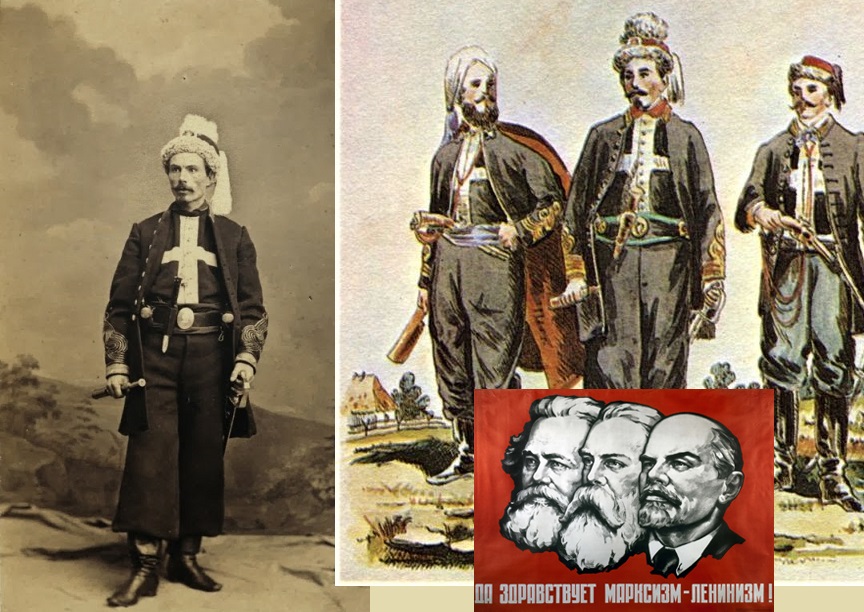
C’est le chant de l'Insurrection polonaise de Janvier 1863-1864, sur des paroles de Vladimir Volsky. C’est sur une version tardive de la mélodie, après la répression du soulèvement en 1879, que Vaclav Sventsitsky composa le chant révolutionnaire "Warszawianka" (connu sous le nom de "Varsovienne de 1905"), que Gleb Krjijanovski traduisit en russe en 1897. Le détachement des « Zouaves de la Mort » ( « śmierci Żuawy ») avait été créé en février 1863 à Ojców, à partir de volontaires, par l’officier français François Rochebrune (1830-1871), sur le modèle des zouaves français, une unité de fantassins légers volontaires. Ces Zouaves de la mort portaient un gilet noir orné d’une croix blanche proclamant dans les batailles qu’ils ne battraient pas en retraite, ni ne se rendraient. Dans leurs rangs on comptait de nombreux étudiants de l’Université Jagellonne. Ils livrèrent leur premier combat le 17 février à Miechów où Rochebrune conduisit ses zouaves dans une charge effreinée à la baïonnette contre les Russes retranchés dans le cimetière. Ce détachement se couvrit de gloire, si bien que sur les 150 fantassins engagés, il en resta moins de deux douzaines, y compris le commandant. Puis Rochebrune annonça à Cracovie la formation d’un régiment des Zouaves de la mort. En réalité il ne put rassembler qu’un bataillon de 400 hommes. Les Zouaves prirent part à la bataille de Chrobrze le 17 mars 1863, où ils repoussèrent les dragons russes, et, 18 mars 1863, à celle de Grochowiska au cours de laquelle les troupes russes furent également mises en déroute et où les Polonais brisèrent leur encerclement. Après le retour en France de Rochebrune, l’unité de débanda à la fin mars, alors qu’elle était en Autriche. Les 21 zouaves demeurés dans les rangs des insurgés tombèrent le 5 mai 1863 à la bataille d’Igołomia. Les zouaves de la mort- De gauche à droite: le comte Wojciech Komorowski; le colonel François Rochebrune (également sur la photo); le lieutenant Tenente Bella. Dessin de K. Sariusz Wolski.
Source: Article de Jan Rutkewicz dans „Tradition Magazine” n°138 - Octobre 1998

Песня Январского восстания 1863-1864 гг., слова Владимира Вольского.
На поздний вариант мелодии песни - появившийся после поражения восстания - в 1879 году Вацлав Свенцицкий сложил революционную "Варшавянку" (известна как "Варшавянка 1905 года"), в 1897 году переведенную на русский язык Глебом Кржижановским.
Отряд "Зуавов смерти" ("Żuawy śmierci") создал в феврале 1863 года в Ойцове из добровольцев французский офицер Франсуа Рошeбрюн (François Rochebrune) по образцу французских зуавов - легкой добровольческой пехоты. Зуавы смерти носили черные накидки с белым крестом, в бою не отступали и не сдавались. В их рядах сражалось много студентов Ягеллонского университета. Первый бой дали 17 февраля под Меховом, где Рошабрюн повел зуавов в безнадежную штыковую атаку на русские позиции на кладбище. Отряд пал, покрыв себя славой, из 150 бойцов в строю осталось меньше двух десятков, включая командира. Затем Рошабрюн объявил в Кракове о формировании полка Зуавов смерти, но был собран лишь батальон в 400 человек. Зуавы участвовали в битве под Хробжем 17 марта 1863, где отбили российских драгунов, и 18 марта 1863 под Гроховисками, где также российские части были отбиты, и поляки вышли из окружения. После отъезда Рошабрюна во Францию отряд прекратил существование и в конце марта ушел в Австрию. 21 оставшийся в рядах повстанцев зуав погибли 5 мая 1863 в битве Иголомей. Зуавы смерти - стоят слева направо: граф Войчех Коморовский, полковник Франтишек (Франсуа) Рошебрюн, поручик Тененте Белла).
Na bakier fezy, do góry wąsy -
Śmiech — i manierek brzęk na biwaku,
W marszu się idzie, jak gdyby w pląsy.
Lecz gdy bój zawrze, to nie na żarty,
Znak i karabin do ręki bierzem,
А Polak w boju kiedy uparty,
Stanie od razu starym żołnierzem.
Śwjęty, а prawy - Marsz Żuawy — marsz!
Pamięta Moskwa, со Żuaw znaczy,
Drżąc sołdat jego wspomina imię;
Sporo bo nakłuł carskich siepaczy
Brat nasz, francuski Żuawek w Krymie.
Miechów, Sosnówkę, Chrobrz, Grochowiska,
Dzwoniąc też w zęby, wspomni zbój cara —
Krwią garstka doszła mężnych nazwiska,
Garstka się biła, jak stara wiara.
Śwjęty, а prawy - Marsz Żuawy — marsz!
Kiedy rozsypiem się w tyraliery,
Zabawnie pełzać z bronią, jak krety;
Zabawnie pełzać z bronią, jak krety;
Lecz lepszy rozkaz: marsz na bagnety!
Во to sam bagnet w ręku aż rośnie,
Tak wzrasta zapał w dzielnym ataku,
Hura i hura! huczy żałośnie
Górą krzyż biały na czarnym znaku!
Śwjęty, а prawy - Marsz Żuawy — marsz!
W śniegu i błocje mokre noclegi,
Choć się zasypia przy sosen szumie,
W ogni urzednieją dyablo szeregi,
Chociaż się zaraz szlusować umie.
А braciom ległym na polu chwały,
Mówimy: Wkrótce nas zobaczycie.
Pierw za jednego z was plut on cały
Zbójów, nam odda marne swe życie.
Śwjęty, а prawy - Marsz Żuawy — marsz!
Po boju spoczniem na wsi, czy w mieście,
Cóż to za słodka dla nas podzięka,
Gdy spojrzy mile oko niewieście,
Twarz zapłoniona błyśnie z okienka!
Во serce Polek, bo ich urodę,
Żuaw czci z serca, jak żołnierz prawy,
I choćby za tę jedną nagrodę,
Winien być pierwszy wśród boju wrzawy.
Śwjęty, а prawy - Marsz Żuawy — marsz!
Nie lubim spierać się о czcze kwestye,
Ale nam marne carskie dekrety,
Jakieś koncesye, jakieś amnestye,
Jedna odpowiedź: marsz na bagnety!
Ву ta odpowiedź była dobitna,
Wystósowana zdrowo а celnie,
Niech ją Żuawi najpierwsi wytną,
Bagnety nasze piszą czytelnie.
Śwjęty, а prawy - Marsz Żuawy — marsz!
Słońce lśni jasno, albo z za chmury
Różne są losy nierównej wojny;
Żuaw ma zawsze uszy do góry,
Z bronią u boku zawsze spokojny,
Kiedyśmy mogli z dłońmi gołemi
Oprzeć się dzikiej hordzie żołnierzy,
То z bronią wyprzem ich z polskiej ziemi;
Nie do Żuawów — kto w to nie wierzy.
Śwjęty, а prawy - Marsz Żuawy — marsz!
Tirée du site de Christian Souchon
La croix blanche nous tient lieu de bannière,
Le fez sur l’oreille et la moustache au vent,
Quittant rires et tintements des verres,
Zouaves, nous nous mettons en marche en chantant.
Nul risque que la peur nous tenaille:
Croisés, fusils en main, montons au combat!
Quand les Polonais vont à la bataille,
Le plus jeune a le cran du plus vieux soldat.
Combat sacré, mais juste – Zouave, en avant!
Au seul nom de „zouaves” , effrayée,
Moscou se souvient, tremble, on la voit blêmir.
De nos frères, les zouaves de Crimée,
Elle conserve un bien cuisant souvenir.
Miechów, Sosnówka, Chrobrz, Grochowiska,
Font grincer les dents du Tsar usurpateur
Tous ces noms proclament notre courage
Et que notre antique foi vaut bien la leur.
Combat sacré, mais juste – Zouave, en avant!
Si nous nous dispersons sous la mitraille
Et comme des taupes armées, nous rampons,
Pour nous la seule formation qui vaille
C’est de marcher la baïonnette au canon!
Quand nous enfilons la baïonnette,
Que d’autant s’accroît notre zêle au combat,
La blanche croix ornant nos noires vestes,
Nous avançons en hurlant „hourra, hourra!”
Combat sacré, mais juste – Zouave, en avant!
Lorsque dans la neige ou la boue humide,
Nous nous endormons dans la forêt de pins,
Auprès du feu les grades s’abolissent
Et tant pis s’il nous fait repérer de loin.
Aux frères gisant au champ de gloire
Nous disons que nous nous reverrons bientôt.
Nous suivrons leur exemple méritoire.
Vivre misérables? Non, mourons plutôt!
Combat sacré, mais juste – Zouave, en avant!
Après le combat, aux champs, à la ville,
C’est un repos mérité qui nous attend:
Nous passerons observés par les filles
Aux fenêtres! Voyez leurs regards brûlants!
Car l’amour des belles polonaises,
C’est le bien le plus précieux pour nos soldats,
C’est là le prix qu’au coeur de la fournaise
Il espère et qui le récompensera.
Combat sacré, mais juste – Zouave, en avant!
Je n’aime pas me poser de problèmes,
Mais les décrêts du Tsar ne me plaisent pas.
Foin des amnisties, des concessions même,
La baïonnette, c’est ma réponse à moi!
La réponse fut catégorique,
Elle fut adressée fort précisément,
Par le Zouave avec précision écrite
A la baïonnette bien lisiblement.
Combat sacré, mais juste – Zouave, en avant!
Le soleil derrière la nuée brille
La guerre inégale tranche les destins.
Zouave, sois attentif, dresse l’oreille,
L'arme au côté, sois calme jusqu’à la fin.
Même mains nues, nous sommes capables
De résister aux plus sauvages assauts.
Notre terre polonaise et nos armes
Nous, Zouaves, les livrerions? Mourir plutôt!
.
Combat sacré, mais juste – Zouave, en avant!
Contributed by Riccardo Venturi - 2021/9/6 - 19:42
1b. The Варшавянка: Russian lyrics by Gleb Maksimilyanovich Krzhizhanovsky [1897]
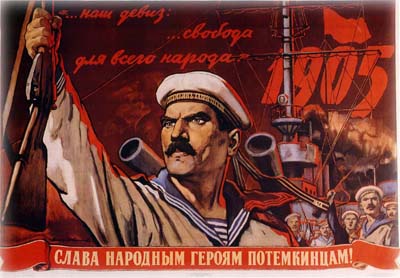
Manifesto commemorativo della rivolta della corazzata Potëmkin (1905) nel quale, significativamente, sono riportati alcuni versi della Varšavjanka. Lo slogan del manifesto recita: Gloria agli eroi popolari della Potëmkin!
Русский вариант «Варшавянки» – одной из самых популярных революционных песен. Сложена в 1879 Вацлавом Свенцицким на мотив песни польского Январского восстания 1863-1864 гг. «Марш зуавов» (слова Владимира Вольского). Музыкальной основой песни стал более поздний, трагедийно-героический вариант «Марша зуавов», возникший после подавления восстания. Впервые опубликована в польском нелегальном журнале «Proletariat», 1883, №1. Известность завоевала во время массовой первомайской демонстрации 1905 года в Варшаве, после чего за ней закрепилось название «Варшавянка 1905 года» – именно так она теперь называется в Польше (чтобы не путать с другими «Варшавянками», в том числе «Варшавянкой 1831 года» – песней Ноябрьского восстания 1831 года на музыку Кароля Курпиньского. Русский текст близок оригиналу Свенцицкого, радикально изменилась лишь строчка припева «Марш, марш, Варшава!» – она превратилась в «Марш, марш вперед, рабочий народ». Автор русского текста песни – Глеб Максимилианович Кржижановский. Один из вождей Великой Октябрьской социалистической революции и основателей Советского Союза, ближайший сподвижник Владимира Ильича Ленина. Родился 12 (24) января 1872 в Самаре (с 1935 по 1991 – Куйбышев), Российская империя. Ушёл из жизни 31 марта 1959 в Москве, РСФСР, СССР. Урна с прахом захоронена в Кремлёвской стене на Красной площади в Москве. Встречается также версия, что автором русского текста был революционер Владимир Акимов. - Sovmusic
Dal film "La Madre" (Мать) di Vsevolod Pudovkin (1926)
From the motion picture "The Mother" (Мать) by Vsevolod Pudovkin (1926)
Lotta senza tregua
Sacrosanta e giusta,
Marcia, marcia, Varsavia!
Mentre il ritornello della “Marcia degli Zuavi” era il seguente:
Per la battaglia sanguinosa
Sacrosanta e giusta,
Marciate, Zuavi, marciate!
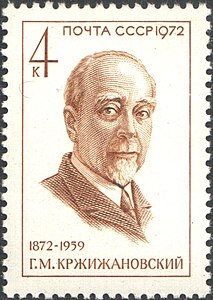 Secondo la tradizione, l'autore del testo russo è Gleb Maksimilianovič Kržižanovskij. Il canto risalirebbe al 1897, quando l'autore era incarcerato nella prigione moscovita della Butyrka. Secondo un'altra fonte (P. Širjaev), il testo sarebbe invece dovuto a Vladimir Akimov (v. l'introduzione a “Cento canti operai russi”, con un articolo introduttivo e note di P. Širjaev, edizioni P. Vykhodcev, L. Muzika, 1984, p, 13), ma tale affermazione non è sufficientemente argomentata. Sia Kržižanovskij che Akimov conobbero una simile sorte: entrambi furono arrestati nel 1897, e all'inizio del 1898 furono entrambi deportati presso il fiume Jenisej, in Siberia. Tuttavia, dal punto di vista ideologico erano avversari nel medesimo campo: Akimov era un socialdemocratico e, nel settembre del 1898, fuggì dal campo di deportazione raggiungendo i Socialdemocratici russi e divenendo rapidamente un dirigente dell'ala liberale del movimento, ritrovandosi così tra i “minoritari” (Menscevichi). Kržižanovskij, amico ed alleato di Lenin, faceva parte degli estremisti radicali, i futuri “maggioritari” (Bolscevichi).
Secondo la tradizione, l'autore del testo russo è Gleb Maksimilianovič Kržižanovskij. Il canto risalirebbe al 1897, quando l'autore era incarcerato nella prigione moscovita della Butyrka. Secondo un'altra fonte (P. Širjaev), il testo sarebbe invece dovuto a Vladimir Akimov (v. l'introduzione a “Cento canti operai russi”, con un articolo introduttivo e note di P. Širjaev, edizioni P. Vykhodcev, L. Muzika, 1984, p, 13), ma tale affermazione non è sufficientemente argomentata. Sia Kržižanovskij che Akimov conobbero una simile sorte: entrambi furono arrestati nel 1897, e all'inizio del 1898 furono entrambi deportati presso il fiume Jenisej, in Siberia. Tuttavia, dal punto di vista ideologico erano avversari nel medesimo campo: Akimov era un socialdemocratico e, nel settembre del 1898, fuggì dal campo di deportazione raggiungendo i Socialdemocratici russi e divenendo rapidamente un dirigente dell'ala liberale del movimento, ritrovandosi così tra i “minoritari” (Menscevichi). Kržižanovskij, amico ed alleato di Lenin, faceva parte degli estremisti radicali, i futuri “maggioritari” (Bolscevichi).Indicando Akimov come autore, P. Širjaev omette di citare le memorie di Kržižanovskij. Il canto, composto nel 1897 nel carcere della Butyrka, era stato interpretato per la prima volta da Kržižanovskij stesso e dai suoi compagni di cella: “Il giorno della partenza per la Siberia era arrivato. Così, piazzammo alla porta della cella Abramovič, che aveva una forza erculea, ci mettemmo in cerchio e cominciammo a cantare:
Questo canto possente risuonava per tutta la prigione della Butyrka. Il guardiani accorsero alla cella e tentarono invano di aprire la porta, tenuta ferma dal pugno di ferro di Abramovič. È così che nacque la Varšavjanka russa.” (Gleb M. Kržižanovski, “Canti di lotta. Musica dei Soviet”, 1955, N° 12, pp. 3-4).
La stessa controversia sorse a proposito del canto “Красное знамя” (Bandiera Rossa), che dapprima fu spesso attribuito a Kržižanovskij, e poi a Akimov (cfr. “Poesia bolscevica dal 1901 al 1907”, introduzione, compilazione, manoscritti e note di I.S. Eventov, ed. “Lo scrittore sovietico”, 1967).
La pubblicazione della Varšavjanka russa fu all'origine di numerose traduzioni nelle lingue dei popoli vicini. A partire dalla versione russa, il canto fu tradotto in georgiano da I. Edošvili (1901), in armeno da Hakob Hakobyan (1902), in tataro del Volga (1905-1906), in estone da Hans Pöögelmann (1906), in ciuvascio (1907) e, più tardi, in udmurto (o votiaco) da Kuzebaj Gerd, attorno al 1920. La versione lituana del 1905, attribuita a J. Akurator, è invece di Juozas Baltrušaitis-Mėmelė.
Il tema musicale della Varšavjanka è stato spesso utilizzato per altri canti (a volte di opposta tendenza politica): ad esempio, “Dormite in pace, combattenti per le idee” (1901), ”L'ora è suonata della grande rivincita” (1905), la Rossijanka, ”La Russia è china sotto il giogo degli infami” (1906-1907), “Gloria a chi è morto per la libertà” (1905-1907?), il sovversivo Canto degli Iževiti (1918), ecc.
In modo inatteso, questa tradizione è stata ripresa all'inizio del XXI secolo da alcuni autori di videogiochi: Internet utilizza almeno due versioni modificate della Varšavjanka come inni di battaglia:
„La Marcia di Lord Eron” (Campagna III: Il trono gelato, Kirjaeden, giugno 2005)
La versione russa è decisamente “stabile”, nel senso che non presenta usualmente varianti. Tuttavia, sono presenti un paio di varianti proprio del celebre ritornello, che mostrano l'immagine delle “barricate”. E' probabile che siano state riprese dalla versione tedesca.
Dal sito di Christian Souchon, con adattamenti e traduzione di RV.
Unceasing struggle
Sacred and right,
March, march, Warsaw!
The refrain of the “March of the Zouaves” is as follows:
To the bloody battle,
Sacred and right.
March, Zouaves, march!
 Tradition says that the Russian version was written by Gleb Maksimilianovič Krzhizhanovsky. The song originated in 1897, during the author's imprisonment in Moscow prison of Butyrka. However, according to a different source (P. Shiryayev), the version was written by Vladimir Akimov (s. introduction to “One Hundred Russian Workers' Songs”, with an introductory article and notes by P. Shiryayev, P. Vychodtsev publishing house, L. Muzika, 1984, p.13), but this attribution is not based on solid arguments. Krzhizhanovsky and Akimov shared a similar destiny: both were arrested and imprisoned in 1897, and in early 1898 both were deported to Siberia, by Yenisey river. But they were ideological adversaries in the same camp: Akimov was a Social-Democrat and, in September 1898, he managed to escape from the deportation camp and joined the Russian Social-Democrats. He soon became a chief of the movement's Liberal wing, the “Minority” (Mensheviks). Krzhizhanovsky, a friend and ally of Lenin, was a member of the radical extremist wing, the future “Majority” (Bolsheviks).
Tradition says that the Russian version was written by Gleb Maksimilianovič Krzhizhanovsky. The song originated in 1897, during the author's imprisonment in Moscow prison of Butyrka. However, according to a different source (P. Shiryayev), the version was written by Vladimir Akimov (s. introduction to “One Hundred Russian Workers' Songs”, with an introductory article and notes by P. Shiryayev, P. Vychodtsev publishing house, L. Muzika, 1984, p.13), but this attribution is not based on solid arguments. Krzhizhanovsky and Akimov shared a similar destiny: both were arrested and imprisoned in 1897, and in early 1898 both were deported to Siberia, by Yenisey river. But they were ideological adversaries in the same camp: Akimov was a Social-Democrat and, in September 1898, he managed to escape from the deportation camp and joined the Russian Social-Democrats. He soon became a chief of the movement's Liberal wing, the “Minority” (Mensheviks). Krzhizhanovsky, a friend and ally of Lenin, was a member of the radical extremist wing, the future “Majority” (Bolsheviks).In advancing his hypothesis, P. Shiryayev does not quote Krzhizhanovsky's memorues. The song, written 1897 in Butyrka prison, was first sung by Krzhizhanovsky himself and his cell inmates: “The day was come of leaving for Siberia. So, we placed Abramovich, who was strong like Hercules, against the cell door, then we formed a circle and started singing:
This powerful song echoed through the Butyrka prison. The wardens rushed to the cell and unsuccessfully tried to open the door, kept closed by Abramovich with his iron fist. That's the way the Russian Varshavianka came to light.” (Gleb M. Krzhizhanovsky, “Struggle Songs. Soviet Music”, 1955, N° 12, pp. 3-4).
A very similar controversy arose about the song “Red Banner”, which was first often attributed to Krzhizhanovsky, and then to Akimov (s. “Bolshevik Poetry from 1901 to 1907”, w. Introduction, compilation, manuscripts and notes by I.S. Eventov, “The Soviet Writer”, 1967).
The Russian Varshavianka gave rise to a number of translations in the languages of neighboring peoples. The song was translated into Georgian (by I. Edoshvili, 1901), Armenian (by Hakob Hakobyan, 1902), Volga Tatar (1905-1906), Estonian (by Hans Pöögelmann,1906), Chuvash (1907) and, later, into Udmurt (or Votyak) by Kuzebay Gerd, around 1920. The Lithuanian version from 1905, attributed to J. Akurator, is by Juozas Baltrušaitis-Mėmelė.
The melody of the Varshavianka has often been used for other songs, sometimes of opposite tendency: e.g. “Sleep in peace, fighters for ideas” (1901), ”The hour has come of the great revenge” (1905), the so-called Rossyanka, ”Russia is bent in the infamous yoke” (1906-1907), “Glory to those fallen for freedom” (1905-1907?), the subversive Song of Izhevites (1918), ecc.
Rather unexpectedly, this traditional song has been used in early 21th century in a number of videogames: at least two modified versions of Varshavianka are used as battle hymns in the Web:
„Lord Eron's March” (Campaign III: The Frozen Throne, Kirjaeden, June 2005)
The Russian version is definitely stable, as it does not usually include variants. However, there exists a couple of variants of the refrain including the image of the “barricades”. Influence of the German version is possible.
From Christian Souchon's website Adaptation and translation by RV.
Pour le combat sanglant,
Sacré et juste!
Marche, marche Varsovie!
Tandis que le refrain dans la „Marche des Zouaves” était à l’origine:
Pour le combat sanglant,
Sacré et juste,
Marchez, Zouaves, marchez!
L’auteur du texte russe, selon la tradition, est Gleb Krjijanovski et le chant remonterait à 1897, époque de son internement à la maison d’arrêt de Boutyr. Selon une autre source (P. Chiriaiev), les paroles seraient dues à Vladimir Akimov (cf. Introduction à „Cent chants ouvriers russes”, avec un article introductif et des commentaires de P. Chiriaiev, aux éditions P. Vykhodtsev, L., Mouzyka, 1984, p. 13), mais cette affirmation n’est pas argumentée. Ces deux auteurs à cette époque connurent un sort semblable: tous deux furent arrêtés en 1897, et début 1898 ils furentt l’un et l’autre déportés au bord du Yénisseï. Cependant, idéologiquement, c’étaient des adversaires à l’intérieur du même camp: Akimov était social-démocrate et en septembre 1898 il s’enfuit du camp de déportation pour rejoindre les Socio-Démocrates russes et il devint rapidement l’un des cadres de l’aile libérale du mouvement et fatalement, se retrouva „minoritaire” (les Mencheviks). Krjijanovski, allié de Lénine, était un représentant des extrémistes radicaux, les futurs Bolchéviks.
Tout en désignant Akimov comme l’auteur, P. Chiriaiev, n’en cite pas moins les mémoires de Krjijanovski. Le chant composé en 1897 à la prison de Boutyr avait été interprêté pour la première fois par Krjijanovski et ses compagnons de cellule: „Le jour du départ pour la Sibérie était arrivé. Nous plaçâmes à la porte de la cellule Abramovitch qui était d’une force herculéenne, nous nous mîmes en cercle et commençâmes à chanter:
Ce chant puissant résonnait à travers toute la prison de Boutyr. Les gardiens accoururent vers la cellule dont ils essayèrent en vain d’ouvrir la porte tenue fermée par une poigne de fer (celle d’Abramovitch)... C’est ainsi que la „Varsovienne” russe vit le jour.” ( Gleb M. Krjijanovski, Chants de combat. Musique des Soviets, 1955, N° 12, pp. 3-4).
On retrouve la même controverse à propos de la paternité du chant „Le drapeau rouge” qui fut souvent d’abord attribué à Krjijanovski, et plus tard à Akimov. (Cf. Poésie bolchévique de 1901 à 1907, Introduction, compilation, manuscrits et notes de I.S. Eventov, L'écrivain soviétique, 1967).
La publication de la „Varsovienne” russe fut à l’origine de nombreuses traductions dans les langues des peuples voisins. Partant du russe, le chant fut traduit en géorgien (I. Edochvili, 1901), en arménien (A. Hakobian, 1905), tartare (1905-1906), estonien (1906), tchouvache (1907) et plus tard en Oudmourt (Kouzebay Guerd, dans les années 1920). Quant à la version lithuanienne elle fut traduite du polonais par J. Akurator.
Le thème musical de la „Varsovienne” a été souvent repris dans de nouveaux chants: cf. „Dormez en paix, combattants des idées” (1901), „L”heure a sonné de la grande revanche” (1905), la „Rossianka” (La Russienne): „La Russie ploie sous le joug des infâmes” (1906-1907), „Gloire à ceux qui moururent pour la liberté” (1905-1907 ?), le subversif „Chant des Ijévites” (1918), etc.
De façon inattendue, cette tradition a été reprise au début du XXI ème siècle par les auteurs de jeux de consoles: Internet utilise au moins deux versions modifiées de la „Varsovienne” comme hymnes de bataille pour ses fictions:
„L’hymne du Clan des Russes” (L’ère de l’empire, Le soldat russe, déc. 2004),
„La Marche de Lord Eron” (Campagne III: Le trone gelé, Kirjaeden, juin 2005).
На бой кровавый,
Святой и правый!
Марш, марш, Варшава!
А в первоначальном "Марше зуавов" было так:
На бой кровавый,
Святой и правый -
Марш, зуавы, марш!
Автором русского текста по традиции считается Глеб Кржижановский, при этом песня датируется 1897 годом - временем пребывания Кржижановского в Бутырской пересыльной тюрьме. В одном источнике (П. Ширяева) встретилась версия, что текст принадлежит Владимиру Акимову (см. вводн. статью к изд.: 100 песен русских рабочих / Сост., вступит. статья и коммент. П. Ширяевой; Общ. ред. П. Выходцев. Л., Музыка, 1984, с. 13; однако, аргументов там не приводится). Судьбы этих авторов в тот период похожи: оба они в 1897 г. были арестованы, а в начале 1898 оказались в Енисейской ссылке. Но при этом идеологически они были противниками, хотя и внутри одного лагеря: Акимов был народовольцем, а бежав в сентябре 1898 из ссылки, вступил в "Союз русских социал-демократов", и вскоре стал одним из лидеров либерального крыла социал-демократического движения; затем автоматически меньшевиком. Кржижановский, соратник Ленина, был представителем крайнего радикального крыла - будущих большевиков.
Называя автором Акимова, П. Ширяева тем не менее приводит воспоминания Кржижановского о том, что песня была сложена в 1897 году в Бутырской тюрьме и впервые была исполнена Кржижановским и его сокамерниками: «Настал день нашей отправки в Сибирь. Мы поставили к двери камеры Абрамовича, обладавшего необычайной физической силой, стали в круг и запели:
Звуки могучей песни огласили здание Бутырской тюрьмы. надзиратели бросились к нашей камере, пытаясь открыть дверь, не не смогли сломить железную силу нашего стража (Абрамовича)... Так совершилось боевое крещение русской "Варшавянки"» (Кржижановский Г. М. Песни борьбы. - Сов. музыка, 1955, № 12, с. 3-4).
Спорная ситуация была также с установлением авторства песни "Красное знамя": она часто по традиции приписывалась Кржижановскому, однако впоследствии авторство было пересмотрено в пользу Акимова (См.: Поэзия в большевистских изданиях 1901-1917 / Вступ. статья, сост., подг. текста и примеч. И. С. Эвентова. Л., Сов. писатель, 1967 (Б-ка поэта)).
Появление русской "Варшавянки" способствовало переводу песни на языки соседних народов. С русского языка она была переведена на грузинский (И. Едошвили, 1901), армянский (А. Акопян, 1905), татарский (1905-1906), эстонский (1906), чувашский (1907), а впоследствии на удмуртский (Кузебай Герд, 1920-е). На латышский песня была переведена с польского Я. Акуратором.
Мотив "Варшавянки" в дальнейшем часто использовался для создания новых песен: см. "Спите спокойно, борцы за идею" (1901), "Пробил час грозный избавленья" (1905), "Россиянка" ("Стонет Россия под властью жестокой" (1905-1907), "Слава погибшим во имя свободы" (1905-1907 ?), повстанческая "Песня ижевцев" (1918) и др.
Неожиданным образом эта традиция возродилась в начале 21 века в песнях компьютерных геймеров - в сети висят по крайней мере две переделки "Варшавянки" в боевые гимны виртуальных игр:
"Гимн Рус_клана" (Age of Empire, Pyc_Soldier, дек. 2004)
"Марш Лордерона" (Warcraft III: The Frozen Throne, Kir'jaeden, июнь 2005)
Вихри враждебные веют над нами, [1] [2] [3]
Темные силы нас злобно гнетут.
В бой роковой мы вступили с врагами,
Нас еще судьбы безвестные ждут.
Но мы подымем гордо и смело
Знамя борьбы за рабочее дело,
Знамя великой борьбы всех народов
За лучший мир, за святую свободу.
Марш, марш вперед, рабочий народ.
На бой кровавый, святой и правый
Марш, марш вперед, рабочий народ. [4] [5]
Мрёт в наши дни с голодухи рабочий,
Станем ли братья мы дольше молчать?
Наших сподвижников юные очи
Может ли вид эшафота пугать?
В битве великой не сгинут беследно
Павшие с честью во имя идей
Их имена с нашей песней победной.
Станут священны мильонам людей.
Марш, марш вперед, рабочий народ.
На бой кровавый, святой и правый
Марш, марш вперед, рабочий народ.
Нам ненавистны тиранов короны
Цепи народа-страдальца мы чтим
Кровью народной залитые троны,
Кровью мы наших врагов обагрим!
Смерть безпощадная всем супостатам!
Всем паразитам трудящихся масс!
Мщенье и смерть всем царям-плутократам!
Близок победы торжественный час.
Марш, марш вперед, рабочий народ.
На бой кровавый, святой и правый
Марш, марш вперед, рабочий народ.
Vixri vraždebnye vejut nad nami,
Temnye siły nas złobno gnetut.
V boj rokovoj my vstupili s vragami,
Nas ešće suďby bezvestnye ždut.
No my podymem gordo i smeło
Znamja boŕby za rabočee deło,
Znamja velikoj boŕby vsex narodov
Za łučšij mir, za svjatuju svobodu.
Na boj krovavyj, svjatoj i pravyj
Marš, marš vpered rabočij narod.
Na boj krovavyj, svjatoj i pravyj
Marš, marš vpered rabočij narod.
Mrët v naši dni s gołoduxi rabočij,
Stanem li braťja my dolše mołčať?
Našix spodvižnikov junye oči
Možet li vid äšafota pugať?
B bitve velikoj ne sginut besledno
Pavšie s česťju vo imja idej.
Ix imena s našej pesnej pobednoj.
Stanut svjašćenny miljonam ljudej.
Na boj krovavyj, svjatoj i pravyj
Marš, marš vpered rabočij narod.
Na boj krovavyj, svjatoj i pravyj
Marš, marš vpered rabočij narod.
Nam nenavistny tiranov korony
Celi naroda-stradalca my čtim,
Krov’ju narodnoj zalitye trony,
Krov’ju my našix vragov obagrim!
Smerť bezpošćadnaja vsem supostatam!
Vsem parazitam trudjašćixsja mass!
Mšćeńe i smerť vsem carjam-płutokratam!
Blizok pobedy toržestvennyj čas.
Na boj krovavyj, svjatoj i pravyj
Marš, marš vpered rabočij narod.
Na boj krovavyj, svjatoj i pravyj
Marš, marš vpered rabočij narod.
[2] Traduzione italiana / Italian translation
Riccardo Venturi, 17-11-2021
Tempeste ostili ci infuriano addosso,
Tenebre possenti ci opprimon malamente.
Siamo entrati nella battaglia fatale coi nemici,
Ci attendono destini sconosciuti.
Però innalziamo con coraggio e fierezza
Lo stendardo della lotta del lavoratore,
Stendardo della lotta popolare
Per un nuovo mondo, per la sacra libertà.
Alla battaglia cruenta, sacra e giusta
Marcia, marcia, avanti popolo lavoratore!
Alla battaglia cruenta, sacra e giusta
Marcia, marcia, avanti popolo lavoratore!
Ai giorni nostri, il lavoratore muore di fame:
Lavoratori, per quanto ancora taceremo?
I giovani occhi dei nostri compagni
Saranno spaventati dal patibolo?
In questa grande battaglia non perirà invano
Chi è caduto con onore per giusti ideali,
I loro nomi, assieme ai nostri sacri canti,
Diverranno sacri per il popolo.
Alla battaglia cruenta, sacra e giusta
Marcia, marcia, avanti popolo lavoratore!
Alla battaglia cruenta, sacra e giusta
Marcia, marcia, avanti popolo lavoratore!
Noi odiamo le corone dei tiranni,
Onoriamo le catene del popolo che soffre.
Quei troni bagnati dal sangue del popolo
Col sangue dei nostri nemici bagneremo.
Spietata morte ai nostri nemici,
A tutti i parassiti delle masse lavoratrici,
Morte agli zar e ai plutocrati,
L'ora solenne della vittoria si avvicina.
Alla battaglia cruenta, sacra e giusta
Marcia, marcia, avanti popolo lavoratore!
Alla battaglia cruenta, sacra e giusta
Marcia, marcia, avanti popolo lavoratore!
[3] Traduction française tirée du site de Christian Souchon:
Nous sommes contraints par les forces du mal.
Au combat final l’ennemi s’apprête :
Le sort qui nous attend peut être fatal.
Mais nous brandissons, hardie et fière,
La bannière du combat des travailleurs,
Du grand combat qui par toute la terre
Les unit pour un monde libre et meilleur.
Lutte sanglante, lutte sainte et juste,
Marchez, en avant, peuple des travailleurs !
Lutte sanglante, lutte sainte et juste,
Marchez, en avant, peuple des travailleurs !
Peuple ouvrier que la faim tenaille,
Resterons-nous plus longtemps sans dire un mot?
Et les yeux de nos jeunes frères d’armes
Eviteront- ils la vue de l’échafaud ?
Ceux qui mourront pour la noble cause
Qu’ils ne craignent pas d’être oubliés jamais !
Leurs noms nos chants victorieux les impose-
Ront au souvenir de millions d’ouvriers.
Lutte sanglante, lutte sainte et juste,
Marchez, en avant, peuple des travailleurs !
Lutte sanglante, lutte sainte et juste,
Marchez, en avant, peuple des travailleurs !
Tyrans, foin des odieuses couronnes !
Nous honorons les chaînes de nos martyrs.
Le sang du peuple rougissait vos trônes :
Ils baigneront dans le vôtre à l’avenir !
Que notre vengeance impitoyable
S’abatte sur les exploiteurs abhorrés !
A bas les tsars, à mort les ploutocrates !
L’instant solennel du triomphe a sonné.
Lutte sanglante, lutte sainte et juste,
Marchez, en avant, peuple des travailleurs !
Lutte sanglante, lutte sainte et juste,
Marchez, en avant, peuple des travailleurs !
(*) Variante (au lieu du bis)
Sus aux bourgeois ! Amis, aux barricades !
Marchez, etc.
[4] Var. 1:
Марш, марш вперед, рабочий народ!
На баррикады! Буржуям нет пощады!
Марш, марш вперед, рабочий народ!
Na barrikady! Na barrikady!
Marš, marš vpered, rabočij narod!
Na barrikady! Buržujam net pošćady!
Marš, marš vpered, rabočij narod!
[5] Var. 2:
Марш, марш вперед, pабочий народ!
На баррикады! Буржуям нет пощады!
Марш, марш вперед, pабочий народ!
Na barrikady! Buržujam net pošćady!
Marš, marš vpered, rabočij narod!
Na barrikady! Buržujam net pošćady!
Marš, marš vpered, rabočij narod!
Contributed by Riccardo Venturi - 2007/10/11 - 12:35
1c. La Varsovienne: The "primitive" (or "Trotzkyist") French version from the 1920s
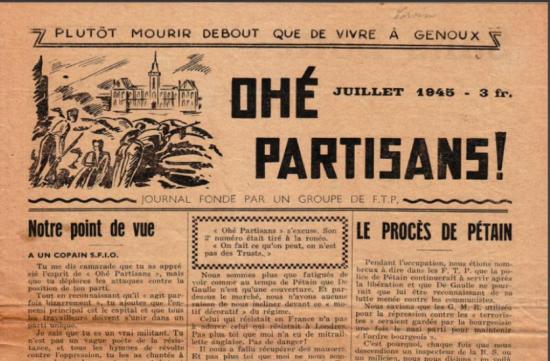
Quella che, con tutta probabilità (ma non con assoluta certezza) è la prima versione della Varsovienne, la Varšavjanka in lingua francese, sembra risalire, per le sue caratteristiche, ai primi anni '20 del XX secolo o comunque a poco tempo dopo la Rivoluzione d'Ottobre. E' assai vicina sia al testo polacco che a quello russo (giova ricordare che il canto veniva perlopiù percepito come popolare e russo d'origine, e associato alla Rivoluzione Russa). Ancora oggi se ne è tramandato il testo, ma reperire ulteriori notizie è un'impresa pressoché disperata (neppure sulla pagina di Christian Souchon, per il resto ricchissima di notizie, si trova alcunché). Non se ne conosce quindi l'autore, né l'anno preciso di composizione. Inoltre, non se ne trova alcuna incisione, neppure di fortuna. Ciononostante, in modo "sotterraneo", la versione non scomparve; essendo originaria, con tutta probabilità, dei primi anni dopo la Rivoluzione Russa, venne percepita come “trotzkista”. Partigiani trotzkisti devono averla utilizzata; se ne hanno echi nella rivista “Ohé Partisans” del luglio 1945, titolo evidentemente ripreso dal Chant des Partisans, fondata da un gruppo di FTP (Franchi Tiratori Partigiani) di stampo chiaramente critico verso il PCF stalinista (si veda l'articolo di Fondo intitolato “Notre point de vue”), dove questa versione è riportata in un riquadro a pagina 2 (“Nous les rechanterons nos vieilles chansons”) inserito nell'articolo “Sans bottes ni medailles – Une visite de politesse”). [RV]
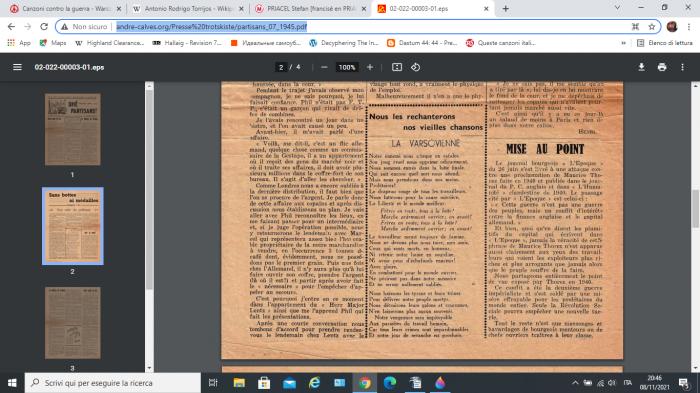
What is most probably (but not 100%) the first version of the Varsovienne, the Varshavianka in French, seems for its character to trace back to the early 1920s, or anyway to the first years after the October Revolution. It is definitely close to both the Polish and the Russian originals (it should be remembered that the song was mostly perceived as a Russian folksong associated with the Russian Revolution). This first Varsovienne is not yet forgotten and its lyrics are still known, but obtaining further information is almost impossible (there's nothing even in Christian Souchon's webpage, normally very accurate and rich). So, the author -if any- remains unknown and there is no recording available. Nevertheless, this version has not completely disappeared and must have had kind of underground circulation. Having probably originated from the first years after the Russian Revolution, the version must have been considered as a “Trotzkyist” one. It must have been used by Trotzkyist partisans, as it has left traces in the magazine “Ohé Partisans” from July 1945, a title clearly taken from Chant des Partisans, founded by a group of FTP (Francs Tireurs Partisans) overtly critic towards Stalinist PCF (see the editorial titled “Notre point de vue”), where this version is printed in a box on page 2 (“Nous les rechantersons nos vieilles chansons”, “We'll sing them again, our old songs”) included in the article “Sans bottes ni medailles – Une visite de politesse”). [RV]
Notre ennemi nous attaque en rafales,
Son joug cruel nous opprime odieusement.
Nous sommes entrés dans la lutte finale,
Qui sait encore quel sort nous attend ?
Mais nous prendrons en nos mains prolétaires,
Le drapeau rouge de tous les travailleurs,
Nous lutterons pour la cause ouvrière,
La liberté et le monde meilleur.
Marche hardiment ouvrier, en avant!
Frères en route, tous à la lutte!
Marche hardiment ouvrier, en avant!
Le travailleur meurt toujours de famine,
Nous ne pouvons plus nous taire mes amis,
Ni retenir notre haine en sourdine,
Ni avoir peur d'échafauds ennemis.
Ceux qui sont morts en honneur, avec gloire,
En combattant pour le monde ouvrier,
Ne périrons pas dans notre mémoire,
Et ne seront nullement oubliés!
Marche hardiment ouvrier, en avant!
Frères en route, tous à la lutte!
Marche hardiment ouvrier, en avant!
Nous haïssons les tyrans et les trônes,
Pour délivrer notre peuple martyr,
Nous détruirons leurs palais et couronnes,
N'en laisserons plus aucun souvenir.
Notre vengeance sera impitoyable
Aux parasites du travail humain,
Car tous leurs crimes sont impardonnables,
Et notre jour de revanche est prochain.
Marche hardiment ouvrier, en avant!
Frères en route, tous à la lutte!
Marche hardiment ouvrier, en avant!
Il nostro nemico ci attacca a folate,
Il suo crudele giogo ci opprime odiosamente.
Siamo entrati nella lotta finale,
Chi ancor sa quale sorte ci attende?
Ma noi prenderemo nelle nostre mani proletarie
La bandiera rossa di tutti i lavoratori,
Noi lotteremo per la causa operaia,
Per la libertà e per il mondo migliore.
Fratelli, avanti, tutti alla lotta!
Marcia audacemente, operaio, avanti!
Fratelli, avanti, tutti alla lotta!
Marcia audacemente, operaio, avanti!
Il lavoratore muore ancora di fame,
Noi non possiamo più tacere, amici miei,
Né mettere il nostro odio in sordina,
Né aver paura dei patiboli nemici.
Chi è morto con onore e con gloria
Combattendo per il mondo operaio,
Non perirà nella nostra memoria
E non sarà affatto dimenticato!
Fratelli, avanti, tutti alla lotta!
Marcia audacemente, operaio, avanti!
Fratelli, avanti, tutti alla lotta!
Marcia audacemente, operaio, avanti!
Noi odiamo i tiranni e i troni,
Per liberare il nostro popolo martire
Distruggeremo i loro palazzi e le corone,
Non ne lasceremo più alcun ricordo.
La nostra vendetta sarà spietata
Contro i parassiti del lavoro umano,
Ché tutti i loro crimini sono imperdonabili,
E il giorno della nostra rivincita è vicino.
Fratelli, avanti, tutti alla lotta!
Marcia audacemente, operaio, avanti!
Fratelli, avanti, tutti alla lotta!
Marcia audacemente, operaio, avanti!
Contributed by Riccardo Venturi - 2007/10/11 - 12:38
1d. La Varsovienne, the French version by Stefan (Stéphane) Priacel, around 1930?

La sua versione della Varšavjanka, come detto, deve risalire agli anni '30 e riflette l'ortodossia PCF; ciononostante, se ne hanno le prime notizie certe soltanto nel 1948 quando, assieme allo spartito, fu pubblicata dalle edizioni Le Chant du Monde in un opuscolo per il centenario del 1848, 1948, Anniversaire des journées glorieuses del février-juin 1848. In tale pubblicazione viene indicato come coautore della traduzione tale Pierre Migennes, sul quale non esistono notizie reperibili. La prima incisione conosciuta è addirittura del 1974 (l'anno della morte di Priacel), quando le stesse edizioni Le Chant du Monde pubblicarono un album di Chants révolutionnaires du Monde interpretati dal “Groupe 17” (album poi riedito nel 1989). In ultima analisi, è proprio dal 1974 che la Varsovienne di Stefan Priacel è diventata la versione francese standard della canzone.
This is the French version of the Varshavjanka that is generally known, the “Varsovienne” that has replaced the first version of the song in all French-speaking countries. This may be also due to its character of a song connected with the French Communist Party, strictly conform with Stalin's dictates. The author of this version, probably from the 1930s, is Stefan Priacel (1904-1974), not only a prominent journalist and and theatre critic, but also a renowned translator and conference interpreter. He was born 1904 in Breslau (Wrocław), now in Poland, from a Jewish family (his mother was the singer Marya Freund); later, he changed his family name, Freund, into its “Polonized” form, Priacel (both words mean “friend”). In the 1930s, he married Filomena Nitti, from Italy, the daughter of the prominent Liberal and anti-fascist politician Francesco Saverio Nitti (1868-1953) who was several times a member of the Italian government and also Prime Minister from 1919 to 1920. Stefan Priacel was a member of the French Communist Party in pre-war years; in 1946, he was chosen as an official simultaneous interpreter at Nuremberg trials. He spoke fluently six languages: Yiddish, German, Polish, Italian, French and English. He definitively settled in France and became a naturalized French citizen in 1945, assuming the name of “Stéphane Priacel”.
Performed by Caterina Ribeiro
As said previously, Stefan Priacel's Varsovienne must have been written in the 1930s and reflects PCF orthodoxy. Nevertheless, it was first published (lyrics and score) only in 1948 by Éditions Le Chant du Monde in a booklet devoted to 1848 centennial, 1948, Anniversaire des journées glorieuses del février-juin 1848. The booklet gives a certain Pierre Migennes as co-author of the translation, but no further information has proved available. The first recording of the song was made no earlier than 1974 (the same year as Stefan Priacel's death), when Le Chant du Monde issued an album of revolutionary songs, Chants révolutionnaires du Monde, all performed by “Groupe 17” (the album was re-issued in 1989). It is just since 1974 that Stefan Priacel's Varsovienne has established itself as the standard version of the song in French. [RV]
En rangs serrés l’ennemi nous attaque,
Autour de notre drapeau groupons-nous!
Que nous importe la mort menaçante?
Pour notre cause soyons prêts à souffrir.
Mais le genre humain, courbé sous la honte,
Ne doit avoir qu’un seul étendard,
Un seul mot d’ordre: Travail et Justice,
Fraternité de tous les ouvriers.
Pour la victoire de tous les travailleurs!
O frères, aux armes, pour notre lutte,
Pour la victoire de tous les travailleurs!
Les profiteurs, vautrés dans la richesse,
Privent de pain l’ouvrier affamé,
Ceux qui sont morts pour nos grandes idées
N’ont pas en vain combattu et péri.
Contre les richards et les ploutocrates,
Contre les rois, contre les trônes pourris,
Nous lancerons la vengeance puissante
Et nous serons à tout jamais victorieux!
Pour la victoire de tous les travailleurs.
O frères, aux armes, pour notre lutte,
Pour la victoire de tous les travailleurs.
O frères, aux armes, pour notre lutte,
Pour la victoire de tous les travailleurs.
O frères, aux armes, pour notre lutte,
Pour la victoire de tous les travailleurs.
In ranghi serrati il nemico ci attacca,
Uniamoci attorno alla nostra bandiera!
Che c'importa della morte minacciosa?
Per la nostra causa siamo pronti a soffrir.
Ma il genere umano chino dalla vergogna
Non deve avere che un solo stendardo,
Una sola parola d'ordine: Lavoro e Giustizia,
Fratellanza di tutti gli operai.
Fratelli, all'armi, per la nostra lotta,
Per la vittoria di tutti i lavorator!
Fratelli, all'armi, per la nostra lotta,
Per la vittoria di tutti i lavorator!
I profittatori, che sguazzan nella ricchezza,
Privano del pane l'operaio affamato,
E chi è morto per i nostri grandi ideali
Non ha combattuto, non è perito invano.
Contro i ricconi e i plutocrati,
Contro i re, contro i troni imputriditi,
Noi lanceremo vendetta possente
E sarem vincitori per l'eternità!
Fratelli, all'armi, per la nostra lotta,
Per la vittoria di tutti i lavorator!
Fratelli, all'armi, per la nostra lotta,
Per la vittoria di tutti i lavorator!
Fratelli, all'armi, per la nostra lotta,
Per la vittoria di tutti i lavorator!
Fratelli, all'armi, per la nostra lotta,
Per la vittoria di tutti i lavorator!
[2] English translation / Traduzione inglese:
Let us gather around our flag!
What do we care about looming death?
Let us be ready to suffer for our cause.
Still humanity, bent under shame,
Shall have a single banner,
A single motto: Work and Justice,
Brotherhood of all workers.
Brothers, to arms, for our struggle,
for the victory of all workers!
Brothers, to arms, for our struggle,
for the victory of all workers!
The profiteers wallowing in wealth
Are depriving the famished worker of bread,
Those who died for our grand ideas
Did not fight and fall in vain.
Against the filthy rich and the plutocrats,
Against the kings, the rotten trones,
we shall start a powerful vengeance,
And be forever victorious!
Brothers, to arms, for our struggle,
for the victory of all workers!
Brothers, to arms, for our struggle,
for the victory of all workers!
Brothers, to arms, for our struggle,
for the victory of all workers!
Brothers, to arms, for our struggle,
for the victory of all workers!
Contributed by Riccardo Venturi - 2007/10/11 - 12:43
1d1. French version by the Belgian Socialist and Democratic Youth Movement Les Faucons Rouges (“Red Hawks”)
1.
Dans la tourmente et dévorant nos hontes
Nous cheminons traqués par ces démons.
Mais en bataille et qu'enfin l'homme affronte
La sombre mort et les noirs bataillons!
Et nous dresserons ,crânement , gaiement,
Le beau drapeau de la classe ouvrière
Notre ètandard sur le monde , acclamant
L'ordre et la loi révolutionnaires.
Marche en avant, travailleur prolétaire!
Ta causse et juste et ton souffle puissant,
Marche en avant, conquérant de la terre!
2.
On nous affame, on nous frappe , on nous leurre,
Nous nous berçons d' espoirs toujours déçus....
De la révolte maintenant sonne l' heure:
C'est trop de coup et d'outrages reçus...
Qui dans ce combat sera tombé mort
Aura l' honneur d'une fin mémorable.
Son nom ,célèbre en nos chants , son effort
Resteront chers à tous nos camarades
Marche en avant, travailleur prolétaire!
Ta causse et juste et ton souffle puissant,
Marche en avant, conquérant de la terre!
3.
Nous haïssons et galons et couronnes?
Nous saluons tout esclave en ses fers,
Le sang du peuple est le pourpre des trônes,
Le sang des rois se perdra dans les mers.
Vengerons sans pitié le peuple a martyr,
A l'exploiteur une mort vengeresse.
Vengeance et mort à qui pour se grandir
Dans l'univers a jeté la détresse.
Marche en avant, travailleur prolétaire!
Ta causse et juste et ton souffle puissant,
Marche en avant, conquérant de la terre!
Contributed by Albatross795 - 2021/6/12 - 09:35
Di Riccardo Venturi (4 agosto 2006)
1e. Italian literal translation of the first version of French Varsovienne
By Riccardo Venturi (August 4, 2006)
Fits fairly well also the Russian version.
Il nostro nemico ci attacca a raffiche,
Il suo crudele giogo ci opprime odiosamente.
Siamo entrati nella lotta finale,
Chi mai sa quale sorte ci attende?
Ma noi prenderemo nelle nostre mani proletarie
La bandiera rossa di tutti i lavoratori,
Lotteremo per la causa operaia,
Per la libertà e per il mondo migliore.
Marcia con audacia, operaio, avanti!
Fratelli, in marcia, tutti alla lotta!
Marcia con audacia, operaio, avanti!
Il lavoratore muore sempre di carestia,
Non possiamo più tacere, amici miei,
Né mettere in sordina il nostro odio,
Né avere paura delle forche nemiche.
Chi è morto con onore e con gloria
Combattendo per il mondo operaio,
Non morirà nella nostra memoria
E non sarà affatto dimenticato!
Marcia con audacia, operaio, avanti!
Fratelli, in marcia, tutti alla lotta!
Marcia con audacia, operaio, avanti!
Noi odiamo i tiranni e i troni,
Per liberare il nostro popolo martire
Distruggeremo i loro palazzi e le corone,
Non ne lasceremo più alcun ricordo.
La nostra vendetta sarà implacabile
Per i parassiti del lavoro umano,
Ché tutti i loro crimini sono imperdonabili,
E il giorno della nostra rivincita è vicino.
Marcia con audacia, operaio, avanti!
Fratelli, in marcia, tutti alla lotta!
Marcia con audacia, operaio, avanti!
Contributed by Riccardo Venturi - 2007/10/11 - 12:40
1e1. Italian version performed by Adriana Martino (Arrangement by Benedetto Ghiglia, 1972)
La versione italiana della Varsovienne francese (che ne mantiene anche il titolo), interpretata dalla poliedrica artista Adriana Martino risale al 1972 ed è stata arrangiata dal musicista fiesolano Benedetto Ghiglia, che di Adriana Martino era il marito e che ricordiamo come notevole autore di musiche per film (sua è, ad esempio, la colonna sonora di Corbari di Valentino Orsini). Il brano fa parte dell'album doppio Cosa io posso dirti, contenente un'estesa antologia di canti di lotta, resistenziali e militanti europei. Sebbene ripresa e tradotta dalla versione francese, si tratta senz'altro dell'unica versione d'arte della Warszawianka in lingua italiana. Adriana Martino è nata a Aversa (Napoli) il 26 luglio 1931; è la sorella maggiore dell'attrice e cantante Miranda Martino. E' apprezzata cantante lirica, ma nella sua poliedricità ha cantato anche in cabaret e si è fatta notare come interprete di canzoni brechtiane e di canti militanti (esibendosi talora assieme alla sorella). E' stata sposata con il compositore, direttore d'orchestra e pianista Benedetto Ghiglia (1921-2012). [RV]
This Italian version of the French Varsovienne (keeping the French title unchanged) was recorded by the versatile artist Adriana Martino in 1972 with arrangement by the composer Benedetto Ghiglia, Adriana Martino's husband and a remarkable film music author (mostly remembered for the original soundtrack of Valentino Orsini's Corbari). The song is included in the double album Cosa io posso dirti, containing an extensive collection of combat, Resistance and militant songs from all Europe. Though traslated from the French version of the song, this is the only artistic version of the Warszawianka in Italian. [RV]
Senza una tregua il nemico ci attacca,
Noi ci stringiamo alla nostra bandiera,
Cosa ci importa se morte minaccia,
Per questa causa siamo pronti a soffrir.
L'umanità piena di vergogna
Non deve avere che un solo stendardo,
Un grido solo: Lavoro e giustizia,
Fraternità dei lavorator.
Per la vittoria dei lavoratori!
Fratelli, all'armi per questa lotta,
Per la vittoria dei lavorator.
I privilegi che dà la ricchezza
Tolgono il pane al lavorator,
Ma quelli morti per grandi ideali
Non hanno invano combattuto per noi.
Contro al riccone e contro ai potenti,
Contro a ogni re e contro ai troni corrotti
Noi lancerem la vendetta possente
E resteremo sempre i vincitor.
Per la vittoria dei lavoratori!
Fratelli, all'armi per questa lotta,
Per la vittoria dei lavorator!
Fratelli, all'armi per questa lotta,
Per la vittoria dei lavoratori!
Fratelli, all'armi per questa lotta,
Per la vittoria dei lavoratori !
Contributed by Riccardo Venturi - 2022/12/4 - 23:29
1f. The German Warschawjanka
La Warschawjanka e le barricate
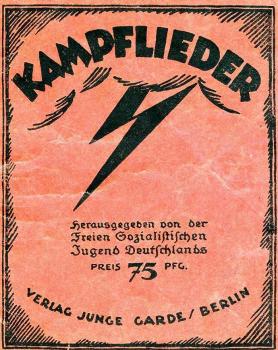 La questione della Warschawjanka, la Warszawianka in lingua tedesca, presenta molti lati oscuri. Il Volksliederarchiv, che senz'altro è una fonte autorevole, è categorico: “Der Verfasser der Übersetzung ist unbekannt”, l'autore della traduzione è sconosciuto. La versione sembra essere stata pubblicata in alcuni canzonieri di lotta tedeschi attorno al 1920; con certezza in Kampflieder (“Canti di lotta”), pubblicato nel 1919, l'anno della fallita rivolta Spartachista e dell'assassinio di Rosa Luxemburg e Karl Liebknecht, dalla Freie Sozialistische Jugend Deutschlands (“Libera Gioventù Socialista di Germania”), edizioni Junge Garde, Berliner Musikalien Druckerei GmbH. Si conosce anche il prezzo del canzoniere: 75 Pfennig. Il fatto che la Warschawjanka sia presente in questo ed in altri canzonieri dell'epoca, quel primo dopoguerra tedesco che fu un periodo di rivolgimenti, di tentativi insurrezionali stroncati nel sangue e di cruenta reazione, fa probabilmente capire che la versione tedesca risale proprio a quegli anni.
La questione della Warschawjanka, la Warszawianka in lingua tedesca, presenta molti lati oscuri. Il Volksliederarchiv, che senz'altro è una fonte autorevole, è categorico: “Der Verfasser der Übersetzung ist unbekannt”, l'autore della traduzione è sconosciuto. La versione sembra essere stata pubblicata in alcuni canzonieri di lotta tedeschi attorno al 1920; con certezza in Kampflieder (“Canti di lotta”), pubblicato nel 1919, l'anno della fallita rivolta Spartachista e dell'assassinio di Rosa Luxemburg e Karl Liebknecht, dalla Freie Sozialistische Jugend Deutschlands (“Libera Gioventù Socialista di Germania”), edizioni Junge Garde, Berliner Musikalien Druckerei GmbH. Si conosce anche il prezzo del canzoniere: 75 Pfennig. Il fatto che la Warschawjanka sia presente in questo ed in altri canzonieri dell'epoca, quel primo dopoguerra tedesco che fu un periodo di rivolgimenti, di tentativi insurrezionali stroncati nel sangue e di cruenta reazione, fa probabilmente capire che la versione tedesca risale proprio a quegli anni.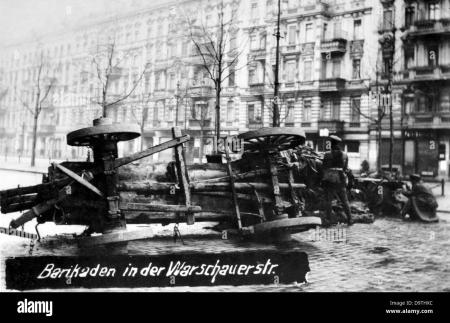
La Warschawjanka tedesca è una versione importante anche perché vi compaiono le “barricate”, che rappresenteranno una parte fondamentale della complessa storia di questo canto. In realtà, come già specificato in questa pagina, l'immagine delle barricate è già presente in un canto polacco del 1899, Na barykady, scritto da Ignacy Rzońca e con melodia di autore ignoto; che ci sia stata una certa confusione, appare chiaro da fonti che hanno generato anacronistici errori, come l'attribuzione della melodia di Na barykady a Józef Pławiński, che la avrebbe addirittura ripresa dalla stessa Marsz Żuawów che pare essere alla base della melodia della Warszawianka 1905 roku storica. Tale affermazione è impossibile: lo si capisce dal fatto che le due melodie non hanno nessun punto di contatto e, soprattutto, dal fatto che, nel 1899, Józef Pławiński era già morto da diciannove anni (era morto l'8 agosto 1880) e che, quindi, non avrebbe potuto comporre alcunché.
Detto questo, e comunque ritenendo possibili delle influenze reciproche (che esistono, specialmente in determinati periodi, tra ogni canto di lotta), è nella Warschawjanka tedesca che le barricate compaiono per la prima volta all'interno della storia di questo canto. Assumeranno sempre più importanza: tra gli anni '20 e '30 si sviluppano in Germania alcune versioni, generalmente più brevi, incentrate proprio sull'immagine della chiamata alle barricate. Una di queste, portata in Spagna nel 1932 dal giovane anarcosindacalista tedesco Alfred Schulte, sarà tradotta in spagnolo da Valeriano Orobón Fernández, aiutato dalla moglie Hilde, di origine tedesca: è ¡A las barricadas! E' quindi direttamente dalla Germania e da questa versione della Warschawjanka che le barricate della Berlino spartachista iniziano il loro cammino verso la Barcellona del 1936. [RV]
The German Warschawjanka and the barricades
The history of the Warschawjanka, the Warszawianka in German, is somewhat obscure, or unclear. The Volksliederarchiv (“Folksong Archive”), indeed a very reliable source, affirms categorically: “Der Verfasser der Übersetzer ist unbekannt”, the author of the translation is unknown. The version appeared in a number of German struggle songbooks around 1920 and, surely, in Kampflieder (“Struggle Songs”), published in 1919 -the same year as the failed Spartacist revolt and Rosa Luxemburg's and Karl Liebknecht's assassination occurred- by Freie Sozialistische Jugend Deutschlands (“Free Socialist Youth of Germany”), Junge Garde publishing house, Berliner Musikalien Druckerei GmbH. We know the price of the booklet: 75 pfennigs. From all this, it may be inferred that the German version of the song probably originated from those years. The Warschawjanka is included in a number of songbooks from post WW1 years, a period of strong changes, failed revolts crushed in blood and sanguinary reaction.
The text of the German Warschawjanka shows original features fitting well its historical period. It stands out among all versions of the Varshavianka for its nature of a very violent and outspoken struggle song of revolt. It originated in a revolutionary period and carries revolutionary ideas. The song shows not only old-fashioned and high-falutin language, a common feature of most European revolutionary songs of that time, but also religious imagery (the “holy and sanguinary battles”, the “Dead sacred to millions”, not to mention the metaphor “they reap what they sowed”, originating in the Bible and already occurring in the Internationale, like the “final battle”). It is well known that the (especially Anarchist) struggle songs from the 19th and 20th century often show religious language and expressions.
The German Warschawjanka is also noteworthy for its early mention of the “barricades”, a basic element in the complicated history of this song. As a matter of fact, as already mentioned in this page, the image of the barricades was first included in a Polish song from 1899, Na barykady, written by Ignacy Rzońca (the composer of its melody is unknown). Confusion has arisen about this song, as shown by several sources which have originated mistakes and anachronism -like attributing the melody to Józef Pławiński. According to these sources, Pławiński was supposed to have drawn the melody of Na barykady from Marsz Żuawów, the possible source of the melody of the historical Warszawianka 1905 roku. This is clearly impossible: the melodies are not connected and, in addition to this, Józef Pławiński had died nineteen years before its composition, on 8 August 1880. He could not have composed anything in 1899.
Of course, reciprocal influence between struggle and revolutionary songs is always possible as in any such historical period; anyway, the barricades first appear in the history of this song just in this German version. These barricades will become even more and more important: between the 1920s and 1930s, a number of (generally shorter) German versions develop, all focused on the image of the call to barricades. One of these versions, carried to Spain in 1932 by the young German Anarcho-syndicalist Alfred Schulte, is translated into Spanish by Valeriano Orobón Fernández, helped by his German-born wife Hilde: it is ¡A las barricadas!. Thus, it is directly from Germany and from this version of the Warschawjanka that the barricades of Spartacist Berlin made their way to 1936 Barcelona. [RV]
Feindliche Stürme durchtoben die Lüfte,
Drohende Wolken verdunkeln das Licht.
Mag uns auch Schmerz und Tod nun erwarten,
Gegen die Feinde ruft auf uns die Pflicht.
Wir haben der Freiheit leuchtende Flamme
Hoch über unseren Häuptern entfacht:
Die Fahne des Sieges, der Völkerbefreiung,
Die sicher uns führt in der letzten Schlacht
Bezwinge die Feinde, du Arbeitervolk.
Auf die Barrikaden, auf die Barrikaden,
Erstürme die Welt, du Arbeitervolk!
Tod und Verderben allen Bedrückern,
Leidendem Volke gilt unsere Tat,
Kehrt gegen sie die mordenden Waffen,
Daß sie ernten die eigene Saat!
Mit Arbeiterblut gedüngt ist die Erde,
Gebt euer Blut für den letzten Krieg,
Daß der Menschheit Erlösung werde!
Feierlich naht der heilige Sieg.
Bezwinge die Feinde, du Arbeitervolk.
Auf die Barrikaden, auf die Barrikaden,
Erstürme die Welt, du Arbeitervolk!
Elend und Hunger verderben uns alle,
Gegen die Feinde ruft mahnend die Not,
Freiheit und Glück für die Menschheit erstreiten!
Kämpfende Jugend erschreckt nicht der Tod.
Die Toten, der großen Idee gestorben,
Werden Millionen heilig sein.
Auf denn, erhebt euch, Brüder, Genossen,
Ergreift die Waffen und schließt die Reih'n!
Bezwinge die Feinde, du Arbeitervolk.
Auf die Barrikaden, auf die Barrikaden,
Erstürme die Welt, du Arbeitervolk! [3]
Riccardo Venturi, 17-11-2021
Tempeste ostili infurian per l'aria,
Nubi minacciose oscurano la luce.
Anche se ci attendono il dolore e la morte,
Contro i nemici ci chiama il dovere.
La fiamma luminosa della Libertà
Abbiamo accesa sulle nostre teste:
Bandiera di vittoria e di liberazione dei popoli,
Che sicuramente ci condurrà alla battaglia finale.
Su! Su, adesso, alle cruente e sante battaglie,
Sconfiggi i nemici, tu, popolo lavoratore!
Alle barricate, alle barricate,
Espugna il mondo, tu, popolo lavoratore!
Morte e rovina a tutti gli oppressori,
La nostra azione è per il popolo che soffre,
Contro di loro si rivolgan le armi micidiali
Così che raccolgan ciò che loro stessi hanno seminato!
La terra è intrisa di sangue dei lavoratori,
Date il vostro sangue per l'ultima guerra
Affinché divenga liberazione per l'Umanità!
La sacra vittoria si avvicina solennemente.
Su! Su, adesso, alle cruente e sante battaglie,
Sconfiggi i nemici, tu, popolo lavoratore!
Alle barricate, alle barricate,
Espugna il mondo, tu, popolo lavoratore!
Miseria e fame ci mandan tutti in rovina,
Contro i nemici chiama e ammonisce la povertà,
Ottenere libertà e fortuna per l'Umanita!
La gioventù in lotta non teme la morte.
I morti, periti per il grande Ideale,
Saranno santificati a milioni.
Su, dunque, insorgete, fratelli, compagni,
Impugnate le armi e serrate i ranghi!
Su! Su, adesso, alle cruente e sante battaglie,
Sconfiggi i nemici, tu, popolo lavoratore!
Alle barricate, alle barricate,
Espugna il mondo, tu, popolo lavoratore!
[2] Var. zum Freiheitskampfe
[3] English translation / Traduzione inglese
(--> Lyricstranslate)
Threatening clouds are obscuring the light.
Even though pain and death may await us now,
Duty calls us against the enemies.
We have sparked the bright flame of freedom
High above our heads:
The flag of victory, of the peoples' liberation,
That reliably leads us in the final battle.
On, on to the struggle for liberation now!
Defeat the enemies, you working people!
To the barricades, to the barricades!
Take the world by storm, you working people!
Death and ruin to all oppressors!
Our actions are now for the suffering people.
Pointing the weapons at the masters,
So that they reap what they sowed!
Earth soaked with workers' blood
Forces us forward in the masters' war.
So that it will be the liberation of humanity!
Sacred victory solemnly approaches.
On, on to the struggle for liberation now!
Defeat the enemies, you working people!
To the barricades, to the barricades!
Take the world by storm, you working people!
Misery and hunger blight all of us,
Poverty admonishingly calls against the enemy.
To gain freedom and happiness for humanity —
Death doesn't scare the fighting youth.
The dead, who died for the great idea,
Will be sacred to millions.
Onwards now, arise, brothers, comrades,
Take your weapons and close your rows!
On, on to the struggle for liberation now!
Defeat the enemies, you working people!
To the barricades, to the barricades!
Take the world by storm, you working people!
Contributed by Riccardo Venturi - 2007/10/11 - 12:45
1g. Taistoihin tuimiin - The first Finnish version by Santtu Piri [1908]
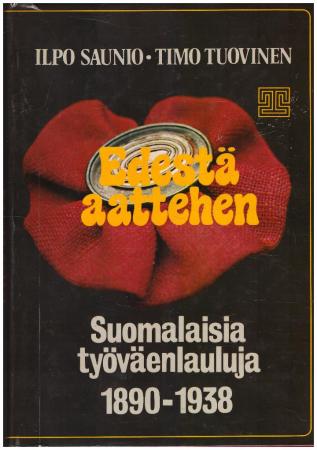
Note. The information in this Finnish Warszawianka section is mainly based on the research by Ilpo Saunio and Timo Tuovinen published in their 1978 book Edestä aattehen - suomalaisia työväenlauluja 1890 - 1938 (For the Cause - Finnish Working Class Songs 1890 - 1938). This holds for all versions from 1g to 1g5. Previous information has been maintained only when still valid. - Juha Rämö [JR]
Nota. Le informazioni contenute in questa sezione finlandese di questa pagina si basano principalmente sulla ricerca di Ilpo Saunio e Timo Tuovinen, Edestä aattehen - suomalaisia työväenlauluja 1890 – 1938 („Per la causa – Canzoni dei lavoratori finlandesi 1890-1938“). Questo si applica a tutte le versioni da 1g a 1g5. Le informazioni precedenti sono state mantenute solo se ancora valide. - Juha Rämö [JR]
The first known Finnish Warszawianka translation titled Taistoihin tuimiin (To Fierce Battles) was made in 1908 by Santtu Piri, a Finnish working class poet and tailor living in Russian St. Petersburg, and first published in Työväen kalenteri 1909 [Workers' Almanac 1909] (The entire volume -168 pages- is available here in digitized form).
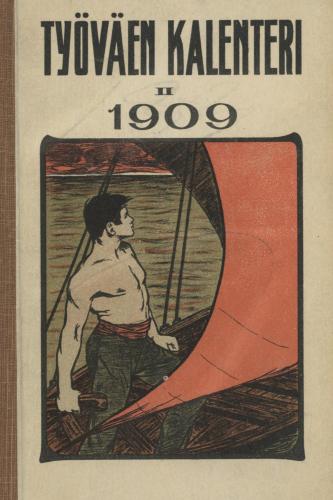
The text, like most Finnish Warszawianka versions, is based more or less on the Russian translation of the song by Gleb Krzhizhanovsky from 1897 rather than the Polish original.
This is the oldest existing recording of Finnish Warszawianka from December 31, 1916. It is performed to the lyrics of Taistoihin tuimiin by Juho Koskelo, a Finnish singer and cellist who emigrated to the USA in 1910. Between 1910 and 1923 Koskelo made a total of 112 recordings in Finnish and Swedish for His Master's Voice, Columbia Records, Victor Talking Machine Company and Gramophone Company. This song was made for Columbia Records with the title Warshavjanken, which looks like a plump Swedish translation of Warszawianka, and released as a single Warshavjanken. In the video, the version appears in connection with Työväen Opisto (Work People's College) of Smithville, near Duluth, Minnesota, a vocational school for immigrant Finnish workers where general education was also provided. Later, between 1921 and 1941, Smithville's Työväen-Opisto would act as an official institution of the Industrial Workers of the World.
The lyrics of Taistoihin tuimiin are written in archaic Finnish. They contain words that either no longer exist or never have existed. These include the verb forms vinhuu, sinhuu, häytyy and väilyy. It's probably safe to assume that they were used in the text only for the sake of rhyme.
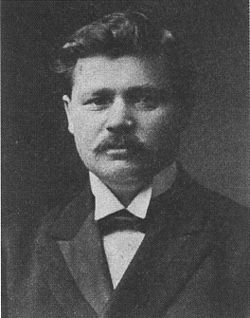
Secondo Mauno Saksanen (1916-1982), un celebre direttore d'orchestra finlandese, la melodia della Warszawianka era stata introdotta in Finlandia già nel 1900 come versione in spartito musicale sciolto ripresa da un canzoniere tedesco.
La prima traduzione della Warszawianka in lingua finlandese, intitolata Taistoihin tuimiin („Alle fiere battaglie“), fu eseguita nel 1908 da Santtu Piri, poeta lavoratore e sarto di professione, che viveva a San Pietroburgo. Fu pubblicata per la prima volta nel Työväen kalenteri 1909 [Almanacco dei Lavoratori 1909] (l'intero volume -168 pagine- è qui disponibile in forma digitalizzata). Il testo, al pari di quello della maggior parte delle versioni finlandesi, si basa più o meno sulla versione russa di Gleb Kržižanovskij del 1897, più che sull'originale polacco.
La registrazione qui presente (v. video) è la più antica esistente della Warszawianka in finlandese: risale al 31 dicembre 1916. È eseguita sul testo di Taistoihin tuimiin da Juho Koskelo, un cantante e violoncellista finlandese che era emigrato negli Stati Uniti nel 1910. Tra il 1910 e il 1923, Koskelo effettuò un totale di 112 registrazioni in finlandese e in svedese per La Voce del Padrone, Columbia Records, Victor e Gramophone. Questa canzone fu registrata per Columbia Records col titolo di Warshavjanken, che suona come una buffa traduzione svedese di „Warszawianka“, e pubblicata in single come Warshavjanken. Nel video, la versione appare collegata alla Työväen Opisto (Scuola dei Lavoratori) di Smithville, presso Duluth, Minnesota, una scuola professionale per lavoratori finlandesi immigrati dove veniva fornita anche un'istruzione generale. Più tardi, tra il 1921 e il 1941, la Työväen-Opisto di Smithville sarebbe divenuta un'istituzione ufficiale degli Industrial Workers of the World.
Il testo di Taistoihin tuimiin è scritto in finlandese arcaico. Contiene parole attualmente non più esistenti, o che non sono mai esistite (ad esempio le forme verbali vinhuu, sinhuu, häytyy e väilyy. Con ragionevoli margini di probabilità, furono usate nel testo soltanto per questioni di rima. [trad. RV]
Tunnetun suomalaisen kapellimestarin Mauno Saksasen (1916 - 1982) mukaan Varšavjankan melodia tunnettiin Suomessa jo vuonna 1900, jolloin sen nuotit saatiin maahan erään saksalaisen laulukirjan myötä.
Ensimmäisen tunnetun suomenkielisen Varšavjankan käännöksen nimeltä Taistoihin tuimiin teki vuonna 1908 Pietarissa asunut suomalainen työväenrunoilija ja räätäli Santtu Piri, ja se julkaistiin alunperin Työväen kalenterissa vuodelta 1909. Pirin käännös, kuten useimmat suomenkieliset Varšavjankan versiot, perustuu pikemminkin Gleb Kržižanovskin venäjänkieliseen laulun käännökseen vuodelta 1897 kuin puolankieliseen alkuperäistekstiin. Pirin käännös on vanhahtavaa suomea. Siinä on käytetty sanoja, joita joko ei enää ole tai joita ei ole koskaan ollutkaan. Tällaisia ovat muunmuassa verbimuodot vinhuu, sinhuu, häytyy ja väilyy. Oletettavasti niitä on käytetty tekstissä vain riimittelyn vuoksi.
Yllä on suomenkielisen Varšavjankan vanhin säilynyt äänite. Se on tehty 31. joulukuuta 1916, ja sen esittää Santtu Pirin käännöksen sanoin vuonna 1910 Yhdysvaltoihin muuttanut suomalainen laulaja ja sellisti Juho Koskelo. Vuosina 1910 - 1923 Koskelo teki yhteensä 112 suomen- ja ruotsinkielistä levytystä His Master's Voicelle, Columbia Recordsille, Victor Talking Machine Companylle ja Gramophone Companylle. Varšavjankan Koskelo teki Columbia Recordsille nimellä Warshavjanken, joka näyttää ontuvalta ruotsinnokselta laulun suomenkielisestä nimestä, ja se julkaistiin singlenä, jonka B-puolella oli Oskar Merikannon Työväen marssi.
Yllä olevalla videolla on kuva Smithvillessä Duluthissa vuosina 1907 - 1941 toimineesta Työväen Opistosta jossa suomalaiset siirtolaiset saivat Suomen kielen ja kulttuurin ohella opetusta mm. sosialismin teoriassa, historiassa, taloustieteessä, lakiopissa, sosiologiassa ja evoluutiobiologiassa. [JR]
[Warshavjanken]
Vainoovat viimat nyt yllämme vinhuu,
synkeinten voimain työ vimmainen syö;
taistoihin tuimiin jo joukkomme sinhuu
tummaa on eessämme taivallus vyö.
Uljaimman ylväinnä nostamme sentään
oikeusaatteen ja työn taistoviirin,
vapaus työhön min johdoin jo entää
onnensa vuoks kansat maan kautta piirin.
vaateet on tunnon ja kansalliskunnon.
Kootuilla voimin, hei, tarmoisin toimin,
työkansa, käyös ain eespäin nyt vain!
Nälkään jo työläisten kuollansa täytyy,
veljet, nyt kauempi vaienta pois!
Semmoista meiss' ei, mi taistosta häytyy,
vaiontamestuu ei kammoisa ois!
Unhoon ei haivu se, uhriks mi antauen
aatteille altisna vaaroihin väilyy,
voittomme lauluissa maineensa kantauen
miljoonain muistoissa rakkainna säilyy.
vaateet on tunnon ja kansalliskunnon.
Kootuilla voimin, hei, tarmoisin toimin,
työkansa, käyös ain eespäin nyt vain!
Kansamme kärsintä kallis on meille:
tyranniruunut saa inhonnan vaan –
veljein vuo verten vuos valtansa teille,
vainoojahurmein nyt huuhdomme maan.
Surman jo saa kohta armotta aivan
tuo, loisjoukon hiellämme juovuntaretki:
kostamme sorron ja vainontavaivan,
koht' ompi voittomme juhlaisa hetki!
vaateet on tunnon ja kansalliskunnon.
Kootuilla voimin, hei, tarmoisin toimin,
työkansa, käyös ain eespäin nyt vain!
Contributed by Boreč - 2021/9/9 - 16:34
1g1. Puolan työväen marssi / Varsovalainen - 1908 / 1919
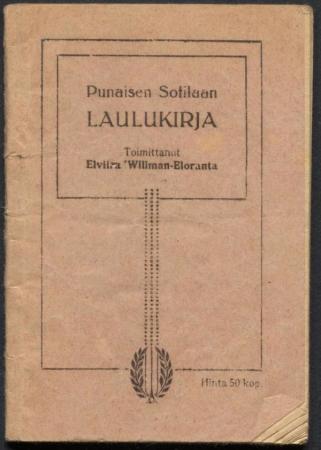
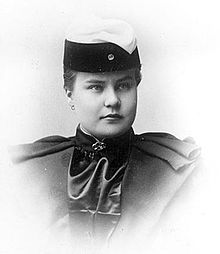
Nel 1908, un'altra versione della Warszawianka intitolata Puolan työväen marssi („Marcia dei lavoratori polacchi“) fu pubblicata da J. Kaikka nel canzoniere da fogli volanti Työväenlauluja (Canzoni dei Lavoratori). Nello stesso anno, il testo della canzone, di autore sconosciuto ed il cui primo verso recitava (nella grafia germanizzante in uso all'epoca) »Wihurit wihaisna taas waikeroi« („Forti raffiche di vento gemono iratamente“) fu pubblicato in un canzoniere socialdemocratico e in un opuscolo di canti per lavoratori con il titolo Puolan veripäivien marssi („Marcia delle sanguinose giornate polacche“, in riferimento agli avvenimenti del 1905). Leggermente modificto e con l'aggiunta di una strofa, il medesimo testo fu pubblicato undici anni dopo in Punaisen sotilaan laulukirja („Canzoniere del Soldato Rosso“) da Elvira Willman-Eloranta (1875-1925), stavolta col titolo Varsovalainen („La Varsaviese“). E' il testo che qui si riproduce. [trad, / ad. RV]
Vihaiset viimat nyt yllämme soivat
Sortoa syöksevät nuo mustat voimat
Nouskaamme taistohon vääryyttä vastaan
Kunnekka kohtalo meidät nyt saa.
Aatteemme kallis on, puhdas ja pyhä,
Eespäin sen puolesta riennämme yhä
Kaikkien kansojen taistohon suureen
Lippumme korkeelle nyt liehumaan.
Eespäin sen puolesta riennämme yhä,
Riennämme, riennämme lippumme juureen
- Mars! - eespäin mars! - Kiiruhtakaa!
Nälkähän nääntyvät raatajaorjat
Vieläkö veikkoset oottaisimme,
Joukkoomme liittyy jo nuoretkin orjat
Pyövelii kurjaa me peljätä ei!
Kaatuu ken taistossa aattehen suuren,
Sankari-nimi sen säilyvi ain',
Voittojen hymniä lauleltaissa
Kaikuu se huulita miljoonain.
Eespäin sen puolesta riennämme yhä,
Riennämme, riennämme lippumme juureen
- Mars! - eespäin mars! - Kiiruhtakaa!
Ryövärijoukot nyt vainoovat meitä
Kansan kun kahleita katkoilemme,
Särjemme rikki nuo tahratut kruunut
Verin me kostamme sortajamme.
- Tarttukaa, tarttukaa koston kalpaan!
Syöskää se syvälle syömmehen halpaan!
Tulkoon nyt konnille kuoleman yö,
Kansojen vapauden hetki jo lyö!
Eespäin sen puolesta riennämme yhä,
Riennämme, riennämme lippumme juureen
- Mars! - eespäin mars! - Kiiruhtakaa!
Contributed by Juha Rämö - 2021/11/2 - 20:09
1g2. Ankarat viimat - Finnish version from 1912 wrongly attributed to Santtu Piri


Questa versione, intitolata Ankarat viimat (“Vènti impetuosi”) fu pubblicata per la prima volta in Työväen laulukirja („Canzoniere dei lavoratori“) nel 1912. Negli archivi musicali finlandesi, il testo della canzone è attribuito a Santtu Piri (si veda 1g.) mentre, per Ilpo Saunio e Timo Tuovinen, l'autore è ignoto. Un confronto linguistico tra la presente versione e la versione 1g. di cui sopra (Taistoihin tuimiin) suggerisce fortemente che i dati degli archivi musicali non siano corretti. In compenso, il testo di Ankarat viimat appaiono assai simili a quelli della Varsovalainen (1g2.)
Una versione derivata da Ankarat viimat, intitolata semplicemente Varshavjanka e probabilmente tradotta da Jalmari Virtanen (1889-1939) con lo pseudonimo di „J.“, ed il cui primo verso recita »Ankarasti viimat ne yllämme soittaa« („Vènti impetuosi risuonano sopra di noi“) , fu pubblicata per la prima volta in Kumouslauluja („Canti rivoluzionari“, S. Pietroburgo 1920) e più tardi, leggermente modificata, in Taistelulauluja („Canti di lotta“, Petrozavodsk 1941) e in Lauluja koululaisille („Canti per Scolari“, Petrozavodsk 1955). [trad,/ad. RV]
Ankarat viimat ne yllämme soivat,
hirmua, kauhua haastavat ne.
Sortoa syöksevät synkeät voimat,
taistohon meitäkin vaativat ne.
Aatteemme kallis on puhdas ja pyhä,
eespäin sen puolesta riennämme yhä.
Kaikkien kansojen taistohon suureen
lippumme korkeelle nyt liehumaan.
eespäin sen puolesta riennämme yhä.
Taistohon, taistohon lippumme juureen
mars, eespäin mars, nyt kiiruhtakaa.
Nääntyvät nälkähän raatajaorjat.
Tuotako, veikkoset, sallisimme?
Joukkoomme liittyvät nuoretkin, sorjat.
Pyöveliä kurjaako pelkäisimme?
Kaatuu ken puolesta aattehen suuren,
sankarin maine sen säilyvi ain'.
Voittojen hymniä laulettaessa
kaikuvi huulilta miljoonain.
eespäin sen puolesta riennämme yhä.
Taistohon, taistohon lippumme juureen
mars, eespäin mars, nyt kiiruhtakaa.
Julmurijoukot ne vainoovat meitä,
kahleita kansan kun katkomme me.
Hyökkäämme taistohon vastahan heitä,
voitamme, suistamme sortajamme.
Orjanko onnehen tyydymme halpaan?
Ei, vaan me tartumme taistelukalpaan.
Kansoille saakoon jo onnensa hetki,
päättyköön sorrannan synkeä yö.
eespäin sen puolesta riennämme yhä.
Taistohon, taistohon lippumme juureen
mars, eespäin mars, nyt kiiruhtakaa.
Contributed by Juha Rämö - 2015/4/2 - 23:56
1g3. Varshavjanka - The Finnish version from 1918
The »final« Finnish version of Waszawianka, as Saunio and Tuovinen put it, was written by an unknown author presumably in 1918 with the title Varshavjanka and published in Taistelulauluja (Songs of Struggle, Kuopio 1921) and in Köyhälistön laulukirja (Proletarian Songbook 1923). In his 1971 book Laulukirja - työväen lauluja kahdeksalta vuosikymmeneltä (A Songbook - Finnish Working Class Songs from Eight Decades), Pekka Gronow - a renowned ethnomusicologist and long-time head of the Record Archive of the Finnish Broadcasting Company YLE- writes:

In the early years, it didn't seem to enjoy much popularity, since old Red Guardists (interviewed by Gronow for his book) couldn't remember it. The final breakthrough of this version took place in 1972 when it was recorded by KOM-teatteri and released on their album Kansainvälinen (The Internationale). Ever since, this has been the best known and most popular of all the Finnish Warszawianka versions. [JR]
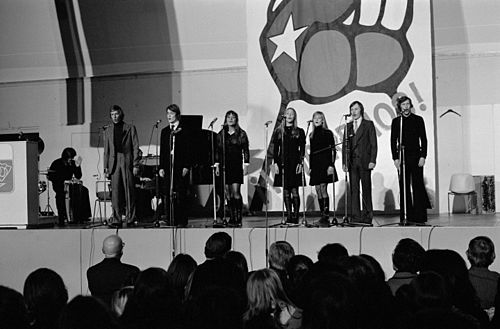
La versione „definitiva“ della Warszawianka, così come stabilito da Saunio e Tuovinen, fu scritta da un autore anonimo presumibilmente nel 1918. Intitolata semplicemente Varshavjanka, fu pubblicata in Taistelulauluja („Canti di lotta“, Kuopio 1921) e in Köyhälistön laulukirja („Canzoniere proletario“, 1923). Nel suo libro del 1971 Laulukirja - työväen lauluja kahdeksalta vuosikymmeneltä („Il Canzoniere – Otto decenni di canti dei lavoratori finlandesi“), Pekka Gronow - celebre etnomusicologo e a lungo direttore dell'Archivio Sonoro della Radiotelevisione Finlandese YLE- scrive:
Nei primi anni non sembra aver goduto di molta popolarità, poiché le vecchie Guardie Rosse (intervistate da Gronow per il suo libro) non se la ricordavano. L'impulso definitivo a questa versione fu dato nel 1972, quando fu registrata dal KOM-teatteri e pubblicata nell'album Kansainvälinen („L'Internazionale“). Da allora è la versione meglio conosciuta e più popolare tra tutte quelle della Warszawianka in finlandese. [trad./ad. RV]
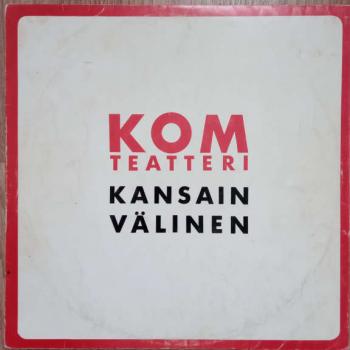
Riistäjät ruoskaansa selkäämme soittaa,
vastassa valkoinen armeija on:
pakko on taistella, kuolla tai voittaa,
ratkaisu eessä on tuntematon,
mutta me nostamme purpppuravaatteen,
taistoon mi työläiset kutsua voi,
rohkeina puolesta veljeysaatteen
käymme ja kaikille laulumme soi.
puolesta raatajat, eespäin mars!
Aatteemme ainoan, kalliin ja oikean
puolesta raatajat, eespäin mars!
Veljemme vankila tyrmiinsä sulkee
kostaja kultakin kalleimman vei.
Ilkkuen roistot ja ryövärit kulkee
sellaista kauemmin sallita ei!
Vääryyttä vastaan me taistelun teillä
kuljemme: kostoa kalpamme soi.
Vaikkakin yksilöt sortuisi siellä
muistonsa konsana kuolla ei voi!
puolesta raatajat, eespäin mars!
Aatteemme ainoan, kalliin ja oikean
puolesta raatajat, eespäin mars!
Valtikat, krunut me pirstoiksi lyömme
orjuuden kahlehet katkomme me.
Kauhea joskin on puhdistustyömme
ihmisten onnen on ehtona se.
Siksipä säälittä taistelun tielle
voitto on työväen — tiedämme sen.
Porvarit, keisarit — helvetti heille
olkoon nyt töistänsä armollinen!
puolesta raatajat, eespäin mars!
Aatteemme ainoan, kalliin ja oikean
puolesta raatajat, eespäin mars!
Contributed by Riccardo Venturi - 2007/10/11 - 21:34
1g4. The Finnish-American IWW version from 1918/1920
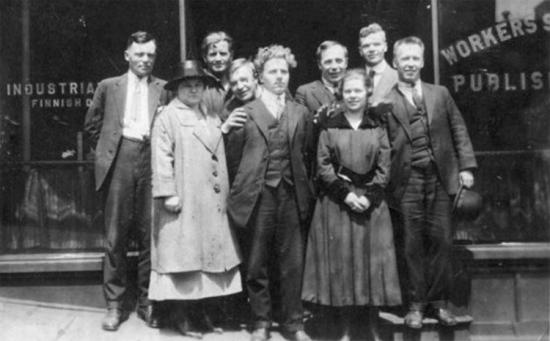
La presente sezione è vuota, vale a dire non contiene né testi né audiovisuali. È stata costruita esclusivamente per riflettere la storia delle versioni finlandesi della Warszawianka, con informazioni storiche. Non esitate ad aggiungere testi e/o video, se disponibili. [RV]
The Finnish Wobblies, or members of the Industrial Workers of the World (IWW), or tuplajuulaiset (double-u'ers) as they called themselves, have a Warszawianka of their own. Titled Varsovalainen (The Varsovian) and with the first verse reading »Vihaiset vihurit vastaamme ärjyy« (Angry gusts roar against us), it was published in Proletaari Lauluja (Proletarian Songs 1918) and Raatajain Lauluja (Toilers' Songs 1920), both by Workers Socialist Publishing Company, Duluth, Minnesota. The lyrics of this version are yet to be found. [JR]
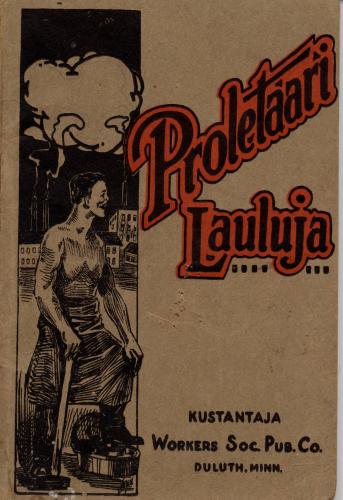
The Työväen Opisto (Work People's College), founded in Smithville, Duluth in 1903 and already mentioned here (see 1g.), where it appears in connection, in a rare video, with the first version of the Finnish Warszawianka by Santtu Piri recorded by Juho Koskelo in 1916, was an official institution of the Finnish IWW from 1921 until 1941. [RV]

I Wobblies finlandesi, vale a dire i membri degli Industrial Workers of the World (IWW), tuplajuulaiset (cioè „quelli della doppia W“, o anche iituplajuu, la resa finlandizzata di „IWW“), hanno una Warszawianka propria. Intitolata Varsovalainen (La Varsaviese), ed il cui primo verso recita »Vihaiset vihurit vastaamme ärjyy« („Folate impetuose ci ruggiscono addosso“), fu pubblicata in Proletaari Lauluja („Canti proletari“, 1918) e in Raatajain Lauluja („Canzoni di chi fatica“, 1920), entrambi da Workers Socialist Publishing Company, Duluth, Minnesota. Il testo della versione è ancora irreperibile. [trad./ad. RV]
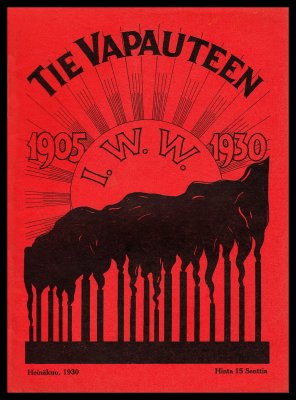
Il Työväen Opisto (Scuola, o Collegio, dei Lavoratori), fondato a Smithville, Duluth nel 1903 e già qui menzionato (si veda 1g.), dove appare connesso -in un raro video- alla prima versione finlandese della Warszawianka di Santtu Piri, registrata da Juho Koskelo nel 1916, rimase un'istituzione ufficiale degli IWW finlandesi dal 1921 fino al 1941. [RV]
Juha Rämö + RV - 2021/11/4 - 11:25
1g5. Warszawianka offsprings in Finnish and Veljiksi kaikki by Emil Elo [1906]
Oltre alle reali versioni finlandesi della Warszawianka, esistono alcuni “derivati”, vale a dire, canzoni composte sull'aria della Warszawianka, ma con testi che poco o nulla hanno a che fare con quello originale. Secondo Saunio e Tuovinen, tra di esse si hanno: Taistelulaulu (“Canto di lotta”, 1913) di Moses Hahl, un giornalista e autore socialista finno-americano; Raatajain laulu (“Canzone di chi fatica”, 1918), Kuinka kauvan (“Quousque tandem”, 1918) e Ensimmäisen Suomalaisen Tarkka-ampujarykmentin marssi (Marcia del Primo Reggimento di Fucilieri Finlandesi, 1918) di Elvira Willman-Eloranta. [trad./ad. RV]
The song performed by Reijo Frank on a 1969 album titled Työväen lauluja (Working Man's Songs)
Perhaps the best known Warszawianka offspring, titled Veljiksi kaikki (Let's All Be Brothers), is based on a poem written by Emil Elo (1879 - 1953), a well-known Finnish journalist and social democrat, and published in 1906 in Työväen laulukirja (Workers' Songbook, edited by Eemeli Kunnas for Työväen Sanomalehti Publishing Company). [JR]

Forse, il più noto „derivato“ della Warszawianka, intitolato Veljiksi kaikki („Diventiamo tutti fratelli!“) è basato su una poesia scritta da Emil Elo, un celebre giornalista socialdemocratico finlandese. Fu pubblicata nel 1906 nel Työväen laulukirja („Canzoniere dei Lavoratori“, a cura di Eemeli Kunnas, per la casa editrice Sanomalehti). [trad. RV]
Veljiksi kaikki ihmiset tulkaa,
arvohon samaan lapsoset maan.
Veljiksi kaikki, käskyä kuulkaa,
varmasti onneen viepi se vaan.
Veljiksi kaikki, käskyä kuulkaa,
varmasti onneen viepi se vaan.
Pois jo nyt herruus, kiiltävät kuoret,
huutakaa vaatien, tuhannet suut.
Arvohon samaan vanhat ja nuoret,
raatajat raskaan työn sekä muut.
Arvohon samaan vanhat ja nuoret,
raatajat raskaan työn sekä muut.
Pois jo nyt sorto, harvojen valta,
ihmiseks' ihmiset tunnustakaa.
Pilkatut, nouskaa painojen alta,
arvonsa vasta vaatien saa.
Pilkatut, nouskaa painojen alta,
arvonsa vasta vaatien saa.
Yhtehen arvoon kaikki kun saamme,
poistuvi riidat, kurjuuskin pois.
Luonnon jos aarteet sovussa jaamme,
kaikille hyvää kylliksi ois.
Luonnon jos aarteet sovussa jaamme,
kaikille hyvää kylliksi ois.
Contributed by Juha Rämö - 2015/4/2 - 23:57
1g6. Finnish version by the Finnish Rural Party (Suomen Maaseudun Puolue)
Pientalonpoikain taistelumarssi (Small Farmers' Struggle March) below is a curiosity that has nothing to do with the original message of Warszawianka. Instead, it's merely a compilation of the populist political jargon of the former Finnish Rural Party (Suomen Maaseudun Puolue, SMP). The author of the lyrics is Pauno Haapamäki. [JR]
Il seguente Pientalonpoikain taistelumarssi (“Marcia di lotta dei contadini piccoli proprietari”, o “dei coltivatori diretti”, o qualcosa del genere) è una curiosità che non ha niente a che fare con il messaggio originale della Warszawianka. Si tratta invece di una sorta di riassunto degli slogan programmatici populisti dell'ex “Partito Rurale Finlandese” (Suomen Maaseudun Puoulue, SMP). Il testo è stato scritto da Pauno Haapamäki. [trad/ad. RV]
It was a Finnish political party formed in the late 1950s as a breakaway from the Centre Party (which was called the Rural League back then). It wad lead by Veikko Vennamo, a popular politician who had settled the Karelian population who had moved away from the territories ceded to the Soviet Union.
The Finnish Rural Party (originally called the Party of the Small Farmers) was a very populist party. It doesn't really fit on the left-right spectrum, because it's "ideology" was basically just Vennamo's political catchphrases and populism. Vennamo was a genius when it came to inventing political slogans and many of them are still in use.
The party saw some very succesful elections and some very poor ones. It was usually seen as a protest party against the "elite". Vennamo was also a very vocal critic of President Kekkonen.
In the late 1980s the party got into government and it's popularity quickly melted away. It eventually filed for bankruptcy and was replaced by The Finns Party." - Laiska - From a note to the YouTube Video
Raastuvan penkillä herralauma hilluu,
Rötösherrain takapuolet lumessa jo on.
Hetki on lyönyt, ja taistelu jatkuu,
Puolesta kansan ja oikeuden.
Sorretut nouse! Aika on kypsä!
Rötösherrain valta ja murtua saa.
Huipulla tuulee, kun marssimme kohti:
Puhdistus suuri jo alkanut on!
Aatteemme vahva kuin kalliopohja,
Kestää jo vuos' sadat vaihtua saa.
Pientalonpoikain aate kun voittaa,
Turvassa kansamme olla jo saa.
Lahjuslauman nälkä on valtavan suuri,
Kaikki se syö eikä piinakaan.
Kitkekäämme kerralla latva ja juuri,
Puolesta kansan ja syntymämaan.
Sorretut nouse! Aika on kypsä!
Rötösherrain valta ja murtua saa.
Huipulla tuulee, kun marssimme kohti:
Puhdistus suuri jo alkanut on!
Aatteemme vahva kuin kalliopohja,
Kestää jo vuos' sadat vaihtua saa.
Pientalonpoikain aate kun voittaa,
Turvassa kansamme olla jo saa.
Lahjusrahat pyörii ja herrat vain naurra,
Kohtalon sormet jo koukussa on.
Korruption valtaa kerran viel' katkee,
Oikeassa oikeuskansleri on.
Sorretut nouse! Aika on kypsä!
Rötösherrain valta ja murtua saa.
Huipulla tuulee, kun marssimme kohti:
Puhdistus suuri jo alkanut on!
Aatteemme vahva kuin kalliopohja,
Kestää jo vuos' sadat vaihtua saa.
Pientalonpoikain aate kun voittaa,
Rötösherrain takana on kalterit soi!
Contributed by アルバトロス795 - 2021/4/10 - 02:32
1h. Estonian version by Hans Pöögelmann [1906]
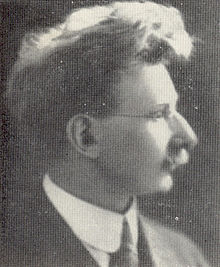
Da Sasslantis 2000
Lyrics are reproduced from Sasslantis 2000
Recorded in 1970. Footage from Estonian newsreel "Rahva Tahe" (1940)
Vaenlusetormid meist tuiskavad üle,
vihaselt rõhuvad tumedad jõud;
vaenlaset vastu viib võitlusesüle-
ees meil on tundmata saatusesõud.
Uhkelt ja võimsalt tõstame siiski
tööliste võitluselippu me käes,
astume rahvaste võitluseritta,
nõuame õigust ja vabadust väes.
Kohus meid kutsub -
Vapralt siis edasi, töölisteväed!
Veriseks võitluseks
Kohus meid kutsub -
Vapralt siis edasi, töölisteväed!
Nälgida seni jäänd tööliste osaks-
vennad, kas võime siis vaikida veel?
Võllas ja tapjate vihane kisa
võitlejaid vahvaid ei kohuta teel:
ükski ei kao, kes võitluseväljal
ohvriks on langenud aadete eest;
miljonid tänul neid kannavad meeles,
vaimustust saavad veel võitluseteest.
Kohus meid kutsub -
Vapralt siis edasi, töölisteväed!
Veriseks võitluseks
Kohus meid kutsub -
Vapralt siis edasi, töölisteväed!
Jälgid on meile türannide troonid,
püha meil orjade valu ja piin;
rahvaste verega määritud kroonid
vaenlaste veresse matame siin.
Armuta tasu rõhujad saagu,
kadugu kurnajad, suregu sund;
maha! kes toitvad end töörahva higist,-
ligi on võidukas pääsmisetund.
Kohus meid kutsub -
Vapralt siis edasi, töölisteväed!
Veriseks võitluseks
Kohus meid kutsub -
Vapralt siis edasi, töölisteväed!
Contributed by Riccardo Venturi - 2007/10/11 - 21:40
1h1. Estonian version by Vennaskond from the 1999 homonymous album.
Nota. Rispetto alla fonte, tutte le "w" nel testo sono state sostituite da "v" come è prescritto dall'ortografia estone. La "w", di origine tedesca, non è più usata dagli anni '30 del XX secolo e ignoro come mai molti siti estoni continuino ad usarla. [RV]
Vaenluse tormid meist tuiskavad üle,
Vihaselt rõhuvad tumedad jõud;
Vaenlaste vastu viib võitluse-süle-
Ees meil on teadmatu saatuse sõud.
Uhkelt ja võimukalt tõstame siiski
Tööliste võitluselippu me käes,
Astume rahvaste võitluse ritta,
Nõuame õigust ja vabadust väes.
Veriseks võitluseks kohus meid kutsub-
Vapralt siis edasi, töölisteväed!
Nälgi! on tänini tööliste osa-
Vennad, kas võime siis vaikida veel?
Võllas ja tapjate vihane kisa
Võitlejad vahvaid ei kohuta teel:
Ükski ei kao, kes võitluseväljal
Ohvriks on langenud aadete eest;
Miljonid tänul neid kannavad meeles,
Vaimustust saavad nad võitluse teest.
Veriseks võitluseks kohus meid kutsub-
Vapralt siis edasi, töölisteväed!
Jälgid on meile türannide troonid,
Püha meil orjade valu ja piin;
Rahvaste verega määritud kroonid
Vaenlaste veresse matame siin.
Armuta tasumist rõhujad saagu,
Kadugu kurnajad, suregu sund!
Maha! kes toitvad end töörahva higist,
Ligi on võidukas pääsemise tund.
Veriseks võitluseks kohus meid kutsub-
Vapralt siis edasi, töölisteväed!
Contributed by leoskini + CCG/AWS Staff - 2016/8/19 - 18:25
1j. Warushawa-Rōdōka: the Japanese Warszawianka by Kaji Wataru [鹿地 亘, 1927]
La Warushawa-Rōdōka è la versione storica della Warszawianka 1905 roku in lingua giapponese. Fu scritta da Kaji Wataru [Wataru Kaji in stile occidentale, 1903-1982], romanziere e rivoluzionario, nel 1927 basandosi sul testo russo di Kržižanovskij. Consta però di una sola strofa (la prima) e del ritornello, entrambi ripetuti due volte (ma si veda qui per l'integrazione di Boreč). La canzone è stata assai popolare presso l'intellettualità di sinistra giapponese, prinipalmente comunisti, socialisti e anarchici, e viene ancora cantata ai giorni nostri. Il testo “In cima alla fortezza, il nuovo mondo ci attende” è una resa poetica delle “barricate” che si trovano nelle versioni spagnole e tedesche. [RV]
寸評 「インターナショナル」ほど有名ではありませんが、運動を体験した世代には忘れられない歌のようで、意外なところでぽろぽろと見つかったりします。最近では鹿砦社(ジャニーズ系暴露本で有名)の本にも少し出てきました。映画「怒りを歌え」にも使われていたはずで、私はこの映画の紹介フィルムで知りました。日本人的感覚にあった曲で、時代と時を得れば、「インターナショナル」以上に有名になったのではないでしょうか。 読者のキヌガワさんからの情報ではショスタコービッチの交響曲第十一番「1905年」の第四楽章に使われているとのことです。情報ありがとうございます。
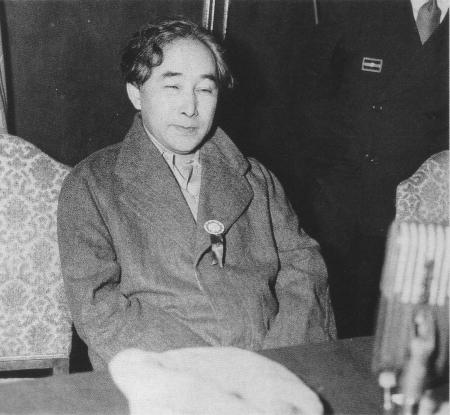
暴虐の雲 光を覆い [2]
敵の嵐は 荒れ狂う [3]
怯まず進め 我等の友よ
敵の鉄鎖を 打ち砕け
自由の火柱 輝かしく
頭上高く 燃え立ちぬ
今や最後の 闘いに
勝利の旗は ひらめかん
起て同胞よ ゆけ闘いに
聖なる血に まみれよ
砦の上に 我等の世界
築き固めよ 勇ましく
起て同胞よ ゆけ闘いに
聖なる血に まみれよ
砦の上に 我等の世界
築き固めよ 勇ましく
暴虐の雲 光を覆い
敵の嵐は 荒れ狂う
怯まず進め 我等の友よ
敵の鉄鎖を 打ち砕け
自由の火柱 輝かしく
頭上高く 燃え立ちぬ
今や最後の 闘いに
勝利の旗は ひらめかん
起て同胞よ ゆけ闘いに
聖なる血に まみれよ
砦の上に 我等の世界
築き固めよ 勇ましく
起て同胞よ ゆけ闘いに
聖なる血に まみれよ
砦の上に 我等の世界
築き固めよ 勇ましく
Bōgyaku no kumo hikari o ōi
Teki no arashi wa arekurū
Hirumazu susume warera no tomoyo
Teki no tessa o uchikudake
Jiyū no hibashira kagayakashiku
Zujō takaku moetachinu
Imaya saigo no tatakai ni
Shōri no hata wa hiramekan
Tate harakara yo yuke tatakai ni
Seinaru chi ni mamireyo
Toride no ue ni warera no sekai
Kizuki katameyo isamashiku
Tate harakara yo yuke tatakai ni
Seinaru chi ni mamireyo
Toride no ue ni warera no sekai
Kizuki katameyo isamashiku
Bōgyaku no kumo hikari o ōi
Teki no arashi wa arekurū
Hirumazu susume warera no tomoyo
Teki no tessa o uchikudake
Jiyū no hibashira kagayakashiku
Zujō takaku moetachinu
Imaya saigo no tatakai ni
Shōri no hata wa hiramekan
Tate harakara yo yuke tatakai ni
Seinaru chi ni mamireyo
Toride no ue ni warera no sekai
Kizuki katameyo isamashiku
Tate harakara yo yuke tatakai ni
Seinaru chi ni mamireyo
Toride no ue ni warera no sekai
Kizuki katameyo isamashiku
[2] English translation by Boreč
(from Lyricstranslate)
and whirlwinds of the enemy raging above us.
March on undaunted, our comrades,
then let’s shatter the enemy's iron chains!
Brightly the pillar of freedom
burned high above our heads.
Now, in the last fatal battle,
The banner of victory will surely wave in the wind!
Arise, comrades, towards the battle,
covered in sacred blood!
On top of the fortress, the new world awaits us,
then build it up, fiercely and bravely!
Clouds of evil omen covered the light,
and whirlwinds of the enemy raging above us.
March on undaunted, our comrades,
then let’s shatter the enemy's iron chains!
Brightly the pillar of freedom
burned high above our heads.
Now, in the last fatal battle,
The banner of victory will surely wave in the wind!
Arise, comrades, towards the battle,
covered in sacred blood!
On top of the fortress, the new world awaits us,
then build it up, fiercely and bravely!
[3] In some versions, the word 荒れ狂う (arekurū) is substituted by 吹きすさぶ(fukisusabu).
Contributed by Riccardo Venturi - 2007/10/12 - 00:48
1j1. Warushawa-Rōdōka: the Japanese Warszawianka by Kaji Wataru [鹿地 亘, 1927] completed by Boreč [2022]
 The Japanese version of "Warszawianka 1905 roku" was first written in 1927 by the novelist Kaji Wataru (鹿地 亘). His translation is a brave piece of work with a military flavour, and has been sung by many leftists to this day. Unfortunately, only the first verse has been written in Japan, so today I have tried to write singable lyrics for the second and third verses, based on the lyrics of the Krzhizhanovsky and Georgian versions, thus I contribute here in the hope that this thread and anti-war songs will continue to grow. [Boreč]
The Japanese version of "Warszawianka 1905 roku" was first written in 1927 by the novelist Kaji Wataru (鹿地 亘). His translation is a brave piece of work with a military flavour, and has been sung by many leftists to this day. Unfortunately, only the first verse has been written in Japan, so today I have tried to write singable lyrics for the second and third verses, based on the lyrics of the Krzhizhanovsky and Georgian versions, thus I contribute here in the hope that this thread and anti-war songs will continue to grow. [Boreč]La versione giapponese della “Warszawianka 1905 roku” è stata scritta nel 1927 dal romanziere Kaji Wataru (鹿地 亘). La sua traduzione è un'opera valente e un po' militaresca, e viene cantata da molti appartenenti alla sinistra anche al giorno d'oggi. Purtroppo, la versione giapponese consta di una sola strofa, la prima; quindi, oggi ho provato a scrivere un testo cantabile anche per la seconda e la terza strofa, basandomi sul testo russo di Kržižanovskij e su versioni georgiane. Lo contribuisco qui, sperando che questa pagina e AWS continuino a crescere. [Boreč, trad. RV]
1.
暴虐の雲光をおおい [1] [2]
敵の嵐は 吹き荒ぶ
ひるまず進め我等の友よ
敵の鉄鎖をうち砕け
自由の火柱 輝かしく
頭上高く 燃え立ちぬ
いまや最後の戦いに
勝利の旗はひらめかん
聖なる血にまみれよ
とりでの上に我等の世界
築きかためよ勇ましく
2.
地に伏すは 餓える子ら
我等もろとも 暗(やみ)に消ゆ
臆するなかれ 我等が眼(まなこ)
鷹の如く 睨みつけん
殉する友よ 輝かしく
よろずの歌に捧げよ
我等の声に汝の誉れ
勝利の旗はひらめかん
聖なる血にまみれよ
とりでの上に我等の世界
築きかためよ勇ましく
3.
圧政なるは皇国(みくに)の長
憎き玉座に我らの血
暴虐討つは 我等の友よ
天を統(す)ぶるは 産無たち
宿る(集る)輩 慈悲などなく
万年(まんねん)労働大衆に
唯死を待つる 帝どもよ
勝鬨の歌 ひびかせん
勝利の旗はひらめかん
聖なる血にまみれよ
とりでの上に我等の世界
築きかためよ勇ましく
Bōgyaku no kumo hikari o ōi
teki no arashi wa arekurū.
Hirumazu susume warera no tomoyo,
teki no tessa o uchikudake.
Jiyū no hibashira kagayakashiku
zujō takaku moetachinu.
Imaya saigo no tatakai ni,
shōri no hata wa hiramekan
Tate harakara yo, yuke tatakai ni,
seinaru chi ni mamireyo.
Toride no ue ni warera no sekai,
kizuki katameyo isamashiku.
2.
Chi ni fusu wa ueru ko-ra
warera moro tomo yami ni kiyu,
Okusuru nakare warera ga manako
taka nogotoku niramitsuken.
Jun suru tomoyo kagayakashiku ,
yorozu no uta ni sasageyo.
Warera no koe ni nanji no homare,
shōri no hata wa hiramekan.
Tate harakara yo, yuke tatakai ni,
seinaru chi ni mamireyo.
Toride no ue ni warera no sekai,
kizuki katameyo isamashiku.
3.
Atsuseinaru wa mi-kuni no osa,
nikuki gyokuza ni warera no chi.
Bōgyaku utsu wa warera no tomoyo,
ten o suburu wa san mu-tachi.
Yadoru (takaru) yakara jihi nado naku
Man'nen rōdō taishū ni,
tada shi o matsuru mikado-domo yo
kachidoki no uta hibikasen.
Tate harakara yo, yuke tatakai ni,
seinaru chi ni mamireyo.
Toride no ue ni warera no sekai,
kizuki katameyo isamashiku.
[2] English translation by Boreč:
Clouds of evil omen covered the light,
and whirlwinds of the enemy raging above us.
March on undaunted, our comrades,
then let’s shatter the enemy's iron chains!
Brightly the pillar of freedom
burned high above our heads.
Now, in the last fatal battle,
The banner of victory will surely wave in the wind!
Arise, comrades, towards the battle,
covered in sacred blood!
On top of the fortress, the new world awaits us,
then build it up, fiercely and bravely!
2.
People will die on the ground with starvation,
and all of us will disappear into darkness.
Yet, don’t be cowed, our eyes!
With our eagle-eyes, stare at them…
O martyred comrades, gloriously,
dedicate yourselves to the song of ten-thousands workers,
In our voices thy honour dwells,
and the banner of victory shall prevail!
Arise, comrades, towards the battle,
covered in sacred blood!
On top of the fortress, the new world awaits us,
then build it up, fiercely and bravely!
3.
The head of the Empire is oppressive to us,
then come, let our blood be on that hated throne!
It is our comrades who will avenge the tyrant,
it is the proletarier-class that rules the heavens and the lands!
The bourgeoisie parasite, with no mercy,
to working class for tens of thousands of years.
The emperors only await their fate of death,
so let us now sound our song of victory!
Arise, comrades, towards the battle,
covered in sacred blood!
On top of the fortress, the new world awaits us,
then build it up, fiercely and bravely!
Contributed by Boreč - 2022/5/18 - 03:13
1j2. はるかな青空 (Haruka na Aozora)- Japanese version by Tamiko Hirai (1961)
"This version was included in NHK's children's song project "Minna no uta", started in 1961. The title is "Haruka na Aozora" and it is a replacement of the Polish folk song "Warszawianka 1905 roku". [Borec / Akoniet]
1.
山が川が呼んでいる [1]
みんな元気に出かけよう
森はみどり 草に木に
風にいのちが みなぎるよ
胸をはれ 胸をはれ
あおげはるかな青空
道はひろく ひと筋に
進む我らを 招くよ
2.
草はゆれれる 道ばたに
踏むな小さな その花を
腕を組め うたごえも
はずむ笑顔 なかまよ
この手から この手から
明日の世界が生まれる
道はみどり ほがらかに
昇る朝日が まねくよ
Min'na genki ni dekakeyou
Mori wa midori kusa ni ki ni
Kaze ni inochi ga minagiru yo.
Mune o hare mune o hare
Aoge harukana aozora
Michi wa hiroku hito-kin ni
Susumu warera o maneku yo.
2. Kusa wa yure reru michibata ni
Fumu na chīsana sono hana o
Ude o kume uta go e mo
Hazumu egao naka ma yo.
Kono-te kara kono-te kara
Ashita no sekai ga umareru
Michi wa midori ho gara ka ni
Noboru asahi ga maneku yo.
Contributed by Boreč (T ^ T) - 2021/8/13 - 15:02
1j2. Japanese literal translation
敵の嵐が我々の上に吹く
暗闇の力が執念深く我々を抑圧する
敵との運命の闘いが始まった
でも未知の運命が待っている
でも我々は大胆にかかげる
労働者の闘いの旗を
民衆の闘いの旗を
新しい世の中のために 聖なる自由のために
聖なる正義の
歩け 前へ
労働者よ
血の闘い
聖なる正義の
歩け 前へ
労働者よ
奴らは憎むべき王冠の暴君だ
労働者よ どれだけ黙っていればいいのか
我々の同志たちは
死刑を怖れて
偉大な闘いで我々は思いだす
正しい理想のための名誉に倒れた者を
その名は君たちの勝利の歌に歌われる
民衆の聖人になるだろう
聖なる正義の
歩け 前へ
労働者よ
血の闘い
聖なる正義の
歩け 前へ
労働者よ
奴らは憎むべき王冠の暴君だ
我々は苦しむ民衆の鎖を名誉に思う
王冠は血にまみれている
敵を彼らの血で溺れさせよう
冷酷さに死を
労働者の敵すべてに
皇帝と財閥に死を
勝利の厳粛な時は終わる
聖なる正義の
歩け 前へ
労働者よ
血の闘い
聖なる正義の
歩け 前へ
労働者よ
Contributed by Riccardo Venturi - 2021/10/12 - 06:35
1k. Whirlwinds of Danger, the English version by Douglas Robson [ar. 1920]
"Rufus John" Goss, 1925
Whirlwinds of Danger is a self-standing version in English, that is, its lyrics have been written with little connection with the original. Also known under the title of March Song of the Workers, the song was written in the 20's of the 20th century by Douglas Robson, a former coal miner who moved to Chicago where he became an IWW (Industrial Workers of the World) member, and a singer and songwriter for his movement. Douglas Robson wrote the lyrics, but was falsely given the full credit for the song, apparently by the IWW (the song was first published in the 1935 edition of the Rebel Song Book, Eighty-Seven Socialist and Labor Songs for Voice and Piano, Rand School Press, NY, 1935, p. 14 (source). The song seems to have been recorded for the first time 1925 in London by the “Rufus John” Goss; it was also performed (under the title The Song of Warsaw) by the baritone Leon Lishner and, later (1953), also by Paul Robeson. This caused confusion because of the virtual identity between the author's name, Robson, and Robeson. That's why the song is often credited exclusively to Paul Robeson. [RV]
Whirlwinds of danger are raging around us;
O'erwhelming forces of darkness assail.
Still in the fight see advancing before us
Our flag of liberty that yet shall prevail.
Then forward, ye workers, freedom awaits you,
O'er all the world on the land and the seas,
On with the fight for the cause of humanity,
March, march, ye toilers and the world shall be free. [1]
Women and children in hunger are calling.
Shall we be silent to their sorry [2] and woe?
See in the fight our brothers are falling. [3]
Up, then, united, and conquer the foe!
Then forward, ye workers, freedom awaits you,
O'er all the world on the land and the seas,
On with the fight for the cause of humanity,
March, march, ye toilers and the world shall be free.
Off with the crown of the tyrants of favor!
Down in the dust with the prince and the peer.
Strike off your chains, all you brave sons of labor, [4]
Wake all humanity, for vict'ry is near!
Then forward, ye workers, freedom awaits you,
O'er all the world on the land and the seas,
On with the fight for the cause of humanity,
March, march, ye toilers and the world shall be free.
Then, onward and onward! Freedom awaits you
O'er all the world, on the land and the sea.
On with the fight for the cause of humanity!
March, march together, and the world will be free.
[2] Var. Sorrow
[3] Var. While in the fight see our brothers are falling
[4] Var. [...] sons of Poland
Contributed by Riccardo Venturi - 2007/10/12 - 23:26
1k1. The English version by Randall Swingler (1938)

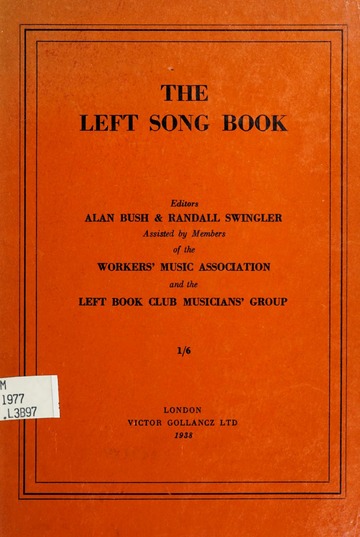
Di Whirlwinds of Danger il canto mantiene il titolo e riprende, inalterata, la prima strofa (il ritornello è simile, ma leggermente modificato). Il resto del canto è completamente differente ed è particolarmente incentrato sul colonialismo inglese. La versione di Randall Swingler non ebbe mai grande popolarità. Non se ne conoscono incisioni, ma la si ritrova in un canzoniere, Songs for you to sing! pubblicato a cura di The People's Choir nel marzo del 1956, per commemorare il V Festival della Gioventù e degli Studenti, che si era tenuto a Varsavia (!!) nell'agosto del 1955. [RV]
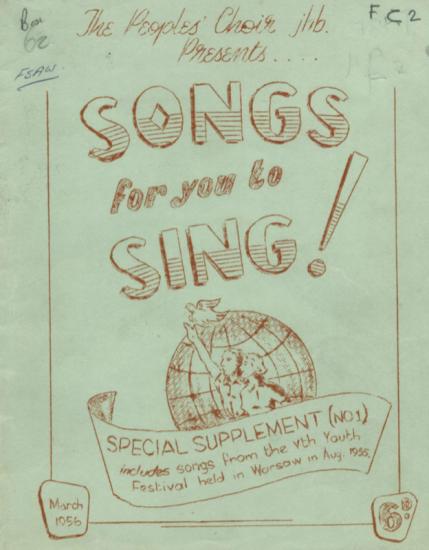

The song keeps the title Whirlwinds of Danger and the first stanza, unaltered (the chorus is similar, yet with slight changes). The rest of the song is completely different and is specially focused on British colonialism. Randall Swingler's version never enjoyed great popularity. No recording is known, but it is included in a songbook, Songs for you to sing!, published by The People's Choir in March 1956 to commemorate the 5th World Festival of Youth and Students, held in Warsaw (!!) in August 1955. [RV]

1.
Whirlwinds of danger are raging around us,
O'erwhelming forces of darkness assail.
Still in the fight see advancing before us
Red flag of liberty that yet shall prevail.
Then forward, ye workers, freedom awaits you,
O'er all the world on the land and the sea.
On with the fight for the cause of humanity,
Forward united , and the world shall be free!
2.
Africa murmuring under the slave-whip,
India challenging her plunderers' crime,
Ireland who hurled out the alien oppressor,
Rally against your own exploiters in time.
Then forward, ye workers, freedom awaits you,
O'er all the world on the land and the sea.
On with the fight for the cause of humanity,
Forward united , and the world shall be free!
3.
Now while in secret our rulers are plotting
Furies of slaughter to stave oll their fali,
Only united the people can thwart them,
Shatter their war designs and bring peace to all.
Then forward, ye workers, freedom awaits you,
O'er all the world on the land and the sea.
On with the fight for the cause of humanity,
Forward united , and the world shall be free!
Contributed by Boreč - 2021/9/18 - 02:20
1l. The Hungarian version by Lányi Sarolta (in Western style: Sarolta Lányi)

La diffusione della canzone rivoluzionaria "Warszawianka" in Ungheria pare sia iniziata attorno al 1920, quando il movimento operaio illegale ebbe inizio per tramite tedesco. Questo canto rivoluzionario famoso in tutto il mondo divenne ovviamente popolare anche in Ungheria, e dal 1930 fu cantato in molte regioni come canzone standard nelle riunioni dei lavoratori ungheresi. In Ungheria, la versione di "Rontása tört ránk a dúló viharnak..." fu scritta dalla poetessa Sarolta Lányi; ne esiste un'altta versione di Endre Gáspár. Tuttavia, in alcuni articoli, la versione con il testo "Rontása tört ránk a dúló viharnak..." è attribuita a Gáspár Endre, e così via. L'audio presentato in questo sito fa parte del CD "Válogatott Mozgalmi Dalok" pubblicato in Ungheria ed eseguito dall'Ensemble artistico dell'Esercito Popolare Ungherese. [Boreč]
Rontása tört ránk a dúló viharnak,
ordas had áradata kelt ellenünk.
Vesztünkre esküdtek ádáz hatalmak,
s tudtuk, egy életen át kell küzdenünk.
Álltunk a vészben, álltunk merészen,
lelkünkben tűzpirosan izzott a cél.
Munkások, álljunk a nagy harcra készen,
melyből az emberi nem új napja kél!
Kínzó igában legörnyedt a hátunk,
Mégis reméltük ama nagy diadalt.
Szenvedve távol jövendőbe láttunk,
s harsogva zengtük a szent csatadalt.
Vérünk nem omlott a harcban hiába.
Mártírjainknak neve nagy lesz és dicső.
Emlékük az fonja legszebb dalába,
Melyért elestek: a boldog jövő.
Contributed by Riccardo Venturi - 2007/10/12 - 23:32
1m. The Swedish version by Bertil Wagner
Ständigt allt större blir hären som strider
uti den kampen som kräver folk av stål,
kampen för klassen som utsugs och lider,
kampen för framtidsstatens hägrande mål.
Vi följer i spåren stupade bröder,
hjältar som fallit för frihetens sak.
Modigt och stolt i den kampen vi blöder,
modigt och stolt vi slåss för frihetens sak.
Nog har vi plågats, vårt tålamod brister,
nävarna knytes runt upprorsfanans stång.
Slavmillionerna bojorna rister,
högt över hären dånar upprorets sång.
Till kamp och till seger fanan oss leder,
flammande röd som vårt eviga hat!
Borgarnas utsugarstat slår vi neder,
bygger kring jorden proletärernas stat.
Till kamp och till seger fanan oss leder,
flammande röd som vårt eviga hat!
Borgarnas utsugarstat slår vi neder,
bygger kring jorden proletärernas stat.
Contributed by Riccardo Venturi - 2007/10/12 - 23:43
1m1. Oss alla unga - Nils Flyg's alternative Swedish version
Versione svedese 2 / Swedish version 2 / Version suédoise 2 / Svensk version 2 / Ruotsinkielinen versio 2: Nils Flyg
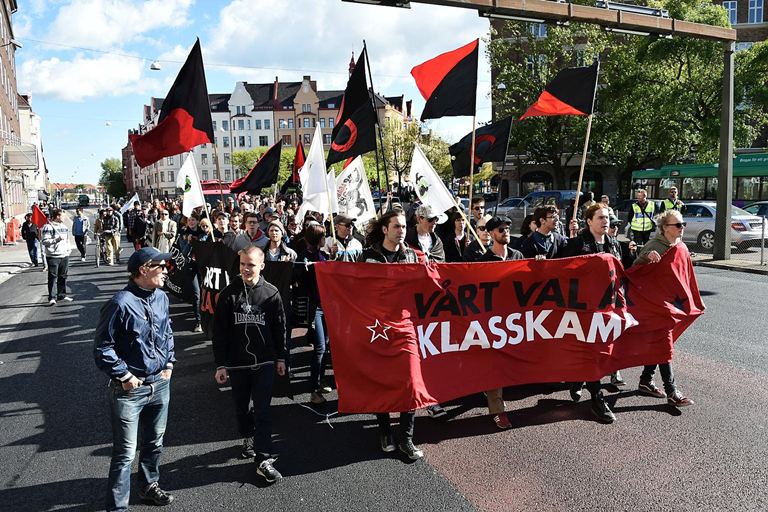
Oss alla unga, som längta och strida,
oss väntar handlingen, som kräver mer än mod.
Oss skänkes lyckan att offra och lida,
dö för den tro, som bröder helgat med blod.
Ja, hör hur den brusar, hör hur den dånar,
stormen, som bådar oss frihetens vår.
Det är de unga bland folken som sjunga
jublande hymn att ädel strid förestår.
En gång när vi alla unga är gömda
djupt under tuvorna där gejden hetast stod,
skall våra handlingar ej vara glömda
av framtidsfolket, som är barn av vårt blod.
Ja, ungdom är livets härliga vårtid,
ungdom förpliktar mot kommande år.
Vi alla unga i kampen vi sjunga.
Hänförda, starka mot vårt öde vi går.
Contributed by Juha Rämö - 2019/5/27 - 15:47
1n. Θύελλες, άνεμοι (Βαρσαβιάνκα) - The Greek Version
The complete lyrics are reproduced from kithara and replace those from National Anthems Online. The Greek version was written by Petros Pandis and performed by Notis Mavroudis.
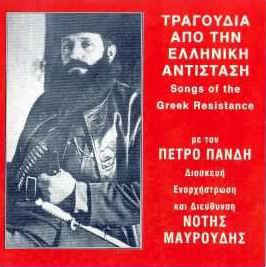
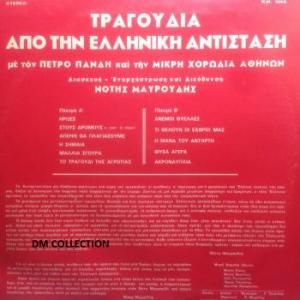
Songs of the Greek Resistance
Canzoni della Resistenza Greca
Chants de la Résistance Grecque
Kreikkan vastarintaliikkeen lauluja
Με τον ΠEΤΡΟ ΠΑΝΔH
Con PETROS PANDIS
With PETROS PANDIS
Avec PETROS PANDIS
Laulaa PETROS PANDIS
Διασκευή ενορχήστρωση και διεύθυνση
Adattamento, orchestrazione e direzione
Adaptation, orchestration and direction
Adaptation, orchestration et direction
Sopeutuminen, järjestäminen ja johtaminen
NOTIS MAVROUDIS
ΝΟΤΗΣ ΜΑΥΡΟΥΔΗΣ
1974
1. Μαύρα κοράκια / Mavra korakia
2. Είμαι του ΕΛΑΣ αντάρτης / Eimai tou ELAS o andartis
3. Επέσατε θύματα / Epesate thymata
4. Στ'άρματα / St'armata
5. Ο Μπελογιάννης ζει / O Belogiannis zei
6. Το τραγούδι του Άρη / To tragoudi tou Ari
7. Παιδιά σηκωθείτε / Paidia sikotheite
8. Σαν ατσάλινο τείχος / San atsalino teihos
9. Μαλλιά σγουρά / Mallia sgoura
10. Τί τα θέλουμε τα όπλα / Ti tha theloume ta opla
11. Ήρωες / Iroes
12. Στους δρόμους / Stous dromous
13. Απόψε θα πλαγιάσουμε / Apopse tha plagiasoume
14. Το τραγούδι της σημαίας / To tragoudi tis simaias
15. Το τραγούδι της αγροτιάς / To tragoudi tis agrotias
16. Άνεμοι, θύελλες / Anemoi, thyelles
17. Τι θέλουν οι εχθροί μας / Ti theloun oi ehthroi mas
18. Η μάνα του αντάρτη / I mana tou andarti
19. Φύσα αγέρα / Fysa agera
20. Ακροναυπλία / Akronafplia

Ο πάντα σεμνός και ταπεινός τραγουδιστής Πέτρος Πανδής γεννήθηκε το 1941 στην Κέρκυρα. Εργάστηκε για χρόνια στην Μέση Εκπαίδευση ως καθηγητής. Αν και τραγουδιστής μεγάλης εμβέλειας και δυνατοτήτων δεν εργάστηκε σε μαγαζιά παρά μόνον σε ελάχιστες περιπτώσεις, έγινε γνωστός μέσα από τους δίσκους, τα ρεσιτάλ και τις συναυλίες εντός και εκτός Ελλάδος. Ξεκίνησε σαν τραγουδιστής του "Νέου Κύματος" αλλά γρήγορα το όνομα του συνδέθηκε με το πολιτικοποιημένο τραγούδι και κυρίως με το έργο του μεγάλου Μίκη Θεοδωράκη και δη των Αντάρτικων τραγουδιών ("Τραγούδια από την Ελληνική Αντίσταση" του Νότη Μαυρουδή).
Il sempre riservato ed umile cantante Petros Pandís è nato nel 1941 a Corfù. Per anni ha lavorato come insegnante nelle scuole medie. Sebbene sia un cantante di grande portata e capacità e non abbia lavorato con case discografiche se non in poche occasioni, ha raggiunto la notorietà, in Grecia e all'estero, grazie ai suoi dischi, ai recital e ai concerti. Ha iniziato la sua carriera come cantante della New Wave greca, ma presto il suo nome è stato associato alla canzone politica, specialmente all'opera di Mikis Theodorakis e ai canti della Resistenza greca (i “Canti della Resistenza Greca” di Notis Mavroudís).
ΒΑΡΣΑΒΙΑΝΚΑ
'Ανεμοι, θύελλες γύρω μας πνέουν,
Τέκνα του σκότους εμάς κυνηγούν.
Σ' ύστερες μάχες μπλεκόμαστε τώρα
Kι άγνωστες τύχες εμάς καρτερούν.
Κι όμως ψηλά τη σημαία κρατώντας,
Πάντα περήφανοι, πάντα εμπρός!
Πέφτοντας κάπου, μα πάντα νικώντας
Σώζουμε έθνη και δούλους λαούς.
Λιώνουν, πεινούν οι εργάτες μπροστά μας,
Ως πότε, αδέρφια, αυτές οι σκηνές ;
Ήρωες νέοι, μη σας τρομάζουν
Δίκες κρεμάλες και άλλες ποινές.
Κι όμως ψηλά τη σημαία κρατώντας,
Πάντα περήφανοι, πάντα εμπρός!
Πέφτοντας κάπου, μα πάντα νικώντας
Σώζουμε έθνη και δούλους λαούς.
Μίσος κι εκδίκηση σε κάθε κλέφτη,
Σε κάθε τύραννο της εργατιάς!
Θάνατος σ' όλους τους μπουρζουάδες,
Ήρθε η ώρα της λευτεριάς.
Στη μάχη, στην πάλη, στον τίμιο αγώνα
Στη μάχη, στην πάλη, στον τίμιο αγώνα
Κείνοι που πέσανε θα δοξαστούν
Κείνοι που πέσανε θα δοξαστούν
Κι απογόνοι στις συγκεντρώσεις
Κι απογόνοι στις συγκεντρώσεις
Τα ονόματά τους θα διαλαλούν.
Contributed by Riccardo Venturi - 2007/10/13 - 00:18
1n1. Phonetic transcription of the Greek version
di Riccardo Venturi
by Riccardo Venturi
'tekna tu.'skotus e'mas kjini'γun
'sisteres 'maçes ble'komaste 'tora
'kj.aγnostes 'tiçes mas karte'run
'kj.omos psi'la ti.si'mea kra'tondas
'panda pe'rifanji 'panda em'bros
'peftondas 'kapu ma.'panda ni'kondas
'sozume 'eθnji kje.'δulus la'us
'ljonun pi'nun i.er'γates bro'stamas
os'pote a'δerfja a'ftes iskje'nes
'iroes 'nei mi'sas.tro'mazun
'δikjes kre'males 'kjales pi'nes
'kj.omos psi'la ti.si'mea kra'tondas
'panda pe'rifanji 'panda em'bros
'peftondas 'kapu ma.'panda ni'kondas
'sozume 'eθnji kje.'δulus la'us
'misos kj.ek'δikjisi se.'kaθe 'klefti
se.'kaθe 'tirano tis.erγa'tjas
'θanatos 'solus tus.bur'zuaδes
'irθe i.'ora tis.lefte'rjas
sti.'maçi sti(m).'bali sto(n).'dimjo a'γona
'kjinji pu.'pesane θa.δoksa'stun
kje.i.apo'γonji stis siηgjen'drosis
ta.o'nomata tus θa.δjala'lun ]
1n2. Italian translation of the Greek version
Riccardo Venturi - Ρικάρντος Βεντούρης, Piacenza / 'Εν Πλακεντίᾳ 02-04-2019 11:48
Ci soffiano intorno vènti e procelle,
Ci danno la caccia figli dell'oscurità,
Stringiamoci ora in battaglie finali
Ci attendono ignoti destini.
Tenendo eppure alta la bandiera
Sempre con fierezza, sempre avanti!
Talora cadendo, ma sempre vincendo
Salviamo nazioni e popoli schiavi.
Consunti e affamati i lavoratori dinanzi a noi,
Fino a quando, fratelli, scene come queste?
Giovani eroi, che non vi spaventino
Tribunali, patiboli ed altre pene.
Tenendo eppure alta la bandiera
Sempre con fierezza, sempre avanti!
Talora cadendo, ma sempre vincendo
Salviamo nazioni e popoli schiavi.
Odio e vendetta verso ogni ladrone,
Ogni tiranno dei lavorator!
Morte a tutti quanti i borghesi,
È giunta l'ora della libertà.
Alla lotta, alla battaglia, all'onorata pugna
Alla lotta, alla battaglia, all'onorata pugna
Coloro che caddero saran glorificati
Coloro che caddero saran glorificati
Anche i posteri, nelle adunanze
Anche i posteri, nelle adunanze
I loro nomi proclameranno.
1o. Norwegian version
2 verses contributed by Dieter to National Anthems Online completed thanks to Juha Rämö
Mai-Ensemblet: dall'album Ridderslag - Revolusjonære Arbeidarsongar, Plateselskapet 1976
Mai-Enseblet: from the song album Ridderslag - Revolusjonære Arbeidarsongar Plateselskapet 1976
Fiendens stormvinder mot oss seg kaster,
dunkelhets makter trykker oss ned.
Frem dog til kampen vi modige haster,
er på vår ukjente skjebne beredt.
Arbeidersaken stiger med dagen
frem under frihetens blodrøde flagg.
Det er vårt håp i vår rastløse jagen
frem, frem til seier er kampropets klang!
Her i vår tid dør det mange av hunger
Kan det da mer være tvil i din sjel?
Selv skafottene roper med tunger
Frihetens sang kan man ei slå ihjel
Alle som faller manende kaller
Navnene toner igjen i vår sang
Og over slettene rungene gjaller
frem, frem til seier er kampropets klang!
Og som vi hater tyrannenes kroner
Ærer vi høyt alle lidelsens bånd
Falle skal alle de blodstenkte troner
og våre fiender dø for vår hånd
Hevnen og døden skal være buden
Som tyrraniet skal lide ved oss
Selv har vi sået nå høster vi grøden
Fremad vi stormer som brusende foss!
Hevnen og døden skal være buden
Som tyrraniet skal lide ved oss
Selv har vi sået nå høster vi grøden
Fremad vi stormer som brusende foss!
Contributed by Riccardo Venturi - 2007/10/13 - 00:24
1p. Esperanto version by K.Gušev
This version is based upon the Russian version. We reproduce it from National Anthems Online, where, however, the Esperanto "alternative spelling" without diacritical marks is used. We restore here the standard spelling.[RV]
Nin kontraŭblovas la ventoj severaj,
Kovras la jugo nin per la obskur'.
Fortas koler' de l' tiranoj malveraj,
Dronas en densa nebul' la futur'.
Tamen eklevas ni en fiero
Flagon de la laborista afero,
La ruĝan flagon de morta batalo
Kontraŭ la jugo de la kapitalo.
Al lukto sanga,
Justa kaj sankta
Marŝu kun vol',
Labora popol'!
Niajn kompanojn mortigas malsato,
Kaj ĉu silentu ni antaŭ la krim'?
Kaj ĉu la junajn okulojn de l' frato
La eŝafodo plenigos je tim'?
En la batalo la bravaj luktantoj
Ne malaperos sen signo kaj spur',
Nomojn iliajn ripetos la kantoj
De la triumfa libera futur'.
Al lukto sanga,
Justa kaj sankta
Marŝu kun vol',
Labora popol'!
Ni malestimas la carajn orkronojn,
Ili nur ĉenojn alportas al ni …
Sango popola inundas la tronojn,
Sed – fluu sango de la tirani'.
Venĝo kondamnu pro la malbonfaroj
Ĉiujn premantojn de la patroland'!
Venĝo al la parazitoj kaj caroj,
Venku, labora glorul-batalant'!
Al lukto sanga,
Justa kaj sankta
Marŝu kun vol',
Labora popol'!
Contributed by Riccardo Venturi - 2007/10/13 - 00:47
1p1. Esperanto version by N.Nekrasov
Reproduced from the relevant page of the Esperanto Wikipedia. It appears as a perfect version of the Polish original.
Nian standardon ni levos kuraĝaj,
Kvankam minaca venteg' furiozas,
Kvankam nin premas nun fortoj sovaĝaj,
Kvankam neniu morgaŭon supozas.
Ĉar tio estas la kant' de l' libero,
Sankta standardo de la renaskiĝo,
Estas triumf' de l' laboro kaj vero,
Estas aŭror' de l' tutmonda fratiĝo.
Marŝu, Varŝavo,
Al lukto brava,
Sankta kaj prava,
Marŝu, Varŝavo!
Nun, kiam mortas pro granda malsato
Laboristaro, dronante en ŝlimo,
Estas hontego al degenerato,
Kiu la morteŝafodon ektimos!
La oferita pro nobla ideo
Restos senfrukta pereo nenia:
Kvankam al multaj minacas pereo,
La estonteco ja estas nur nia!
Marŝu, Varŝavo,
Al lukto brava,
Sankta kaj prava,
Marŝu, Varŝavo!
Hura!... De l'reĝoj forigu ni kronojn,
Ĉar la popolo la dornan surhavas;
Kaj ni detruu putrintajn jam tronojn,
Kiu en sango popola sin lavas.
Venĝon teruran pro la ekspluatoj
Al la suĉantoj de l' sango - laŭ deco!...
Venĝon teruran al la plutokratoj,
Venu rikolto de la estonteco!...
Contributed by Riccardo Venturi - 2013/1/14 - 23:32
Neprijateljske oluje
bjesne ozračjem,
dok oblaci, što prijete,
zatamnjuju svjetlost.
Dužnost nas poziva
na neprijatelja,
iako možemo očekivati
samo bol i smrt.
Naš je slobode
blješteći plamen,
što se rasplamsava
visoko iznad naših glava:
Barjak pobjede,
oslobođenja naroda,
što nas sigurno vodi
u posljednji boj.
Naprijed, sad samo
naprijed u krvavi, sveti boj,
Svladaj neprijatelja,
ti radnički narode!
Na barikade,
na barikade,
osvoji svijet na juriš,
ti radnički narode!
Contributed by Riccardo Venturi - 2007/10/13 - 02:34
1q1. Varšavjanka - The Yugoslav (Serbo-Croatian) version by Branko Karakaš
Note. The translator's name is stated here.

Branko Karakaš (????-2014) is a Macedonian composer, musicologist, poet, director, music critic and translator of Croatian origin. Born in Laki, Macedonia, he died in Vienna, Austria, where he spent the last 24 years of his life.
Karakaš formed his education in all the countries of the former Yugoslavia, and began his career as a member of “the Children's Orchestra of the Zagreb Opera”, also continued as a trumpet and violin performer in the Military Orchestra in Skopje, and he was a composer and music illustrator at the Drama Theater, and a permanent music critic in "Nova Makedonija".
Karakaš headed the Belgrade Department of Music Propaganda and Music Publishing, was the director of an art ensemble, and co-directed the opening of the Mediterranean Games in Split and the Sarajevo Olympics.
He has performed as a guest artist in more than 30 countries. He has lived in Vienna since 1990. In his musical opus he has recorded about 300 compositions from different genres, and his main works are the ballets "Gull" (1982), "Love on the Sand" (1985), "Ballet Suite in 9 Pictures" (1989) and "European in New York" (2002).
In his creative life, Karakaš published several anthologies, including "Anthology of Macedonian Folk Songs" (1995), 19 collections of poetry, 93 music collections, 10,000 poems with different themes, 26 books of Macedonian fiction translated into other languages, more of 30,000 verses translated from Macedonian into Russian. It also compiles the "Anthology of Folk Songs of Europe", published in five languages, funded by UNESCO and the Ministry of Culture of the Republic of Macedonia.
He is the author of more than 700 music reviews, and of the many awards and recognitions he has received, the "Spirit of '76" medal awarded by the United States on the occasion of the 200th anniversary of independence stands out. - mk.wikipedia
1.
Vihari dušmanski vuku se teško
mračne nam sile sad donose mrak
u boj težak stupismo smjelo sa vragom
sudbine gorke svud čeka nas jad.
Dignite, braćo, visoko čelo
zastava borbe nek viori smjelo
pobjede pjesma nek vodi nas napred
za vječni mir i za veliko djelo.
napred marširaj za život naš nov
u boj krvavi narode sveti
napred marširaj za život naš nov.
2.
Gladni i bosi svud radnici mriju
dokle će truli da dišemo dah,
naši su narodi čvrsto sa nama
nemamo mi baš od ničega strah.
U bitci silnoj ginuće borci
vječno će cvjetati ideje vaše
imena slavna i pjesme da slave
noseći borbene pozdrave naše.
napred marširaj za život naš nov
u boj krvavi narode sveti
napred marširaj za život naš nov.
3.
Mrzimo silno mi tiranske krune
što narod muče i bacaju u sram,
s' narodnom krvlju su zalite one
tiransku srđbu će spalit naš plan.
O, paraziti, dolaze časi
dajte računa za vaša nedjela
bliže se koraci pobjede svjetle
bliži se narod uzdignuta čela.
napred marširaj za život naš nov
u boj krvavi narode sveti
napred marširaj za život naš nov.
Contributed by Борец(╹◡╹) - 2021/7/9 - 07:45
1r. Danish version by Ejnar H. Tønnesen (from the 1930's)
Reproduced from the English Wikipedia
Secondo bibliotek.dk, il sito di ricerca delle biblioteche danesi, il testo di questa versione è stato pubblicato nel 1987 nel volume Arbejdermelodibogen, for klaver med overlagt tekst og becifring, a cura di Per Fomsgaard e Jørgen A. Christiansen per la Arbejdernes Oplysningforbund. L'autore della versione sarebbe Ejnar H. Tønnesen, attivista e pubblicista socialista attorno agli anni '30 del XX secolo.
According to bibliotek.dk, the search engine of Danish libraries, the lyrics of this version were published in 1987 in Arbejdermelodibogen, for klaver med overlagt tekst og becifring, edited by Per Fomsgaard and Jørgen A. Christiansen for Arbejdernes Oplysningforbund. The traslator must be Ejnar H. Tønnesen, a socialist activist and journalist of the 30s of the 20th century.
Stormene glammer så vildt over lande,
natsorte skyer formørker solens lys.
Os kalder pligten mod fjenden at stande,
ej ænses smerte og dødskolde gys.
Thi vi ejer friheds lysende flamme,
højt vil vi hæve vort luende flag.
Her vi os fylker så kampglad en stamme,
for folkets frihed står vi rustet til slag.
sejren skal vindes af arbejdets mænd og kvinder.
Rødt smælder flagdugens flig over staden,
Ny tid nu skabes af arbejdets folk.
Død og fordærv over folkets tyranner.
Bødlernes skare skal høste blodig sæd.
Skælvende ser de vort flammende banner,
hører vort hævnråb, i dødsangsten ræd.
Arbejdets helte! Tit har I givet
jorden for andre jert dyreste blod.
Krigen, den sidste, for frihed, for livet
kan I vel vinde med sejrshåbets mod.
sejren skal vindes af arbejdets mænd og kvinder.
Rødt smælder flagdugens flig over staden,
Ny tid nu skabes af arbejdets folk.
Sulten og nøden har naget os alle,
tit man berøved' os det daglige brød.
Lidelsens samfund i grus nu skal falde,
arbejdets ungdom ræddes aldrig for død.
Ofte ideen livet har krævet,
tit er det ofret for massernes sag.
Slut tæt nu ved fronten! Se fanen er hævet.
Arbejderhæren står rede til slag.
sejren skal vindes af arbejdets mænd og kvinder.
Rødt smælder flagdugens flig over staden,
Ny tid nu skabes af arbejdets folk.
Contributed by Riccardo Venturi - 2013/1/14 - 20:15
1r1. Alternative Danish version
"I found an alternative text of the Danish Warszawianka. This text was published in a Danish poetry collection. It was probably translated from the Russian version of Krzyżanowski's text." [Boreč]
1.
Oprøret ulmer så vildt over landet
kalder til våben hver eneste mand
melder om pligten: til kamp os at rejse
magt imod magt, og vi sejr vinde kan.
Thi vi ejer frihedens glødende flamme
højt skal vi hæve vort blodrøde flag
Arbejder! Følg os i kamp mod vor fjende
frem til det sidste, det sejrende slag.
sejren skal vindes af arbejdets mænd og kvinder
Ny tid skal skabes. Det gamle skal styrtes
slænges for altid til glemselen hen!
2.
Død og fordærv over vore tyranner
bødlernes skare skal høste blodig sæd
Skælvende ser de det flammende banner
hører vort hævnråb i dødsangsten ræd.
Oprørets helte, jorden er vædet
rød af det udgydte arbejderblod
Revolutionen, den sidste, skal vindes
vindes med trods, med ukueligt mod!
sejren skal vindes af arbejdets mænd og kvinder
Ny tid skal skabes. Det gamle skal styrtes
slænges for altid til glemselen hen!
3.
Sulten og nøden har naget os alle
rejs jer til oprør, til borgerskabets dåd!
Rejs jer og bryd de forbandede lænker!
Hævn, at I sulted’ og hævn, I led nød!
Ofte ideen livet har krævet
tit er det ofret for massernes sag.
Slut derfor fronten, se: fanerne bløder!
Arbejderhæren står rede til slag!
sejren skal vindes af arbejdets mænd og kvinder
Ny tid skal skabes. Det gamle skal styrtes
slænges for altid til glemselen hen!
Contributed by Boreč - 2022/5/25 - 10:10
1s. Vietnamese translation
Reproduced from vi.wikipedia
"Warszawianka là một bài hát Ba Lan được viết trong khoảng thời gian 1879-1883. Tên của bài hát có thể dịch là "bài ca Vácsava" hay "cô gái Vácsava". Nó trùng tên với bài hát cùng tên được sáng tác nhằm cỗ võ cho cuộc Khởi nghĩa Tháng Mười Một tại Ba Lan năm 1831. Để phân biệt với bài hát năm 1831, người ta thường gọi bài ca "mới" này là "Bài ca Vácsava năm 1905", tự vì nó được sử dụng làm "thánh ca" của những người công nhân Ba Lan khi họ khởi nghĩa hưởng ứng cuộc cách mạng 1905 sau khi 30 công nhân bị bắn chết trong một cuộc biểu tình ủng hộ ngày Quốc tế Lao động tại Warszawa năm 1905.
Có tài liệu cho rằng Wacław Święcicki là người viết lời cho bài hát trong khoảng năm 1879, khi ông đang bị giam tại nhà ngục khét tiếng tại sảnh số 10 thuộc pháo đài Warszawa vì các hoạt động liên quan đến chủ nghĩa xã hội. Một ý kiến khác cho rằng bài hát được viết vào năm 1883 sau khi Święcicki vừa mới mãn hạn đi đày tại Sibir. Cho đến thập niên sau đó, bài hát đã trở thành một trong những nhạc phẩm nổi tiếng của nhũng người cách mạng Ba Lan.
Bài hát đã được dịch sang nhiều thứ tiếng, trong đó phiên bản tiếng Nga (Varshavianka) có sự thay đổi lời ca một chút và đó cũng la 2mo65t phiên bản nổi tiếng. Nó xuất hiện trong bộ phim Liên Xô Vikhri vrazhdebnye. Gleb Maksimilianovich Krzhizhanovskiy được cho là tác giả của bản dịch tiếng Nga, viết vào năm 1897 khi ông đang bị cầm tù.
Phiên bản tiếng Tây Ban Nha mang tên A las Barricadas, với lời mới được viết lại bởi Valeriano Orobón Fernández. Phiên bản tiếng Đức được sử dụng như một bài quân hành phổ biến của Quân đội Nhân dân Quốc gia (Nationale Volksarmee) Cộng hòa Dân chủ Đức. Trung đoàn Kỵ binh nhẹ nhảy dù số 1 của Pháp cũng sử dụng bài nhạc này với lời khác. Phiên bản tiếng Anh do Paul Robeson đặt lời, nhưng không nổi tiếng lắm. Đoạn phim mở đầu của phim The Jackal, "bài ca Vácsava" được thể hiện với cảnh phim của Cách mạng Tháng Mười."
Anh em hãy giương cao ngọn cờ cách mạng
Dù cho giông tố bão bùng cứ gào thét
Dù cho bè lũ tội lỗi cứ đè nén
Dù cho viễn cảnh tương lai vẫn mù mờ
Ô, đây là ngọn cờ của cả nhân loại
Là lời kêu gọi thiêng thánh, là bài ca Phục sinh
Là khúc khải hoàn của cần lao và công lý
Là bình minh của tình bằng hữu khắp loài người !
Tiến lên, Vácsava !
Tới cuộc chiến đánh đổi bằng máu
Tới cuộc chiến đánh đổi bằng máu
Cuộc chiến thiêng thánh và chính nghĩa
Tiến lên, Vácsava !
Hôm nay những người cần lao đang chết đói
Vì sự nuông chiều tội ác thói xa hoa
Và sự nhục nhã trong giới trẻ chúng ta
Khiếp sợ trước việc bị giải ra pháp trường
Ô, chúng ta không bao giờ quên sự hi sinh
Của những con người bỏ mình vì nghĩa lớn
Vì bài ca chiến thắng của chúng ta
Sẽ vinh danh họ bởi hàng triệu triệu người !
Tiến lên, Vácsava !
Tới cuộc chiến đánh đổi bằng máu
Tới cuộc chiến đánh đổi bằng máu
Cuộc chiến thiêng thánh và chính nghĩa
Tiến lên, Vácsava !
U-ra ! Hãy xé nát vương miện bọn Sa hoàng
Trong khi loài người đang đội sự thống khổ
Hãy nhận chìm ngai vàng mục ruỗng trong máu
Cái ngai vàng nhuộm đỏ máu của người dân
A ! Sự báo thù giáng lên kẻ áp bức
Đang bòn rút sự sống của hàng triệu người
A ! Sự báo thù giáng lên bọn vua quan
Và chúng ta sẽ gặt hái vụ mùa của tương lai !
Contributed by Riccardo Venturi - 2014/9/24 - 20:24
1s1. Vietnamese version from 1980
"The song was originally released in Vietnam in 1980 on the LP album "Ngọn Cờ Đỏ (Red banner)". The following lyrics was identified by listening to the song, so it is not yet correct whether they are the true lyrics or not, but I’ve contributed here for our information. Also the lyricist and choir have not yet been unknown..." [Boreč]
Vững bước đi lên theo ngọn cờ hồng đỏ rực tươi,
Thẳng tiến phía trước chúng ta đạp bằng chông gai gian khó,
Đi qua cơn bão giông tương lai chờ ta về lại
Phải nắm chắc lấy trong tay ngọn cờ thắng lợi này!
Người người truyền thống đấu tranh vẻ vang bao vinh quang,
Giành lại toàn thắng trong tương lai cho nhân loại
Mạnh mẽ giữ vững yên vui thanh bình cho hoà bình!
Tương lai đang chờ ta, vinh quang đang đợi ta,
Vì tiền hậu tuyến anh em, vì tương lai tự do
Vì một cuộc sống ấm no cho nhân loại,
Thề quyết vững bước tiến theo ngọn cờ thắng lợi!
Vững bước đi lên theo ngọn cờ hồng đỏ rực tươi,
Thẳng tiến phía trước chúng ta đạp bằng chông gai gian khó,
Đi qua cơn bão giông tương lai chờ ta về lại
Phải nắm chắc lấy trong tay ngọn cờ thắng lợi này!
Người người truyền thống đấu tranh vẻ vang bao vinh quang,
Giành lại toàn thắng trong tương lai cho nhân loại
Mạnh mẽ giữ vững yên vui thanh bình cho hoà bình!
Tương lai đang chờ ta, vinh quang đang đợi ta,
Vì tiền hậu tuyến anh em, vì tương lai tự do
Vì một cuộc sống ấm no cho nhân loại,
Thề quyết vững bước tiến theo ngọn cờ thắng lợi!
Contributed by Boreč - 2022/5/18 - 13:56
1t. Galician (Galego) Translation
Si tratta in realtà della traduzione letterale in galiziano della versione classica russa di Gleb Maksimovič Kržižanovskij, riprodotta dal qui presente video YouTube contenente la suddetta versione russa (il video, interessantissimo per le immagini originali che propone, potrà quindi valere anche per essa). Il video è segnalato in un bel blog spagnolo, El blog del Viejo Topo, in una sezione dell'ottobre 2015 dedicata alle Músicas de la Resistencia. L'articolo specifico sulla Warszawianka 1905 roku / Varšavjanka / ¡A las barricadas! si basa in molti punti sulla nostra pagina (“Hemos consultado la web antiwarsongs.org, que es un portal especializado en el patrimonio musical internacional de la izquierda.”) anche con estese citazioni dirette (tradotte ovviamente in spagnolo). Con questo vorremmo ringraziare “El Viejo Topo” (ben scavato, vecchia talpa!) per la considerazione. La traduzione galiziana è stata ricopiata direttamente dai sottotitoli del video e viene quindi messa a disposizione anche come testo. [RV]
Hostís treboadas zoan sobre nós,
Forzas escuras escravízannos con furor.
Encetamos mortal combate co inimigo,
E aínda agarda un destino descoñecido.
Mais imos plantar con orgullo e valor
A heroica bandeira do traballador,
Bandeira de loita de todos os Pobos,
Pola liberdade e un mundo mellor.
Á sanguenta batalla, sacra e xusta,
Marcha, marcha e segue á fronte, proletariado.
Á sanguenta batalla, sacra e xusta,
Marcha, marcha e segue á fronte, proletariado.
Morre de fame o obreiro,
Calaremos, irmáns, por máis tempo?
Seica, ver a forca pode asustar
Os nosos camaradas máis novos?
En grande batalla, non serán esquecidos
Os caídos pola honra do noso ideal.
Os seus nomes estarán en gloriosas cancións,
E na memória de millóns de persoas.
Á sanguenta batalla, sacra e xusta,
Marcha, marcha e segue á fronte, proletariado.
Á sanguenta batalla, sacra e xusta,
Marcha, marcha e segue á fronte, proletariado.
Aborrecemos a tiránica coroa,
Mais honramos as cadeas da mártir nación
O sangue do pobo asolagou os tronos,
E aos nosos rivais bañaremos en sangue.
Vinganza sen piedade contra todo inimigo,
Contra os parasitos das masas proletarias!
Vinganza sen piedade contra plutócratas e tsares,
A vitoria está máis cerca cada instante.
Contributed by Riccardo Venturi - 2018/4/19 - 23:15
1u. Chinese translation (with transcription)
The Chinese translated lyrics are reproduced from this page and shown here in verse layout. The pinyin transcription is through Google Translator.
华沙工人歌
"此歌又名“华沙曲”“华沙**曲”“华沙工人**曲”等。
这首歌的曲调原是一首法国军歌《朱阿夫进行曲》(朱阿夫原指法国非洲殖民地远征军中的原住民士兵)1863年,侨居于巴黎的波兰诗人弗.沃尔斯基(1824~1882年)为其填词,献给了应募加入法国军队的波兰流亡者。这一年,华沙举行了反抗沙俄殖民统治的武装起义,这首进行曲便被命名为“华沙起义歌”。1878年,被囚禁于华沙城堡的的波兰**诗人伐茨拉夫.斯文契斯基(1848~1900年)有一次听到隔壁牢房的狱友在唱《华沙起义歌》,就采用这一曲调重新填写了新歌词,他把歌词用针尖戳录在书页上。书后来被带到狱外,他的同志们摸着针眼,记下了歌词。1883年,斯文契斯基称之为《华沙曲》的歌曲在波兰地下报刊《无产者》第1期上登出,立刻在**者圈子中流传开来。1895年,彼得堡“工人阶级解放与斗争协会”的一个小组被捕,其中有格奥尔基.克尔日扎诺夫斯基。他们被囚禁在布蒂尔卡监狱,同牢房有几名波兰社会主义党的“要犯”,他们经常唱《华沙曲》。克尔日扎诺夫斯基回忆说:“歌曲很出色,但是我们俄国**者不会唱,因为我们不懂波兰语。我想写一首俄语版的《华沙曲》,于是波兰同志们便把歌词直译过来,我重新填写了歌词。凡是没有无产阶级觉悟的语句,我们都抛弃了,力求使歌曲充实无产阶级**的内容。”1897年春天,沙俄当局准备把关押在布蒂尔卡监狱的一批政治犯流放到西伯利亚去,突然,整个监狱都唱起了“仇恨的风在头上咆哮怒吼.......”狱卒们扑向牢房,但是被囚犯们顶住了,一直到歌曲唱完。-----------这是俄语版《华沙工人歌》的第一次“战斗洗礼”。同波兰语原曲相比,俄语版的《华沙工人歌》不仅歌词内容大不相同,而且曲调`节奏乃至于风格都有了较大的改动。1902年,俄罗斯**报刊《火星报》出版的第一部俄罗斯**歌曲集刊登了俄语版的《华沙工人歌》,两三年之后,《华沙工人歌》传遍了俄罗斯全国各地。1917年4月3日,列宁结束流亡生活,回到俄国来领导社会主义**。同志们正是唱着《华沙工人歌》来迎接他的。"
仇恨的风在头上咆哮怒吼,
黑暗的势力向我们下毒手,
快团结紧和敌人决一死战,
也不必问有什么在前头。
勇敢地起来,骄傲地起来,
要为了工人的事业去战斗,
高高举起全人类战斗旗帜,
为新世界早来到,人人自由!
正义的战斗,流血的战斗,
挺起了胸膛,快向前走!
正义的战斗,流血的战斗,
挺起了胸膛。快向前走!
正义的战斗,流血的战斗,
挺起了胸膛。快向前走!
今天我们多少人死于饥饿,
难道我们还能够不开口?
在斗争中,战友们年轻的眼睛,
难道面对绞刑架会发抖?
为崇高信念,光荣地牺牲,
在战斗中他们将留芳千秋,
他们的姓名,随我们的凯歌,
世世代代活在亿万人心头。
正义的战斗,流血的战斗,
挺起了胸膛。快向前走!
正义的战斗,流血的战斗,
挺起了胸膛。快向前走!
正义的战斗,流血的战斗,
挺起了胸膛。快向前走!
和暴君们我们是不共戴天,
来,受苦人,今天要报血仇。
人民的鲜血浸透帝王的宝座,
也染红了我们敌人的手。
要推翻暴君,要铲除财阀,
彻底消灭寄生虫、无耻走狗,
我们要向刽子手讨还血债,
看,红旗飘,胜利日就在前头!
正义的战斗,流血的战斗,
挺起了胸膛。快向前走!
正义的战斗,流血的战斗,
挺起了胸膛。快向前走!
Chóuhèn de fēng zài tóu shàng páoxiāo nùhǒu,
hēi'àn de shìlì xiàng wǒmen xià dúshǒu,
kuài tuánjié jǐn hé dírén juéyīsǐzhàn,
yě bùbì wèn yǒu shé me zài qiántou.
Yǒnggǎn dì qǐlái, jiāo'ào dì qǐlái,
yào wèile gōngrén de shìyè qù zhàndòu,
gāo gāo jǔ qǐ quán rénlèi zhàndòu qízhì,
wèi xīn shìjiè zǎolái dào, rén rén zìyóu!
Zhèngyì de zhàndòu, liúxuè de zhàndòu,
tǐng qǐle xiōngtáng, kuài xiàng qián zǒu!
Zhèngyì de zhàndòu, liúxuè de zhàndòu,
tǐng qǐle xiōngtáng, kuài xiàng qián zǒu!
Jīntiān wǒmen duōshǎo rén sǐ yú jī'è,
nándào wǒmen hái nénggòu bù kāikǒu?
Zài dòuzhēng zhōng, zhànyǒumen niánqīng de
yǎnjīng, nándào miàn duì jiǎoxíng jià huì fādǒu?
Wèi chónggāo xìnniàn, guāngróng de xīshēng,
zài zhàndòu zhōng tāmen jiāng liú fāng qiānqiū,
tāmen de xìngmíng, suí wǒmen de kǎigē,
shì shìdài dài huó zài yì wàn rén xīntóu.
Zhèngyì de zhàndòu, liúxuè de zhàndòu,
tǐng qǐle xiōngtáng. Kuài xiàng qián zǒu!
Zhèngyì de zhàndòu, liúxuè de zhàndòu,
tǐng qǐle xiōngtáng. Kuài xiàng qián zǒu!
Hé bàojūnmen wǒmen shì bù gòng dàitiān,
lái, shòukǔ rén, jīntiān yào bào xuèchóu.
Rénmín de xiānxiě jìntòu dìwáng de bǎozuò,
yě rǎn hóngle wǒmen dírén de shǒu.
Yào tuīfān bàojūn, yào chǎnchú cáifá,
chèdǐ xiāomiè jìshēng chóng, wúchǐ zǒugǒu,
wǒmen yào xiàng guìzishǒu tǎohuán xuèzhài,
kàn, hóngqí piāo, shènglì rì jiù zài qiántou!
Zhèngyì de zhàndòu, liúxuè de zhàndòu,
tǐng qǐle xiōngtáng. Kuài xiàng qián zǒu!
Zhèngyì de zhàndòu, liúxuè de zhàndòu,
tǐng qǐle xiōngtáng. Kuài xiàng qián zǒu!
Contributed by Riccardo Venturi - 2018/4/20 - 01:11
1u1. 華沙工人進行曲(華沙工人歌), The Chinese version
Le forze oscure stanno ancora ruggendo.
Combattiamo con il nemico,
Chiunque vinca aspetta la nostra risposta.
Andando fieramente e avanzando coraggiosamente
Alza lo stendardo della liberazione dei lavoratori!
Alzalo in alto, alza lo stendardo del combattimento,
Combatti per il futuro dell'umanità!
The Chinese version appears regularly as formed by two short quatrains, a verse and a refrain; but often (as in the video) only music is played, resembling definitely a military march. The two quatrains also reproduce well the slogans of both the Warszawianka , and ! A las barricadas! , but obviously without the barricades:
The dark forces are still roaring.
We fight with the enemy,
Whoever wins is waiting for our reply.
Proudly moving forward and bravely advancing
Raise the banner of the liberation of the working people!
Raise high, raise high the banner of fighting,
Fight for the future of mankind!
黑暗的勢力還在咆哮。
我們與敵人進行戰鬥,
誰勝誰負在等待我們的答覆。
驕傲地前進,勇敢地前進,
高舉起勞動人民解放的旗!
高舉起,高舉起戰鬥的旗幟,
為了人類的明天奮勇前進!
hēi'àn de shìlì hái zài páoxiāo.
Wǒmen yǔ dírén jìnxíng zhàndòu,
shuí shèng shuí fù zài děngdài wǒmen de dáfù.
Jiāo'ào de qiánjìn, yǒnggǎn de qiánjìn,
gāojǔ qǐ láodòng rénmín jiěfàng de qí!
Gāojǔ qǐ, gāojǔ qǐ zhàndòu de qízhì,
wèile rénlèi de míngtiān fènyǒng qiánjìn!
Contributed by Riccardo Venturi - 2018/4/20 - 14:20
1u2. 华沙工人歌 (Complete Chinese version)
这首歌的曲调原是一首法国军歌《朱阿夫进行曲》(朱阿夫原指法国非洲殖民地远征军中的原住民士兵)1863年,侨居于巴黎的波兰诗人弗·沃尔斯基(1824~1882年)为其填词,献给了应募加入法国军队的波兰流亡者。这一年,华沙举行了反抗沙俄殖民统治的武装起义,这首进行曲便被命名为“华沙起义歌”。- baike.baidu.com
Note. The following version appears quite similar to 1u1, but complete with 3 stanzas plus refrain and slight differences in the lyrics. [RV]
1.
敌人的风暴在头顶上吼叫,[1]
黑暗的势力在疯狂的咆哮,
我们和敌人正进行着战斗,
谁胜谁负等待我们揭晓。
为工人前途,为革命目标
勇敢的吹起战斗的号角,
这是我们伟大光辉的旗帜
这是我们追求自由的向导
工人们前进前进无可阻挠!
我们的斗争正义而神圣,
工人们前进前进无可阻挠!
2.
工人们还受着饥饿的困扰
难道我们还像沉默的羊羔?
年轻的战友英勇而果敢,
那怕那断头台凶狠残暴
我们的理想无比的崇高
纵使献身我们也倍感骄傲
英雄的美名将伴随着歌声
永远飘扬在万里云霄
工人们前进前进无可阻挠!
我们的斗争正义而神圣,
工人们前进前进无可阻挠!
3.
帝王的压榨,痛苦的煎熬
苦难的人民带着沉重的镣铐
我们的鲜血将宝座染红了
我们要敌人用鲜血回报
不管是沙皇,不管是国妖
一切寄生虫都将被焚烧
前进的旗帜在天空中飘扬
我们的胜利时刻就要来到
工人们前进前进无可阻挠!
我们的斗争正义而神圣,
工人们前进前进无可阻挠!
Dírén de fēngbào zài tóudǐng shàng hǒujiào,
hēi'àn de shìlì zài fēngkuáng de páoxiāo,
wǒmen hé dírén zhèng jìnxíngzhe zhàndòu,
shéi shèng shéi fù děngdài wǒmen jiēxiǎo.
Wèi gōngrén qiántú, wèi gémìng mùbiāo
yǒnggǎn de chuī qǐ zhàndòu de hàojiǎo,
zhè shì wǒmen wěidà guānghuī de qízhì
zhè shì wǒmen zhuīqiú zìyóu de xiàngdǎo
wǒmen de dòuzhēng zhèngyì ér shénshèng,
gōngrénmen qiánjìn qiánjìn wú kě zǔnáo!
Wǒmen de dòuzhēng zhèngyì ér shénshèng,
gōngrénmen qiánjìn qiánjìn wú kě zǔnáo!
2.
Gōngrénmen hái shòuzhe jī'è de kùnrǎo
nándào wǒmen hái xiàng chénmò de yánggāo?
Niánqīng de zhànyǒu yīngyǒng ér guǒgǎn,
nà pà nà duàntóutái xiōnghěn cánbào
wǒmen de lǐxiǎng wúbǐ de chónggāo
zòngshǐ xiànshēn wǒmen yě bèi gǎn jiāo'ào
yīngxióng dì měi míngjiàng bànsuízhe gēshēng
yǒngyuǎn piāoyáng zài wànlǐ yúnxiāo
wǒmen de dòuzhēng zhèngyì ér shénshèng,
gōngrénmen qiánjìn qiánjìn wú kě zǔnáo!
Wǒmen de dòuzhēng zhèngyì ér shénshèng,
gōngrénmen qiánjìn qiánjìn wú kě zǔnáo!
3.
Dìwáng de yāzhà, tòngkǔ de jiān'áo
kǔnàn de rénmín dàizhe chénzhòng de liàokào
wǒmen de xiānxiě jiāng bǎozuò rǎn hóngle
wǒmen yào dírén yòng xiānxiě huíbào
bùguǎn shì shāhuáng, bùguǎn shì guó yāo
yīqiè jìshēng chóng dōu jiāng bèi fénshāo
qiánjìn de qízhì zài tiānkōng zhōng piāoyáng
wǒmen de shènglì shíkè jiù yào lái dào
wǒmen de dòuzhēng zhèngyì ér shénshèng,
gōngrénmen qiánjìn qiánjìn wú kě zǔnáo!
Wǒmen de dòuzhēng zhèngyì ér shénshèng,
gōngrénmen qiánjìn qiánjìn wú kě zǔnáo!
Contributed by Boreč - 2021/10/29 - 09:02
1u3. 华沙工人歌 - Alternative Chinese version
1.
敌人的风暴还在头上吼叫,[1]
黑暗的势力还在喧嚣,
我们和敌人进行战斗,
谁胜谁负等待我们答复。
为工人前途,我们要勇敢,
骄傲地举起战斗的旗帜,
这是我们全民伟大的旗帜,
为美好世界和神圣的自由!
前进,向前进,工人兄弟!
我们的斗争是神圣而正义,
前进,向前进,工人兄弟!
2.
工人不断受到饿死的威胁,
弟兄们难道能沉默不言?
我们战友年轻英勇而果敢,
难道还怕断头台的残酷?
我们的战士为自己理想,
在伟大的战斗中光荣地倒下,
他们的美名随胜利的歌声,
永远留在千百万人民心上。
前进,向前进,工人兄弟!
我们的斗争是神圣而正义,
前进,向前进,工人兄弟!
3.
我们对帝王是仇深如海,
人民的苦难锁链沉重。
宝座之上流满人民的鲜血,
我们用鲜血染红敌人。
对所有敌人和一切寄生虫,
我们都要给以彻底地肃清,
不管他是沙皇或财阀,
我们胜利的时刻就要到来!
前进,向前进,工人兄弟!
我们的斗争是神圣而正义,
前进,向前进,工人兄弟!
Dírén de fēngbào hái zài tóu shàng hǒujiào,
hēi'àn de shìlì hái zài xuānxiāo,
wǒmen hé dírén jìnxíng zhàndòu,
shéi shèng shéi fù děngdài wǒmen dáfù.
Wèi gōngrén qiántú, wǒmen yào yǒnggǎn,
jiāo'ào de jǔ qǐ zhàndòu de qízhì,
zhè shì wǒmen quánmín wěidà de qízhì,
wèi měihǎo shìjiè hé shénshèng de zìyóu!
Wǒmen de dòuzhēng shénshèng ér zhèngyì,
qiánjìn, xiàng qiánjìn, gōngrén xiōngdì!
Wǒmen de dòuzhēng shì shénshèng ér zhèngyì,
qiánjìn, xiàng qiánjìn, gōngrén xiōngdì!
2.
Gōngrén bùduàn shòudào è sǐ de wēixié,
dìxiōngmen nándào néng chénmò bù yán?
Wǒmen zhànyǒu niánqīng yīngyǒng ér guǒgǎn,
nándào huán pà duàntóutái de cánkù?
Wǒmen de zhànshì wéi zìjǐ lǐxiǎng,
zài wěidà de zhàndòu zhōng guāngróng de dào xià,
tāmen dì měi míng suí shènglì de gēshēng,
yǒngyuǎn liú zài qiān bǎi wàn rénmín xīn shàng.
Wǒmen de dòuzhēng shénshèng ér zhèngyì,
qiánjìn, xiàng qiánjìn, gōngrén xiōngdì!
Wǒmen de dòuzhēng shì shénshèng ér zhèngyì,
qiánjìn, xiàng qiánjìn, gōngrén xiōngdì!
3.
Wǒmen duì dìwáng shì chóu shēn rú hǎi,
rénmín de kǔnàn suǒliàn chénzhòng.
Bǎozuò zhī shàngliú mǎn rénmín de xiānxiě,
wǒmen yòng xiānxiě rǎn hóng dírén.
Duì suǒyǒu dírén hé yīqiè jìshēng chóng,
wǒmen dōu yào gěi yǐ chèdǐ dì sùqīng,
bùguǎn tā shì shāhuáng huò cáifá,
wǒmen shènglì de shíkè jiù yào dàolái!
Wǒmen de dòuzhēng shénshèng ér zhèngyì,
qiánjìn, xiàng qiánjìn, gōngrén xiōngdì!
Wǒmen de dòuzhēng shì shénshèng ér zhèngyì,
qiánjìn, xiàng qiánjìn, gōngrén xiōngdì!
Contributed by Boreč - 2021/10/29 - 09:06
1u4. 华沙工人歌 [Huáshā gōngrén gē] - Further Chinese alternative version
"It was sung with different lyrics from the source commonly known as the Chinese version. The lyrics themselves were already known in China." [Albatross795]
1.
敌人的风暴还在头上吼叫
黑暗的势力还在喧嚣
我们和敌人进行战斗
谁胜谁负等待我们答复
为工人前途,我们要勇敢
骄傲地举起战斗的旗帜
这是我们全民伟大的旗帜
为美好世界和神圣的自由!
我们的斗争神圣而正义
前进,向前进,工人兄弟!
我们的斗争是神圣而正义
前进,向前进,工人兄弟!
2.
工人不断受到饿死的威胁
弟兄们难道能沉默不言?
我们战友年轻英勇而果敢
难道还怕断头台的残酷?
我们的战士为自己理想
在伟大的战斗中光荣地倒下!
他们的美名随胜利的歌声
永远留在千百万人民心上!
我们的斗争神圣而正义
前进 向前进 工人兄弟!
我们的斗争是神圣而正义
前进 向前进 工人兄弟!
3.
我们对帝王是仇深如海
人民的苦难锁链沉重
宝座之上流满人民的鲜血
我们用鲜血染红敌人!
对所有敌人和一切寄生虫
我们都要给以彻底地肃清!
不管他是沙皇或财阀
我们胜利的时刻就要到来!
我们的斗争神圣而正义
前进 向前进 工人兄弟!
我们的斗争是神圣而正义
前进 向前进 工人兄弟!
Contributed by Albatross795 - 2022/11/30 - 14:09
1v. Faroese version by Maurentius S. Viðstein
![Maurentius S. Viðstein [1892-1970]](img/upl/vidhstein.gif)
It may be difficult to imagine barricades on the quiet and remote Faroe Islands (Føroyar in Faroese), but they have had their important social struggles, especially in the fisheries sector, and their movement of workers. The Warszawianka reached the Faroe Islands, too: in 1928 a version was prepared in the local language by the journalist, left-wing politician and poet Maurentius S. Viðstein, born in Tórshavn in 1892 but originally from a very small village around the Sundalag, the very narrow strait that separates the islands of Eysturoy and Streymoy (resp. “Eastern Island” and "Stream Island"). Maurentius S. Viðstein was also a member of the Faroese parliament for the Social Democratic Party; he died in 1970.
tíðum varð rænt okkar dagliga breyð.
Nú verður á slíkum óskili endi,
nú stendur stríðið um lív ella deyð!
Nú, haldið í hernað! Dystur skal standa!
Sigur skal vinnast, nú framá í bólk!
Blóðreyða merki nú smellir um landa:
Nú byrjar nýtíð for arbeiðsins fólk!
Tær hugsjónir bjørtu fyrr lív máttu lúka,
líkbleikt á valinum arbeiðsfólk lá.
Nú er' tað vit skulu hevndarstund brúka:
Smell, reyði dúkur mót himinum blá!
Nú, haldið í hernað! Dystur skal standa!
Sigur skal vinnast, nú framá í bólk!
Blóðreyða merki nú smellir um landa:
Nú byrjar nýtíð for arbeiðsins fólk!
Contributed by Riccardo Venturi - 2018/4/20 - 14:43
1w. 바르샤바 시민, the Korean version
You can hardly recognize the Warszawianka in this military march that probably dates back to the Korean War: but that's it, with some "adaptation to the moment and to the circumstances". "Let's go to the final battle, and it is a destiny that threatens life; the flag of independence (or "of the revolution") waves in front of us. Take your guns and point them at their throats; three million children push us towards victory ". In all this profusion of Kimilsungism, the title was nevertheless kept: Baleusyaba simin, where "Baleusaba" is the Korean form of "Warsaw". [RV]
최후의 결전을 맞으러 가자
생사적 운명의 판가리다.
나가자 나가자 굳게 뭉치어
원수를 소탕하러 나가자.
총칼을 메고 결전의
길로 다 앞으로 동무들아.
독립 [2] 의 깃발은 우리 앞에
날린다 다 앞으로 동무들아.
무거운 쇠줄을 풀어 헤치고
뼈속에 사무친 분을 풀자
삼천만 동포여 모두 뭉치자
승리는 우리를 재촉한다
총칼을 메고 결전의
길로 다 앞으로 동무들아.
독립 의 깃발은 우리 앞에
날린다 다 앞으로 동무들아
choehuui gyeoljeon-eul maj-euleo gaja
saengsajeog unmyeong-ui pangalida.
nagaja nagaja gudge mungchieo
wonsuleul sotanghaleo nagaja.
chongkal-eul mego gyeoljeon-ui gillo
da ap-eulo dongmudeul-a.
doglib-ui gisbal-eun
uli ap-e nallinda da ap-eulo dongmudeul-a
mugeoun soejul-eul pul-eo hechigo
ppyeosog-e samuchin bun-eul pulja
samcheonman dongpoyeo modu
mungchija seunglineun ulileul jaechoghanda
chongkal-eul mego gyeoljeon-ui gillo
da ap-eulo dongmudeul-a.
doglib-ui gisbal-eun
uli ap-e nallinda da ap-eulo dongmudeul-a
[2] Var. 혁명 /hyeongmyeong/
Contributed by Riccardo Venturi - 2018/4/20 - 15:35
1w. Korean literal translation of the original Polish lyrics (from ko.wikipedia
가사는 다양한 버전이 존재하며, 무산계급의 혁명을 다룬 가사부터 잃어버린 조국을 되찾는다는 가사까지 다양하게 존재한다. 또한, 소련 당국의 멜로디아사의 엘범을 통해 블라디미르 레닌이 인터내셔널가등의 노래와 더불어 생전 좋아하던 노래라고 알려져 있다.
1936년 스페인 내전이 발발했을 때 스페인의 《전국노동자동맹(스페인어: Confederación Nacional del Trabajo 꼰페데라씨온 나씨오날 델 뜨라바호, CNT)》에 의해 《A las Barricadas(바리게이트를 향하여)》라는 스페인어 개사곡으로 바뀌었다.
바르샤바 시민이라는 곡은 1905년도에 많이 불린 곡과 그 이전에 쓰였던 1830년판 군가의 두 가지 버전이 존재한다. 흔히들 바르샤바 시민을 이야기 하면 1905년 버전을 가리킨다.
우리의 깃발을 용감히 들어올리자.
대적들의 폭풍이 몰아친다 해도,
오늘날 사악한 힘이 억압한다 해도,
모두의 미래가 보이지 않는다 해도...
아, 이것은 모든 인류의 깃발,
신성한 부름, 부활의 노래요
노동과 정의의 승리이며,
전 인류가 형제되는 날이 밝아오는 새벽이라.
피튀기는 싸움으로,
신성하고 정의로운 싸움으로,
전진, 전진하라, 바르샤바여!
오늘날 노동자들은 굶주리고 있음에도
사치를 부리는 악한 자들
그리고 그토록 젊은 나이에도
스스로 처형대로 나아가길 두려워한 자들은 수치 있으라.
아, 그들의 죽음을 잊지 않으리
옳은 것을 위해 생명을 희생한 자들이여,
우리는 모두 승리의 노래를 불러
그들의 이름에 영광을 돌리리라.
피튀기는 싸움으로,
신성하고 정의로운 싸움으로,
전진, 전진하라, 바르샤바여!
만세! 차르의 면류관을 부수어 버리자,
민중은 가시 면류관을 쓰고 있었으니.
그 부패한 왕좌를 피로 물들이자,
이미 민중의 피로 더러워져 있으니.
아! 오늘날 압제자들에게 무서운 복수가 찾아온다
수백만 민중의 고혈을 착취한 자들
아! 차르와 부호들에게 벌을 내리고
미래를 위한 과실을 거두자.
피튀기는 싸움으로,
신성하고 정의로운 싸움으로,
전진, 전진하라, 바르샤바여!
Contributed by Riccardo Venturi - 2021/10/4 - 15:34
1z. Ásgeir Ingvarsson's Icelandic version
Við sem að enn eigum þrek til að þreyta
þróttmikið stríð móti skorti og neyð,
tókum við byrðum af bræðrum sem féllu
blóðgan í valinn, en ruddu oss leið.
Heyr stormurinn þýtur, stundin er komin,
stormurinn boðar oss frelsins vor.
Æskunnar hetjur við hrynjandi söngva
hugdjarfar ganga í feðranna spor.
Heyr stormurinn þýtur, stundin er komin,
stormurinn boðar oss frelsins vor.
Æskunnar hetjur við hrynjandi söngva
hugdjarfar ganga í feðranna spor.
Svo þegar skeið vort að sköpum er runnið
skýlir oss jörðin, vor orrustuslóð.
Fáninn sem reis yfir feðranna draumi
fylkir til orrustu sigrandi þjóð.
Heyr stormurinn þýtur, stundin er komin,
stormurinn boðar oss frelsins vor.
Æskunnar hetjur við hrynjandi söngva
hugdjarfar ganga í feðranna spor.
Heyr stormurinn þýtur, stundin er komin,
stormurinn boðar oss frelsins vor.
Æskunnar hetjur við hrynjandi söngva
hugdjarfar ganga í feðranna spor.
Contributed by Rikarður V. Albertsson - 2018/9/6 - 20:15
1z1. Varsjá-söngurinn - Icelandic alternative version (1931)
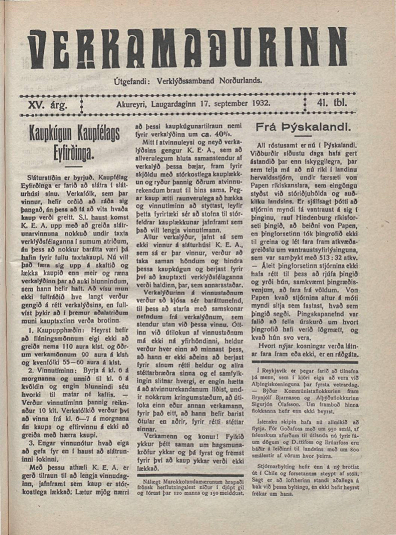
The author of the version is unknown. It was published (along with a version of the Internationale) in number 36 (May 1, 1931) of the magazine n° 36 del 1° maggio 1931 della rivista Verkamaðurinn (“The Worker”), under the title: Nokkrir alþjóðlegir söngvar verkalýðsins (“Some Folksongs of the Workers' Movement”). [RV]
1.
Uppreisnin breiðist svo ótt yfir landið.
Upp, upp til vopna, þú kúgaða stétt.
Skyldan, hún kallar til orustu alla,
afl móti valdi, þá sigrum við létt.
Við eigum frelsis ólgandi elda,
upphefjum blóðrauða fánann með dáð.
Verkamenn, fylkist nú féndunum móti,
fram, nú skal síðasta orustan háð.
öðru en hlekkjum, þín lausn er þitt starf.
Bráðum skal öreigans alræði drottna,
þá er okkar tími að bæta vorn arf.
2.
Sultur og neyð hefur nagað oss alla.
Níðingsins þjóðfélag bráðum er nár,
Brjótið þið nú hina bölvuðu hlekki.
Blóðhefndin ein getur læknað vor sár.
Með lífinu höfum við hugsjónir goldið,
sem hefja til frelsis hinn kúgaða lýð.
Fram því i vigið, sjá fánunum blæðir,
fram, rauði herinn er búinn í stríð.
öðru en hlekkjum, þín lausn er þitt starf.
Bráðum skal öreigans alræði drottna,
þá er okkar tími að bæta vorn arf.
Contributed by Борец(╹◡╹) - 2021/8/1 - 16:04
1α. Ienada negaisi - Latvian version
Ienaida negaisi pāri mums krājas,
Tumsības spēki mūs spaida un māc;
Kaujā pret naidniekiem biedri jau stājas -
Cīņai vēl gala vis neparedz skats;
Tomēr mēs pacelsim lepni un brīvi
Karogu cīņā par strādnieku dzīvi,
Zem viņa tautas lai salasas karā,
Labakas pasaules brīvības karā!
Uz priekšu trauc darba ļaužu daudz!
Uz asins kauju, uz taisnibas kauju,
Uz priekšu trauc darba ļaužu daudz!
Mirst mūsu dienās vēl strādnieki badā,
Draugi, vaj ilgak gan klusu mums ciest?
Nespēs mūs` censoņu brīvajā skata
Briesmas un nāve vis atpakaļ griezt;
Nezudis kritušie brīvības kaujā,
Mūžam tie dzīvi, kaut smiltis tos klās,
Tos mūsu uzvaras dziesma visstraujā
Miljoniem brīvotiem pasludinās.
Uz priekšu trauc darba ļaužu daudz!
Uz asins kauju, uz taisnibas kauju,
Uz priekšu trauc darba ļaužu daudz!
Riebjas mums tiranu, karaļu troņi,
Tautu mēs mīlam,ko važas vēl žņaudz,
Un tautas asinīm slacītie troņi
Arī pēc varmāku asinim sauc.
Atmaksa briesmīga visiem, kas ļaudis
Nievā un liekēžu slinkumā mirst!
Nāvi un atmaksu cari drīz baudīs:
Uzvaras diena mums tuvu jau dzirkst!
Uz priekšu trauc darba ļaužu daudz!
Uz asins kauju, uz taisnibas kauju,
Uz priekšu trauc darba ļaužu daudz!
Contributed by Riccardo Venturi - 2021/6/28 - 13:45
1β. Turkish version by the music group Kutup Yıldızı ("Polar Star")
Bu dağlar ucabaş ucabaş dağlaram
Ganli çehmeler yol açabilmez
Bu dağın ceylani özge yohçunun
Özge yohçunun ohuna gelmez
Tutkun akşamlarda ağlamaz gülmez!
Gollari bağlanan esir bir insan
Tutkun akşamlarda ağlamaz gülmez!
Gollari bağlanan esir bir insan
Tutkun akşamlarda ağlamaz gülmez!
Gollari bağlanan esir bir insan
Tutkun akşamlarda ağlamaz gülmez!
Yaylakta obada obada çoban
Çobanın ağzında ince bir tütek
Söyleyin iğitler çeken ganderi
Bir sundağında igit Ferhat'ın
Yurdunun çiçeği esrinin gözdesi
Alagöz Şirin'i getirin cana
Akşamlarda her guş goşun min dastan
Dost olsun her elden ezilen insan
Alagöz Şirin'i getirin cana
Akşamlarda her guş goşun min dastan
Dost olsun her elden ezilen insan
Bu dağlar gocabaş elleri ucabaş
Kanlıya bir dost bizlere kardaş
Ey yanar odlarla birlikte yanın
Birlikte yanın vefalı yoldaş
Ahan gızıl düzen ahan günecek
Bu uldızlar yere bahan günecek
Bal ölsun helgimin ektiği bostan
Dost olsun her elden ezilen insan
Bu uldızlar yere bahan günecek
Bal ölsun helgimin ektiği bostan
Dost olsun her elden ezilen insan.
Contributed by アルバトロス795 - 2021/4/10 - 02:53
1β1. A different Turkish version ("Haydi yoldaşlar")
These (still unauthored) Turkish lyrics were published in 1976 in the official magazine of the Turkish Labour Party (Türkiye İşçi Partisi); the Warszawianka bears here the title of "Haydi yoldaşlar" (“Forwards, Comrades!”), or "Varşovienka" in continental Turkey. After translating the lyrics (into Japanese), I noticed they seem slightly influenced by Stefan Priacel’s classic French version of 1930. [Boreč; transl. RV]
Pubblicato da / Published by: Türkiye İşçi Partisi merkez yayin organi (Organo centrale del Partito Turco del Lavor / Central organ of the Turkish Labour Party)
1.
Saldırınca düşmanlar üstümüze
yükseltiriz biz şanlı bayrağımızı.
Ne acıya ne ölüme aldırır,
doğüşürüz açarak bağrımızı.
Haydi arkadaşlar, haydi yoldaşlar!
Şanlı bayrağımızın eşliğinde ―
iş ve adalet için kavgamız var
bütün işçilerin kardeşliğinde.
Haydi arkadaşlar, haydi yoldaşlar!
Zaferi için tüm çalışanların ―
verilecek zorlu bir kavgamız var
kurulması için o mutlu yarının.
2.
Tüm çıkarcılar korksun öfkemizden,
krallarını, çürümüş tahtlarını!
Kim kurtaracak büyük kinimizden?
Yeni baştan kuracağız yarını.
Haydi arkadaşlar, haydi yoldaşlar!
Şanlı bayrağımızın eşliğinde ―
iş ve adalet için kavgamız var
bütün işçilerin kardeşliğinde.
Haydi arkadaşlar, haydi yoldaşlar!
Zaferi için tüm çalışanların ―
verilecek zorlu bir kavgamız var
kurulması için o mutlu yarının.
Contributed by Boreč - 2022/7/6 - 14:08
1γ. The Chilean Varsoviana
1.
Mientras el rico en su cómodo cargo
Reprime a la masa y privatiza al ser,
El pobre duerme en fangoso letargo,
Pero una semilla parece nacer.
Ayer eran miles, hoy son cien mil,
Los que propugnan cambio en la sociedad.
La abolición de un sistema hostil,
Por la felicidad de la humanidad.
¡Marcha hasta la victoria, Pueblo chileno!
Toma el poder con coraje y valor,
A transformar la historia, Trabajador!
2.
Aborrecemos el capitalismo,
Por asfixiar al pueblo en deudas y jornal.
Robo, miseria, ignorancia y fascismo,
Es el gran costo de aceptar este mal.
Para que acabe este abuso indignante,
Hay que expulsar a toda la corruptela.
Sustituírla por representantes,
Desde las bases y por la Clase Obrera.
¡Marcha hasta la victoria, Pueblo chileno!
Toma el poder con coraje y valor,
A transformar la historia, Trabajador!
3.
Ver a los pacos no aterra al valiente,
Pero algo atrasa a la Gran Revolución.
Antes golpeaban al Pueblo inconsciente,
¡Hoy es el Pueblo quien castiga al patrón!
Juicio y castigo a los responsables,
A los burgueses y fascistas también.
Juicio y castigo a los explotadores,
La justicia trae a todos el bien.
¡Marcha hasta la victoria, Pueblo chileno!
Toma el poder con coraje y valor,
A transformar la historia, Trabajador!
Contributed by Boreč (T ^ T) - 2021/8/11 - 13:35
1γ1. La Varsoviana (Spanish literal translation)
Hostiles torbellinos soplan sobre nosotros,
fuerzas oscuras nos esclavizan con furor.
En mortal combate entramos con el enemigo
y todavía un extraño destino aguarda.
Pero vamos a plantar con orgullo y valor
a la heroica bandera del trabajador.
Bandera de lucha de todos los pueblos
por la libertad y un mundo mejor.
sacra y justa,
marcha, marcha, y sigue al frente
proletario.
Muere de hambre el obrero
¿callaremos, hermanos, por más tiempo?
¿Puede acaso el ver a la horca
asustar a nuestros jóvenes camaradas?
En gran batalla no serán olvidados
los caídos ante el honor de nuestro ideal.
Sus nombres estarán en gloriosos cantos
y en la memoria de millones de personas.
sacra y justa,
marcha, marcha, y sigue al frente
proletario.
Aborrecemos la tiránica corona;
pero honramos las cadenas de la mártir nación.
La sangre de personas inundó los tronos
y a nuestros rivales bañaremos en sangre.
¡Venganza sin piedad a todo enemigo!
¡A los parásitos de las masas proletarias!
¡Venganza sin piedad a plutócratas y zares!
La victoria está más cerca a cada instante.
sacra y justa,
marcha, marcha, y sigue al frente
proletario.
Contributed by Boreč ( ̄∀ ̄) - 2021/8/29 - 17:28
1γ2. La Varsoviana: Alternative Spanish version from Cancionero Revolucionario de las Comisiones Obreras de Andalucía
“La maggior parte delle persone probabilmente immagina A las barricadas come la versione spagnola del testo della 'Varshavyanka', ma esisteva un altro testo nascosto in spagnolo: "La Varsoviana". Questo testo proviene dal "Cancionero revolucionario", una raccolta di canzoni provenienti dagli archivi del CCOO (Comitato operaio spagnolo, Andalusia). Questa raccolta conteneva un'ampia gamma di canzoni rivoluzionarie e di resistenza in lingua spagnola, dalla Spagna al Sud America. Mentre "A las barricadas" è un inno fondamentalmente anarchico, questo può essere descritto come un inno per comunisti e socialisti.” [Boreč]
Poco è dato sapere di questa versione (in realtà un testo completamente autonomo), reperita da Boreč, di cui non si conosce né la reale origine, né l’autore o autori. Essendo testimoniata esclusivamente dal Cancionero delle Commissioni Operaie di Andalusia, organismo sindacale ancora esistente, è del tutto probabile che sia sorta nell’ambito di tale organismo, forse negli anni ‘60 del XX secolo all’epoca degli scioperi nel settore vitivinicolo di Jerez durante i quali il CCOO svolse una grossa attività. Il Cancionero non è datato ma contiene diverse canzoni di lotta e sociali (spagnole e sudamericane) risalenti agli anni ‘60 e ‘70. Poiché vi si menzionano anche delle registrazioni su cassette stereo, risale quasi sicuramente alla prima metà degli anni '70. Ne riportiamo qui sotto l'introduzione in spagnolo, accuratamente ricopiata da Boreč. [RV]
El papel y la importancia que tiene el arte para el movimiento revolucionario de los pueblos han sido señalados en muchas ocasiones. En nuestro país, son muchos los artistas que se han definido claramente por los intereses del pueblo y no han escondido su finalidad política. Es por esto que la gran mayoría se encuentran exiliados, en la clandestinidad o siendo constantemente reprimidos.
Este compromiso los lleva a permanecer siempre fieles a la verdad emergente que impulsa y mueve a nuestro pueblo hacia la consecución de su auténtica realización histórica. Es por esto que todos los artistas que tengan la posibilidad de hacerlo deben entregar su labor a la causa revolucionaria. Con ello no solo cumplen su responsabilidad con la clase obrera, sino también con el arte, puesto que en una época de explotación y miseria, de sojuzgamiento a los pueblos, de guerras crueles e injustas, de desenfrenado egoísmo e inconsciencia, de presiones que violan la voluntad de los pueblos que buscan liberarse del fascismo y del imperialismo; los artistas que se ponen al margen y se aprovechan de su posición privilegiada dentro de la sociedad, que de mil maneras busca corromperlos y alienarlos, traicionan la esencia misma del arte: el afán de educar, de liberar y de elevar al hombre.
La sociedad burguesa quiere que el arte sea un factor más de enajenación. Los artistas deben transformarlo en un arma revolucionaria hasta que la contradicción que actualmente existe entre el arte y la sociedad sea por fin superada.
Esta superación se llama revolución y su motor y agente fundamental es la clase obrera.
Todas estas canciones están grabadas en "cassettes". Si te interesa comprarlas, dirígete a la misma persona a quien le he vendido este cancionero.
1.
Somos la voz de los pueblos on lucha.
Somos el canto de toda la humanidad,
que grita ¡Basta! y avanza triunfante
por los senderos de las rosas y el pan.
Por los caminos avanza gloriosa
nuestra bandera de unidad y unidad.
Roja de sangre, de mártires roja
de tantos siglos de soñar libertad.
2.
Caiga el sistema que oprime a los pueblos
lo enterraremos para siempre, jamás;
y un nuevo mundo sin amos ni esclavos
levantaremos para la humanidad.
Todos los puños en un solo puño,
tode le sangre en un mismo caudal.
Que el enemigo se estrella en el muro
de nuestra lucha y de nuestra unidad.
por la victoria de los trabajadores!
¡Marcha adelante, a la santa lucha,
por la victoria de los trabajadores!
Contributed by Boreč - 2023/7/9 - 10:11
1δ. The Varšavjanka in Slovak
Swiecicki text napísal počas funkčného obdobia vo Varšavskej citadele pre socialistické aktivity v roku 1879. Po návrate zo sibírskeho exilu bol text uverejnený v ilegálnom poľskom časopise Proletariát (1883). Meno „Warszawianka“ sa jej lepilo po prvomájovej demonštrácii v roku 1905. Súčasťou melódie je Pochod Zouávov, ktorý sa stal obľúbeným pochodom povstania roku 1863. Autor hudby „March of the Zouaves“ nie je známy; niekedy sa predpokladá, že ním bol Stanislav Moniuszko. Podľa tradície je autorom ruského textu Gleb Maksimilianovich Krzhizhanovsky (1872-1959) a časom jeho vzniku je Krzhizhanovsky pobyt vo väzení Butyrka (1897). Texty vychádzajú od roku 1900. Pieseň sa rozšírila počas revolúcie v roku 1905. - Si veda qui / See here
1.
Nad nami vanú nepriateľské víchrice,
Temné sily nás zlostne utláčajú,
Vstúpili sme do osudnej bitky s nepriateľmi,
Čaká nás neznámy osud.
Ale my vstaneme hrdo a odvážne
Transparent boja za prácu za prácu,
Praporom veľkého boja všetkých národov
Za lepší svet, za svätú slobodu.
Svätý a správny,
Pochod, pochod vpred
Pracujúci ľudia!
2.
Pracovník v týchto dňoch umiera od hladu.
Budeme dlhšie mlčať, bratia?
Mladé oči našich spoločníkov
Môže byť pohľad na lešenie zastrašujúci?
Vo veľkej bitke nezahynú bez stopy
Padli so cťou za nápady
Ich mená s našou víťaznou piesňou
Stanú sa svätými pre milióny ľudí.
Svätý a správny,
Pochod, pochod vpred
Pracujúci ľudia!
Contributed by Akonin - 2021/8/10 - 14:54
1δ1. Slovak version
1.
Vetry vražedné zavlali nad nami,
zlovestných tyranii deptá nás voj.
Čo nás čaká, to my nevieme sami,
s nepriateľmi vojdem v osudný boj.
Než, my vztýčime hrdo a smelo
náš prápor červený, nás k boju pozýva,
za lepší život a svätú slobodu
robotníkov všetkých dáme životy svoje!
2.
Hladom a biedou my dnes umierame,
kapitál krv pije nám stále viac.
Rcete, ó bratia, či mlčaťu máme,
alebo sa zľaknúť snáď šibeníc?
V bitke veľkej či my padnem,
duch náš a idey ďalej budú žiť,
hrdinu smelé svojou spomienkou večnú
s piesňou víťaznú oslávi ľud!
3.
Nenávidíme tyranov koruny,
nám milšia mozoľnatá je dlaň.
Robotníkov krvou sú zaliate tróny,
raz však splatí nám krvavú daň.
Nemilosrdná pomsta všetkým zradcom,
všetkým parazitom proletárskych más,
pomsta a smrť bud všetkým krvavým vládcom,
víťazstvo nášho až vzíde čas!
Contributed by The multi-named user usually known as Borec - 2021/12/1 - 12:49
1ε. Varšuvietė - Lithuanian version by Juozas Baltrušaitis-Mėmelė (1905)
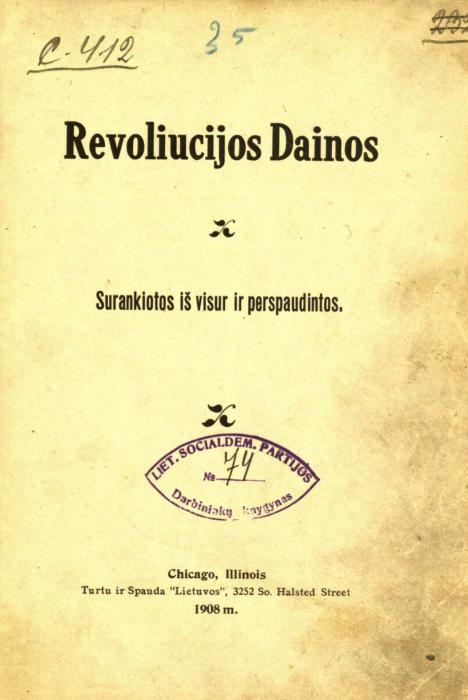
1.
Kelkim augštyn mųs' vēliavą drąsiai,
Nors priešų audros aplink mus kaukia,
Nors tamsios spēkos neliaun' mus tąsę,
Norint kas sykis myris mųs' laukia.
Ta vēliava – švents żenklas żmonijos,
Sandaros gands, giesmē atgimimo,
Pokilis truso, myris vergijos,
Pranašas laisvēs, tautų surinkimo.
Bet šventą, teisią, Stokim narsingai
Prieš mųs' skriaudējus ir prispaudējus!
2.
Kad darbininkai badmečius velka
Dykponiai turtų versmēse nardo...
Gēda tam, kurs nebeis mums į talką,
Griaujant skriaudas, – kurs n'ims rankon kardo!
Nieks uż idēja veltui neżųsta,
Kartais Judošių Kristus įveikia!
Liepsna jaunystēs! Svietą ligųstą
Visą apsiausk – jam perliepsnot reikia!
Bet šventą, teisią, Stokim narsingai
Prieš mųs' skriaudējus ir prispaudējus!
3.
Ei, karunas carui męs nutraukim!
Tronus, kvarbuotus krauju varguolių,
Budelių krauje puti apraukim, –
Skradżioms prasmegs tyronų tie guoliai!
O, pagieża visiems mąs' tyronams,
Ką milijonams išgeria kraują!
O, pagieża carams, visiems ponams!
Tverkim be jų męs buvį sau naują!
Bet šventą, teisią, Stokim narsingai
Prieš mųs' skriaudējus ir prispaudējus!
Contributed by Борец(╹◡╹) - 2021/7/31 - 13:58
1ε1. Lithuanian "Social-Democratic" version from 1918
This text was published in the revolutionary song book "Revoliucijos dainos 1918", which circulated among Lithuanian Social Democrats." There are indications that this text was translated from the Russian version, whereas another version of the text beginning "Kelkim augštyn mųs' vēliavą drąsiai" was translated from the original Polish version. The author is currently unknown. Another LP record of "Varšuvietė" with a different text is also known from Lithuania. Further research will continue. [Boreč]
Questo testo fu pubblicato nel libro di canzoni rivoluzionarie "Revoliucijos dainos 1918", che circolava tra i socialdemocratici lituani". Ci sono indicazioni che questo testo sia stato tradotto dalla versione russa, mentre un'altra versione del testo che inizia "Kelkim augštyn mųs' vēliavą drąsiai" è stata tradotta dalla versione originale polacca. L'autore è attualmente sconosciuto. Un altro disco LP di "Varšuvietė" con un testo diverso è stato trovato in Lituania. Ulteriori ricerche continueranno. [Boreč]
1.
Priešingos audros aplinkai mus staugia,
Tamsiosios jėgos mus gniaužia piktai,
Mus dar likimas nežinomas laukia —
Į kovą su priešu mes stojom tvirtai.
Vėliavą kelsim stipriai ir drąsiai —
Ženklą mūs kovai už reikalus darbo,
Ženklą didėsės kovos visų liaudžių
Del naujo pasaulio, liuosybės šventos.
Na, ženkie pirmyn! Ta darbo liaudie!
Į kraujo kovą šventą ir teisią,
Na, ženkie pirmyn! Ta darbo liaudie!
2.
Miršta lš bado šiandien darbi ninkas,
Ar galim gi, broliai, ilgiau mes tylėt?
Masą kovotoją žydriosios akys
Prieš kartuvių vaizdą ar gal sudrebėt?
Žavę garbingai kovoj už idėją —
Niekad nenyks jų garbingi vardai —
Plaaks tie vardai su mūs daina galinga,
Taps milijonams žmonių jie šventais.
Na, ženkie pirmyn! Ta darbo liaudie!
Į kraujo kovą šventą ir teisią,
Na, ženkie pirmyn! Ta darbo liaudie!
3.
Smarkiai mums biaurūs tyronų vainikai,
Gerbiame pančius kentėjos liaudies,
Liaudies krauja aptaškytaosias sostus
Budelių — priešą lai kraujas aplies.
Kerštas be gailesčio tiems dykaduoniams —
Darbo žmonijos visoms siurbėlėms.
Lai bus mirtis mūsų priešams turtuoliams!
Artinas pcrgalės ta valanda!
Na, ženkie pirmyn! Ta darbo liaudie!
Į kraujo kovą šventą ir teisią,
Na, ženkie pirmyn! Ta darbo liaudie!
https://ibiblioteka.lt/metis/publication/C1B0004163250
Record: https://ibb.co/hLPgCPL
Contributed by Boreč - 2022/10/3 - 03:10
1ε2. Varšuvietė - Lithuanian version from 1957
Original: Warszawianka 1905 roku
Country: Lithuania
Language: Lithuanian
Composer: Józef Pławiński
Lyricist: ????
Choir&Orchestra: Lithuanian Radio Symphony Orchestra (Lietuvos radijo simfoninis orkestras)
Year written: 1905
Year recorded: 1957
Record source: Varšuvietė / Drąsiai, Draugai, Koją Kojon
The audio in this video is from the vinyl LP "Varšuvietė / Drąsiai, Draugai, Koją Kojon" released in Lithuania SSR, which has completely different lyrics from the two versions I have previously presented earlier. This Warszawianka performed by the Lithuanian Radio Orchestra, and has long been forgotten by Lithuanians, and my friend told me that there were no longer any audios left in Lithuania, but I managed to collect the vinyl LP. I looked around in the electronic library for information resources related to Lithuanian revolutionary songs, but the text of this version was nowhere to be found. [Boreč]
L'audio in questo video è tratto dall'LP in vinile "Varšuvietė / Drąsiai, Draugai, Koją Kojon" pubblicato nella Repubblica Socialista Sovietica Lituana, che ha un testo completamente divers0 dalle due versioni che ho presentato in precedenza. Questa Warszawianka, eseguita dall'Orchestra della Radio Lituana, è rimasta a lungo dimenticata dai lituani; un amico mi ha detto che non esisteva più nessun audio in Lituania, ma sono riuscito a raccogliere l'LP in vinile. Ho cercato nella biblioteca elettronica risorse informative relative alle canzoni rivoluzionarie lituane, ma il testo di questa versione non si trova da nessuna parte. [Boreč]
Contributed by Boreč - 2022/10/29 - 02:15
1ζ. Варшав'янка (Varšav'janka) (Anonymous?) Ukrainian version
Свєнціцький написав текст, відбуваючи у Варшавській цитаделі термін за соціалістичну діяльність, в 1879. Після повернення Свєнціцького із сибірського заслання текст був опублікований в нелегальному польському журналі «Proletariat» (1883). Назва «Warszawianka» закріпилося за нею після першотравневої демонстрації 1905. В мелодії частково використаний «Марш зуави» з текстом варшавського поета Влодзімежа Вольського (пол. Włodzimierz Wolski, (1824-1882), який став популярним маршем повстання 1863 року. Автор музики «Маршу зуави» невідомий, іноді припускають, що ним був Станіслав Монюшко , до операм якого Вольський писав лібрето.
Автром російського тексту за традицією вважається Г. М. Кржижановський, а часом його створення — перебування Кржижановского в Бутирській в’язниці (1897). Текст публікувався, починаючи з 1900. Масове поширення пісня отримала під час революції 1905 року. - VIZA.vn.ua
1.
Хмари зловісні нависли над нами, [1]
Сили ворожі нас тяжко гнітуть,
Станьмо ж до бою усі з ворогами!
Смерть, або воля та слава нас ждуть!
Ми ж не злякаємось! Гордо та сміло
Стяг піднесемо за правеє діло!
Стяг боротьби за свободу народу,
Щоб панували скрізь воля та згода!
Хай лине грізно могутній наш спів!
Гордо і сміло за правеє діло
Вдаримо разом на всіх ворогів!
2.
Пухне із голоду люд весь робочий,
Доки ж ми будемо браття терпіть?
Доки катюга, до крові охочий,
Буде по світові кров нашу лить!
Станьмо ж до бою! Не згинуть ніколи
Ті, що поляжуть за щастя людей,
Ті, що життя віддадуть задля волі,
Ті, що у тюрми підуть з-за ідей!
Хай лине грізно могутній наш спів!
Гордо і сміло за правеє діло
Вдаримо разом на всіх ворогів!
3.
Нам ненависні тиранів корони,
Час настає їх ногами стоптать.
Час зруйнувать всі неправильні трони
І на маленькі тріски поламать.
Помста усім ворогоам-супостатам,
Що закували народ в кайдани.
Помста і смерть всім царям-плутократам!
Нумо ж до бою всі праці сини!
Хай лине грізно могутній наш спів!
Гордо і сміло за правеє діло
Вдаримо разом на всіх ворогів!
[1] Varšav'janka
Xmari złovіsnі navysły nad namy,
Syly vorožі nas tjažko hnіtuť,
Stańmo ž do boju usі z vorohamy!
Smerť, abo volja ta słava nas žduť!
My ž ne zljakajemoś! Hordo ta smіło
Stjah pіdnesemo za praveje dіło!
Stjah boroťby za svobodu narodu,
Šćob panuvały skrіź volja ta zhoda!
V łavy stavajmo, stjah pіdіjmajmo,
Xaj line hrіzno mohutnіj naš spіv!
Hordo і smіło za praveje dіło
Vdarymo razom na vsіx vorohіv!
2.
Puxne іz hołodu ljud veś robočyj,
Doky ž my budemo brattja terpіť?
Doky katjuha, do krovі oxočyj,
Bude po svіtovі krov našu łyť!
Stańmo ž do boju! Ne zhinuť nіkoły
Tі, šćo poljažuť za šćastja ljudej,
Tі, šćo žyttja vіddaduť zadlja volі,
Tі, šćo u tjurmy pіduť z-za іdej!
V łavy stavajmo, stjah pіdіjmajmo,
Xaj line hrіzno mohutnіj naš spіv!
Hordo і smіło za praveje dіło
Vdarymo razom na vsіx vorohіv!
3.
Nam nenavysnі tyranіv korony,
Čas nastaje jix nohamy stoptať.
Čas zrujnuvať vsі nepravylnі trony
І na maleńkі trіsky połamať.
Pomsta usіm vorohoam-supostatam,
Šćo zakuvałyi narod v kajdany.
Pomsta і smerť vsіm carjam-płutokratam!
Numo ž do boju vsі pracі syny!
V łavy stavajmo, stjah pіdіjmajmo,
Xaj line hrіzno mohutnіj naš spіv!
Hordo і smіło za praveje dіło
Vdarymo razom na vsіx vorohіv!
Contributed by Борец(╹◡╹) - 2021/8/4 - 13:32
1ζ1. Ukrainian version by Vasil K. Holovatski [1915]
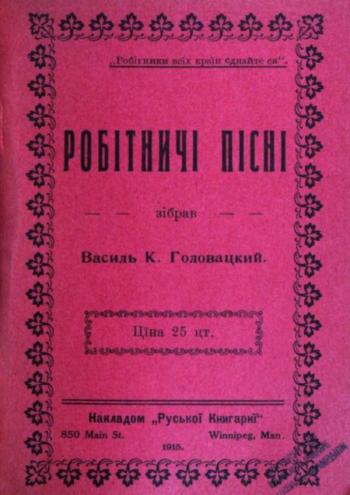
Ho trovato una traduzione ancora più vicina alla versione originale russa rispetto al testo ucraino menzionato in precedenza su questo sito, e lo annoto qui. Questo testo fu pubblicato in Ucraina nel 1915 da Vasil K. Holovatski nella sua raccolta di canti di lavoro "Робобітничі пісні". L'analisi dei testi rivela che si tratta di un adattamento ucraino diretto della versione russa di Krzyżanowski, che è probabilmente una traduzione legittima del successore. [Boreč]
Хмари зловісні висять над нами, ― [1]
Сили ворожі нас тяжко гнетуть,
Станьмо-ж до бою всї з ворогами ―
Смерть або воля та слава нас ждуть.
Миж не лякаймось гордо і сьміло
Стяг піднесїмо за праве дїло,
Бо то е стяг за волю народа
Скрізь, щоб настали воля та згода!
На бій рішучий, сьвятий і правий,
Марш, марш, вперед, робочий народ!
На бій рішучий, сьвятий і правий,
Марш, марш, вперед, робочий народ!
2.
Пухне з голоду весь люд робочий
Докиж ми будемо, катам, терпіть?
Як довго кат до крови охочий,
Буде по сьвітови кров вашу лить?
Станьмо до бою, сьвіт не забуде,
Тих, що поляжуть за щасте людий,
Пісня тріюмфу греміти буде
На честь великих ідей і людий.
На бій рішучий, сьвятий і правий,
Марш, марш, вперед, робочий народ!
На бій рішучий, сьвятий і правий,
Марш, марш, вперед, робочий народ!
3.
Гура, зірвімо з царів корони,
До тепер люди ходять в терновій
На віки впадуть надгнилї трони!
Що забарвлені в крові народній!
Га, пімста страшна сучасним катам!
Котрі беруть жите мілїонів!
Га, пімста царам і плютократам,
Хай прийде збір будучности пльонів!
На бій рішучий, сьвятий і правий,
Марш, марш, вперед, робочий народ!
На бій рішучий, сьвятий і правий,
Марш, марш, вперед, робочий народ!
[1] Xmary zlovisni vysjatʹ nad namy, ―
Syly voroži nas tjažko hnetutʹ,
Stanʹmo-ž do boju vsji z vorohamy ―
Smertʹ abo volja ta slava nas ždutʹ.
Myž ne ljakajmosʹ hordo i sʹmilo
Stjah pidnesjimo za prave djilo,
Bo to e stjah za volju naroda
Skrizʹ, ščob nastaly volja ta zhoda!
Na bij rišučyj, sʹvjatyj i pravyj,
Marš, marš, vpered, robočyj narod!
Na bij rišučyj, sʹvjatyj i pravyj,
Marš, marš, vpered, robočyj narod!
2.
Puxne z holodu vesʹ ljud robočyj
Dokyž my budemo, katam, terpitʹ?
JAk dovho kat do krovy oxočyj,
Bude po sʹvitovy krov vašu lytʹ?
Stanʹmo do boju, sʹvit ne zabude,
Tyx, ščo poljažutʹ za ščaste ljudyj,
Pisnja trijumfu hremity bude
Na čestʹ velykyx idej i ljudyj.
Na bij rišučyj, sʹvjatyj i pravyj,
Marš, marš, vpered, robočyj narod!
Na bij rišučyj, sʹvjatyj i pravyj,
Marš, marš, vpered, robočyj narod!
3.
Hura, zirvimo z cariv korony,
Do teper ljudy xodjatʹ v ternovij
Na viky vpadutʹ nadhnylji trony!
ŠČo zabarvleni v krovi narodnij!
Ha, pimsta strašna sučasnym katam!
Kotri berutʹ žyte miljioniv!
Ha, pimsta caram i pljutokratam,
Xaj pryjde zbir budučnosty plʹoniv!
Na bij rišučyj, sʹvjatyj i pravyj,
Marš, marš, vpered, robočyj narod!
Na bij rišučyj, sʹvjatyj i pravyj,
Marš, marš, vpered, robočyj narod!
Contributed by Boreč - 2023/5/24 - 04:08
1η. A Varsoviana de 1905 - Portuguese translation by Erick Fishuk
A música de 1905 teve a letra escrita em 1879 por Wacław Święcicki (1848-1900), que então estava preso por militância socialista. Mesmo assim, dependendo de quem executa, a letra varia bastante. Ela foi publicada inicialmente em 1883 na revista ilegal polonesa Proletariat, quando Święcicki voltou de seu exílio na Sibéria. O título A Varsoviana fixou-se depois dos protestos do 1.º de Maio na capital polonesa em 1905, quando 30 trabalhadores morreram sob tiroteio, iniciando uma revolta local mais ampla contra o tsarismo.
A melodia foi composta por Józef Pławiński (1853 ou 1854-1880), que esteve na cadeia com Święcicki e se inspirou na Marcha dos Zuavos, símbolo de outra revolta polonesa de 1863-64. O autor desta melodia é desconhecido, mas há quem suponha ser ele o compositor Stanisław Moniuszko (1819-1872). Considera-se que o tradutor pro russo tenha sido Gleb Krzhizhanovski (1872-1959), que a teria feito na prisão em 1897 e publicado no início de 1900. Como na Polônia, a difusão se ampliou também em 1905, na dita Primeira Revolução Russa.
Sendo duas línguas eslavas de mútua influência, as versões em russo e polonês têm sentido muito parecido, apenas o refrão original sendo: “Naprzód Warszawo!/Na walkę krwawą,/Świętą a prawą!/Marsz, marsz, Warszawo!” (Avante, Varsóvia!/À luta cruenta,/Santa e justa!/Marche, marche, Varsóvia!). No século 20, foram feitas traduções em inúmeras línguas, sendo talvez a mais famosa A las barricadas, criada em 1936 por Valeriano Orobón Fernández e tornada popular entre anarquistas durante a guerra civil na Espanha. Em inglês, é conhecida a tradução Whirlwinds of Danger (Tempestades de perigo) de Douglas Robson, membro da IWW, nos anos 20. Uma letra bastante modificada foi feita por Randall Swingler e publicada em 1938, mas nunca se popularizou.
Conheçam este canal de onde eu tirei a montagem sem legendas, pois ele tem muito mais material histórico sobre o comunismo, embora seja partidário. Eu mesmo traduzi do russo (não do polonês), legendei e cortei o quadro em proporção moderna. O Prof. Daniel Aarão Reis também publicou em 2017 a própria tradução, na coletânea Manifestos vermelhos e outros textos históricos da Revolução Russa (p. 181-182), que ele organizou e comentou, e em que contribuí com algumas traduções. Mas o resultado dele ficou levemente diferente do meu. Pelas informações que achei no site Sovmusic.ru, o áudio foi gravado em 1993 pelo coral do Conjunto de Canto e Dança “Estrela Vermelha”, fundado no seio do Exército em 1977 e ainda muito atuante. Ele tem um site oficial e, como percebemos, também conta com mulheres.
Seguem abaixo minha legendagem, o texto em russo, a tradução em português e a transcrição traduzida das inscrições que aparecem no vídeo. Vocês podem lê-las na escrita original em que aparecem (caso tenha sido diferente antes de 1918), na grafia atual e em português. - Erick Fishuk
1. Ventanias inimigas sopram sobre nós,
Forças obscuras nos oprimem com maldade.
Entramos em luta fatal contra os inimigos,
Um destino ainda desconhecido nos espera.
Mas levantaremos com orgulho e coragem
A bandeira da luta pela causa operária,
Bandeira da grande luta de todos os povos
Por um mundo melhor e uma santa liberdade.
Santa e justa
Marche, marche avante,
Povo operário.
À luta sangrenta,
Santa e justa
Marche, marche avante,
Povo operário.
2. Atualmente o operário morre de fome,
Irmãos, devemos continuar calados?
Pode a visão do cadafalso assustar
Os jovens olhos de nossos camaradas?
Não ficarão esquecidos os que tombaram
Lutando com grande honra pelos ideais.
Seus nomes, com nosso canto da vitória,
Se tornarão sagrados a milhões de pessoas.
Santa e justa
Marche, marche avante,
Povo operário.
À luta sangrenta,
Santa e justa
Marche, marche avante,
Povo operário.
3. Nós detestamos as coroas dos tiranos,
Respeitamos as cadeias do povo sofredor.
Os tronos cobertos com sangue do povo
Regaremos com o dos nossos inimigos!
Morte impiedosa a todos os canalhas!
A todos que parasitam os trabalhadores!
Vingança e morte aos reis plutocratas!
A hora solene da vitória está próxima!
Santa e justa
Marche, marche avante,
Povo operário.
À luta sangrenta,
Santa e justa
Marche, marche avante,
Povo operário.
Contributed by Riccardo Venturi - 2021/8/14 - 10:38
1θ. A Varsoviana - Portuguese Version
There was no information found about the author of this Portuguese version, clearly made to be sung. It may be inferred from the video that this version arose at the time of the Revolution of Carnations of 1974. See also here. [RV]
1.
Em filas cerradas o inimigo ataca,
À volta da nossa bandeira lutaremos.
Que nos importa a morte traidora,
Pela nossa causa começemos a paz.
O género humano profana a vergonha,
Não deve ter um só estandarte
Uma só palavra; trabalho e justiça,
Fraternidade para todos na terra.
Pela vitória de todo o punho em riste.
Irmãos, às armas, pela nossa luta,
Pela vitória de todo o punho em riste.
2.
Os oportunistas despojados na riqueza,
Livram o mundo do operário esfomeado.
Adeus, que morreram pelas nossas ideias
Não combateram e morreram em vão.
Contra os ricos e os plutocratas,
Contra os restos pelos reinos lacaios,
Nós lançaremos a vingança poderosa
E nós teremos para sempre a vitória.
Pela vitória de todo o punho em riste.
Irmãos, às armas, pela nossa luta,
Pela vitória de todo o punho em riste.
Contributed by Boreč - 2021/8/30 - 16:44
1ι. A version in the Udmurt [Votyak] language by Kuzebaj Gerd (from the 1920's)
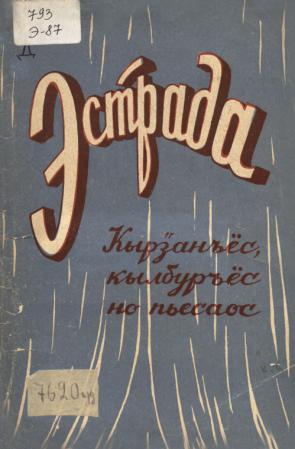
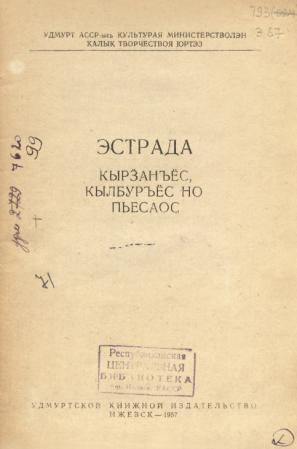
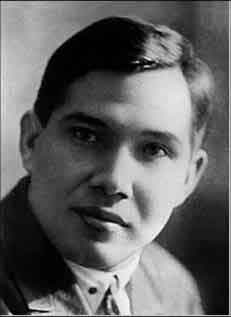
1.
Лек силыӧлъёс поръяло ӥыр вылтӥмы, [1]
Сьӧд кужымъёс ӝокато асьмеды,
Сьӧсь тушмонлы пумит ӝутӥськимы,
Лек адӟонъёс возьмало ваньместы.
Нош ми кужмо, ми кышкатэк ӝутомы
Шуд но эрик понна горд знамяез!
Горд знамяен ӝутомы нюръяськыны
Шуд но эрик понна вань калыкез!
Марш, марш азьлань, Рабочеӥ калык!
Эрик понна но, Зэмльк понна но
Марш, марш азьлань, Рабочеӥ калык!
2.
Весь курадӟо, кулыло ужасьёсмы.
Бен уломы шат ялан чидаса?
Шат асьмелэн егитэсь сэзь эшъёсмы
Сьӧд кулонлэсь пегӟозы кышкаса?
Пӧсь ожъёсын бырылэм эшъёсмылэн
Ноку уз вунэ дано нимъёссы,
Котьку соос миллион калыкъёслэн
Пӧсь сюлмазы выль кужым сётозы.
Марш, марш азьлань, Рабочеӥ калык!
Эрик понна но, Зэмльк понна но
Марш, марш азьлань, Рабочеӥ калык!
3.
Ми адӟонтэм кариськом эксэез но,
Ми ужаса улӥсез гажаськом.
Горд виръёсын пылатэм тронъёсты но
Ят виръёсын жалятэк пылатом.
Ми ваньмызлы вирюись тушмонъёслы —
Сьӧсь эксэӥлы, буржуӥлы, узырлы,
Вань ятъёслы пунэмзэ берыктомы,
Дыр вуэмын — вормон дыр асьмелы!
Марш, марш азьлань, Рабочеӥ калык!
Эрик понна но, Зэмльк понна но
Марш, марш азьлань, Рабочеӥ калык!
1.
Ljek silyõljos porjało iyir vyłtimy,
Śõd kužymjos džokato aśmjedy,
Śõś tušmonły pumit džutiśkimy,
Ljek adz ońjos voźmało vańmjesty.
Noš mi kužmo, my kyškatek džutomy
Šud no erik ponna gord znamjajez!
Gord znamjajen džutomy njurjaśkyny
Šud no erik ponna vań kałykjez!
Marš, marš aźlań, Rabočjeji kałyk!
Erik ponna no, Zjemlk ponna no
Marš, marš aźlań, Rabočjeji kałyk!
2.
Veś kuradźo, kułyło užaśjosmy,
Bjen ułomy šat jałan čidasa?
Šat aśmjelen jegiteś seź ešjosmy
Śõd kułonleś pegźozy kyškasa?
Põś ožjosyn byrylem ešjosmylen
Noku uz vune dano nimjossy,
Koťku soos million kałykjoslen
Põś sjułmazy vyl kužym sjotozy.
Marš, marš aźlań, Rabočjeji kałyk!
Erik ponna no, Zjemlk ponna no
Marš, marš aźlań, Rabočjeji kałyk!
3.
My adźontem kariśkom eksejez no,
Mi užasa ulisjez gažaśkom,
Gord virjosyn pyłatem tronjosty no
Jat virjosyn žaljatek pyłatom.
Mi vańmyzły virjuiś tušmonjosły -
Śõś eksejiły buržujiły uzyrły,
Vań jatjosły punemze bjeryktomy,
Dyr vuemyn – vormon dyr aśmjeły!
Marš, marš aźlań, Rabočjeji kałyk!
Erik ponna no, Zjemlk ponna no
Marš, marš aźlań, Rabočjeji kałyk!
Contributed by Boreč - 2021/9/8 - 06:44
1κ. Belarusian (Byelorussian) version
1.
Віхуры варожыя веюць над намі,
Цёмныя сілы зласліва гнятуць.
У суджаны бой мы пайшлі з ворагамі,
Чакае нас невядомы лёс.
Але падымем мы ганарліва
Сцяг барацьбы за працоўную справу,
Сцягі вялікай бітвы народаў
За лепшы свет, за святую свабоду.
Марш наперад, працоўны народ.
На бой крывавы, святы і правы
Марш наперад, працоўны народ.
2.
Мрэ ў нашы дні з галадухі працоўны,
Ці станем, браты, мы даўжэй маўчаць?
Нашых паплечнікаў юныя вочы
Ці можа від эшафота пужаць?
У бітве вялікай не згінуць бясследна
Адважна загіблыя ў імя ідэй.
З песняю нашай імёны герояў
Стануць святыя мільёнам людзей.
Марш наперад, працоўны народ.
На бой крывавы, святы і правы
Марш наперад, працоўны народ.
3.
Мы ненавідзім тыранаў кароны,
Цэпы народа святыя для нас.
Крывёй народнай залітыя троны
Ў ёй мы пацеплім ворагаў зараз!
Смерць бязлітасная ўсім супастатам!
Усім паразітам працоўных мас!
Помста і смерць усім царам-плутакратам!
Блізкі імпрэзы ўрачысты час.
Марш наперад, працоўны народ.
На бой крывавы, святы і правы
Марш наперад, працоўны народ.
1.
Vichury varožyja viejuc' nad nami,
Cjomnyja siły złasłiva gniatuc'.
U sudžany boj my pajšłi z voragami,
Čakaje nas nieviadomy los.
Ale padymiem my ganarłiva
Sciag barac'by za pracoŭnuju spravu,
Sciagi viałikaj bitvy narodaŭ
Za lepšy sviet, za sviatuju svabodu.
Marš napierad, pracoŭny narod.
Na boj kryvavy, sviaty i pravy
Marš napierad, pracoŭny narod.
2.
Mre ŭ našy dni z gaładuchi pracoŭny,
Ci staniem, braty, my daŭžej maŭčac'?
Našych paplečnikaŭ junyja vočy
Ci moža vid ešafota pužac'?
U bitvie viałikaj nie zginuc' biassledna
Advažna zagibłyja ŭ imia idej.
Z piesniaju našaj imiony gjerojaŭ
Stanuc' sviatyja mił'jonam ludziej.
Marš napierad, pracoŭny narod.
Na boj kryvavy, sviaty i pravy
Marš napierad, pracoŭny narod.
3.
My nienavidzim tyranaŭ karony,
Cepy naroda sviatyja dla nas.
Kryvioj narodnaj załityja trony
Ŭ joj my paciepłim voragaŭ zaraz!
Smierc' biazłitasnaja ŭsim supastatam!
Usim parazitam pracoŭnych mas!
Pomsta i smierc' usim caram-płutakratam!
Błizki imprezy ŭračysty čas.
Marš napierad, pracoŭny narod.
Na boj kryvavy, sviaty i pravy
Marš napierad, pracoŭny narod.
Contributed by Boreč - 2021/9/10 - 09:08
1λ. Varşovianca (Romanian literal translation from ro.wikiqube)
Să ne ridicăm cu îndrăzneală steagul,
Chiar dacă urlă o furtună de elemente ostile
Chiar dacă forțe sinistre ne oprim astăzi,
Chiar dacă mâine toată lumea este incertă.
Oh, acesta este steagul întregii omeniri,
Chemarea sacră, cântarea învierii,
Este triumful muncii și al dreptății,
Este zorii frăției tuturor popoarelor!
La lupta sângeroasă,
Sacru și drept!
Martie, marș, Varșovia!
Astăzi, când oamenii muncii mor de foame,
A te delecta cu luxul este o crimă,
Și rușine pentru cei dintre noi, care în tinerețe,
Îți este frică să montezi schela!
Oh, nu vom uita niciodată moartea celor,
Cine și-a dat viața pentru cauză,
Pentru că cântarea noastră victorioasă va face
Numele lor onorate de milioane de oameni!
La lupta sângeroasă,
Sacru și drept!
Martie, marș, Varșovia!
Hurra! Să dărâmăm coroana țarilor,
În timp ce oamenii poartă cea de spini.
Să înecăm tronurile putrede în sânge,
Tronurile deja pătate de violet cu sângele oamenilor!
Ha! Răzbunare înfricoșătoare față de chinuitorii de astăzi,
Asta suge viața a milioane de oameni.
Ha! Răzbunare pentru țari și plutocrați,
Și vom recolta culturile viitorului!
La lupta sângeroasă,
Sacru și drept!
Martie, marș, Varșovia!
Contributed by Riccardo Venturi - 2021/10/4 - 06:55
1μ. Vânturile de pericol (or Vârtejele pericolului) - Romanian version of Whirlwinds of Danger
Vânturile de pericol se dezlănțuie în jurul nostru,
Forțele copleșitoare ale întunericului atacă,
Încă în luptă văd înaintând în fața noastră,
Drapelul roșu al libertății care încă va prevala.
Atunci, înainte lucrătorilor, vă așteaptă libertatea,
În toată lumea de pe uscat și de pe mare.
Mai departe cu lupta pentru cauza umanității.
Martie, marș, lucrătorilor și lumea va fi liberă.
Femeile și copiii înfometați sună,
Să tăcem la durerea și vai lor?
În timp ce în luptă vedem că frații noștri cad,
Sus, apoi uniți și cuceriți dușmanul!
Atunci, înainte lucrătorilor, vă așteaptă libertatea,
În toată lumea de pe uscat și de pe mare.
Mai departe cu lupta pentru cauza umanității.
Martie, marș, lucrătorilor și lumea va fi liberă.
Off cu coroana tiranilor de favoare!
Jos în praf cu prințul și semenul!
Scoateți lanțurile voastre, toți bravi fii ai muncii!
Trezește toată omenirea, căci victoria este aproape.
Atunci, înainte lucrătorilor, vă așteaptă libertatea,
În toată lumea de pe uscat și de pe mare.
Mai departe cu lupta pentru cauza umanității.
Martie, marș, lucrătorilor și lumea va fi liberă.
Contributed by Boreč - 2021/9/16 - 17:18
1μ1. Literal Romanian translation of the Russian version
1.
Vânturi ostile suflă deasupra noastră,
Forțele întunecate ne apasă malefic.
Am intrat într-o luptă fatală cu dușmanii,
Încă ne așteaptă destinurile necunoscute.
Dar ne vom ridica mândri și curajoși
Steagul luptei pentru cauza muncitorească,
Steagul măreței lupte a tuturor popoarelor
Pentru o lume mai bună, pentru libertatea sfântă.
La lupta sângeroasă, sfântă și dreaptă
Marș, marș, înainte, popor muncitor!
La lupta sângeroasă, sfântă și dreaptă
Marș, marș, înainte, popor muncitor!
2.
În zilele noastre, muncitorul moare de foame,
Vom rămâne frați și tăcem mai mult timp?
Ochii tineri ai camarazilor noștri
Pot oare vederea eșafodului să îi sperie?
În marea bătălie, cei căzuți nu vor dispărea fără urmă
Cu onoare, în numele ideilor,
Numele lor vor deveni victorioasa noastră cântare.
Vor deveni sacre pentru milioane de oameni.
La lupta sângeroasă, sfântă și dreaptă
Marș, marș, înainte, popor muncitor!
La lupta sângeroasă, sfântă și dreaptă
Marș, marș, înainte, popor muncitor!
3.
Coroanele tiranilor ne sunt odioase,
Lanțurile poporului suferind le respectăm.
Tronurile îmbibate în sângele poporului,
Cu sânge vom înroși dușmanii noștri!
Moartea nemiloasă tuturor dușmanilor!
Toți paraziții maselor muncitoare!
Răzbunarea și moartea tuturor regilor-plutocrați!
Ora triumfului se apropie solemn.
La lupta sângeroasă, sfântă și dreaptă
Marș, marș, înainte, popor muncitor!
La lupta sângeroasă, sfântă și dreaptă
Marș, marș, înainte, popor muncitor!
Contributed by Boreč - 2023/6/2 - 04:19
1μ2. Varşovianca - Lucian Minel Rădan’s Romanian Version
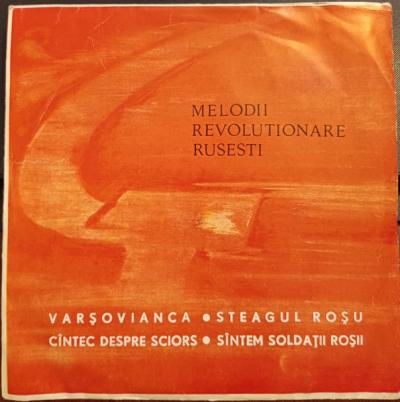
The Romanian version of Warszawianka is spelt Varșovianca and the lyrics were written by the poet Lucian Minel Rădan (1925-1956) from Giurgiu County, Muntenea, Romania. (The date the text was written is unknown). For a long time the song was not sung publicly in Romania, but in 1967, on the 50th anniversary of the October Revolution, the Romanian folk orchestra Ciocîrlia and the choir Perinița finally performed this hymn, loved by Lenin, in Romania. As with the other language versions, Lucian Rădan's lyrics are based on G. Krżyżanowski's text and, with the exception of the refrain part, there is no doubt that it is a masterful translation that has been faithfully translated.
Sebbene esistano riferimenti alla versione romena della Warszawianka nella letteratura di vari Paesi, tra cui Azerbaigian, Russia e Ungheria, per molto tempo non siamo riusciti a trovarne il testo. Oggi, però, siamo finalmente riusciti a svelare il testo completo della versione romena. La versione rumena della Warszawianka è intitolata Varșovianca. Il testo fu scritto dal poeta Lucian Minel Rădan (1925-1956) della contea di Giurgiu, Muntenia, Romania. (La data di stesura del testo è sconosciuta). Per molto tempo la canzone non è stata cantata pubblicamente in Romania, ma nel 1967, in occasione del 50° anniversario della Rivoluzione d'Ottobre, l'orchestra popolare rumena Ciocîrlia e il coro Perinița hanno finalmente eseguito questo inno, amato da Lenin, in Romania. Come per le altre versioni linguistiche, il testo di Lucian Rădan si basa su quello di G. Krżyżanowski e, ad eccezione della parte del ritornello; non c'è dubbio che si tratti di una traduzione magistrale e fedele.
Nota testuale. Il testo della versione è stato riportato all’ortografia attualmente in uso per la lingua romena (riforma del 1993). Viene fornita anche una trascrizione nei caratteri cirillici in uso per la “lingua moldava”, in uso fino alla dissoluzione dell’Unione Sovietica. [RV]
Note. The lyrics of the version have been retranscribed into the Cyrillic characters in use for the “Moldovan language” until the dissolution of Soviet Union is also provided. [RV]
Little biographical information about Lucian Minel Rădan has survived and is taken from the following page: original text below: DEBUTUL TÂNĂRULUI POET GIURGIUVEAN, LUCIAN MINEL RĂDAN
Despre poetul Lucian Minel Rădan, născut în anul 1925, în satul Vieru, din judeţul Giurgiu, se cunosc puţine repere biografice. Unele surse menţionează doar că a absolvit Liceul “ Ion Maiorescu “ în anul 1944, după care a fost redactor cultural la periodicile giurgiuvene : “ Vlaşca liberă “ şi “ Viaţa nouă “. Şi-a continuat studiile la Institutul de ştiinţe Economice şi Planificare , devenind economist cu specialitatea organizarea creditului pe termen scurt. În anul 1956 va susţine examenul de stat. Se mai menţionează faptul că Lucian Minel Rădan a mai colaborat , cu articole şi poezii, la ziarul regional “ Steagul roşu “, la revista tinerilor aflaţi la porţile consacrării, “ Tânărul scriitor “ şi revista „ Luceafărul “.
Pe când era elev, în ultimul an de studiu la Liceul “ Ion Maiorescu “ din Giurgiu, Lucian Minel Rădan debutează în paginile ziarului tuturor vlăşcenilor “ Călugărenii “ , nr. 8-9, din 1-15 aprilie 1944, cu poezia : “ Rondelul clopotarului “,
Clopotare, clopotare,
Sună clopotul pe deal –
Sună – l tare, cât mai tare
Să se-audă în Ardeal !
Şi din lunga lui cântare
Iasă Mureşul din mal !
Clopotare, clopotare,
Sună clopotul pe deal !
Pentru dorul care moare
Într-un stih patriarhal,
Tu vesteşte-o sărbătoare,
Vărsând jalea val de val,
– Clopotare, clopotare.
Tot în paginile acestui reuşit ziar bilunar giurgiuvean, deşi apărut în anii grei ai războiului, “ Călugărenii “ – nr.11 din 1-15 iunie, 1944,, tânărul poet Lucian Mirel Rădan va publica şi epigrame, destul de izbutite. Reţinem doar una, unde “ poanta”, specifică acestei craţii, o constituie un valoros joc de cuvinte :
Mă-ndoiesc că jumătatea
O să-l facă fericit,
Când atât amar de vreme
Doar cu “ litra “ a trăit.
Iubitor al literaturii franceze, Lucian Mirel Rădan este preocupat şi de traduceri din creaţia lui Charles-Pierre Baudelaire. Astfel întâlnim în paginile periodicului “ Călugărenii “ traducerea, ţntr-o reuşită formă literară a poeziei “ Duşmanul “, inclusă în volumul “ Florile răului ”.
Astfel numele adolescentului poet din satul Vieru apare, pentru prima dată, în pagina literară a publicaţiei „ Călugărenii “, alături de alte nume, déjà consacrate în Panteonul literaturii române : Radu Gyr, Nichifor Crainic, Nicolae Crevedia, Virgil Carianopol.
Debutul editorial al poetului Lucian Rădan va avea loc cu muţi ani mai târziu, post-mortem, prin strădania soţiei sale, Elena, care i-a adunat versurile în volumul „ Lumini şi umbre “, apărut la Editura pentru literatură, în anul 1967. Poetul trecuse în eternitate la 15 august 1956, după cum se precizează în Dicţionarul personalităţilor giurgiuvene “ Asalt spre crestele destinului “, realizat de Elena Ştefan şi Ion Gagii, apărut la editura Cronos, în anul 2006.
1.
Vinturi dușmane vuiesc peste lume,
Forţele negre ne-apasă cumplit,
Noi luptă grea vom porni cu vrăjmașul,
Cu soarta crudă ce-adânc ne-a robit.
Sus ridica-vom mândri in luptă
Plini de curaj, steagul nostru cel sfânt,
Toți muncitorii la luptă se-adună,
Noi fericirea dorim pe pământ!
Pe baricade lupta ne-așteaptă,
Noi libertăți dorim tuturor —
Cauza noastră e sfântă și dreaptă,
Mergi spre izbândă, popor muncitor!
2.
Foamea nu vrem să domnească în lume,
Şi muncitorii să-i scoată din rând.
De eșafoduri nicicând nu ne-om teme
Şi-n marea luptă pornim toți de-un gând.
Cei ce-or să cadă in focul luptei
N-or fi uitați niciodată de noi,
Numele lor il vom pune în cântec
Veșnic cinsti-vom pe bravii eroi!
Pe baricade lupta ne-așteaptă,
Noi libertăți dorim tuturor —
Cauza noastră e sfântă și dreaptă,
Mergi spre izbândă, popor muncitor!
3.
Jos tirania, coroana regească
Ce suferințe ne-au dat an de an.
Tronuri pătate de sângele nostru
Le-om înroși azi cu sânge dușman.
Vom răzbuna crunt orice-asuprire
Jos cu aceia ce vlaga ne-au supt.
Regii să piară, să piară robia!
― Ceasul victoriei noastre-a bătut!
Pe baricade lupta ne-așteaptă,
Noi libertăți dorim tuturor —
Cauza noastră e sfântă și dreaptă,
Mergi spre izbândă, popor muncitor!
Transcription in Moldovan Cyrillic characters (< 1991)
Варшовянка
1.
Винтурь душмане вуеск песте луме,
Форцеле негре не-апасэ кумплит,
Ной луптэ гря вом порни ку врэжмашул,
Ку соарта крудэ че-адынк не-а робит.
Сус ридика-вом мындри ын луптэ
Плинь де кураж, стягул ностру чел сфынт,
Тоць мунчиторий ла луптэ се-адунэ,
Ной феричиря дорим пе пэмынт.
Пе барикаде лупта не-аштяптэ,
Ной либертэць дорим тутурор -
Кауза ноастрэ е сфынтэ ши дряптэ,
Мерӂь спре избиндэ, попор мунчитор!
2.
Фоамя ну врем сэ домняскэ ын луме,
Ши мунчиторий сэ-и скоатэ дин рынд.
Де ешафодурь ничикынд ну не-ом теме
Ши-н маря луптэ порним тоць де-ун гынд.
Чей че-ор сэ кадэ ын фокул луптей
Н-ор фи уитаць ничиодатэ де ной,
Нумеле лор ыл вом пуне ын кынтек
Вешник чинсти-вом пе бравий ерой!
Пе барикаде лупта не-аштяптэ,
Ной либертэць дорим тутурор -
Кауза ноастрэ е сфынтэ ши дряптэ,
Мерӂь спре избиндэ, попор мунчитор!
3.
Жос тирания, короана реӂяскэ
Че суферинце не-ау дат ан де ан,
Тронурь пэтате де сынӂеле ностру
Ле-ом ынроши азь ку сынӂе душман.
Вом рэзбуна крунт ориче-асуприре
Жос ку ачея че влага не-ау супт,
Реӂий сэ пярэ, сэ пярэ робия!
-Чясул бикторией ноастре-а бэтут!
Пе барикаде лупта не-аштяптэ,
Ной либертэць дорим тутурор -
Кауза ноастрэ е сфынтэ ши дряптэ,
Мерӂь спре избиндэ, попор мунчитор!
Contributed by Boreč - 2024/1/11 - 03:52
Marilah kita angkat bendera berdarah kami!
Meskipun badai bermusuhan sedang menjerit,
Meskipun kekuatan jahat menindas kita hari ini,
Meskipun hari esok semua orang itu tidak pasti.
Oh, inilah panji dari seluruh umat manusia,
Panggilan mulia, lagu kebangkitan,
Inilah kemenangan oleh kerja dan keadilan,
Inilah fajar persaudaraan oleh semua rakyat!
Ke dalam pertarungan berdarah,
Adil dan mulia!
Maju, majulah, Warsawa!
Majulah, Warsawa!
Ke dalam pertarungan berdarah,
Adil dan mulia!
Maju, majulah, Warsawa!
Hore! Marilah kita runtuhkan mahkota raja,
Orang berkulit puth sedang memakai mahkota berduri itu.
Marilah kita tenggelamkan takhta yang busuk itu dalam darah,
Takhta-takhta yang telah bernoda ungu dengan darah para rakyat.
Ha! Balasan mengerikan kepada para penyiksa-penyiksa hari ini,
Yang menghisap jiwa-jiwa dari jutaan para rakyat!
Ha! Balasan kepada para raja dan plutokrat!
Dan kita akan memanen panen masa depan!
Ke dalam pertarungan berdarah,
Adil dan mulia!
Maju, majulah, Warsawa!
Majulah, Warsawa!
Ke dalam pertarungan berdarah,
Adil dan mulia!
Maju, majulah, Warsawa!
Marilah kita angkat bendera berdarah kami!
Meskipun badai bermusuhan sedang menjerit,
Meskipun kekuatan jahat menindas kita hari ini,
Meskipun hari esok semua orang itu tidak pasti.
Oh, inilah panji dari seluruh umat manusia,
Panggilan mulia, lagu kebangkitan,
Inilah kemenangan oleh kerja dan keadilan,
Inilah fajar persaudaraan oleh semua rakyat!
Ke dalam pertarungan berdarah,
Adil dan mulia!
Maju, majulah, Warsawa!
Majulah, Warsawa!
Ke dalam pertarungan berdarah,
Adil dan mulia!
Maju, majulah, Warsawa!
Contributed by Riccardo Venturi - 2021/10/5 - 17:25
1ο[μικρον]. Czech version
Dal disco LP di canzoni rivoluzionarie Revoluční písně, pubblicato dalla casa discografica Supraphon nel 1961 con varie riedizioni. Registrazione della Plzeňský rozhlasový orchestr diretta da Josef Blatský.
From the LP disc of revolutionary songs Revoluční písně, published 1961 by Supraphon with several reissues. Recorded by Plzeňský rozhlasový orchestr directed by Josef Blatský. [RV]
" Ho visto l'inserimento del video con la versione ceca e ho provato a rimediare il “testo purtroppo irreperibile”, comunque devo dire con scarso risultato. Il testo sembra al momento non presente in rete, pare che lo si possa trovare in un opuscolo contenente 120 canzoni “rivoluzionarie”, intitolato Brigáda zpívá (La brigata canta), di chiaro stampo di propaganda del regime, adesso offerto da qualche negozio di libri usati a 2-3 euro, come materiale “retrò” (in uno ci sono anche le foto di alcune pagine, quella con Varšavjanka però manca).
Da quello che mi pare di capire (dal linguaggio usato nella canzone, dalla copertina del libro e dell'LP, e dalle altre canzoni presenti), Varšavjanka nella sua versione ceca è stata una delle canzoni straniere tradotte e utilizzate dal regime ai fini di propaganda, probabilmente entrata meno nel repertorio e oggi quasi dimenticata, a differenza di altre canzoni che invece hanno avuto più fortuna, come la Kaťuša, Avanti popolo o, forse la più significativa, l'Internazionale, tutte canzoni che ancora oggi in Repubblica Ceca conservano una connotazione negativa, anche se a livello internazionale sono considerate diversamente. Da una parte è una riluttanza comprensibile, dato che queste canzoni sono state in pratica violentate da un regime che, fino al giorno della sua caduta, non ha mai smesso di utilizzare gli eufemismi della lotta operaia, della pace e della libertà per pratiche autoritarie che poi quasi sempre hanno pagato i meno abbienti e meno influenti. Dall'altra parte, questi fantasmi del passato, per quanto comprensibili, hanno tabuizzato nella società attuale alcuni temi quali i diritti dei lavoratori, solidarietà sociale, forme alternative all'onnipresente pensiero neoliberista. Trent'anni dopo la caduta del regime, nel paese praticamente non esiste la sinistra, sia in termini di rappresentazione politica che come punto di vista nei discorsi pubblici e nei mezzi di comunicazione. Non a caso in questo periodo (il giorno in cui scrivo siamo alla vigilia delle elezioni parlamentari) abbiamo visto una campagna elettorale tra chi è di destra e chi “non è mica di sinistra” (oltre a 2 o 3 immancabili partiti di estrema destra). Ma sarebbe un discorso troppo lungo...
Riporto qui quel poco di Varšavjanka ceca che sono riuscita a trascrivere all'ascolto, se vi interessa. Come vedete ci sono diverse lacune (anche qualche verso intero), purtroppo la qualità audio non è il massimo, in più essendo cantata in coro è molto difficile da capire in alcuni passaggi. Magari qualcun altro capirà qualcosa in più, oppure con il tempo troveremo altre fonti. " - Stanislava
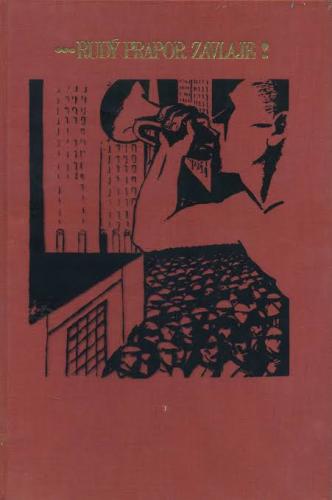
Alla fine (1-12-2021) Borec è riuscito a reperire il testo completo della versione ceca, da un canzoniere sembra intitolato Rudý prapor zavlaje! (qualcosa come “La bandiera rossa inonderà”, ma magari Stanislava ci potrà aiutare con la corretta traduzione del titolo, dato il mio cèco meno che elementare). Con un titolo molto simile, (A rudý prapor zavlaje), si ha anche un cortometraggio-documentario di animazione del 1975 diretto da Zdeněk Smetana, dedicato al XV plenum del Comitato Centrale del Partito Comunista Cecoslovacco. Husák a cartoni animati non me lo sarei mai immaginato. La versione ceca resta comunque anonima, e niente si sa del suo eventuale autore; ma è probabile che anch'essa sia originaria del primo ventennio del XX secolo. Sempre a Stanislava chiederemmo, a tale proposito, se il ceco utilizzato ha un qualche carattere solenne o arcaico. [RV]
Borec finally managed to extrapolate the complete lyrics of the Czech version from a songbook apparently called Rudý prapor zavlaje! (something like “The red flag will flood”, or so; but we hope Stanislava helps us find a more correct translation, my Czech being desperately poor). With a very similar title (A rudý prapor zavlaje) there's also a cartoon short documentary from 1975, directed by Zdeněk Smetana and focused on the 15th Plenum of the Central Committee of Czechoslovakia's Communist Party. I never imagined Gustav Husák in cartoons. Anyway, the Czech version goes on in its anonymous state, and nothing is known about its author. The version may however originate in the decades between 1900 and 1920. We kindly ask Stanislava to check if the language is somewhat old-fashioned and/or solemn. [RV]
1.
Větry vražedné zavlály nad námi,
zlověstných tyranii deptá nás voj.
Co nás čeká, to my nevíme sami,
s nepřáteli vejdem v osudný boj.
Než, my vztyčíme hrdě a směle
náš prapor rudý, jenž nás k boji zve,
za lepší život a svátou svobodu
dělníků všech dáme životy své!
2.
Hladem a bídou my dnes umíráme,
kapitál krev pije nám stále víc.
Rcete, ó bratři, zda mlčeti máme,
nebo se zaleknout snad šibenic?
V bitvě veliké jestli my padnem,
duch náš a ideje dál budou žít,
hrdiny smělé svou vzpomínkou věčnou
s písní vítěznou oslaví lid!
3.
Nenávidíme tyranů koruny,
nám milejší mozolnatá je dlaň.
Dělníků krví jsou zality trůny,
jednou však splatí nám krvavou daň.
Nemilosrdná msta všechněm zrádcům,
všem parasitům proletářských mas,
pomsta a smrt bud všem krvavým vládcům,
vítězství našeho až vzejde čas!
Contributed by Boreč (and Stanislava) - 2021/10/5 - 15:27
1π. Kënga e Varshavës - Albanian translation
Translation by Yuiop75 reproduced from Lyricstranslate. This is a literal translation of the Russian Varshavianka. Note: the original translation doesn't show the character [ ë ] (as usual with Albanian texts available from the Web). This character has been restored here where required. [RV]
Te ashpra tufanet që fryjnë mbi ne,
Pushtetet e errësirës na shtypin me përcmim,
Marshuam për betejën vendimtare me armikun
E panjohur e ardhmja është për ne.
Por me kurajo e vendosmëri të përgjigjemi,
Me flamurin e kauzës së luftës se punëtorisë,
Flamuin e luftës se madhe te gjithë popujve,
Për një botë me të mirë, për lirinë e shenjtë.
Të ndershme te drejtë!
Marshojmë, marshojmë, përpara
Popull i puntorisë.
Përpara për betejë të përgjakshme,
Të ndershme te drejtë!
Marshojmë, marshojmë, përpara
Popull i puntorisë.
Këto janë ditët ku puntori vdes urie,
Vëllezër, sa kohë do vazhdojmë të heshtim.
Apo sytë rinorë te shokëve tanë
I tremb pamja e ngrehinës se lartë?
Në luftën e madhe s’do iki i panjohur,
Kush ra me nder ne emër të idealit.
Emrat e tyre do jenë në këngët fitimtare
Do të behen te shenjtë per miliona njerëz.
Të ndershme te drejtë!
Marshojmë, marshojmë, përpara
Popull i puntorisë.
Përpara për betejë të përgjakshme,
Të ndershme te drejtë!
Marshojmë, marshojmë, përpara
Popull i puntorisë.
E përbuzim kurorën e tiranit,
Homazh ju bejmë te vuajturve nën zinxhirë,
Dhe froneve të zhytur në gjakun e popujve
Me gjakun e tyre do të mbysim armiqtë.
Vdekje mizorë kundërshtareve tanë,
Të gjithë shushunjave të masës punëtorë,
Hakmarrje dhe vdekje të pangopurve mbretër,
Në këte orë solemne e afert është fitorja.
Të ndershme te drejtë!
Marshojmë, marshojmë, përpara
Popull i puntorisë.
Përpara për betejë të përgjakshme,
Të ndershme te drejtë!
Marshojmë, marshojmë, përpara
Popull i puntorisë.
Contributed by Riccardo Venturi - 2021/10/7 - 08:32
Albanian version from the songbook Këngë partizane ("Partisan Songs", 1959)
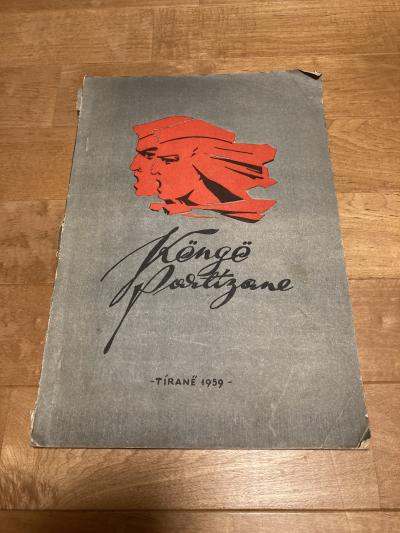
"Non avrei mai pensato che anche un libro costoso sarebbe costato così tanto da spedire, e avere un libro europeo consegnato in Giappone è ridicolmente costoso. Hahaha… Oh, sì, ho trovato il testo della versione albanese della Warszawianka 1905 in "Këngë partizane", una raccolta di canti partigiani albanesi che finalmente sono riuscita ad acquistare. Penso che pochissimi albanesi che vivono oggi lo sappiano. Come sempre, contribuisco qui per l'ulteriore sviluppo di AWS (CCG). Di seguito è riportata la prefazione di Baki Kongoli, l'editore di questo canzoniere. Scritto nel 1958. [Boreč]"
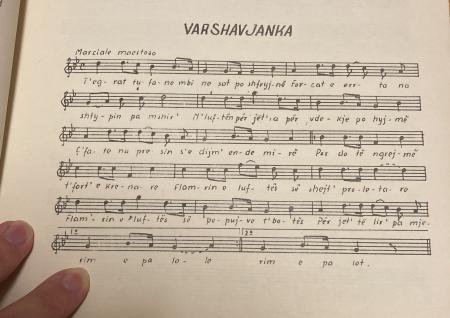
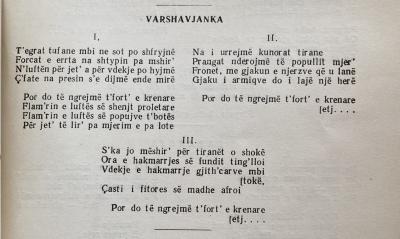
Teksti: G. Krżyżanowski, E panjohur
Libër këngësh: Këngë partizani
NË VEND TË PARATHËNJES
Me gëzim e kanaqësi të veçantë e prita porosinë që më bëri Ministrija e Arësimit e Kulturës për të redaktuar një libër me këngë partizane e të luftës nacional-çlirimtare. Nga shumica e këngëve, që u kënduan nga çetat, brigadat partizane e nga mbarë populli gjatë kohës së luftës sonë për liri, zgjodha e redaktova ato që janë më të njohura, më të popullarizuara si edhe disa këngë të tjera origjinale të kompozitorëve tanë, që u krijuan gjatë luftës, pas çlirimit të vendit ose edhe më vonë, të cilat, si nga tematika ashtu edhe nga gjuha muzikore, bëjnë pjesë të pandarë në repertorin e këngëve partizane.
Dihet se repertori ynë i këngëve të kesaj gjinije gjatë luftës nacional-çlirimtare u pasurua me meloditë më të bukura e më të njohura të këngëve revolucior are botërore, siç janë p.sh.
"Internacionalja", "Pararoja", "Kominterni", "Marshi i brigadës parë S. nr. 1" etj. Por shumica e këngëve tona partizane janë marrë nga këngët e revolucionit rus të 1905-ës, të revolucionit të madh socialist të Tetorit, nga këngët që krijuan kompozitorët sovjetikë gjatë luftës së madhe patriotike dhe nga ato që krijoi vetë populli ynë ose u krijuan nga kompozitorë shqiptarë. Një pjese të mirë të ketyre këngëve i eshtë vënë teksti i ri shqip prej vetë luftëtarëve të lirisë kur se një pjese tjetër të vogël i është bërë adaptim.
Kur ia nisa punës që të mbledh materialin e këtyre 40 këngëve mendova në fillim se do t'ishte mirë që disa që kanë autorë si p.sh. "Kënga e shoqes" e Shostakoviçit, "Fusha ju fusha" e L. Kniperit dhe disa të tjera t'i shkruajë sipas origjinalit. Por pashë një ndryshim shumë të madh.
Populli këto këngë i ka bërë të tijat. I ka ndryshuar, i ka dhenë shprehjet e tij dhe ato sot bejnë pjesë në fondin e muzikës sonë. Sigurisht që "Funerali i heroit Qemal Stafa", "Barikadat proletare", "Flamur i KUQ", "Partizanët e Leninit", "Fronti popullor dhe shumë të tjera kanë marrë tanimë formën nacionale shqiptare.
Po t'i krahasosh ato me origjinalin ndryshojnë mjaft njera nga tjetra. Pra në redaktimin e tyre jam munduar ti qëndroj sa më besnik atyre që kam ndëgjuar nga qindra e nga mijra partizanë gjatë kohës së luftës si dhe nga shumë shokë të tjerë që i mbajnë mend mirë dhe i këndojnë edhe sot si më parë.
Më bije ndërmend si tani viti 1942 kur pas vrasjes së heroit Qemal Stafa më 5 maj u përhap në të gjithë vendin kënga "Prej rroktarve t'fashizmit mbaroi". Në këtë kohë isha pedagogë muzike në Normalen e Elbasanit. Grupe të rinjsh e të rejash e këndonin këtë këngë me aq thellësi ndjenjash sa nuk më dukeshin se ishin nxënësit e mij por ishin artistë të këngës e koristë të mbaruar. Ish vrulli i tyre revolucionar, ish flaka e patriotizmit që u ziente në kraharor që i bënte ata ta këndonin këtë këngë me aq ngrohtësi ndjenjash. Të gjithë ata që dëgjonin atëherë këtë këngë dhe shumë të tjera si kjo, ndjenin pulsin e rinisë e të popullit që rrihte për hakmarrje kundrejt armiqve dhe tradhëtarëve. N'atë kohë qëllonte shpesh që mësimi i këngës apo i violinës të shkonte vetëm duke luajtur me instrument ose duke kënduar në kor këto këngë.
Dhe më 1 maj të vitit 1943 kur me thirrjen e Partisë 100 të rij e të reja lanë bangot e shkollës dhe duallen në mal partizanë, në të gjithë rininë e shkollës ziente kënga e "Shoqes" e Shostakoviçit. Nga ky kujtim mua edhe sot kjo këngë më tingëllon si një hymn i rinisë sonë heroike. Më vonë këto këngë i këndova me partizanët në malet e Labinotit e të Orenjës, në Skrapar e Tomorricë, në Helmes e Staraveckë, në Kongresin e Përmetit me grupin artistik që drejtova për disa kohë, në Çorovodë e në Beratin e porsaçliruar në tetor të vitit 1944.
Eshtë e vështirë të përshkruash me vërtetësi e realizëm rolin e madh që luajtën këto këngë në edukimin e ndjenjave patriotike të partizanëve tanë dhe të mbarë popullit. Mjafton të permendim faktin se me gjithë terrorin e egër të armiqve dhe të tradhëtarëve, me gjithë vrasjet, burgimet internimet e torturat më çnjerëzore, tingujt e këngëve partizane që buçitnin kudo, ishin sinjali i fitores, i qëndresës heroike dhe të papërkulur të popullit. Në të gjitha qytetet të mëdha e të vogla të vendit, kurdoherë që organizoheshin demostrata, këngët që buçitnin me forcë, ishin kushtrimi i luftës për liri. Dhe kur rinija e mbarë populli ynë varrosnin shokët më të mirë, që binin në betejat kundër armiqve dhe tradhetarëve nën tingujt e funeralit të proletarëve të kuq "Me dhimbje ju përcjellim" pasqyrohej revolta e një populli të tërë për hakmarrje të tmerëshme.
Gjatë kohës së luftës kur armiku shpallte shpesh herë se në akcilin qytet apo krahinë u shua krejt "lëvizja komuniste" jonet e këngëve partizane ngjallnin në masat e gjëra të popullit shpresën e fitores dhe panik të madh në tradhëtarët e spiunët.
Gjatë sulmeve e marshimeve të gjata, të xhveshur, të zbathur, kur të ftohtit, urija e rrethimi i armikut u kanosej çdo orë e minutë partizanëve trima, kënga ngjallte zjarr e guxim në zemrat e të gjithëve. Ajo ka qenë gjithmonë për ta shok i pandarë. Të shumta kanë qenë rastet gjatë luftës kur ushqimet m ingonin dhe partizanët ishin të detyruar të ngryseshin ose ta gdhinin natën pa ngrënë.
Me gjithë këte gjëndje të vështirë kënga:
"Prej urisë e prej mjerimit, katundarë e qytetarë ― me kushtrimin e Leninit ― partizanët janë të parë...." si edhe shumë këngë të tjera të këtij lloji buçisnin gjithënjë me forcë më të madhe duke ngjallur optimizëm dhe vetmohim në radhët e luftëtarëve të lirisë. Kur mendojmë se ç'mbresë të thellë linin në ndërgjegjen e partizanëve dhe të masave të popullit meloditë e vargjet e këtyre këngëve, pa dashur na shkon mëndja tek fjalët e poetit të madh sovjetik Vladimir Majakovski i cili ndër të tjera thonte:
"Edhe kënga ― edhe vargu e flamur ― janë bombë."
Në një mënyrë të habitëshme përhapeshin këto këngë anë e kand Atdheut gjatë kohës së luftës. N'organizatat e partisë që punonin ilegalisht në qytete, në nxënësit e shkoIlave, në zyra e deri në qelitë e burgjeve të armikut ato këndoheshin me zjarr e gojë më gojë shkonin e perhapeshin si vetimë në skajat më të largëta të vendit.
Populli ynë i asimiloi shpejt këto këngë jo vetëm për natyrën e melo-disë së tyre, minorja heroike e të cilave afrohet mjaft me atë të këngëve të trimërisë e të këngëve epike-patriotike të popullit tonë por edhe nga përmbajtja e tyre revolucionare. Këto këngë i këndonin idealit të luftës së përbashkët që bënin popujt tanë kundër të njëjtit armik.
Për mbledhjen e redaktimin si të melodive ashtu edhe të teksteve të këtij libri më ka shërbyer një botim i Komitetit të Arteve e Kulturës i vitit 1947, për të cilin punoi kompozitori Kostandin Trako, disa broshura e dorëshkrime të shkrimtarit Andrea Varfi, disa materiale të mijat per- sonale dhe të shokëve të tjerë. Përsa i perket botimit të Komitetit të arteve disa këngë t'atij botimi janë redak tuar, u është hequr ose shtuar diçka.
Ju janë bërë ndryshime këngëve "Fusha ju Fusha", "Funeralit proletar", "Me dhimbje ju përcjellim", kengës "Barikadat proletare" i është shtuar finalja që këndohej nga gjithe partizanët gjatë luftës dhe që në botimin e Komitetit të Arteve mungon, është ndryshuar kënga e heroit Qemal Stafa, këngës "Atdheu im" i Dunajevskit i është përshtatur një tekst iri i shkrimtarit Petro Marko.
Kanë pësuar ndryshime gjith'ashtu këngët "Malet me blerim mbuluar", "Shokë e shoqe eni të këndojmë", kënga e "shoqes" e Shostakoviçit e shumë të tjera. Disa këngëve që u mungonin tekstet e plota jam munduar t'i plotësoj me fjalët që kam gjetur duke çfrytëzuar materialet që përmenda sipër.
Duke marrë parasysh rëndësinë që kanë këngët tona partizane në edukimin e brezit të ri, në ruajtjen e traditave revolucionare të rinisë e popullit tonë e në zhvillimin e mëtejshëm të repertorit tonë nacional në këtë gjini, besoj se sadopak ky volum do t'u shërbejë jo vetëm kompozitorëve por edhe mjaft pedagogëve të muzikës nder shkolla drejtonjësve të grupeve të ndryshme muzikore pranë klubeve, shkollave, fabrikave, shtëpijave të kulturës e institucioneve të tjera kulturale. Ky libër po del në botim pikërisht në vitin e 15 vjetorit të çlirimit të Atdheut tonë nga okupacioni fashist e tradhëtarët e vendit. Ay do t'i vijë në ndihmë të gjithë grupeve tona profesioniste amatore repertori i të cilëve duhet pasuruar me këngë të tilla.
Do t'u jem mirënjohës të gjithë atyre që me kritika, sugjerime e propozime do të më ndihmojnë për një ribotim të dytë të këtij libri me një repertor edhe më të gjërë ku të vihen edhe këngë të tjera që janë të njohura por që këtu mungojnë.
Redaktuesi: Baki Kongoli
Tiranë, më 5 Dhjetor 1958.
1.
T'egrat tufane mbi ne sot po shfryjnë,
forcat e errta na shtypin pa mshir'.
N'luftën për jet' a për vdekje po hyjmë,
ç'fate na presin s'e dijmë ende mirë.
Por do të ngrejmë t'fort' e krenare —
flam'rin e luftës së shenjt proletare,
flam'rin e luftës së popujve t'botes
për jet' të lir' pa mjerim e pa lote!
2.
Na i urrejmë kunor at tirane,
prangat nderojmë të popullit mjer'.
Fronet, me gjakun e njerzve që u lanë,
gjaku i armiqve do i lajë një herë.
Por do të ngrejmë t'fort' e krenare —
flam'rin e luftës së shenjt proletare,
flam'rin e luftës së popujve t'botes
për jet' të lir' pa mjerim e pa lote!
3.
S'ka jo mëshir' për tiranët o shokë,
ora e hakmarrjes së fundit ting'lloi.
Vdekje e hakmarrje gjith'carve mbi tokë,
çasti i fitores së madhe afroi.
Por do të ngrejmë t'fort' e krenare —
flam'rin e luftës së shenjt proletare,
flam'rin e luftës së popujve t'botes
për jet' të lir' pa mjerim e pa lote!
Contributed by Boreč - 2023/6/29 - 02:25
1ρ. فارشافيانكا - Arabic translation
This is an Arabic literal translation of the Russian Varshavianka. The translator is user 19645873, from Lyricstranslate. [RV]
رياح معادية تعصف حولنا
قوى الظلام تتربص بنا
واجهنا الأعداء في معركة حاسمة
بينما القدر المجهول ينتظرنا
لكننا نرفع بفخر رايتنا
راية كفاح العمال
راية كفاح جميع الشعوب
!تعلو من أجل عالم أفضل و الحرية المقدسة
مقدسة و عادلة
سر سر الى الأمام
!أيها الشعب العامل
الى المعركة الدامية
مقدسة و عادلة
سر سر الى الأمام
!أيها الشعب العامل
ما زال العمال يموتون جوعا في يومنا هذا
يا اخوان، الى متى نبقى ساكتين عن هذا؟
الى متى سوف يبقى منظر السقالة
يفزع رفاقنا في السلاح؟
في المعركة العظمى لن نموت دون أن نترك أثرا
الذين سقطوا في الميدان من أجل مُثُلنا
في أغاني انتصاراتنا، سوف تذكر أسمائهم
!وستصبح مقدسة للملايين من الناس
مقدسة و عادلة
سر سر الى الأمام
!أيها الشعب العامل
الى المعركة الدامية
مقدسة و عادلة
سر سر الى الأمام
!أيها الشعب العامل
نبغض تاج الطغاة الحكام
نسعى الى تحرير الناس من أغلالهم
الذين لطخوا عروشهم بدماء الشعب
!سوف نرى هذه العروش ملطخة بدماءهم
موت شنيع في انتظار جميع الأعداء
الموت للطفيليات في الطبقة العاملة
الموت و الانتقام للقياصرة و نخبة الأثرياء
!ساعة الانتصار قد اقتربت
مقدسة و عادلة
سر سر الى الأمام
!أيها الشعب العامل
الى المعركة الدامية
مقدسة و عادلة
سر سر الى الأمام
!أيها الشعب العامل
Contributed by Riccardo Venturi - 2021/10/7 - 17:03
1σ. Варшавянка - Bulgarian version by Kremena Vasileva [Кремена Василева]
The lyrics are reproduced from this page, bearing the Bulgarian title of Среднощтни преводи (“Translations in the middle of the night”). The translator, Kremena Vasileva, states this is a translation from the anonymous Finnish version of 1918. Here are some short notes in Bulgarian. [RV]
”Оригиналният (полски) текст е написан от Вацлав Свенцицки през 1879 г. и публикуван през 1883 г. в полското нелегално издание "Пролетариат". След първомайската демонстрация във Варшава през 1905 г., в Полша песента станала известна като "Варшавянката от 1905 г." (за да се отличава от "Варшавянката" от 1831 г. - химна на Ноемврийското въстание). Счита се, че на руски я е превел Глеб Максимилианович Кржижановски през 1897 г. “
1.
Вихри враждебни над нас са завили,
експлоататори зли ни гнетят,
с гвардия бяла докрай ще се бием —
чак до победата или до смърт!
Гордо издигаме знаме червено —
зов на работническата борба.
В нея се впускаме яростно, смело,
спътница вярна ни е песента.
напред, работници, в боен марш!
За дело право, скъпо и свято,
напред, работници, в боен марш!
2.
Царския трон ние ще разлюлеем,
робски окови ще стъпчем в прахта.
Чакат ни битки велики и тежки,
благо народно зависи от нас.
Неудържими сме и безпощадни,
на тиранията слагаме край.
Ни царят, ни буржоата ни плашат,
ще ги изпратим във ада до крак!
напред, работници, в боен марш!
За дело право, скъпо и свято,
напред, работници, в боен марш!
1.
Vixri vraždebni nad nas sa zavili,
eksploatatori zli ni gnetjat,
s gvardija bjala dokraj šte se biem —
čak do pobedata ili do smărt!
Gordo izdigame zname červeno —
zov na rabotničeskata borba.
V neja se vpuskame jarostno, smelo,
spătnica vjarna ni e pesenta.
napred, rabotnici, v boen marš!
Za delo pravo, skăpo i svjato,
napred, rabotnici, v boen marš!
2.
Carskija tron nie šte razljuleem,
robski okovi šte stăpčem v prahta.
Čakat ni bitki veliki i težki,
blago narodno zavisi ot nas.
Neudăržimi sme i bezpoštadni,
na tiranijata slagame kraj.
Ni carjat, ni buržoata ni plašat,
šte gi izpratim văv ada do krak!
napred, rabotnici, v boen marš!
Za delo pravo, skăpo i svjato,
napred, rabotnici, v boen marš!
Contributed by Boreč - 2021/10/8 - 08:57
1σ1. Bulgarian version by Yordan Yordanov [Йордан Йорданов]
Traduttore bulgaro / Bulgarian translator: Yordan Yordanov [Йордан Йорданов]
Fonte testo / Source
Мой перевод, Вашего известного марша (и польского конечно). Как и Ваша (Наша Дарья) и я думаю что пришло опять време вспомнит снова о вихры враждебны... [Й. Йорданов]
This is a Bulgarian version adapted from the Russian lyrics by Gleb M. Kržižanovskij (or Krzyżanowski in Polish spelling). A couple of years ago, Yordan Yordanov posted this translation on Dzen.ru, a Russian video posting platform. In spite of Kremena Vasileva’s Bulgarian version previously posted on AWS (1σ.), this one shows an attempt to adapt the full Russian version. However, as far as I know, there is no official record of the song being sung in Bulgarian, and no official lyrics have yet been found. Our research is still going. [Boreč]
Una versione bulgara della Warszawianka adattata fedelmente dalla storica [[v14002|versione russa di Gleb M. Kržižanovskij (o Krzyżanowski in grafia polacca). Circa due anni fa, Jordan Jordanov ha pubblicato questa sua traduzione su Dzen.ru, una piattaforma video russa. A differenza della versione bulgara di Kremena Vasileva (1σ.) precedentemente pubblicata su CCG, questa mostra un tentativo di adattare la versione russa nella sua interezza. Tuttavia, per quanto ne so, non esiste alcuna registrazione ufficiale della canzone cantata in bulgaro, né è stato reperito alcun testo ufficiale. La nostra ricerca prosegue. [Boreč]
1.
Вихри враждебни отново ни веят,
тъмните сили зловещо ни гнетят.
В бой съдбоносен сме вече с врага си,
нас вече неизвестното ни чака.
Но ний ще вдигнем гордо и смело
знамето работническо за велики дело,
знаме за борбата на всички народи
за хубав свят и за свята свобода.
На кървав бой, на свят и на правилен,
марш марш напред, работен народе!
На кървав бой, на свят и на правилен,
марш марш напред, работен народе!
2.
Мре днес отново от глад наш народец
ще продължим ли бе братя мълчейки?
Наши свидетели са детските очички,
пред тях от тиквата ли все ще се плашим.
В битката велика няма да изчезнат
падналите с чест във името на народа,
техните имена с наща песен победна,
ще бъдат свещени за младите после!
На кървав бой, на свят и на правилен,
марш марш напред, работен народе!
На кървав бой, на свят и на правилен,
марш марш напред, работен народе!
3.
Писна ни вече от тирани и либерасти,
веригите си вече е време да счупим.
С кръв на народа са яхтите им и дворците
а ние със нашата кръв ще мъстиме.
Мъст безпощадна за всички гяволета
за всички паразити на трудещ се народ,
съд и присъда за всички-плутократи —
близък е вече победния час!
На кървав бой, на свят и на правилен,
марш марш напред, работен народе!
На кървав бой, на свят и на правилен,
марш марш напред, работен народе!
1.
Vihri vraždebni otnovo ni vejat,
tămnite sili zlovešto ni gnetjat.
V boj sădbonosen sme veče s vraga si,
nas veče neizvestnoto ni čaka.
No nij šte vdignem gordo i smelo
znameto rabotničesko za veliki delo,
zname za borbata na vsički narodi
za hubav svjat i za svjata svoboda.
Na kărvav boj, na svjat i na pravilen,
marš marš napred, raboten narode!
Na kărvav boj, na svjat i na pravilen,
marš marš napred, raboten narode!
2.
Mre dnes otnovo ot glad naš narodec
šte prodălžim li be bratja mălčejki?
Naši svideteli sa detskite očički,
pred tjah ot tikvata li vse šte se plašim.
V bitkata velika njama da izčeznat
padnalite s čest văv imeto na naroda,
tehnite imena s našta pesen pobedna,
šte bădat svešteni za mladite posle!
Na kărvav boj, na svjat i na pravilen,
marš marš napred, raboten narode!
Na kărvav boj, na svjat i na pravilen,
marš marš napred, raboten narode!
3.
Pisna ni veče ot tirani i liberasti,
verigite si veče e vreme da sčupim.
S krăv na naroda sa jahtite im i dvorcite
a nie săs našata krăv šte măstime.
Măst bezpoštadna za vsički gjavoleta
za vsički paraziti na trudešt se narod,
săd i prisăda za vsički-plutokrati —
blizăk e veče pobednija čas!
Na kărvav boj, na svjat i na pravilen,
marš marš napred, raboten narode!
Na kărvav boj, na svjat i na pravilen,
marš marš napred, raboten narode!
Contributed by Boreč - 2023/10/13 - 03:44
1τ. Варшавіанка - Kazakh translation
The Kazakh translation is reproduced by direct copying from the following video of a Russian version. The Kazakh translator is user Amangel'dy Djeipeg.
Note. The Kazakh lyrics are reproduced here in the official Cyrillic script in use since 1940. However, in January 2021, the president of Kazakhstan, Qasym-Jomart Toqaev, has introduced a new Latin script (based on Turkey Turkish) to be gradually adopted and taught until it shall be made compulsory in 2025, with final elimination of the Cyrillic script in 2031. The transcription of the lyrics has been made according to this new Latin script. [RV]
Дұшпандық құйындар біздің төбемізде,
Қараңғы қатігез күштер бізді қатты қинайды.
Біз жаулармен тағдырлы шайқасқа аттандық
Бізді әлі белгісіз тағдыр күтіп тұр.
Бірақ біз мақтанышпен және батылдыкпе,
Жұмыс ісі туын көтереміз,
Барлық халықтардың ұлы күресінің туы.
Жақсы әлем үшін, қасиетті бостандық үшін!
Қасиетті және әділетті,
Марш, марш алға,
Жұмыскер халық!
Қанды шайқасқа,
Қасиетті және әділетті,
Марш, марш алға,
Жұмыскер халық!
Осы күндері жұмыскер тек аштықта,
Бауырлар, қашанға дейін үндемейміз?
Біздің серіктестеріміздің жас көздері.
Мүмкін, бұл бізді қорқытудың көрінісі шығар.
Ұлы шайқаста із-түссіз жоғалмайды,
Идея үшін абыроймен қүлағандар.
Олардың есімдері біздін жеңіс әнімен,
Миллиондаған адамға қасиетті болады.
Қасиетті және әділетті,
Марш, марш алға,
Жұмыскер халық!
Қанды шайқасқа,
Қасиетті және әділетті,
Марш, марш алға,
Жұмыскер халық!
Бізді тәж киген тирандар жек кереді,
Біз азад шеккен халықтың тізбегін құрметтейміз!
Халық қанымен толған тақтар,
Халықтың қанымен жауларды қанаймыз.
Барлық оңбағандардаң, жұмыскер бұқараның,
Паразиттерінен кек алу.
Барлық патшалар мен байларға – өлім,
Женісіміз – салтанатты уақытқа жақын!
Қасиетті және әділетті,
Марш, марш алға,
Жұмыскер халық!
Қанды шайқасқа,
Қасиетті және әділетті,
Марш, марш алға,
Жұмыскер халық!
Dūşpandyq qūıyndar bızdın töbemızde,
Qaraŋğy qatıgez küşter bızdı qatty qinaidy.
Bız jaularmen tağdyrly şaiqasqa attandyq
Bızdı älı belgısız tağdyr kütıp tūr.
Bıraq bız maqtanyşpen jäne batyldykpe,
Jūmys ısı tuyn köteremız,
Barlyq halyqtardyŋ ūly küresınıŋ tuy.
Jaqsy älem ūlyn, qasiettı bostandyq ūlyn!
Qasiettı jäne ädılettı,
Marş, marş alğa,
Jūmysker halyq!
Qandy şaiqasqa
Qasiettı jäne ädılettı,
Marş, marş alğa,
Jūmysker halyq!
Osy künderı jümysker tek aştyqta,
Bauyrlar, qaşanğa deıın ündemeımız?
Bızdın serıktesterımızdın jas közderı.
Mümkın, būl bızdı qorqytudyŋ körınısı şyğar.
Ūly şaiqasta iz-tüssız joğalmaidy,
Ideia üşın abyroimen qülağandar.
Olardyŋ esımderı bızdın jeŋıs änımen,
Milliondağan adamğa qasiettı bolady.
Qasiettı jäne ädılettı,
Marş, marş alğa,
Jūmysker halyq!
Qandy şaiqasqa
Qasiettı jäne ädılettı,
Marş, marş alğa,
Jūmysker halyq!
Bızdı täj kigen tirandar jek keredı,
Bız azad şekken halyqtyŋ tızbegın kūrmetteimız!
Halyq qanymen tolğan taqtar,
Halyqtyŋ qanymen jaulardy qanaimyz.
Barlyq oŋbağandardaŋ, jūmysker būqaranyŋ,
Parazitterınen kek alu.
Barlyq patşalar men bailarğa – ölım,
Jenısımız – saltanatty uaqytqa jaqyn!
Qasiettı jäne ädılettı,
Marş, marş alğa,
Qandy şaiqasqa
Qasiettı jäne ädılettı,
Marş, marş alğa,
Jūmysker halyq!
Contributed by Riccardo Venturi - 2021/10/11 - 19:19
1υ. ვარშაული [Varshauli] - The Georgian version by Irodion Evdošvili [იროდიონ ევდოშვილი, 1901]
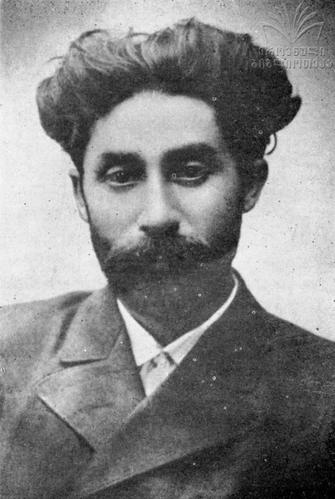
According to one Russian article, the Georgian version of "Варшавянка" was first written in 1901 by a Georgian communist, Irodion Evdošvili (იროდიონ ევდოშვილი, 1873-1916). He began his career as a poet in 1895, when his poems were published in a newspaper "Iveria" under the editorship of Ilia Č’avč’avadze. From then until 1899, he worked in a factory in Baku, where he joined a social-democratic circle formed by the workers, and became committed to leftist ideology. From 1900, he began contributing his works to Kval, the newspaper of the leftist party Mesame Dasi (The Third Party). At the same time, Evdošvili met Lado Ketskhoveli (ლადო კეცხოველი), the father of Marxism in Georgia, and Joseph Stalin. These encounters led him to become a proletarian writer, and from then on he devoted himself to popularizing famous revolutionary songs such as "La Marseillaise". However, his works never saw the light of day, and it was only a few weeks before his death that a collection of his lyrics was published. His writing style was full of political sharpness around 1900, but from 1908 onward, his last years' style were marked by sadness and fatigue. We are glad to dig up this lyrics, which were born silently in Caucasus, more than 100 years after his death.
Secondo un articolo russo, la versione georgiana della "Варшавянка" fu scritta per la prima volta nel 1901 da un comunista georgiano, Irodion Evdošvili (იროდიონ ევდოშვილი, 1873-1916). Iniziò la sua carriera di poeta nel 1895, quando le sue poesie furono pubblicate sul giornale "Iveria" sotto la direzione di Ilia Č’avč’avadze. Da allora fino al 1899 lavorò in una fabbrica a Baku, dove si unì al circolo socialdemocratico formato dagli operai e si impegnò nell'ideologia di sinistra. Dal 1900 iniziò a contribuire con i suoi lavori a Kval, il giornale del partito di sinistra Mesame Dasi ("Il Terzo Partito"). Allo stesso tempo, Evdošvili incontrò Lado Ketskhoveli (ლადო კეცხოველი), il padre del marxismo in Georgia, e Joseph Stalin. Questi incontri lo portarono a diventare uno scrittore proletario, e da allora si dedicò alla divulgazione di famose canzoni rivoluzionarie come la Marsigliese. Tuttavia, le sue opere non videro mai la luce e solo poche settimane prima della sua morte fu pubblicata una raccolta dei suoi testi. Il suo stile di scrittura era pieno di acutezza politica intorno al 1900, ma dal 1908 in poi lo stile dei suoi ultimi anni fu segnato da tristezza e stanchezza. Siamo lieti di riesumare questi testi, nati silenziosamente nel Caucaso, più di 100 anni dopo la sua morte.
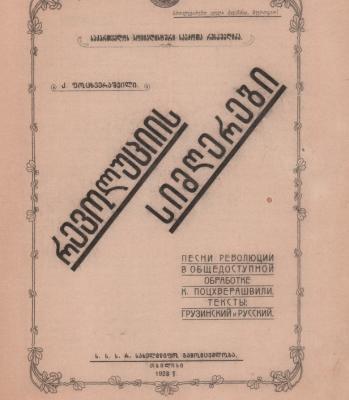
Fonte del canzoniere / Songbook source: რევოლუციის სიმღერები [Revolucis Simgerebi]
Autore / Author: Konstantin Pokhverašvili (კონსტანტინე ფოცხვერაშვილი)
Anno di pubblicazione / Year of Publishing: 1923, Tbilisi (თბილისი 1923 წ.)
Anno di scrittura / Written in: 1901
Casa editrice / Publishing House: Casa editrice statale dell'URSS /
USSR State Publishing House (ს.ს.ს.რ.-სახელმწიფო გამომცემლობა)
Paroliere / Lyricist: Irodion Evdošvili (იროდიონ ევდოშვილი / Иродион Евдошвили)
Compositore / Compositor: Józef Pławiński (იოზეფ პლავინსკი)
1.
მრისხანე გრიგალი თავს დაგვტრიალებს,
ბნელეთის ძალები გვიხუთავს სულს.
ბედითსა ბრძოლაში შევებით მტერსა
და ხვედრი უცნობი მოგველის ჩვენ.
მაგრამ აღვმართავთ მედგარი გულით
მუშათა საქმისთვის ბრძოლისა დროშას.
ყოველი ერისთვის გავკაფავთ გზა-კვალს,
აღთქმული ქვეყნისკენ წინ წარსავალად.
მშრომელო ხალხო — ვინ დაგვძლევს, ვინა?
მაშ ბრძოლის ველზე გავსწიოთ წინა,
მშრომელო ხალხო — ვინ დაგვძლევს, ვინა?
2.
შიმშილით სულსა ლევს დღეს შრომის შვილი,
ნუ თუ კვლავ ვითმინოთ ძმებო ეს ბედი?
არწივის თვალებით რაზმები ჩვენი
ამაყად შეხედავს ეშაფოტს საზარს.
ამ ბრძოლის ალში ცუდად არ ჰქრება,
მიზნისთვის გმირულად ვინც დაეცემა,
იმათი სახელი მოსილი ძლევით
მომავალ თაობას გარდაეცემა!
მშრომელო ხალხო — ვინ დაგვძლევს, ვინა?
მაშ ბრძოლის ველზე გავსწიოთ წინა,
მშრომელო ხალხო — ვინ დაგვძლევს, ვინა?
3.
მტარვალთა გვირგვინებს ვუცქერით ზიზღით,
ჩაგრული ხალხისას პატივს ვცემთ ხუნდებს,
მეფის ტახტს შეღებილს ხალხისა სისხლით
ჩვენ მტრების სისხლისას გავატანთ ტალღებს.
ვიძიოთ შური ყველა ჩვენს მტრებზე,
და ყველა მტარვალებს თავზარი დავსცეთ,
ახლოა სანატრი ძლევისა ჟამი,
ახლოა მშრომელთა ბრწყინვალე დღე!
მშრომელო ხალხო — ვინ დაგვძლევს, ვინა?
მაშ ბრძოლის ველზე გავსწიოთ წინა,
მშრომელო ხალხო — ვინ დაგვძლევს, ვინა?
1.
Mriskhane grigali tavs dagvt’rialebs,
bneletis dzalebi gvikhutavs suls.
Beditsa brdzolashi shevebit mt’ersa
da khvedri utsnobi mogvelis chven.
Magram aghvmartavt medgari gulit
shushata sakmistvis brdzolisa droshas.
Q’oveli eristvis gavk’apavt gza-k’vals,
aghtkmuli kveq’nisk’en ts’in ts’arsavalad.
Mash brdzolis velze gavsts’iot ts’ina,
mshromelo khalkho vin dagvdzlevs, vina?
Mash brdzolis velze gavsts’iot ts’ina,
mshromelo khalkho vin dagvdzlevs, vina?
2.
Shimshilit sulsa levs dghes shromis shvili,
nu tu k’vlav vitminot dzmebo es bedi?
Arts’ivis tvalebit razmebi chveni
amaq’ad shekhedavs eshapot’s sazars.
Am brdzolis alshi tsudad ar hkreba,
miznistvis gmirulad vints daetsema,
imati sakhelit mosili dzlevit
momaval taobas gardaetsema!
Mash brdzolis velze gavsts’iot ts’ina,
mshromelo khalkho vin dagvdzlevs, vina?
Mash brdzolis velze gavsts’iot ts’ina,
mshromelo khalkho vin dagvdzlevs, vina?
3.
Mt’arvalta gvirgvinebs vutskerit zizghit,
chagruli khalkhisas p’at’ivs vtsemt khundebs,
mepis t’akht’s sheghebils khalkhisa siskhlit
chven mt’rebis siskhlisas gavat’ant t’alghebs.
Vidziot shuri q’vela chvens mt’rebze,
da q’vela mt’arvalebs tavzari davstset,
akhloa sanat’ri dzlevisa zhami,
akhloa mshromelta brts’q’invale dghe!
Mash brdzolis velze gavsts’iot ts’ina,
mshromelo khalkho vin dagvdzlevs, vina?
Mash brdzolis velze gavsts’iot ts’ina,
mshromelo khalkho vin dagvdzlevs, vina?
Contributed by Boreč - 2021/11/4 - 07:15
1φ. Yakut (Sakha) version by A. F. Boyarov
Info about Yakut: Yakut language, also known as Yakutian, Sakha, Saqa or Saxa (Yakut: саха тыла), is a Turkic language with around 450,000 native speakers spoken in Sakha (Yakutia), a federal republic in the Russian Federation, by the Yakuts. The Yakut language differs from all other Turkic languages in the presence of a layer of vocabulary of unclear origin (possibly Paleo-Siberian). There are also a large number of words of Mongolian origin related to ancient borrowings, as well as numerous recent borrowings from Russian. Like other Turkic languages and their ancestor Proto-Turkic, Yakut is an agglutinative language and employs vowel harmony.
I found a very rare language Warszawianka...assume it was probably translated during the Russian Revolution.
There maybe many more warszawianka in Russia… [Boreč]
Fonte / Source
The source is a translation by А.Ф.Бояров [A. F. Boyarov] used in Yakutian language classes held in Russian schools:
Presentation of an integrated lesson on the native (Yakut) literature on Comparative and Comparative Analysis of the Song "Varshavianka" by G.M. Krzhizhanovsky and Translation by A.F. Boyarov (9-11 grades). [Boreč]
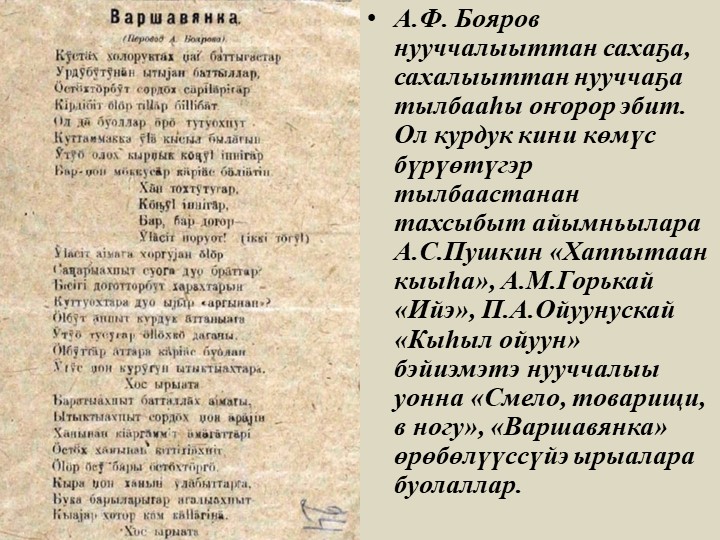
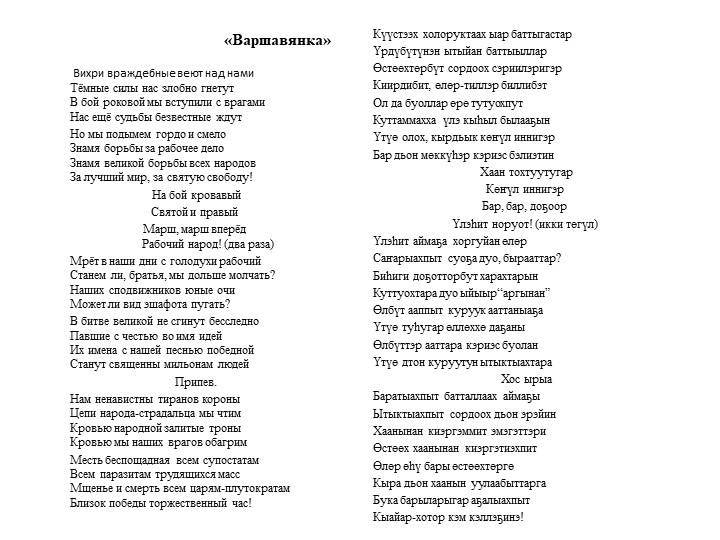
1.
Күүстээх холоруктаах ыар баттыгастар
Үрдүбүтүнэн ытыйан баттыыллар
Өстөөхтөрбүт сордоох сэриилэригэр
Киирдибит, өлөр-тиллэр биллибэт.
Ол да буоллар өрө тутуохпут
Куттаммахха үлэ кыһыл былааҕын
Үтүө олох, кырдьык көҥүл иннигэр
Бар дьон мөккүһэр кэриэс бэлиэти.
Бар, бар, доҕоор Үлэһит норуот!
Хаан тохтуутугар, көҥүл иннигэр,
Бар, бар, доҕоор Үлэһит норуот!
2.
Үлэһит аймаҕа хоргуйан өлөр
Саҥарыахпыт суоҕа дуо, бырааттар?
Биһиги доҕотторбут харахтарын
Куттуохтара дуо ыйыыр “аргынан”.
Өлбүт ааппыт куруук ааттаныаҕа
Үтүө туһугар өллөххө даҕаны
Өлбүттэр ааттара кэриэс буолан
Үтүө дьон куруутун ытыктыахтар.
Бар, бар, доҕоор Үлэһит норуот!
Хаан тохтуутугар, көҥүл иннигэр,
Бар, бар, доҕоор Үлэһит норуот!
3.
Баратыахпыт батталлаах аймаҕы
Ытыктыахпыт сордоох дьон эрэйин
Хаанынан киэргэммит эмэгэттэри
Өстөөх хаанынан киэргэтиэхпит.
Өлөр өһү бары өстөөхтөргө
Кыра дьон хаанын уулаабыттарга
Бука барыларыгар аҕалыахпыт
Кыайар-хотор кэм кэллэҕинэ.
Бар, бар, доҕоор Үлэһит норуот!
Хаан тохтуутугар, көҥүл иннигэр,
Бар, бар, доҕоор Үлэһит норуот!
Turkish-based transcription
1.
Küüsteeq qoloruktaaq ıar battıgastar
Ürdübütünen ıtıyan battııllar
Östööhtörbüt sordooq seriileriger
Kiirdibit, ölör-tiller billibet.
Ol da buollar örö tutuoqput
Kuttammaqqa üle kıhıl bılaağın
Ütüo oloq, kırçık köŋül inniger
Bar çon mökküher keries belieti.
Qaan toqtuutugar, köŋül inniger,
Bar, bar, doğoor Ülehit noruot!
Qaan toqtuutugar, köŋül inniger,
Bar, bar, doğoor Ülehit noruot!
2.
Ülehit aymağa qorguyan ölör
Saŋarıaqpıt suoŋa duo, bıraattar?
Bihigi doŋottorbut qaraqtarın
Kuttuoqtara duo ıyıır “argınan”.
Ölbüt aappıt kuruuk aattanıağa
Ütüo tuhugar öllöqqö daŋanı
Ölbütter aattara keries buolan
Ütüo çon kuruutun ıtıktıaqtar.
Qaan toqtuutugar, köŋül inniger,
Bar, bar, doğoor Ülehit noruot!
Qaan toqtuutugar, köŋül inniger,
Bar, bar, doğoor Ülehit noruot!
3.
Baratıaqpıt battallaaq aymağı
Itıktıaqpıt sordooq çon ereyin
Qaanınan kiergemmit emegetteri
Östööq qaanınan kiergetieqpit.
Ölör öhü barı östööqtörgö
Kıra çon qaanın uulaabıttarga
Buka barılarıgar aŋalıaqpıt
Kıayar-qotor kem kelleŋine.
Qaan toqtuutugar, köŋül inniger,
Bar, bar, doğoor Ülehit noruot!
Qaan toqtuutugar, köŋül inniger,
Bar, bar, doğoor Ülehit noruot!
Contributed by Boreč - 2022/5/19 - 10:29
1χ. Kashubian version (Mislaus Lasota, Lyricstranslate)
1.
Hej, fana w górã! a bez ùrzasu,
Chòcle nam wëje bùrza, a do te
Człordô pò naju sëła złich czasów,
Chòcle nicht nie znô swòji przińdotë -
Hewò stanica całégò lëdztwa,
Hewò merk nowi dlô najich sënów!
Merk robòtników bëlnégò miectwa -
Ze wszëtczich lëdzi zrobi bracynów.
Na biôtkã, drawò!
Swiãto, a prawò -
Pój, pój, Warszawò!
Pój w przódk, Warszawò!
Na biôtkã, drawò!
Swiãto, a prawò -
Pój, pój, Warszawò!
2.
Z césôrzów scygnąc ju cząd kòrunë,
Ga lëd mô cérniã kòrunowané -
Krëwją zaleją tronë tabùnë
W krëwi lëdowi spùrpùrowiałé,
Halaże! Pòmsta szandaróm, katóm
Jaczi susają z milionów żëca!
Pòmsta césôrzóm i plutokratóm!
Na bãks przińdotë rôczbã ùzdrzëta!
Na biôtkã, drawò!
Swiãto, a prawò -
Pój, pój, Warszawò!
Pój w przódk, Warszawò!
Na biôtkã, drawò!
Swiãto, a prawò -
Pój, pój, Warszawò!
3.
Hej, fana w górã! a bez ùrzasu,
Chòcle nam wëje bùrza, a do te
Człordô pò naju sëła złich czasów,
Chòcle nicht nie znô swòji przińdotë -
Hewò stanica całégò lëdztwa,
Hewò merk nowi dlô najich sënów!
Merk robòtników bëlnégò miectwa -
Ze wszëtczich lëdzi zrobi bracynów.
Na biôtkã, drawò!
Swiãto, a prawò -
Pój, pój, Warszawò!
Pój w przódk, Warszawò!
Na biôtkã, drawò!
Swiãto, a prawò -
Pój, pój, Warszawò!
Contributed by Boreč - 2022/6/2 - 19:06
1ψ. Azerbaijani version by Morrigan De Ferelden
"This is a revised version of the previously contributed Azerbaijani text. I described before that the lyricist was unknown, but the lyricist was Morrigan de Ferelden, who was my comrade." [Boreč]
1.
Düşmən buludlar əsir üstümüzdə,
Qaranlıq qüvvələr hücum edir,
Ağrıdan məhrum bu müharibədə
Naməlum talelər gözləyir bizi.
Amma zəfərlə qaldıracağıq
Azad işçinin bayrağını,
Bütün xalqların qızıl bayrağını
Sonsuz, azad bir dünya üçün!
Marş, marş irəli, proletariat!
Hazır olun, müharibəyə
Marş, marş irəli, proletariat!
2.
Yoldaşlarımız acından ölür,
Qardaşlar, daha susacağıqmı?
İntiqamla dolu gözlərini
Dar ağacı qorxuya bilərmi?
Hər zaman qəlbimizdə yaşayırlar
Prinsipimiz üçün canını verənlər,
Adları zəfər mahnılarımızla
Müqəddəs olacaq milyonlar üçün!
Marş, marş irəli, proletariat!
Hazır olun, müharibəyə
Marş, marş irəli, proletariat!
3.
Nifrət edirik tiranın adından,
İşçinin bütün buxovlarından,
İşçi qanıyla örtülən taxtlardan
Kapitalin qulu baronlardan!
Amma yolun sonu gəldi indi,
Tüm parazitlərin kapitalinin,
Ölüm yaxındır tüm plutokratlara
Artıq qaçmağa yer qalmadı!
Marş, marş irəli, proletariat!
Hazır olun, müharibəyə
Marş, marş irəli, proletariat!
Il testo in alfabeto Cirillico:
Дүшмән булудлар әсир үстүмүздә,
Гаранлыг гүввәләр һүҹум едир,
Ағрыдан мәһрум бу мүһарибәдә
Намәлум талеләр ҝөзләјир бизи.
Амма зәфәрлә галдыраҹағыг
Азад ишчинин бајрағыны,
Бүтүн халгларын гызыл бајрағыны
Сонсуз, азад бир дүнја үчүн!
Һазыр олун, мүһарибәјә
Марш, марш ирәли, пролетариат!
Һазыр олун, мүһарибәјә
Марш, марш ирәли, пролетариат!
2.
Јолдашларымыз аҹындан өлүр,
Гардашлар, даһа сусаҹағыгмы?
Интигамла долу ҝөзләрини
Дар ағаҹы горхуја биләрми?
Һәр заман гәлбимиздә јашајырлар
Принсипимиз үчүн ҹаныны верәнләр,
Адлары зәфәр маһныларымызла
Мүгәддәс олаҹаг милјонлар үчүн!
Һазыр олун, мүһарибәјә
Марш, марш ирәли, пролетариат!
Һазыр олун, мүһарибәјә
Марш, марш ирәли, пролетариат!
3.
Нифрәт едирик тиранын адындан,
Ишчинин бүтүн буховларындан,
Ишчи ганыјла өртүлән тахтлардан
Капиталин гулу баронлардан!
Амма јолун сону ҝәлди инди,
Түм паразитләрин капиталинин,
Өлүм јахындыр түм плутократлара
Артыг гачмаға јер галмады!
Һазыр олун, мүһарибәјә
Марш, марш ирәли, пролетариат!
Һазыр олун, мүһарибәјә
Марш, марш ирәли, пролетариат!
Contributed by Boreč - 2022/7/8 - 10:37
1ψ1. Azerbaijani version by Nariman Narimanov, Mashadi Azizbayov e Mirza Abdulgadir Vusaghi Ismayilzade
"One of the songs in the Azerbaijani opera "Sevil" is the famous revolutionary song "Warszawianka". The text has been translated into Azerbaijani twice in recorded history, with the poets Nariman Narimanov, Mashadi Azizbayov and Mirza Abdulgadir Vusaghi Ismayilzade completing the Azerbaijani translation. I have been searching through various information resources to find the complete text of this, but unfortunately I could not find the lyrics. I would like to share it here on Antiwarsong.org as a valuable source of information." [Boreč]
Original: Warszawianka 1905 roku
Japanese title: ワルシャワ労働歌
Country: Azerbaijan
Language: Azerbaijani
Composer:Józef Pławiński (Юзеф Плавински)
Lyricist: Nariman Narimanov (Nəriman Nərimanov), Mashadi Azizbayov (Məşədi Əzizbəyov), Mirza Abdulgadir Vusaghi Ismayilzade (Mirzə Əbdülqadir Vüsaği İsmayılzadə)
Choir&Ensemble: Azerbaijan State Academic Opera and Ballet Theater (Axundov adına Azərbaycan Dövlət Akademik Opera və Balet Teatrı)
Year written: 1908
Year recorded: 1970
Record source: Azerbaijani opera "Sevil"
Categories:
Polish folk song
Azerbaijani revolutionary song
Contributed by Boreč - 2022/9/19 - 03:27
1ω. The Warszawianka in Toki Pona by "Kokoa"
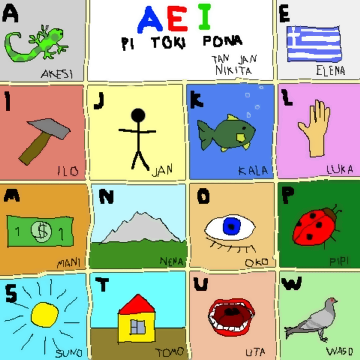
Toki Pona pronunciation guide.
Il Toki Pona è una lingua artificiale creata nel 2001 dalla traduttrice, linguista e esperantista Sonja Lang (per ulteriori notizie si rimanda anche alle due versioni dell'Internazionale in Toki Pona presenti nel sito, risp. qui e qui). La versione in Toki Pona della Warszawianka è stata adattata nel 2021 dal discente di Toki Pona giapponese “Kokoa”, basandosi sul testo giapponese.
Toki Pona (“the language of good” or “simple talk”) is a constructed language created in 2001 by the Canadian translator, linguist and Esperantist Sonja Lang (for further information, see the two versions of the Internationale in Toki Pona included in this site, viz. here and here). The Toki Pona version of the Warszawianka was adapted by the Japanese Toki Pona language learner “Kokoa”, based on the Japanese text.

kon sewi utala li pimeja e suno
kon mute utala li nasa mute,
jan pona mi mute li kama ala lili,
o moli e linja lete utala.
seli linja musi li lon walo mute
li lukin sewi li seli mute.
lipu utala pona li sitelen
tawa utala pali pi tenpo ni.
o kama, jan pona, o tawa tan noka,
telo loje pona li pini e ni.
ma mi mute li lon sewi tomo kiwen,
o pali kiwen e pilin pona.
Contributed by Boreč - 2022/9/19 - 03:13
1א. Varšavljanka 1905 Slovenian version by Mile Klopčič (1943)
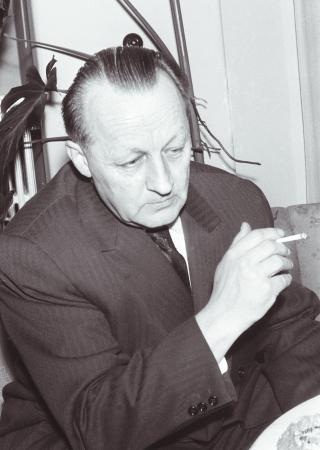
Il testo della versione slovena fu scritto nel 1943 dal poeta sloveno Mile Klopčič. Attivo come comunista dopo l'adesione al Partito comunista jugoslavo nel 1920, partecipò al movimento partigiano jugoslavo durante la Seconda guerra mondiale e fu nominato presidente del Comitato culturale del Consiglio di liberazione sloveno (SNOS); dopo la guerra trascorse tutta la sua vita come traduttore e poeta. La versione slovena della "Warszawianka" è stata scritta durante la guerra come uno dei canti della lotta partigiana, motivo per cui la traduzione di questo testo è leggermente diversa rispetto alle traduzioni in altre lingue. Oltre alla fonte sonora utilizzata in questo video, esiste anche una versione su LP in vinile intitolata Zemlja in Narodi ("Terra e Popoli"), cantata dal "Tržaški Partizanski Pevski Zbor" (Corale Partigiana Triestina).
Vihre sovražne pode se nad nami,
sonce zakriva nam temen oblak.
Vedno nas čakajo težki razgledi,
vendar kljub temu pojenja sovrag.
Prapor svobode, resnice nad nami
kaže nam pot in krepi nam korak.
Prapor resnice in osvoboditve,
ki nas pripelje po poti do zmag.
V borbo krvavo, sveto in pravo,
da priborimo svobodno si pot.
Na barikade, na barikade
v boj za svobodo ti delavski rod.
Slavno in zlato smo vojno končali,
osvobojen je zdaj delavski rod.
Mnogo smo žrtev za svobodo dali,
da je nas narod tej smrti otet.
Ce bi spet vihre sovražne grozile,
če kdo svobodo bi rad nam otel,
kakor nekoč bi orožje zgrabili,
pojdi zdaj z vetrom nas slavni napev.
V borbo krvavo, sveto in pravo,
da priborimo svobodno si pot.
Na barikade, na barikade
v boj za svobodo ti delavski rod.
Contributed by Riccardo Venturi - 2022/10/26 - 01:35
1ב. Afrikaans version by Boreč through the help of the so-called “Artificial Intelligence” or AI (Chat GPT)

The following Afrikaans lyrics is my experimental translation of the well-known German Warschawjanka that circulated around 1920, using AI technology such as ChatGPT. Unfortunately, I am not proficient in Afrikaans, so can't point out any word omissions or grammatical correctness with any clarity. I contribute it here in case anyone is interested in adapting the song in Afrikaans.
Il seguente testo in afrikaans è la mia traduzione sperimentale della nota Warschawjanka tedesca che circolava intorno al 1920, utilizzando la tecnologia AI come ChatGPT. Sfortunatamente, non sono esperto in afrikaans, quindi non posso indicare alcuna omissione di parole o correttezza grammaticale con chiarezza. Contribuisco qui nel caso qualcuno sia interessato ad adattare la canzone in afrikaans.
Die volgende Afrikaanse lirieke is my eksperimentele vertaling van die bekende Duitse Warschawjanka wat omstreeks 1920 gesirkuleer het, met behulp van KI-tegnologie soos ChatGPT. Ek is ongelukkig nie Afrikaans magtig nie, so kan geen woordweglatings of grammatikale korrektheid met enige duidelikheid uitwys nie. Ek dra dit hier by vir ingeval iemand sou belangstel om die liedjie in Afrikaans te verwerk.
1.
Vyandige stormwind toornig en sterk,
Dreigende wolke verduister die lig.
Mag pyn en dood ons ook wag,
Die plig roep ons teen die vyande uit.
Ons het die vlam van vryheid ontsteek,
Hoog oor ons koppe laat dit helder brand:
Die vaandel van oorwinning, en redding,
Dit lei ons seker in die laaste stryd.
Op, op nou na die bloedige, heilige geveg,
Oorwin die vyande, jy werkersvolk.
Op die barrikades, op die barrikades,
Storm die wêreld binne, jy werkersvolk!
2.
Dood en wraak vir alle tiranne,
Ons daad is vir die lydende volk bedoel,
Keer die moordende wapens teen trone,
Eendag geniet ons magtige wraak!
Die aarde is met volksbloed bemesting,
Gee jou bloed vir die laaste oorlog,
Kan kom dat vir die mensdom verlossing!
Feestelik nader die heilige oorwinning.
Op, op nou na die bloedige, heilige geveg,
Oorwin die vyande, jy werkersvolk.
Op die barrikades, op die barrikades,
Storm die wêreld binne, jy werkersvolk!
3.
Ellende en honger bederf ons almal,
Broers, sal swyg in die smart en die wee?
Veg vir vryheid, geluk van die mensdom,
Kan jong siele bang wees die guillotine, nee!
O, martelare dood vir ons idee,
Miljoene sang maak hulle geheilig,
Op dan, broers, kamerade getroue,
Gryp die wapen, saam staan ons nou!
Op, op nou na die bloedige, heilige geveg,
Oorwin die vyande, jy werkersvolk.
Op die barrikades, op die barrikades,
Storm die wêreld binne, jy werkersvolk!
Contributed by Boreč - 2023/5/25 - 14:42
1ג. Վարշավեանկա: Hakob Hakobyan's Armenian version [1902]
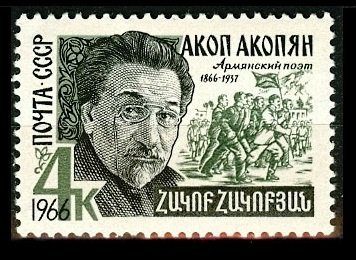
After a long journey I was finally able to reveal the entire Armenian version of Варшавянка (Վարշավեանկա). This Armenian chant is now revived here after 100 years. The Armenian lyrics were written in 1902 by Hakob Hakobyan (Հակոբ Հակոբյան), the father of the Armenian proletarian literature. He wrote a number of anti-Tsarist lyrics at the same time, including revolutionary songs such as "La Marseillaise" and "L'Internationale".
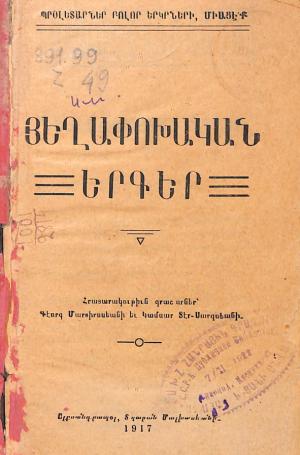
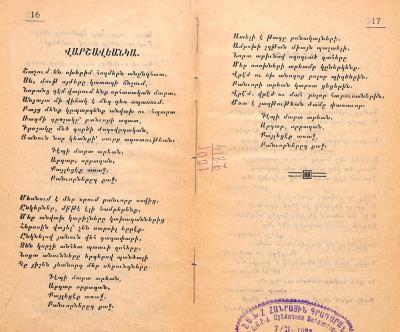
Hakob Hakobyan was born in Gandzak in 1866, in the family of a craftsman. He studied for a year in the village with a woman named Tsovi Aghi and then entered a parish school. Hakobyan's father wanted to make the boy a priest or a craftsman, but his mother managed to send his son to a gymnasium. Since the Armenian language and literature were forbidden in the gymnasium, Hakobyan and some literate students organized gatherings outside the class, during which they read Armenian and discussed literature.
Hakobyan participated in secret student gatherings and wrote poems since the 6th grade of gymnasium. His poem "The Crow of the North", which he posted on the church wall, caused him to be expelled from high school. Dropping out of gymnasium, Hakobyan goes to Tiflis, enters a pharmacy as a student. The years of life full of deprivation, bitterness and wandering begin. After leaving the pharmacy, Hakobyan goes to Baku this time, works as a blacksmith in the oil fields, after that he takes the position of a mechanical register, cashier in a mechanical factory in Sev city, then he does accounting in the Eisenschmidt factory. In 1894, returning to Tiflis, Hakobyan held accounting positions in several institutions until the establishment of the Soviet order in 1921. Died in Tiflis, 1935.
Hakob Hakobyan nacque a Gandzak nel 1866 da padre artigiano. Studiò per un anno nel villaggio natio con una donna di nome Tsovi Aghi, poi entrò in una scuola parrocchiale. Il padre di Hakobyan voleva fare del ragazzo un prete o un artigiano, ma sua madre riuscì a mandare suo figlio al ginnasio. Poiché la lingua e la letteratura armena erano proibite al ginnasio, Hakobyan e alcuni studenti alfabetizzati organizzarono incontri extrascolastici, durante i quali leggevano in armeno e discutevano di letteratura.
Hakobyan prese parte a riunioni studentesche segrete e scrisse poesie sin dal sesto anno di ginnasio. La sua poesia "Il corvo del nord", che affisse sul muro della chiesa, lo fece espellere dal liceo. Abbandonato il ginnasio, Hakobyan
andò a Tbilisi ed entrò in una farmacia come apprendista. Iniziarono anni pieni di privazioni, amarezze e vagabondaggi. Dopo aver lasciato la farmacia, Hakobyan si recò stavolta a Baku, lavorando come fabbro in giacimenti petroliferi, dopodiché assunse il posto di registratore meccanico e cassiere in una fabbrica meccanica nella città di Sev, e poi di contabile nella fabbrica Eisenschmidt. Nel 1894, tornato a Tbilisi, Hakobyan ricoprì incarichi contabili in diverse istituzioni fino all'istituzione dell'ordine sovietico nel 1921. Morì a Tbilisi nel 1935.
ՀԱԿՈԲՅԱՆ Հակոբ Մնացականի [17(29). 5.1866, Գանձակ (այժմ՝ Կիրովաբադ)– 13.11.1937, Թիֆլիս], հայ սովետական բանաստեղծ, հայ պրոլետարական պոեզիայի հիմնադիրը, հեղափոխական գործիչ: Հայաստանի և Վրաստանի ժողովրդական բանաստեղծ (1923): Կոմկուսի անդամ 1904-ից: Սովորել է ծննդավայրի հայոց ծխական դպրոցում, ապա՝ ռուս, գիմնազիայում: V դասարանից թողել է ուսումը, 1886-ին փոխադրվել Թիֆլիս, աշխատել դեղատանը որպես աշակերտ: 1887-ին տեղավւոխվել է Բաքու: Եղել է սևագործ բանվոր նավթահանքերում, հաշվետար, հաշվապահ՝ գործարաններում: 1893-ից մշտական բնակություն է հաստատել Թիֆլիսում, որտեղ մինչև 1921-ը աշխատել է որպես հաշվապահ: Դեռևս գիմնազիայում մասնակցել է աշակերտական գաղտնի խմբակի պարապմունքներին, 1885-ին հայկ. դպրոցները փակելու առիթով գրել ու տարածել է հակացարական չափածո թռուցիկ: Բաքվում և Թիֆլիսում կապվել է առաջավոր մտավորականության և հեղափոխական բանվորության հետ: Ռուս. առաջին հեղափոխության շրջանում և այնուհետև գործել է Ս. Շահումյանի, Ս. Ապանդարյանի, Մ. Ցխակայայի, Ա. Օրջոնիկիձեի, Կամոյի և մյուս անվանի հեղափոխականների կողքին: 1902-ին թարգմանել է «Մարսելյոզ», «Ինտերնացիոնալ», «Վարշավյանկա», «Թաղման քայլերդ», «Անվախ ընկեր, քայլենք շար–շար» և այլ հեղափոխական երգեր, որոնք տպագրվել ու տարածվել են իբրև թռուցիկներ: 1903-ից հեղափոխական–կազմակերպական աշխատանք է տարել երկաթուղային, տպարանական, կաշեգործ բանվորության շրջանում [Ելիզավետպոլ, Բորժոմ, Ջալալօղլի (այժմ՝ Ստեփանավան), հրապարակախոսական–քաղաքական հոդվածներով հանդես եկել լեգալ և անլեգալ մամուլում (երբեմն Պրոլետար, Դեմոկրատ, Տրիբուն, Ալ–Կաս, Աշուղ–Բլբուլյան ծածկանուններով): Եղել է բոլշևիկյան մի շարք պարբերականների («Բանվորի կռիվը», «Կայծ», «Պայքար» ևն) խմբագրության կազմում: 1911-ին կուսակցության հանձնարարությամբ մեկնել է Ժնև, Բեռլին, Փարիզ, տեսակցել Մ. Ցխակայայի, Կ. Լիբկնեխտի, Ա. Լունաչարսկու հետ: 1914-ին խմբագրել ու հրատարակել է հայ պրոլետարական գրականության առաջին ալմանախները («Կարմիր մեխակներ», «Բանվորի ալբոմ»): 1921-ին Վրաստանում սովետական կարգեր հաստատվելիս ընտրվել է Թիֆլիսի Հեղկոմի անդամ և քաղաքի բոլոր բանկերի կոմիսար: 1922-ին հիմնադրել ու ղեկավարել է Վրաստանի հայ պրոլետարական գրողների ասոցիացիան, խմբագրել ու հրատարակել է նրա գրական օրգան «Դարբնոց» ամսագիրը: 1925-ին նշանակվել է Հեղափոխական գրականության կապերի միջազգային բյուրոյի ներկայացուցիչ Անդրկովկասում: Մշտապես եղել է գրական կազմակերպությունների ղեկավար կազմում, ընտրվել Անդրկենտգործկոմի (1931, 1935) և ՍՍՀՄ գրողների միության վարչության (1934) անդամ: Հ–ի առաջին բանաստեղծությունը՝ «Ուխտ բարեկամության», տպագրվել է 1893-ին, «Մուրճ» հանդեսում: Անդրանիկ ժողովածուն («Բանաստեղծություններ») լույս է տեսել 1899-ին, Թիֆլիսում: Սկզբում երգել է ավանդական մոտիվներ՝ սեր, հայրենիք, բնություն, աշխատանք: Այդ շարքի երգերից լայն ճանաչում է գտել «Նամուս ու ղեյրաթ»-ը (1895), որը տպագրվել է հայ պոեզիայի հատընտիր էջերում ու դպրոցական դասագրքերում: Հաջորդ ժողովածուները [«Աշխատանքի երգեր», 1906, «Հեղափոխական երգեր», 1907 (անլեգալ, Պրոլետար ծածկանունով), «Բանաստեղծություններ», 1912] հրատարակելիս Հ. արդեն ընթանում էր սոցիալիստական ռեալիզմի հիմնադիր Մ. Գորկու հետ նույն ճանապարհով, հայ հեղափոխական բանվորների «ցավերի և ուրախությունների արտահայտիչն էր, նրանց աշխատանքի և կռվի երգիչը» (Շահումյան Ս., Երկ., հ. 2, 1957, էջ 347): Հ–ի պրոլետարական պոեզիան հատկանշվում է քաղաքացիական բարձր պաթոսով, գաղափարական նպատակասլացությամբ, հեղափոխական լավատեսությամբ («Ամբոխի կոչը», 1902, «Կաթսավարը», 1904, «Դարբնի երգը», 1905, «Իմ աշխարհը», 1905, «Մե՛կ էլ, մե՛կ էլ», 1905, «Հեղափոխություն», 1905, «Մեռան չկորան», 1906): Նմանօրինակ արժեքներ են ստոլիպինյան ռեակցիայի ու հետագա տարիներին գրված բանաստեղծությունները («Ես այն եմ սիրում», 1909, «Աշխատանքի երգը», 1910, «Մաքառման ժամին», 1911, «Պահակը», 1913, «Ազգայիններին», 1916) և պոեմները («Նոր առավոտ», 1909, «Կարմիր ալիքներ», 1911, «Հավասարություն», 1916–17): Հ–ի մինչհոկտեմբերյան պոեզիան XX դ. գրական երևույթներից է, պատմականորեն օրինաչափ այն անհրաժեշտ օղակը, որը եկավ միացնելու հայ դասական և սովետական գրականությունները: Հ. նաև հայ սովետական գրականության սկզբնավորողներից է: Նա հիմք դրեց հայ բանաստեղծական լենինապատումին, նորաբնույթ ներբողի ժանրին («Վ. Ի. Լենինին», 1919, «Ստեփան Շահումյանին», 1920, «Լենինը անմահ», 1924, «Գևորգ Աթարբեկյանին», 1925): Առաջիններից էր, որ երգեց սովետական միասնական հայրենիքը («Ավետյաց երկրին», 1921, «Զարթոնք», 1925, «Կարմիր հայրենիքիս մելոդիաներից» շարքը): Հ–ի «Աստվածները խոսեցին» (1922), «Բոլշևիկ է Շիր-Կանալը» (1924), «Վոլխովստրոյ» (1935), «Լենինգրադյան պոեմ» (1928–1932) և մյուս պոեմները աշխատանքի, սոցիալիստական շինարարության, սովետական մարդու արարչագործության հիմներ են: Նրա գրչին են պատկանում նաև պատմվածքներ, ակնարկներ, հուշագրություններ («Ագիտատորի բլոկնոտից», գիրք, 1928 ևն), հրապարակախոսական ու գրաքննադատական հոդվածներ: Նրա երկերը բազմիցս հրատարակվել են ԱՍՀՄ և աշխարհի շատ լեզուներով: Երկ․Երկ. ժող., հ. 1–4, Ե., 1955–58: Գրկ. Շահ ում յան Ս., Երկ–» հ. 2, Ե., 1957: Սպանդար յան Ս., Երկ., հ. 2, Ե., 1959; Ասատրյան Ա., Հակոբ Հակոբյան, Ե., 1955: Գյուլնազարյ ա ն Ւ*., Մանուկյան Ս., Հակոբ Հակոբյանի կյանքի և գործունեության տարեգրությունը, Ե., 1965: Սարգսյան Գ., Հակոբ Հակոբյանի կյանքը, Ե., 1966: Հակոբ Հակոբյան: Մատենագիտություն, Ե., 1967: Մանուկյան Ս., Հակոբ Հակոբյան, Ե., 1975:
Ս. Մանուկյան
1.
Շաչում են ոխերիմ հողմերն անընդհատ,
Սև, մութ ոյժերը կատաղի ճնշում,
Նորանց դէմ վարում ենք օրհասական մարտ,
Անյայտ մի վիճակ է մեզ դեռ սպասում.
Բայց մենք կըպարզենք անվախ ու հպարտ
Ռազմի դրօշակը՝ բանւորի ազատ,
Դրօշակը մեծ գործի ժողովրդական,
Յ անուն նոր կեանքի՝ սուրբ ազստութեան:
Դէպի մարտ արեան, արդար, սրբազան,
Քայլեցէք առաջ, բանւորներըդ քաջ:
Դէպի մարտ արեան, արդար, սրբազան,
Քայլեցէք առաջ, բանւորներըդ քաջ:
2.
Մեռնում է մեր օրում բանւորը սովից,
Ընկերներ, միթէ էլի համբերենք,
Մեր անվախ կտրիչները կախաղաններից
Հերոսին վայել՝ չեն սարսիլ երբէք.
Ընկնելով յանուն վեհ գաղափարի,
Չեն կորչի անհետ պատւի զոհերը,
Նոցա անունները երգերով պանծալի
Կը յիշեն յետնորդ մեր սերունդները:
Դէպի մարտ արեան, արդար, սրբազան,
Քայլեցէք առաջ, բանւորներըդ քաջ:
Դէպի մարտ արեան, արդար, սրբազան,
Քայլեցէք առաջ, բանւորներըդ քաջ:
3.
Ատելի է թագը բռնակալների,
Ամբոխի շղթան միայն պաշտելի,
Նորա արիւնով ողողւած գահերը
Մեր ոսոխների արեամբ կըներկենք.
Վրէժ ու ոխ անողոք բոլոր պիղծերին,
Բանւորի արեան կարօտ ցեցերին.
Վրէժ, վրէժ ու մահ բոլոր հարուստներին,
Մօտ է յաղթութեան ժամը փառաւոր:
Դէպի մարտ արեան, արդար, սրբազան,
Քայլեցէք առաջ, բանւորներըդ քաջ:
Դէպի մարտ արեան, արդար, սրբազան,
Քայլեցէք առաջ, բանւորներըդ քաջ:
1.
Шачум ен охерим хогмерн андхат,
Сев, мут' войжеры катагхи чншум,
Норц дем варум енкьорхаскан март,
Анйайт ми вичак е мез де спасум.
Байц менк кэпартзенк анвакх у хпарт,
Разми дрошакы' банур азат,
Дрошакы' мец горц жоговрдакан,
Ї анун нор кэанк'и, сурб азстутан.
Дэпи март ареан, ардардз срабазан,
Кайлец' ареач, банурнд к'аж.
Дэпи март ареан, ардардз срабазан,
Кайлец' ареач, банурнд к'аж.
2.
Мернум е мер орум банурсовиц',
Енгернер, мите' ели хамберек',
Мер анвакх ктричнер кахагханериц',
Херросин ваел' чен сарсил ерет'.
Енгнелов янун вех гаапари,
Чен корч'и анхет пат'уи зохеры',
Ноца ануннер ерегеров п'анцали,
К'йишен етнорд мер серунднери.
Дэпи март ареан, ардардз срабазан,
Кайлец' ареач, банурнд к'аж.
Дэпи март ареан, ардардз срабазан,
Кайлец' ареач, банурнд к'аж.
3.
Ател е таге брнакалнери,
Амбохи шгхтан миайн паштели,
Нора арыунов вогхохуц' гахеры,
Мер восохнери ареамб кнеркенк.
Вреж у вох анохок' болор п'игцерин,
Банури ареан карот цезерин.
Вреж, вреж у мах болор харустерин,
Мот е ягхтуцян жаму паравор.
Дэпи март ареан, ардардз срабазан,
Кайлец' ареач, банурнд к'аж.
Дэпи март ареан, ардардз срабазан,
Кайлец' ареач, банурнд к'аж.
Contributed by Boreč - 2023/6/2 - 12:37
1ד. Варшавянка (Version in the Karachay-Balkar, or Mountain Cherkess language, by Bayramuqlanı Halimat)
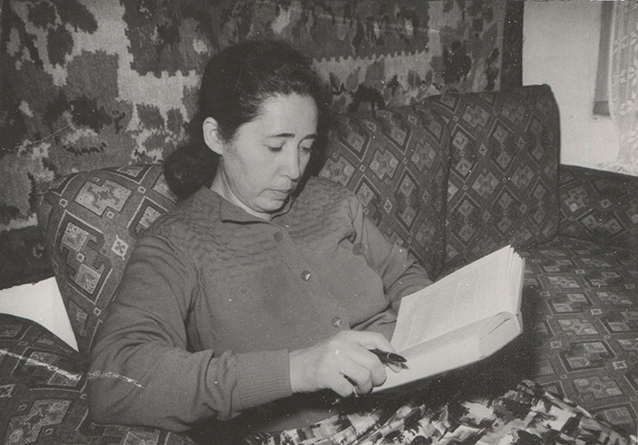
Sento che gli articoli sull’Internazionale, Bella Ciao e questa canzone hanno raggiunto il livello di preziosi archivi storici oltre al loro ruolo di introduzioni alle canzoni contro la guerra. Ora, ecco una preziosa traduzione della Warszawianka in una lingua davvero unica, che onestamente non mi sarei mai aspettato fosse così diffusa. Il Caraciai-Balcaro è una delle lingue turche del Caucaso settentrionale, parlata dai Caraciai e Balcari che vivono nella Repubblica di Karačaj-Circassia e nella Repubblica di Cabardino-Balcaria. Una parente stretta è la lingua kumuk in Daghestan. Il caraciai-balcaro (detto къарачай-малкъар тил /qaraçay-malqar til/ o таулу тил /tawlu til/ “lingua di montagna”) è parlato da poco più di 300.000 persone. La lingua è caratterizzata dalla sua divisione in due dialetti, con fonemi pronunciati come [ʧ] [ʒ] nel dialetto Caraciai e [ts] [z] nel dialetto balcaro.
Questo testo fa parte di 'Джюрек джырлайды 1957', una raccolta di poesie in lingua caraciai-balcara che ho reperito di recente. Il testo è stato scritto da Bayramuqlanı Halimat, una scrittrice (membro dell’Unione degli Scrittori dell'URSS, comunista), nata a Karachaychelkes. Bayramuqlanı Halimat nacque nel 1917, quindi mi aspetto che questo testo della Warszawianka sia stato probabilmente scritto in una data molto successiva rispetto ai testi armeni e georgiani. Sfortunatamente, non conosco i dettagli perché il libro di poesie non ha ulteriori informazioni al riguardo. [Boreč, con qualche integrazione di RV]
Pubblicato da: Libro Caraciai-Circasso (Къарачай-Черкес китаб)
Archiviato da: Biblioteca Regionale Circassa (Черкесская Областная Библиотек)
Autrice del testo: Bayramuqlanı Halimat (Байрамукъланы Халимат)
Contenuto nel canzoniere 'Джюрек джырлайды 1957'
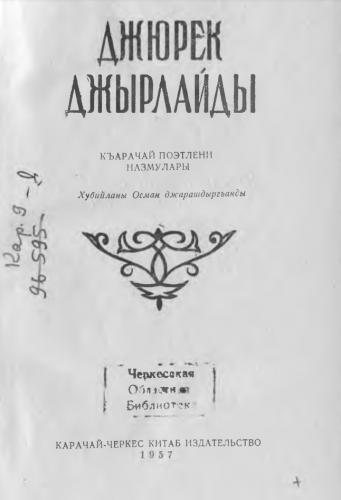
Information on Bayramuqlanı Halimat (1917-1996)
Байрамукъланы Халимат 1917 джылда Хурзукда туугъанды. 1935 джылдан бери джазады. 1939 джылдан СССР-де джазыўчуланы союзуну члениди. 1939 джыл «Эки Джюрек» ― деген биринчи пьесасы чыкъгъанды. Халимат Къарачай тшырыўланы ичинде эм алгъа джазыб башлагъанланы бириди. Аны джазгъанларыны асламысы джюрекден джазылгъан лирикады. Халиматны магъаналы къысха назмулары джашаўубузну тюрлю - тюрлю джерлерин суратлайдыла. Халимат орус тилден къарачай тилге кёб джыр, назму кёчюргенди. Аны назмуларыны талайы орус тилге кёчюрюлгенди.
Halimat Bayramuqlanı was born in 1917 in Khurzuk. She moved to Moscow in 1935. In 1939, she became a member of the Union of Soviet Writers. In the same year, her first play, "Two Hearts" ("Эки Джюрек"), was published. Halimat started her literary career by writing poetry in the Karachay language, which later expanded to include lyrics in various genres. Her poems were published in different magazines and publications. Halimat also translated her works from Russian to Karachay, enriching the Karachay literary landscape.
Halimat Bayramuqlanı nacque nel 1917 a Khurzuk. Si trasferì a Mosca nel 1935. Nel 1939 divenne membro dell'Unione degli Scrittori Sovietici. Nello stesso anno venne pubblicata la sua prima opera teatrale, Эки Джюрек. Halimat iniziò la sua carriera letteraria scrivendo poesie in lingua caraciai-balcara, che in seguito si estese a testi di vario genere. Le sue poesie sono state pubblicate in diverse riviste e pubblicazioni. Halimat ha anche tradotto le sue opere dal russo al caraciai, arricchendo il panorama letterario della sua lingua natale.
1.
Къаллы боранла юсюбюзге улуйла,
Артыкълыкъ бизни унукъдурады,
Ачы урушха киргенбиз джаўла бла,
Алкъын боллукъ зат бизге алдады.
Алай а таўкел, ётгюр тутарбыз
Ишчиле ючюннге кюреш байракъны,
Ашхы джашаў ючюн, эркинлик ючюн
Халкъда уллу кюрешни байрагъын.
Къоб къан урушха, тюзлюкге сынгъа,
Джюр, джюр алгъа, урунньан халкъ алгъа.
Къоб къан урушха, тюзлюкге сынгъа,
Джюр, джюр алгъа, урунньан халкъ алгъа.
2.
Ачдан къырылад ишчи бюгюнлюкде,
Къарнашла, энди тёзюў къалмагъанд,
Джаш нёгерлерибизни бу кюрешде
Ёлюм азаб бир да къоркъутмагъанд.
Муратла ючюннге сыйлы ёлгенле
Уллу сермешде унутулмазла,
Атлары бу хорлам джыр бла бирге
Джюрекден бир да къурутулмазла.
Къоб къан урушха, тюзлюкге сынгъа,
Джюр, джюр алгъа, урунньан халкъ алгъа.
Къоб къан урушха, тюзлюкге сынгъа,
Джюр, джюр алгъа, урунньан халкъ алгъа.
3.
Кёрюб болмайбыз бийликни тамгъасын,
Джарлы халкъны бугъоуун сыйлайбыз,
Халкъ къан тёгюлген патчахны тахдасын
Джауларыбызныкъы бла бойарбыз.
Кечимсиз дерт, бютеу къан ичгенлеге,
Халкъ къыйынын ашагъан къаумгъа,
Дерт эм ёлюм патчахлагъа-итлеге!
Джуукъду къуанч сагъат хорламгъа!
Къоб къан урушха, тюзлюкге сынгъа,
Джюр, джюр алгъа, урунньан халкъ алгъа.
Къоб къан урушха, тюзлюкге сынгъа,
Джюр, джюр алгъа, урунньан халкъ алгъа.
1.
Qallı boranla yusyubyuzge uluyla,
Artıqlıq bizni unuqduradı,
Açı uruşha kirgenbiz caўla bla,
Alqın bolluq zat bizge aldadı.
Alay a taўkel, yotgyur tutarbız
İşçile yuçyunñe kyureş bayraqnı,
Aşhı caşaў yuçyun, erkinlik yuçyun
Halqda ullu kyureşni bayrağın.
Qob qan uruşha, tyuzlyukge sınğa,
Cyur, cyur alğa, urunnan halq alğa.
Qob qan uruşha, tyuzlyukge sınğa,
Cyur, cyur alğa, urunnan halq alğa.
2.
Açdan qırılad işçi byugyunlyukde,
Qarnaşla, endi tyozyuў qalmağand,
Caş nyogerleribizni bu kyureşde
Yolyum azab bir da qorqutmağand.
Muratla yuçyunñe sıylı yolgenle
Ullu sermeşde unutulmazla,
Atları bu horlam cır bla birge
Cyurekden bir da qurutulmazla.
Qob qan uruşha, tyuzlyukge sınğa,
Cyur, cyur alğa, urunnan halq alğa.
Qob qan uruşha, tyuzlyukge sınğa,
Cyur, cyur alğa, urunnan halq alğa.
3.
Kyoryub bolmaybız biylikni tamğasın,
Carlı halqnı buğouun sıylaybız,
Halq qan tyogyulgen patçahnı tahdasın
Caularıbıznıqı bla boyarbız.
Keçimsiz dert, byuteu qan içgenlege,
Halq qıyının aşağan qaumğa,
Dert em yolyum patçahlağa-itlege!
Cuuqdu quanç sağat horlamğa!
Qob qan uruşha, tyuzlyukge sınğa,
Cyur, cyur alğa, urunnan halq alğa.
Qob qan uruşha, tyuzlyukge sınğa,
Cyur, cyur alğa, urunnan halq alğa.
Contributed by Boreč - 2023/7/11 - 04:17
1ה. A version in the Buryat language [1955]
Another rare Warszawianka we've encountered, yes, we've finally identified the existence of Buryat lyrics.
Buryat is a Mongolian language spoken in the Republic of Buryat and other countries. Although it is often considered an independent language, some recognize it as one of the Mongolian dialects, along with the Khalkha dialect (Standard Mongolian) spoken in Mongolia, the Chakhar dialect spoken in China's Inner Mongolia Autonomous Region, and the Oirat dialect (Oirat language) spoken in China's Xinjiang Uygur Autonomous Region.
The lyrics appeared in Vol.299 of the Buryat proletarian newspaper 'Буряад-Монголой үнэн' (Buryat version of "Правда").
Apart from the Kalmyk version of "Өндр улан" (a derivative song Warszawianka), the discovery of this Buryat canonical lyrics is probably the first in the world among the Mongolian language group.
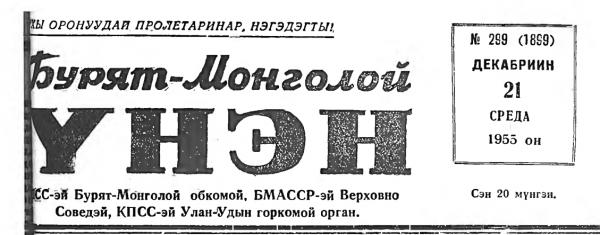
In the past, USSR popularized world-famous revolutionary songs among many ethnic groups thanks to the establishment of writers' unions and language programs for ethnic minorities, thus I assume that this lyrics may be the result of these processes.
Also, this translation is a valuable archive that suggests the possibility of translating into Mongolian.
Amazingly, this workers' hymn was spread to the far east. [Boreč]
Un'altra rara Warszawianka che abbiamo reperito: finalmente identificata l'esistenza dei testi in lingua Buriata. Il Buriato è una lingua mongola parlata nella Repubblica di Buryat e in altri paesi. Sebbene sia spesso considerata una lingua indipendente, alcuni la considerano un dialetto mongolo, assieme al dialetto Khalkha (mongolo standard) parlato nella Repubblica di Mongolia (Mongol Ard Uls), al dialetto Chakhar parlato nella regione autonoma cinese della Mongolia Interna e al dialetto oirat (lingua oirat) parlato nella regione autonoma cinese dello Xinjiang Uygur.
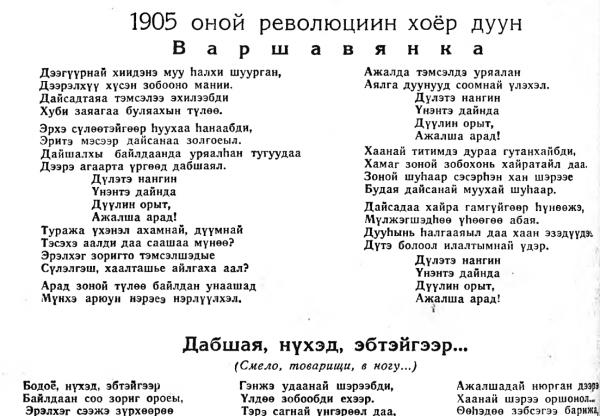
I testi sono apparsi nel Vol.299 del quotidiano proletario Buriato 'Буряад-Монголой үнэн' (versione buriata della Pravda). A parte la versione Calmucca di "Өндр улан" (una canzone derivata dalla Warszawianka), la scoperta di questo testo canonico buriato è probabilmente la prima al mondo nel gruppo linguistico mongolo.
In passato, l'URSS ha reso popolari canzoni rivoluzionarie di fama mondiale tra molti gruppi etnici grazie alla creazione di sindacati di scrittori e programmi linguistici per minoranze etniche, quindi presumo che questo testo possa essere il risultato di questi processi.
Inoltre, questa traduzione è un prezioso strumento che suggerisce la possibilità di tradurre in mongolo. Sorprendentemente, questo inno dei lavoratori era nell'Estremo Oriente. [Boreč]
Еще одна редкая «варшавянка», с которой мы столкнулись, да, мы наконец определили существование бурятской лирики. Бурятский — монгольский язык, на котором говорят в Республике Бурятия и других странах. Хотя его часто считают независимым языком, некоторые признают его одним из монгольских диалектов, наряду с диалектом халха (стандартный монгольский), на котором говорят в Монголии, диалектом чахар, на котором говорят в автономном районе Внутренняя Монголия Китая, и ойратским диалектом (ойратский язык) на котором говорят в Синьцзян-Уйгурском автономном районе Китая.
Текст песни появился в т. 299 бурятской пролетарской газеты «Буряад-Монголой үнэн» (бурятская версия «Правды»).
Помимо калмыцкой версии «Өндр улан» (производная песня Warszawianka), открытие этой бурятской канонической лирики, вероятно, является первым в мире среди монгольской языковой группы.
В прошлом СССР популяризировал всемирно известные революционные песни среди многих этнических групп благодаря созданию союзов писателей и языковых программ для национальных меньшинств, поэтому я предполагаю, что эта лирика может быть результатом этих процессов.
Также этот перевод является ценным архивом, который предполагает возможность перевода на монгольский язык.
Удивительно, но этот рабочий гимн распространился на Дальний Восток.
Музыка: Йозеф Плавински / Слова: Неизвестно
Fonte del testo: Giornale dei proletari buriati «Буряад-Монголой үнэн» (№ 299, ДЕКАБРИИН 21 СРЕДА 1955-он) / Газета «Бурят-Монгольская правда» (№ 299, 21 декабря 1955 г.)
1.
Дээгүүрнай хиидэнэ муу һалхи шуурган,
Дээрэлхүү хүсэн зобооно мании.
Дайсадтаяа тэмсэлээ эхилээбди
Хуби заяагаа буляахын түлөө.
Эрхэ сүлөөтэйгөөр һуухаа һанаабди,
Эритэ мэсээр дайсанаа золгоеыл.
Дайшалхы байлдаанда уряалһан тугуудаа
Дээрэ агаарта үргөөд дабшаял.
Дүлэтэ нангин үнэнтэ дайнда
Дүүлин орыт, ажалша арад!
Дүлэтэ нангин үнэнтэ дайнда
Дүүлин орыт, ажалша арад!
2.
Туража үхэнэл ахамнай, дүүмнай
Тэсэхэ аалди даа саашаа мүнөө?
Эрэлхэг зоригто тэмсэлшэдые
Сүлэлгэш, хаалташье айлгаха аал?
Арад зоной түлөө байлдан унаашад
Мүнхэ арюун нэрэеэ нэрлүүлхэл.
Ажалда тэмсэлдэ уряалан
Аялга дуунууд соомнай үлэхэл.
Дүлэтэ нангин үнэнтэ дайнда
Дүүлин орыт, ажалша арад!
Дүлэтэ нангин үнэнтэ дайнда
Дүүлин орыт, ажалша арад!
3.
Хаанай титимдэ дураа гутанхайбди,
Хамаг зоной зобохонь хайратайл даа.
Зоной шуһаар сэсэрһэн хан шэрээе
Будая дайсанай муухай шуһаар.
Дайсадаа хайра гамгүйгөөр һүнөөжэ,
Мүлжэгшэдһөө үһөөгөө абая.
Дууһынь һалгааяыл даа хаан эзэдүүдэ,
Дутэ болоол илалтымнай үдэр.
Дүлэтэ нангин үнэнтэ дайнда
Дүүлин орыт, ажалша арад!
Дүлэтэ нангин үнэнтэ дайнда
Дүүлин орыт, ажалша арад!
Transcription in Latin characters
Note. This trascription is basically made according to the principles exposed in my Buryat grammar (Nicholas N. Poppe: Buriat [sic] Grammar, Indiana University Publications – Uralic and Altaic Series Vol. 2. Indiana University, Bloomington 1960), with only slight modifications to better match the current Latin transcription of Khalkha Mongolian (written, like Buryat, in Cyrillic characters). [RV]
1.
Deegüürnaj khiidene muu halikh šuurgan,
Deerelkhüü khüsen zoboono manin,
Dajsadtajaa temselee ekhileebdi
Khubi zajaagaa buljaakhyn tülöö.
Erkhe sülöötejgöör hüükhaa hanaabdi,
Erite meseer dajsanaa zolgojeyl.
Dajšalkhy bajldaanda urjaalhan tuguudaa
Deere agaarta ürgööd dabšajaal.
Dülete nangin ünente dajnda
Düülin oryt, ažalša arad!
Dülete nangin ünente dajnda
Düülin oryt, ažalša arad!
Дүлэтэ нангин үнэнтэ дайнда
Дүүлин орыт, ажалша арад!
Дүлэтэ нангин үнэнтэ дайнда
Дүүлин орыт, ажалша арад!
2.
Turaža ukhenel akhamnaj, düümnaj
Tesekhe aaldi daa saašaa münöö?
Erelkheg zorigto temselšedye
Sülelgeš, khaaltaš’e ajlgakha aal?
Arad zonoj tülöö bajldan unaašad
Münkhe arjuun nerejee nerlüülkhel.
Ažalda temselde urjaalan
Ajalga duunuud soomnaj ulekhel.
Dülete nangin ünente dajnda
Düülin oryt, ažalša arad!
Dülete nangin ünente dajnda
Düülin oryt, ažalša arad!
3.
Khaanaj titimde duraa gutankhajbdi,
Khamag zonoj zobokhoń khajratajl daa.
Zonoj šuhaar seserhen khan šereeje
Budaja dajsanaj muukhaj šuhaar.
Dajsadaa khajra gamgüjgöör hünööže,
Mülžegšedhöö ühöögöö abaja.
Duuhyń halgaajayl daa khaan ezedüüde,
Dute bolool ilaltymnaj üder.
Dülete nangin ünente dajnda
Düülin oryt, ažalša arad!
Dülete nangin ünente dajnda
Düülin oryt, ažalša arad!
Contributed by Boreč - 2023/7/14 - 17:39
1ו. वर्षाव्यंका (The Warszawianka in Hindi, written by Spalvera, 2023)
So, without a doubt, "Warszawianka" had spread on the Indian land, and it can't be denied that someone among the past communists might have translated into various Indian languages.
La Warszawianka (वर्षाव्यंका) in hindi, scritta personalmente nel 2023 da Spalvera, un traduttore hindi e punjabi. La parte del ritornello è un omaggio da "A las barrricadas", mentre il resto è un testo indipendente (di stampo internazionalistico e critico verso l'imperialismo). In India, molte canzoni rivoluzionarie sono state cantate fino ad oggi, tra cui L'Internazionale, ma non esiste ancora alcuna registrazione confermata della Warszawianka cantata in hindi. Tuttavia, è stata registrata una versione inglese della Warszawianka (Whirlwinds of Danger), eseguita in passato dall'Associazione teatrale del popolo indiano (ATPI) nel Bengala Occidentale. Quindi, senza dubbio, la "Warszawianka" si era diffusa in terra indiana, e non si può negare che qualcuno tra i comunisti del passato possa averla tradotta in varie lingue indiane.
हिंदी में वॉर्सज़ाविंका (वर्षाव्यंका), हिंदी और पंजाबी अनुवादक स्पालवेरा द्वारा 2023 में व्यक्तिगत रूप से लिखी गई। परहेज भाग "ए लास बैरिकैडस" से एक श्रद्धांजलि है, और उन्होंने स्वतंत्र गीत लिखे (साम्राज्यवाद की आलोचना करने वाले एक अंतरराष्ट्रीय स्वाद के साथ)। भारत में, आज तक कई क्रांतिकारी गीत गाए गए हैं, जिनमें एल'इंटरनेशनल भी शामिल है, लेकिन हिंदी में गाए गए वार्सज़ावियांका का अभी भी कोई पुष्ट रिकॉर्ड नहीं है। हालाँकि, अतीत में पश्चिम बंगाल में इंडियन पीपुल्स थिएटर एसोसिएशन (आईपीटीए) द्वारा प्रस्तुत अंग्रेजी संस्करण वॉर्सज़ावियांका (खतरे का बवंडर) का रिकॉर्ड मौजूद है। अत: निःसंदेह, "वार्सज़ावियांका" भारतीय भूमि पर फैल चुका था, और इस बात से इनकार नहीं किया जा सकता कि अतीत के कम्युनिस्टों में से किसी ने विभिन्न भारतीय भाषाओं में अनुवाद किया होगा।
1.
मोदी की भारतीय जनता पार्टी
बुराई के सिवा कुछ नहीं
मोदी की भारतीय जनता पार्टी
बुराई के सिवा कुछ नहीं
सर्वहारा वर्ग, यह कौन होगा?
क्रांति अभी, या कभी नहीं?
बैरिकेड्स को, बैरिकेड्स को
जाओ जाओ सर्वहारा, आगे बढ़ो
2.
राजा के अधीन रूस
गुलामी के तहत चीन
क्यूबा जो एक अमेरिकी उपनिवेश था
क्रांति, और अब वे आज़ाद हैं!
सर्वहारा वर्ग, यह कौन होगा?
क्रांति अभी, या कभी नहीं?
बैरिकेड्स को, बैरिकेड्स को
जाओ जाओ सर्वहारा, आगे बढ़ो
1.
mōdī kī bhāratīya janatā pārṭī
burā'ī kē sivā kucha nahīṁ
mōdī kī bhāratīya janatā pārṭī
burā'ī kē sivā kucha nahīṁ
sarvahārā varga, yaha kauna hōgā?
krānti abhī, yā kabhī nahīṁ?
bairikēḍsa kō, bairikēḍsa kō
jā'ō jā'ō sarvahārā, āgē baṛhō
2.
rājā kē adhīna rūsa
gulāmī kē tahata cīna
kyūbā jō ēka amērikī upanivēśa thā
krānti, aura aba vē āzāda haiṁ!
sarvahārā varga, yaha kauna hōgā?
krānti abhī, yā kabhī nahīṁ?
bairikēḍsa kō, bairikēḍsa kō
jā'ō jā'ō sarvahārā, āgē baṛhō
Contributed by Boreč - 2023/7/23 - 15:04
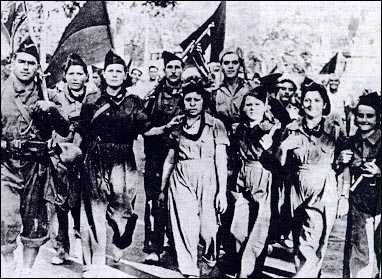
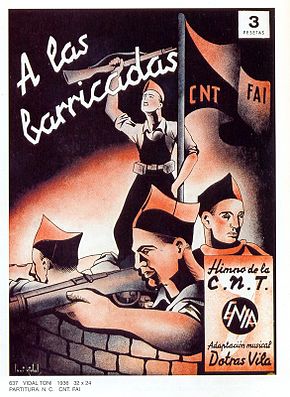
Nota: Tutte le traduzioni contrassegnate con un *asterisco sono riprese da varie edizioni di Wikipedia.
Note. All versions marked with an *asterisk are reproduced from Wikipedia. [CCG/AWS Staff]
Testo spagnolo di Valeriano Orobón Fernández e Hildegart Taege [1932]
2a. ¡A LAS BARRICADAS! (Marcha Triunfal)
Spanish lyrics by Valeriano Orobón Fernández and Hildegart Taege [1932]
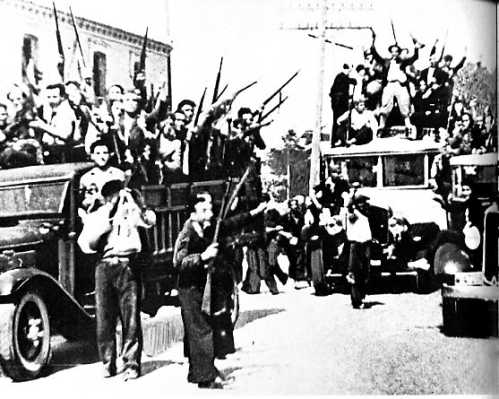
di Riccardo Venturi, 18-11-2021
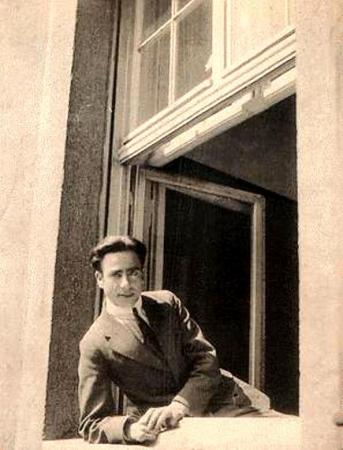
La storia di ¡A las barricadas!, il canto più celebre della guerra civile Spagnola, inizia circa quattro anni prima del suo scoppio; ed inizia con la visita in Spagna, nel 1932, di un giovane anarcosindacalista tedesco, Alfred Schulte. Alfred Schulte ha ventiquattro anni ed è un operaio metalmeccanico disoccupato; è membro della SAJD, la Syndikalistisch-Anarchistische Jugend Deutschlands (“Gioventù Anarcosindacalista di Germania"), sezione di Wuppertal. In Spagna, Alfred Schulte è ospite a Madrid di Valeriano Orobón Fernández, giovane teorico dell'anarcosindacalismo (nel 1932 ha 31 anni, essendo nato nel 1901 a Cistérniga, presso Valladolid); all'epoca era il capo della sezione culturale e giornalistica della CNT-IAA. Il fatto che Alfred Schulte sia ospite proprio da Valeriano Orobón Fernández non è un caso: la moglie di quest'ultimo, Hildegart Taege, detta Hilde, è tedesca di origine. Era una disegnatrice di modelli e studentessa alla FAUD, la facoltà di architettura, urbanismo e disegno; aveva sposato Valeriano Orobón nel 1927. Ma anche Valeriano Orobón parlava correntemente il tedesco: ad esempio, aveva tradotto in spagnolo la ponderosa biografia dell'anarchico tedesco Max Nettlau scritta da Rudolf Rocker.
La storia vuole che, una mattina durante la sua visita spagnola a casa degli Orobón, Alfred Schulte abbia deciso di farsi un bagno in vasca. Una volta riempitala e entrato dentro col sapone per lavarsi, Alfred Schulte fece come molti fanno in vasca o sotto la doccia: si mise a cantare. Data la situazione, però, non si mise certamente a intonare l'ultima canzonetta di successo: cantava una versione della Warschawjanka, il canto rivoluzionario di origine polacco-russa che, in Germania, si cantava nella sua versione completa già dagli anni della rivolta Spartachista del 1919. Sentitolo cantare dalla stanza accanto, Valeriano Orobón, che cercava già da tempo quel canto, pare si sia letteralmente precipitato in bagno, dove Alfred Schulte se ne stava a cantare nudo in vasca, per chiedergli di asciugarsi alla svelta e di scrivergliene immediatamente il testo. Così accadde; il giorno stesso, Valeriano Orobón, aiutato dalla moglie Hilde, lo tradusse in spagnolo. Era nata la Marcha Triunfal (questo il titolo originale dato da Orobón). L'arrangiamento musicale per coro misto fu affidato al musicista catalano Ángel Miret.
La pubblicazione della Marcha Triunfal avvenne nel novembre del 1933 nel settimanale Tierra y Libertad, “semanario anarquista” e organo della CNT-FAI. Recava, in piccolo, un sottotitolo: ¡A las barricadas!; un piccolo sottotitolo che, ben presto, cancellerà del tutto il titolo ufficiale. La CNT-IAA dichiara quasi subito ¡A las barricadas! suo inno ufficiale; non molto tempo dopo, nel luglio del '36, le barricate saranno erette davvero a Barcellona e in altre città spagnole, dopo il pronunciamiento di Francisco Franco e degli altri generali. Inizia la guerra civile, e ¡A las barricadas! diviene uno dei suoi canti più famosi, diffondendosi internazionalmente fino ai nostri giorni.
Valeriano Orobón Fernández fu arrestato l'8 marzo 1934 su ordine del governo Lerroux; non molto prima della rivolta Asturiana che sarebbe iniziata il 5 ottobre dello stesso anno, e che il 18 ottobre sarebbe stata definitivamente schiacciata nel sangue da Francisco Franco, stava lavorando all'unità sindacale tra CNT e UGT, e questo fu esattamente il motivo del suo incarceramento (secondo la precisa testimonianza dell'allora Ministro degli Interni, che recava il sinistro nome di Salazar). Fu rilasciato il 31 marzo 1934 ma, pochi giorni dopo, fu nuovamente arrestato e, stavolta, rimase rinchiuso nella Cárcel Modelo di Barcellona fino al marzo del 1935. Nella Cárcel Modelo, Valeriano Orobón si ammalò di tubercolosi. Liberato, fu ospitato assieme alla moglie nella casa madrilena di Mercedes Comaposada Guillén, una delle fondatrici del movimento femminista libertario Mujeres Libres. Colpito da un terribile attacco della malattia, Valeriano Orobón morì il 28 giugno 1936, nemmeno un mese prima dello scoppio della guerra civile.
All'inizio della guerra, i militanti anarcosindacalisti madrileni crearono il Batallón Orobón Fernández, di cui fece parte anche Cipriano Mera; il battaglione combatté per la difesa di Madrid, a Cuenca e a Teruel. La FAI intendeva pubblicare una biografia completa di Orobón Fernández, ed anche le sue opere complete; ma l'intero archivio (traduzioni, scritti, saggi economici e politici) cadde in mano fascista nell'autunno del 1936, e fu completamente distrutto. Non ne rimane niente; cosicché, praticamente l'unica cosa che sopravvive di Valeriano Orobón Fernández è proprio ¡A las barricadas!. Nel 1968, in Spagna, esisteva un gruppo clandestino anarchico chiamato “Orobón Fernández”.
Sulla moglie, Hildergart Taege, che aveva conosciuto, giovanissima, a Berlino, non si sanno molte cose. Nel 1936, l'anno della morte del marito, lavorava come interprete nel Dipartimento Censura del Ministero della Guerra repubblicano. In seguito lavorò come interprete tra il Consejo de Defensa e i volontari tedeschi della batteria “Dimitroff” delle Brigate Internazionali.
Non si sa assolutamente niente di che cosa ne sia stato di Alfred Schulte, il giovane anarcosindacalista di Wuppertal che, una mattina del 1932, si era fatto un bagno in vasca a casa di Valeriano e Hilde, a Madrid, cantando a squarciagola la Warschawjanka mentre si insaponava e si rinfrescava.
Fonti consultate:
- Klan, Ulrich / Nelles, Dieter: "'Es lebt noch eine Flamme’.
Grafenau-Döffingen, Trotzdem-Verlag 1990, S. 256
Valeriano Orobón Fernández, un anarquista de Valladolid, su Foros Castilla, 2009 (a cura dell'utente Maelstrom)
- Alemanas en Brigadas Internacionales, AABI, Asociación de Amigos de las Brigadas Internacionales, 14-12-2018
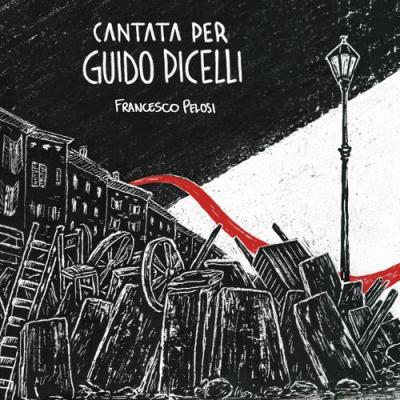
℗ 2022 Francesco Pelosi
Released on: 2022-07-10
Producer: Rocco Marchi
Composer: Francesco Pelosi
Arranger: Nicolas Furlan
Arranger: Rocco Marchi
Arranger: Luigi Martinelli
Arranger: Francesco Pelosi
- Noi che desideriamo senza fine
- Oltretorrente (Canzone d'amore)
- Figli dell'officina (Giuseppe Raffaelli - Giuseppe del Freo, 1921)
- ¡A las barricadas! (Valeriano Orobón Fernández - Hildegart Taege, 1932)
- El Ejército del Ebro (Anonimo / Anonymous, 1936)
- Si la bala me da (Wenn das Eisen mich mäht, Josef Luitpold, 1915)
- Barricate in ogni paese
- In morte di Picelli
Interpretata da Francesco Pelosi, Cantata per Guido Picelli, 2022
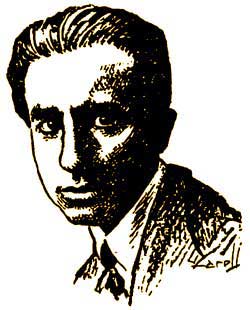
nubes oscuras nos impiden ver.
Aunque nos espere el dolor y la muerte
contra el enemigo nos llama el deber.
El bien más preciado es la libertad
hay que defenderla con fe y valor.
Alza la bandera revolucionaria
que del triunfo sin cesar nos lleva en pos. [1]
Alza la bandera revolucionaria
que del triunfo sin cesar nos lleva en pos.
En pie el pueblo obrero, a la batalla
hay que derrocar a la reacción.
¡A las barricadas! ¡A las barricadas!
por el triunfo de la Confederación.
¡A las barricadas! ¡A las barricadas!
por el triunfo de la Confederación.
Contributed by Riccardo Venturi - 2007/10/11 - 12:48
Il testo catalano di Josep Mas i Gomeri (1936)
2a1. A LES BARRICADES!*
Catalan version by Josep Mas i Gomeri (1936)
Il testo catalano è praticamente parallelo a quello spagnolo; ciò è sicuramente dovuto sia alla vicinanza tra le due lingue, sia alla particolare atmosfera in cui fu composto. Risale infatti al 1936, l'anno stesso dello scoppio della Guerra Civile, quando la Marchia Triunfal di Valeriano Orobón Fernández circolava già da qualche anno come inno anarco-sindacalista. L'autore di questa “versione parallela” catalana è Josep Mas i Gomeri (che si firmava spesso “Masgomeri”) [1890-1940]. Barcellonese, Josep Mas i Gomeri fu un personaggio decisamente poliedrico: fu, infatti, poeta, disegnatore e pittore (spesso con gli pseudonimi di “Niel” o “Daniel”). La sua attività di disegnatore si svolse pressoché interamente come illustratore; come pittore, si era invece specializzato in quadri floreali ed in scene di vita popolare barcellonese. Josep Mas i Gomeri aderì in giovanissima età all'Anarchia: a soli 16 anni pubblicò (in spagnolo) un saggio intitolato: E pur si muove!... Refutación al libro “La Razón contra la Anarquía” (Imprenta J. Ortega, Barcelona 1906). Il saggio dell'adolescente “Masgomeri” ebbe parecchia risonanza negli ambienti libertari dell'epoca, tanto da divenire un (attualmente introvabile) classico dell'anarchismo iberico. “Masgomeri” fu un assiduo collaboratore della stampa libertaria (El Productor, La Revista Blanca ecc.); in campo sindacale, fu militante del Sindicat de l'Art d'Imprimir (sindacato dei tipografi), e fu membro fondatore di Solidaridad Obrera. Le barricate dovevano essere nella sua storia: nel luglio 1909, infatti, all'età di 19 anni fu sulle barricate della cosiddetta ”Settimana Tragica”, la serie di rivolte scoppiate a Barcellona e in altre città industriali catalane dal 26 luglio al 2 agosto 1909, originate dal rifiuto dell'invio dei riservisti in Marocco per la II Guerra di Melilla. L'anno successivo (1910), Josep Mas i Gomeri fu tra i membri fondatori della CNT al Congresso del Palau de Belles Arts di Barcellona. Josep Mas i Gomeri fu tra i principali sostenitori dell'uso della lingua catalana all'interno dell'anarchismo; fu poi collaboratore di Tierra y Libertad e di Solidaridad Obrera. Josep Mas i Gomeri non tradusse in catalano soltanto ¡A las barricadas!; è infatti anche l'autore della versione catalana dell'altro importante inno socialista e anarchico, Hijos del pueblo. Entrambe le versioni furono incise su disco dalla corale L'Orfeó Català, fondata a Barcellona nel 1891. Josep Mas i Gomeri morì a Barcellona nel 1940, all'età di soli 50 anni. [RV]
Avvertenza. Il testo catalano presenta alcune comuni varianti, segnalate in note.
Notice. The Catalan lyrics show a number of commonly occurring variants.
núvols sinistres ens ceguen l'esguard.
Encar' que us esperi [1] la mort més cruenta,
Contra l'adversari havem [2] de lluitar.
L'única [3] riquesa és la llibertat,
I cal defensar-la amb coratge i amb fe.
Alta la bandera revolucionària,
Que sens repòs ens mena al triomf del nostre anhel. [4]
Alta la bandera revolucionària,
Que sens repòs ens mena al triomf del nostre anhel.
Dempeus tot el poble! Tots a la lluita!
Esfondrem amb fúria la reacció!
A les barricades! A les barricades!
Per la victòria de la Confederació!
A les barricades! A les barricades!
Per la victòria de la Confederació!
[2] haurem
[3] La nostra
[4] Var. Qu'ens condueix a la emancipació
Contributed by Riccardo Venturi - 2007/10/12 - 02:15
2b. Italian translation (word-for-word) by Riccardo Venturi, August 4, 2006.
Nere tormente agitano l’aria,
Nubi scure ci impediscono di vedere.
Sebbene ci attenda il dolore e la morte
Contro il nemico ci chiama il dovere.
Il bene più prezioso è la libertà,
Bisogna difenderla con fede e valore.
Alza la bandiera rivoluzionaria
Che ci segue senza sosta nel trionfo
Alza la bandiera rivoluzionaria
Che ci segue senza sosta nel trionfo,
In piedi, popolo operaio, alla battaglia
Bisogna abbattere la reazione.
Alle barricate! Alle barricate!
Per il trionfo della Confederazione.
Alle barricate! Alle barricate!
Per il trionfo della Confederazione.
2b1. Italian enlarged version by La Casa del Vento
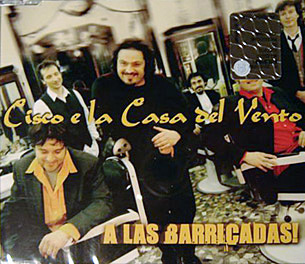
Dal sito ufficiale del gruppo:
Nere tempeste agitano il cielo
Voci nel mondo chiedono uguaglianza
La libertà dal laccio soffocante
Genti che prostrano il capo a riverenza.
Laiche utopie ci animarono il pensiero
E fu così che partimmo per Praga
Troppi paesi hanno un debito intero
Lotta e rivolta contro questa piaga.
Ma tutto intorno c'è chi si ribella
In un incontro globale che contesta
Disoccupati studenti ed operai
L'ultimo anello di catena che protesta.
En pie pueblo obrero a la batalla
Hay que derrocar a la reacción
A las barricadas a las barricadas
Para el triunfo de la revolución.
Levanta la bandera revolucionaria
Que llevará al pueblo a la emancipación
A las barricadas a las barricadas
Para el triunfo de la revolución.
Libero è il mercato libero e sfrenato
Poca virtù molta la disperazione
Povero è il popolo povero e vessato
E allora liberi lavoro e immigrazione.
Ci sono uomini ormai già schiavizzati
Dal ruolo delle banche e dell'economia
Mentre si affonda dentro l'immondizia
Del capitale e della sua gerarchia.
Ma tutto intorno c'è chi dice basta
In un incontro globale che contesta
Disoccupati studenti ed operai
L'ultimo anello di catena che protesta.
En pie pueblo obrero a la batalla
Hay que derrocar a la reacción
A las barricadas a las barricadas
Para el triunfo de la revolución.
Levanta la bandera revolucionaria
Que llevará al pueblo a la emancipación
A las barricadas a las barricadas
Para el triunfo de la revolución.
"Estamos bebiendo nuestro sudor
Estamos comiendo nuestras uñas
Ma esto no puede continuar
Pueblo, hermanos
Parados no podemos estar
Luchemos contra las injusticias
Luchemos contra la globalización
Luchemos! Luchemos!"
En pie pueblo obrero a la batalla
Hay que derrocar a la reacción
A las barricadas a las barricadas
Para el triunfo de la revolución.
Levanta la bandera revolucionaria
Que llevará al pueblo a la emancipación
A las barricadas a las barricadas
Para el triunfo de la revolución.
Contributed by Riccardo Venturi - 2007/10/12 - 02:53
2b2. Anonymous Italian version from 1937
Pubblicata in “Guerra di Classe” (settimanale anarcosindacalista), Barcellona, a. II, n° 9, 24 marzo 1937, p.1. L'autore della traduzione, certamente un anarchico italiano, è rimasto anonimo. Riportata in: Catanuto/Schirone, Il canto Anarchico in Italia nell'Ottocento e nel Novecento, ed. 2009, edizioni Zero in Condotta, pp. 234/235. Ripresa in tempi recenti dal gruppo Berretto Frigio.

Published in “Guerra di Classe” (Anarcho-Syndicalist weekly magazine), Barcelona, a. II, nr 9, 24 March 1937, p. 1. The translator, no doubt an Italian anarchist, is unknown. Reproduced from: Catanuto/Schirone, Il canto Anarchico in Italia nell'Ottocento e nel Novecento, ed. 2009, Zero in Condotta Publishing House, pp. 234/235.
Dall'orizzonte sociale alle porte
Bussa il ciclone del dritto e del ver
Là dove ci aspetta il dolore e la morte
Contro il nemico ci spinge il dover.
Il più bel tesoro è la libertà,
Dobbiam propugnarla con dignità.
Alta la bandiera! Fiamma rossa e nera
Che del trionfo al limitar ci condurrà.
Su, santa canaglia, alla battaglia,
Per la distruzion della reazion!
Alle barricate! Alle barricate!
Per il trionfo della Gran Rivoluzion!
Contributed by Riccardo Venturi - 2018/6/11 - 23:34
2c. English literal translation*
Black storms shake the sky
Black clouds blind us,
Although death and pain await us
Against the enemy we must go.
The most precious good is freedom
And we have to defend it with courage and faith!
Raise the revolutionary flag,
Moving us forward with unstoppable triumph.
Raise the revolutionary flag,
Moving us forward with unstoppable triumph.
Working people march onwards to the battle,
We have to smash the reactionaries.
To the Barricades! To the Barricades!
For the triumph of the Confederation.
To the Barricades! To the Barricades!
For the triumph of the Confederation.
Contributed by Riccardo Venturi - 2007/10/12 - 01:46
2c1. Alternative English translation
Here is another English version
Merci!
Contribuita da Antoine Lafourcade.
Contributed by Antoine Lafourcade.
Black storms rumbling through the skies,
Dark clouds forbid us to see.
Eventhough pain and death will await us
Duty calls for us to rise against the enemy.
The most precious thing is our liberty,
And we must defend it with courage and faith!
Give rise to the flag of the revolution,
Which will lead the people to the emancipation.
Give rise to the flag of the revolution,
Which will lead the people to the emancipation.
get up working people, onwards into battle,
We have to defeat the adverse reaction.
To the Barricades! To the Barricades!
For the triumph of the Confederacy!
To the Barricades! To the Barricades!
For the triumph of the Confederacy!
Contributed by Antoine Lafourcade - 2014/9/20 - 10:00
2d. French version by Jean-Marc Leclercq (JoMo), 1998
A quanto pare, l'unica versione francese ritmica di ¡A las barricadas! è quella di Jean-Marc Leclercq (JoMo) del 1998; solo che si tratta della parte in francese di una versione trilingue spagnola-esperanto-francese che il libertario, vegetariano e poliglottissimo JoMo ha effettuato e interpretato assieme al suo gruppo (JoMo kaj Liberecanoj, ovvero “JoMo e i Libertari), dall'album eponimo. Questo pone un problema in questo sito, perché il testo francese era già stato ripreso a suo tempo, staccato dagli altri, da fr.wikipedia (ma ora ce n'è un altro, una traduzione letterale) mentre la versione trilingue intera, come si è visto, è pure presente nel sito. Siamo dunque costretti ad essere salomonicamente ridondanti nel rimettere a posto questa complicata versione: manteniamo la versione trilingue, e qui la ripetiamo evidenziando la strofa in francese. [RV, 25-10-2022]
Apparently, the only French version of ¡A las barricadas! on a rhythmical basis is that by Jean-Marc Leclercq (JoMo) from 1998; as a matter of fact, it is the French part of a trilingual, Spanish-Esperanto-French version which the libertarian, vegetarian and very polyglottic JoMo made and sang with his band (JoMo kaj Liberecanoj, “JoMo and the Libertarians”). The song is included in the eponymous album. This makes a problem for this page: the French lyrics were already included as an independent version (from fr.wikipedia; but there's a different, literal translation now), while the aforesaid, complete trilingual version is equally included in this page. So, we have to be impartially redundant in restructuring this complicated version: we have kept the trilingual version, and we repeat it here highlighting the French stanza. [RV, 25-10-2022]
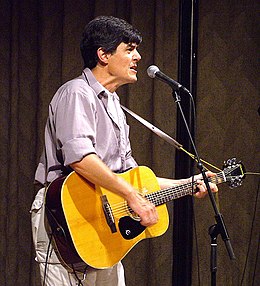
[Negras tormentas agitan los aires
Nubes enormes nos impiden ver
Aunque nos espere el dolor y la muerte
Contra el enemigo nos llama el deber
El bien más preciado es la libertad
Hay que defenderla con fe y valor
Alza la bandera revolucionaria
Que lleve el pueblo a la emancipación
A las barricadas, oh, a las barricadas
Por el triunfo de la Confederación
Nigraj ŝtormegoj skuegas aerojn
Kaj grandegaj nuboj nin malhelpas vidi plu
Eĉ se nin atendas doloro kaj morto
Kontraŭ malamika dev' antaŭenpuŝas ni
Nenio pli preza ol la Liberec'
Devas ni ĝin savi kun fid' kaj kuraĝ'
Altigu la flagon revolucieman
Sub kiu popolo marŝas al elservutiĝ'
Al la barikadoj, al la barikadoj
Por la triumfo de la Konfederaci']
De sombres tempêtes nous empêchent de bien voir.
Même si la mort nous attend dans l'arène
C'est contre l'ennemi que nous appelle le devoir.
Rien n'est plus fragile que la liberté,
Il faut la défendre avec courage et fièreté! [1]
C'est sous la bannière révolutionaire
Que le peuple avance vers son émancipation.
Tous aux barricades, tous aux barricades!
Pour le triomphe de la Confédération!
Tous aux barricades, tous aux barricades!
Pour le triomphe de la Confédération!
Contributed by Riccardo Venturi - 2007/10/12 - 01:54
2d1. French literal translation*
Des tempêtes noires agitent les airs.
Des nuages sombres nous empêchent de voir.
Même si la mort et la douleur nous attendent
Le devoir nous appelle contre l'ennemi.
Le bien le plus précieux est la liberté,
Il faut la défendre avec foi et courage!
Lève le drapeau révolutionnaire
Qui mènera le peuple à l'émancipation. [1]
Lève le drapeau révolutionnaire
Qui mènera le peuple à l'émancipation,
Debout peuple ouvrier, au combat!
Il faut vaincre la réaction.
Aux barricades ! Aux barricades !
Pour le triomphe de la Confédération !
Aux barricades ! Aux barricades !
Pour le triomphe de la Confédération !
Contributed by Riccardo Venturi - 2022/10/25 - 19:59
2e. Romanian literal version*
Fortuni negre zbucimă cerul,
Nori uraşi ne-mpiedică să vedem.
Chiar dacă ne-aşteaptă durerea şi moartea
Împotriva duşmamului ne cheamă datorici
Nimic ne e mai de preţ decăt libertatea
Ea trebuie păzită cu vitejie şi credinţă!
Sub steagul revoluţionar
Poporul se-ndreaptă spre dezrobire.
La baricade! La baricade!
Pentru triumful Confederaţiei!
La baricade! La baricade!
Pentru triumful Confederaţiei!
Contributed by Riccardo Venturi - 2007/10/12 - 02:03
2f. Finnish literal version*
Taivas on myrskyjen vallitsema
Suunnattomat pilvet estävät näkömme.
Vaikka meitä kärsimys ja kuolema vaanivat
Vihollista vastaan kutsuu velvollisuus.
Vapaus on kaikkein arvokkain,
Sitä on puolustettava uskolla ja rohkeudella!
Vallankumouksen lipun alla
Kansa edistyy vapautumiseensa.
Barrikadeihin! Barrikadeihin!
Liiton voiton vuoksi.
Barrikadeihin! Barrikadeihin!
Liiton voiton vuoksi.
Contributed by Riccardo Venturi - 2007/10/12 - 02:06
2f1. Barrikadeille - Klaus Maunuksela's Finnish version (2016)

La versione finlandese di Klaus Maunuksela è tratta dal volumetto Anarkistisia työväenlauluja (“Canti anarchici dei lavoratori”), curato da Nikola Kurkilahti (ed. Kolera, 2016). Qui di seguito anche una breve introduzione in finlandese.
This Finnish version of ¡A las barricadas! is reproduced from the booklet Anarkistisia työväenlauluja (“Anarchist Workers' Songs”) edited by Nikola Kurkilahti (Kolera, 2016) A short introduction in Finnish is provided below. [RV]
Klaus Maunuksela (s.1993) on dramaturgi, kirjoittaja ja taiteilija-tutkija, joka toimii esittävän taiteen, kirjallisuuden ja taiteellisen tutkimuksen alueilla. Hän tekee dramaturgian alaan liittyvää taiteellista väitöstutkimusta Esittävien taiteiden tutkimuskeskuksessa Taideyliopistossa. Hän on kirjoittanut näytelmiä, librettotekstejä ja esseitä sekä Työstäkieltäytyjän käsikirjan (2019) yhdessä yhdeksän muun kirjoittajan kanssa. Hän on valmistunut teatteritaiteen maisteriksi Taideyliopistosta ja opiskellut kirjoittamista Kriittisessä korkeakoulussa. Taiteellisen työn ohella hän toimii mm. näytelmäkirjailijoiden Teksti-yhteisössä ja Nuoren Voiman Liitossa.
Klaus Maunuksela (b. 1993) is a Helsinki-based dramaturg, writer and artist-researcher who is active in the fields of performance, literature and artistic research. Currently he is conducting doctorate in artistic research in Performing Arts Research Centre in the University of Arts Helsinki under working title Dramaturgical Operations of Linguistic Anti-Production. He has written plays, libretic texts, essays and collaborative political-poetic manifesto Työstäkieltäytyjän käsikirja (Handbook for a Work Refuser) 2019. His upcoming prosaic work Manuaali (2022) is an experimental novel that is written in tandem with kinetic audiobook by virate.me. He has a Master’s Degree in Dramaturgy (University of Arts Helsinki) and he has studied creative writing in Critical Academy in Helsinki. Among other activities, he is a member of board in the youthful literary organisation Nuoren Voiman Liitto (est. 1921) and one of the organisers of KNF Festival for Finnish Plays, the only festival platform for contemporary playwriting in Finland.
Taivasta varjostavat synkät myrskypilvet
Jotka meidän silmämme sokeaksi saa,
Ja vaikka meitä kuolema tiellämme uhkaa
Velvollisuus kutsuu meitä taistelemaan.
Kalleinta kaikista on vapaus meille
Jotka sitä nousemme puolustamaan!
Korkealla leimutkoon kumouksen viiri,
Joka meidät voittoon johdattaa.
Korkealla leimutkoon kumouksen viiri,
Joka meidät voittoon johdattaa.
Työväki yhtyy kamppailujen kautta,
Luokkavallan kahleet murskaamaan.
Siis barrikadeille! Barrikadeille!
Ainoa vaatimus: anarkia nyt!
Barrikadeille! Barrikadeille!
Ainoa tavoite on anarkia nyt!
Contributed by Boreč - 2021/12/5 - 00:32
2g. Esperanto literal translation*
Nigraj ŝtormegoj skuegas aerojn,
Kaj grandegaj nuboj nin malhelpas vidi plu.
Eĉ se nin atendas doloro kaj morto,
Kontraŭ malamiko nin antaŭenpuŝas dev'.
Nenio pli prezas al la Liberec',
Devas ni ĝin savi kun fid' kaj kuraĝ'!
Altigu la flagon revolucieman
Sub kiu popolo marŝas al elservutiĝ'.
Altigu la flagon revolucieman
Sub kiu popolo marŝas al elservutiĝ'.
Vekiĝu popolo, a la batado!
Ni devas renversi la reakcion!
Al la barikadoj! Al la barikadoj!
Por la triumfo de la konfederaci'.
Al la barikadoj! Al la barikadoj!
Por la triumfo de la konfederaci'.
Contributed by Riccardo Venturi - 2007/10/12 - 02:09
2h. German version (by Alfred Schulte, 1932?)
Interpretata da / Performed by Commandantes
Album: Für Brot und Freiheit (2011)
Come già detto, la storia della Warszawianka (e di ¡A las barricadas!) in lingua tedesca non è mai stata del tutto chiarita. Così, accanto alla Warschawianka storica, a partire dal 1932 circolano anche delle versioni che, più propriamente, seguono quella spagnola di Valeriano Orobón Fernández e della moglie Hildegart Taege (le cui particolari vicende si trovano al suddetto link). Come si può vedere, gli intrecci sono molteplici e continui: questa versione tedesca (e la successiva) sono infatti chiaramente derivate, a loro volta, dalla versione spagnola già eseguita; tant'è che, da più parti, si tende ad attribuirla proprio a Alfred Schulte, il giovane studente e sindacalista di Wuppertal la cui “performance canora” della Warschawjanka nella vasca da bagno dei coniugi Orobón è alla base di ¡A las barricadas!. In pratica, sarebbe una vera e propria retroversione, un Rückpferd (“cavallo di ritorno”), per dirla alla tedesca. Il testo che qui si presenta precede senz'altro il successivo, in quanto non fa alcun riferimento alla guerra civile che sarebbe scoppiata qualche anno dopo; è un testo pienamente “sindacale”. Proviene in origine dalla versione tedesca dell'IWW Songbook americano, il cosiddetto Schwarz-Rotes Liederbüchlein (“Piccolo canzoniere rosso e nero”) dell'anarcosindacalismo tedesco, che non è più disponibile in rete da anni (il nostro sito preserva a volte cose scomparse da anni); in particolare, questa versione fu preparata per la scuola “EduCat” di Bonn. Qualche intervento posteriore vi si vede, come la specificazione di genere Arbeiter/innen, che abbiamo voluto mantenere al pari della breve introduzione in lingua tedesca presente a suo tempo nel Liederbüchlein. [RV]
As already mentioned, the history of Warszawianka (and of ¡A las barricadas! ) in German has never been fully clarified. Thus, alongside the historical Warschawianka, starting from 1932 there are also versions that, more properly, follow the Spanish version by Valeriano Orobón Fernández and his wife Hildegart Taege (whose particular -and rather curious- events are to be found at the aforementioned link). As you can see, both versions are tightly interlaced: as a matter of fact, this German version (and the next one) derive clearly, in turn, from the Spanish version already adapted; so much that they are often attributed to Alfred Schulte, the young student and trade unionist from Wuppertal whose "singing performance" in Orobón's home bathtub is the basis of ¡A las barricadas!. In practice, this can be considered as a real backversion, a Rückpferd ("return horse") to say it in German. The version included here certainly precedes the following one, as it makes no reference to the civil war that would break out only a few years later; it is a fully "trade union" song. The original source is the German version of the American IWW Songbook, the so-called Schwarz-Rotes Liederbüchlein ("Little Red and Black Songbook") of German anarcho-syndicalism, which is no longer available online (our site sometimes preserves things that have disappeared for years); in particular, this version was prepared for the "EduCat" school in Bonn. Later interventions can be observed there, such as the gender specification Arbeiter/innen, which we have kept together with the short German introduction included in the old Liederbüchlein. [RV]
Quelle: Klan, Ulrich / Nelles, Dieter: "'Es lebt noch eine Flamme’.
Grafenau-Döffingen, Trotzdem-Verlag 1990, S. 256
Interpretata da / Performed by: Zeitbombe Armut
Finstere Stürme durchtosen die Lüfte,
dunkele Wolken versperren uns die Sicht.
Mögen auch Schmerzen und Tod uns erwarten,
Gegen uns’re Feinde, da ruft uns die Pflicht.
Denn das höchste Gut, das ist doch die Freiheit.
Kämpfen wir für sie nun mit Mut und Kraft.
Hoch mit der Fahne der revolutionären,
Denn sie führt die Menschheit zur Emanzipation.
Hoch mit der Fahne der revolutionären,
Denn sie führt die Menschheit zur Emanzipation,
Arbeiter/innen, auf nun zum Kampfe !
Gemeinsam stürzen wir dann die Reaktion.
Auf die Barrikaden! Auf die Barrikaden!
Für den Triumpf der freien Konföderation.
Auf die Barrikaden! Auf die Barrikaden!
Für den Triumpf der freien Konföderation.
Contributed by Riccardo Venturi - 2007/10/12 - 02:44
2h1. Other German version ("Civil War Version")
Il testo che segue è quello presentato dall'autorevole Volksliederarchiv e chiaramente indicato, per i riferimenti che vi si trovano, come appartenente al periodo della Guerra Civile; si tratta quindi di una modifica (anarchica) alla versione precedente attribuita spesso a Alfred Schulte (“ im Spanischen Bürgerkrieg wurde das Lied mit einem etwas anderen Text gesungen”). Nulla si sa, ovviamente, riguardo all'autore o agli autori delle modifiche. [RV]
The lyrics below are included in the authoritative Volksliederarchiv. Due to clear internal reference, the song belongs to the Civil War period, a somewhat modified version (of Anarchist tendency) of the 1932 version often attributed to Alfred Schulte (“ im Spanischen Bürgerkrieg wurde das Lied mit einem etwas anderen Text gesungen”). Nothing -rather obviously- is known about the author(s) of changes. [RV]
Feindliche Stürme durchtosen die Lüfte
drohende Wolken verdunkeln das Licht
Mag auch Gefängnis und Tod uns erwarten
gegen den Klassenfeind ruft uns die Pflicht.
Freiheit und Gleichheit und Brüderlichkeit
Stehen auf unseren Fahnen schwarz und rot
den Fahnen des Sieges der Völkerbefreiung
den schwarz-roten Fahnen der Emanzipation,
Den Fahnen des Sieges der Völkerbefreiung
den schwarz-roten Fahnen der Emanzipation.
Auf, auf nun Genossen greift zu den Waffen
wir machen Schluß mit der Reaktion.
Auf die Barrikaden, auf die Barrikaden,
für den Sieg der Freien Arbeiter Union!
Auf die Barrikaden, auf die Barrikaden,
für den Sieg der Freien Arbeiter Union!
Contributed by Boreč - 2021/12/31 - 13:55
2j. Polish literal translation*
Kindly contributed by Mr Joseph Petro(w)ski, whom we thank heartily. Also available from pl.wikipedia[CCG/AWS Staff]
"Muzycznym na podstawie pierwodruku Warszawianka" (Joseph Petro[w]ski)
Czarne burze wstrząsają nieboskłonem,
Ciemne chmury zasnuwają wzrok.
Chociaż grozi nam cierpienie i śmierć,
Przeciwko wrogowi wzywa obowiązek.
Największym dobrem jest wolność,
Trzeba jej bronić wiernie i odważnie.
W górę rewolucyjny sztandar,
Prowadzący lud ku wyzwoleniu,
W górę rewolucyjny sztandar,
Prowadzący lud ku wyzwoleniu,
Do boju robotnicy,
Trzeba powstrzymać reakcję.
Na barykady! Na barykady!
Naprzód ku zwycięstwu Konfederacji!
Na barykady! Na barykady!
Naprzód ku zwycięstwu Konfederacji!
Contributed by Joseph Petroski - 2014/9/17 - 11:36
2k. Chinese literal translation*
《到街垒去》的旋律改编自著名的波兰工人歌曲《華沙工人進行曲》。1885年3月2日华沙爆發示威後,这首歌便成為了當地反對俄國入侵的著名歌曲。1933年,參與了當時西班牙無政府主義運動的伊比利亞無政府主義聯合會在報章上刊出了一篇文章,於當中介紹《華沙工人進行曲》,使得其知名度大增。內文包含了安杰尔·米雷特所擇寫的混聲合唱樂譜、瓦萊里亞諾·奧羅蓬·費爾南德斯的西班牙語改編版本《到街垒去》,以及改編版本的起源。报道称,正在外遊中的德国无政府主义青年團成員兼無政府工團主義者阿尔弗雷德·舒尔特在洗澡時唱出了《華沙工人進行曲》,恰好被在場的全國勞工聯盟文化代表費爾南德斯聽見,於是他靈機一動,與他的妻子希爾德一起把其改編,以迎合西班牙的情況。
在西班牙內戰時期,《到街垒去》旋即取代《人民之子》,成為一首廣為流傳於當地無政府主義者之間的歌曲。1936年出現了首個錄製版本。當中由民間合唱團Orfeó Català主唱,弗朗切斯克·普約爾斯負責指揮。全國勞工聯盟因其具有一定知名度,而於最終把它定為會歌。它在佛朗哥的獨裁統治下仍沒失傳。2009年,全國勞工聯盟為紀念成立100週年,而重新錄製了《到街垒去》。- zh.wikipedia
黑风暴在空气中激荡
乌云遮蔽了视野
即使痛苦与死亡在等待
使命召唤着我们去抗击敌人
最为珍贵的 莫过于自由
以信念和勇气 我们必将捍卫它
扬起革命的旗帜
它将引领人民赢得解放
扬起革命的旗帜
它将引领人民赢得解放
战斗吧,劳动大众!向战线前进
我们必将粉碎资本的反动
到街垒去!到街垒去!
为了联合的胜利!
到街垒去!到街垒去!
为了联合的胜利!
hēi fēngbào zài kōngqì zhòng jīdàng
wūyún zhēbìle shìyě
jíshĭ tòngkŭ yŭ sĭwáng zài děngdài
shĭmìng zhàohuànzhe wŏmen qù kàngjí dírén
zuìwéi zhēnguì de mò guòyú zìyóu
yĭ xìnniàn hé yŏngqì wŏmen bì jiāng hànwèi tā
yáng qĭ gémìng de qízhì
tā jiāng yĭnlĭng rénmín yíngdé jiěfàng
yáng qĭ gémìng de qízhì
tā jiāng yĭnlĭng rénmín yíngdé jiěfàng
zhàndòu ba, láodòng dàzhòng! Xiàng zhànxiàn qiánjìn
wŏmen bì jiāng fěnsuì zīběn de făndòng
dào jiēlěi qù! dào jiēlěi qù!
wèile liánhé de shènglì!
dào jiēlěi qù! dào jiēlěi qù!
wèile liánhé de shènglì!
Contributed by Riccardo Venturi - 2007/10/12 - 23:58
2l. Portuguese version by Coletivo de Estudos Anarquistas "Domingos Passos"

Negras tormentas agitam os ares
nuvens escuras nos impedem ver.
Ainda que esperemos a dor e a morte
contra o inimigo nos chama o dever.
O bem mais precioso é a liberdade
há que defendê-la com fé e valor.
Alça a bandeira revolucionária
que levará o povo à emancipação.
Alça a bandeira revolucionária
que levará o povo à emancipação.
De pé trabalhadores para a batalha
há que derrotar a reação.
Às barricadas, às barricadas,
pelo triunfo e glória da Revolução!
Às barricadas, às barricadas,
pelo triunfo e glória da Revolução!
Contributed by Riccardo Venturi - 2007/10/13 - 02:43
2l1. Para as barricadas - Portuguese (Brazilian) version by the Anarcho-Punktotal band Juventude Maldita (2006)
Album / Albumi: Germinal

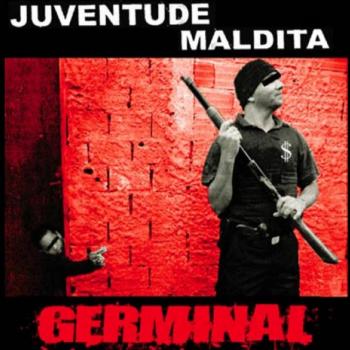
Negras,tormentas agitam os ares
Nuvens escuras não nos deixam ver
E ainda que nos esperem a dor e a morte,
Contra o inimigo nos chama o dever.
O bem mais precioso é a liberdade,
Lutemos por ela com fé e com valor!
A agitar a bandeira revolucionária
Que levará o povo à emancipação.
A agitar a bandeira revolucionária
Que levará o povo à emancipação,
De pé, companheiro, para a batalha!
Temos que derrotar a reação.
Para as barricadas! Para as barricadas!
Pelo triunfo da Revolução!
Para as barricadas! Para as barricadas!
Pelo triunfo da Revolução!
Contributed by Riccardo Venturi - 2022/10/31 - 20:16
Čierne blesky križujú oblohu
Temné mračná nás oslepujú
Hoci nás čaká bolesť a smrť
Musíme zaútočiť na nepriateľa
Najdrahšie dobro
Je sloboda
A my si ju musíme chrániť
S odvahou a vierou
Vytýčená revolučná vlajka
Dopravuje ľudí k emancipácii
Pracujúci idú do bitky
Musíme zničiť reakciu
Na barikády!
Na barikády!
Za triumf
Konfederácie
Contributed by Riccardo Venturi - 2007/10/14 - 00:27
Temné bouře třesou nebem,
černé mraky nás zaslepují.
Ačkoliv nás čeká jen bolest a smrt,
proti nepříteli musíme jít.
Nejvzácnější poklad
je svoboda,
a tu musíme bránit
s vírou a kuráží.
Pozvedněte vlajku revoluce,
která nás vede kupředu vstříc vítězství.
Pracující postupují vpřed do bitvy,
kde zničíme reakcionáře.
Na barikády!
Na barikády!
Pro vítězství
Konfederace!
Contributed by Riccardo Venturi - 2007/10/14 - 00:36
2n1. Czech version (Alternative version)
hrozí ve vzduchu,
temné mraky
zatemňují obzor,
A i když nás čeká
jen bolest a smrt,
naše povinnost
nás volá proti nepříteli.
Nejcenější
je svoboda,
bojujeme za ní
s vírou a se ctí.
Zavlají revo-
luční prapory,
které povedou
lid k osvobození.
Dělný lid
kráčí do bitvy,
je třeba pora-
zit reakci.
Na barikády!
Na barikády!
Nechť triumfuje
Konfederace.
Contributed by Riccardo Venturi - 2007/10/14 - 00:44
2n2. Czech Version (Third version)
Kindly contributed by Mr Joseph Petrowski, whom we thank heartily. [CCG/AWS Staff]
Černé blesky křižují oblohu
Temná mračna nás oslepují
Ač nás čeká bolest a smrt
Musíme zaútočit na nepřítele
Nejdražší dobro
Je svoboda
A my si ji musíme chránit
S odvahou a vírou
Vytyčená revoluční vlajka
Dopravuje lidi k emancipaci
Pracující jdou do bitvy
Musíme zničit reakci
Na barikády!
Na barikády!
Za triumf
Konfederace
Contributed by Joseph Petrowski - 2014/9/17 - 11:51
2o. Greek version*
«Η συνομοσπονδία» που αναφέρετε στο τέλος του τραγουδιού αυτού, ήταν η CNT (Confederación Nacional del Trabajo - «εθνική συνομοσπονδία της εργασίας»), που ήταν τότε το μεγαλύτερο εργατικό συνδικάτο και η κύρια οργάνωση των αναρχικών στην Ισπανία και μια σημαντική δύναμη που αντιτάχθηκε στο στρατιωτικό χτύπημα του Φρανθίσκο Φράνκο ενάντια στην ισπανική Δημοκρατία από το 1936-1939.
Μαύρες καταιγίδες σείουν τον ουρανό
Σκοτεινά σύννεφα μας τυφλώνουν
Μολονότι μας περιμένει θάνατος και πόνος
Ενάντια στον εχθρό, μας καλεί το καθήκον
Το πολυτιμότερο αγαθό
Είναι η Ελευθερία
και πρέπει να την υπερασπίσουμε
με θάρρος και πίστη.
Σηκώνοντας τη σημαία της επανάστασης
Που οδηγεί τον λαό στην χειραφέτηση
Εργαζόμενε λαέ εμπρός στη μάχη
Πρέπει να ανατρέψουμε το πραξικόπημα
Στα οδοφράγματα!
Στα οδοφράγματα!
Για τον θρίαμβο
του συνδικάτου.
Contributed by Riccardo Venturi - 2008/5/13 - 22:19
2p. Afrikaans version*
"Die Konfederasie" wat in die finale strofe van die lied na verwys word is die anargo-syndikaliste CNT (Confederación Nacional del Trabajo — Nasionale Konfederasie van Arbeiders). Die CNT was op daardie stadium die grootste vakbond in Spanje en 'n groot krag teen Francisco Franco se militêre staatsgreep teen die Spaanse Republiek van 1936-1939.
Swart storms skud die lug
Donker wolke maak ons blind
Al wag pyn en dood vir ons
Roep plig vir ons teen die vyand
Die mees kosbare waarde
is vryheid
En ons moet dit verdedig
Met geloof en moed
Verhoog die revolusionêre vlag
Wat die mense na emansipasie toe dra
Verhoog die revolusionêre vlag
Wat die mense na emansipasie toe dra
Arbeiders optog af na die geveg
Ons moet die reaksie vernietig
Na die Versperrings! Na die Versperrings!
Vir die triomf van die Konfederasie
Na die Versperringss! Na die Versperrings!
Vir die triomf van die Konfederasie
Contributed by Riccardo Venturi - 2013/1/14 - 23:55
2q1. Basque (euskara) version*
Ekaitz beltzek aireak astintzen dituzte,
laino ilunek ikustea galerazten digute,
nahiz eta mina eta heriotzak itxaroten izan,
etsairen aurka betebeharrak deitzen gaitu.
Ondarerik estimatuena askatasuna da.
fede eta ausardiaz defendatu behareko da.
Iraultza bandera altxatu,
garaipenaren atzetik etengabe eramaten baigaitu.
Iraultza bandera altxatu,
garaipenaren atzetik etengabe eramaten baigaitu.
Zutik herri langilea, borrokara!
Erreakzioa irauli beharra dago!
Barrikadetara! Barrikadetara
Konfederazioaren garaipenaren alde!
Barrikadetara! Barrikadetara
Konfederazioaren garaipenaren alde!
Contributed by Riccardo Venturi - 2013/1/15 - 00:02
2q2. Alternative Basque version*
The following Basque version, reproduced from eu.wikipedia, is made for singing. The Wikipedia page is the only source available from the Web. Some lines are stressed; stress is virtually free in Basque, a so-called isotonic language. [RV]
Ékaitza dátor zerúa ilúntzen
hodei beltzek ikusten ez dute uzten
mina ta heriotza jasan behar badére
étsaiari áurre egin garáitu arté
Áskatasúna da ondáre ederréna
défendá dezágun fedéz ta adoréz
Altxatu bandera iraultzaile hori
garaipeneraino garamatzana
Altxatu bandera iraultzaile hori
garaipeneraino garamatzana
Ékaitza dátor zerúa ilúntzen
hodei beltzek ikusten ez dute uzten
mina ta heriotza jasan behar badére
étsaiari áurre egin garáitu arté
Áskatasúna da ondáre ederréna
défendá dezágun fedéz ta adoréz
Altxatu bandera iraultzaile hori
garaipeneraino garamatzana
Altxatu bandera iraultzaile hori
garaipeneraino garamatzana
Altxá lángileok, ékin borrókari
garaitu behar da erreakzioa'
Bárrikadetára! Barríkadetára!
konfederazioak irabazi!
Bárrikadetára! Barríkadetára!
konfederazioak irabazi!
Contributed by Riccardo Venturi - 2018/4/21 - 20:40
2r. Galician version*
Negras tormentas axitan os aires
nubes escuras impídennos ver
aínda que nos espere a dor e a morte
contra o inimigo chámanos o deber
O ben máis prezado é a liberdade
hai que defendela con fe e valor
alza a bandeira revolucionaria
que do triunfo sen cesar lévanos en pos
Alza a bandeira revolucionaria
que do triunfo sen cesar lévanos en pos
en pé pobo obreiro á batalla
hai que derrotar á reacción
Ás barricadas, ás barricadas
polo triunfo da Confederación
ás barricadas, ás barricadas
polo triunfo da Confederación
Contributed by Riccardo Venturi - 2013/1/15 - 00:12
2s. Haydi barikata: Turkish version by Bandista
La versione turca preparata dal gruppo militante ska-dub e world fusion Bandista è del 2009 e apre l'album intitolato (in latino!) De te fabula narratur. I membri di Bandista, pur apparendo in pubblico, sono anonimi: una semplice questione di sopravvivenza e incolumità nella Turchia attuale. Certo è che, a differenza di tante versioni più vecchie, questa, recentissima, sulle barricate ci è finita subito: l'album, infatti, è stato registrato in Italia ed è stato distribuito gratuitamente in piazza Taksim nei mesi scorsi, durante le proteste per Gezi Park. L'ultimo album dei Bandista, Sınırsız-Ulussuz-Sürgünsüz (2010) è stato dedicato a Festus Okey, un immigrato nigeriano vittima della polizia turca. [RV]
Haydi barikata, haydi barikata,
Ekmek, adalet ve özgürlük için!
Haydi barikata, haydi barikata,
Ekmek, adalet ve özgürlük için!
Kara fırtınalar sarsıyor göğü,
Kara bulutlar kör eder gözleri,
Ölüm ve acı beklese de bizleri,
Onları yenmek için yürümeliyiz
Ve en değerli varlığımız özgürlük,
Cesaret ve inançla savunmalıyız,
Haydi barikata haydi barikata,
Ekmek, adalet ve özgürlük için,
Haydi barikata, haydi barikata,
Ekmek, adalet ve özgürlük için!
Kalplerimizde, kardeşlerimizle,
Tüm dünyada büyüyor direniş,
Haydi barikata haydi barikata,
Ekmek, adalet ve özgürlük için,
Haydi barikata, haydi barikata,
Ekmek, adalet ve özgürlük için!
Kalplerimizde, kardeşlerimizle,
Tüm dünyada büyüyor direniş,
Haydi barikata haydi barikata,
Ekmek, adalet ve özgürlük için,
Haydi barikata, haydi barikata,
Ekmek, adalet ve özgürlük için!
Haydi barikata haydi barikata,
Ekmek, adalet ve özgürlük için,
Haydi barikata, haydi barikata,
Ekmek, adalet ve özgürlük için!
Contributed by Riccardo Venturi - 2013/8/27 - 01:10
2s1. Kara Notalar ("Black Notes"): Herkes barikata
This very interesting, contemporary Turkish version of ¡A las barricadas!, contributed by Boreč / Borec / Борец (no doubt one of the keenest Warszawianka collectors in the world), originates overtly in struggling Anarchist milieus. “Kara Notalar” (“Black Notes” in Turkish) may be the name of the band performing this (also musically interesting) version, but attribution is uncertain due to understandable lack of information -being an Anarchist band might lead you into jail, and even worse, in Erdoğan's sultanate. This is also why an English translation has been provided: the song is certainly focused on the current situation in Turkey, but the everlasting spirit of the old Spanish song lingers on. [RV]
Patronsuz, efendisiz dünya için
Yürü devrim coşkusuyla bu hayat senin!
İsyanın seli tüm sokaklarda aksın
Kara yüreklerle meydanlar taşsın!
Yüreğimizde şimdi şu anda
Cesaretle büyüyor anarşi!
Herkes barikata! Herkes barikata!
Ekmek, adalet ve özgürlük için
Herkes barikata! Herkes barikata!
Ateş ve sokağın zaferi için!
For a world without bosses and masters
Walk with revolutionary enthusiasm, this life is your own!
Let the flow of rebellion spread in all the streets,
Let squares overflow with black hearts !
In our hearts right now
Anarchy is growing boldly!
Everyone to the barricade! Everyone to the barricade!
For bread, justice and freedom
Everyone to the barricade! Everyone to the barricade!
For the victory of fire and of the street!
Contributed by Boreč - 2021/10/28 - 01:49
2t. Fel a barikádra (Hungarian version
"Az egyike volt a legnépszerűbb spanyol anarcho szindikalista daloknak, a spanyol polgárháború idejéből. A Varszavianka (1905) dallamával azonos, dalszövegét Valeriano Orobón Fernández írta 1933-ban. A munkásszövetség, a CNT-t jelenti."
Ránk tört a vész fergeteg vad haragja
Rajtunk a pokol minden tüzes átka már
Végső csatának most kél fel a napja
Ki tudja mit hoz a sors milyen este vár.
Mi mégis büszke arccal nézünk előre
Visszük a proletárok vörös zászlaját
Vélünk a föld szenvedő rabszolga népe
Vélünk vív ki majd egy szabadabb jobb hazát
Előre utolsó halálos csatába
Munkások előre, most győzni kell
Fel a barikádra! Fel a barikádra!
A munkásszövetségé lesz a győzelem.
A burzsuj a munkást ma éhen halasztja,
Nem tűrjük mi ezt tovább, már nem alkuszunk,
Lássa fiunk, hogyan hal meg az apja,
Éljen bosszújában tovább haragunk.
Az eszme nevében meghalni öröklét,
Győzelmi énekké lesz nevünk.
A nép riadóra ha emeli öklét,
A nép boldog halálimája leszünk.
Előre utolsó halálos csatába
Munkások előre, most győzni kell
Fel a barikádra! Fel a barikádra!
A munkásszövetségé lesz a győzelem.
Contributed by Riccardo Venturi - 2014/1/16 - 01:04
2u. Macedonian version
Kindly contributed by mr Joseph Petrowski, whom we thank heartily. [CCG/AWS Staff]
Црни бури го тресат небото
Темни облаци нè заслепуваат
Иако смрт и болка не чека
должноста нè вика против непријателот
Најскапоценото благо
е слободата
И мора да ја браниме
Со храброст и верба
Дигни го револуционерното знаме
Кое ги носи луѓето кон еманципација
Дигни го револуционерното знаме
Кое ги носи луѓето кон еманципација
Работниот народ маршира кон битката
Мора да ја уништиме реакцијата
На барикадите! На барикадите!
За триумфот на конфедерацијата
На барикадите! На барикадите!
За триумфот на конфедерацијата.
Crni buri go tresat neboto
Temni oblaci nè zaslepuvaat
Iako smrt i bolka ne čeka
dolžnosta nè vika protiv neprijatelot
Najskapocenoto blago
e slobodata
I mora da ja branime
So xrabrost i verba
Digni go revolucionernoto zname
Koe gi nosi luģeto kon emancipacija
Digni go revolucionernoto zname
Koe gi nosi luģeto kon emancipacija
Rabotniot narod maršira kon bitkata
Mora da ja uništime reakcijata
Na barikadite! Na barikadite!
Za triumfot na konfederacijata
Na barikadite! Na barikadite!
Za triumfot na konfederacijata
Contributed by Joseph Petrowski - 2014/9/17 - 11:58
2v. Werin barîkadan (Kurdish version)
Se ne trovano diverse versioni in rete tra cui quella di Marco Rovelli, Serhat Akbal e Paolo Monti incisa nell'album "Spagna ’36, Un Sogno Che Resiste" (2018) a cura dell'Istituto Ernesto De Martino
Several version are available from the Net, i.e. by Marco Rovelli, Serhat Akbal and Paolo Monti recorded in the album "Spagna '36, Un Sogno Che Resiste" (2018) edited by Istituto Ernesto De Martino
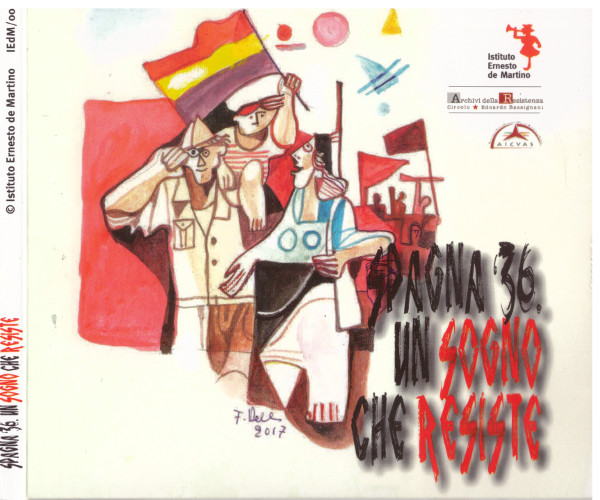
Bahozên reş hewayan dilerizînin
Ewrên tarî nahêlin em bibînin
Tevî ku mirin û zorî li benda me dibin
Bi ruha hevaltî em ê tirs derbas bikin
Azadî, xweserî û rizgariya jin
Wek pivan hejatirîn gerek bên parastin
Ala şoreşgeran em hildin azmanê
Û cîhanê nû bi destê xwe em afirînin
Ala şoreşgeran em hildin azmanê
Û cîhanê nû bi destê xwe em afirînin
Bi dil û evîn amade bin heval
Baviksalarî û dewlet dawî bikin
Werin barîkadan, werin barîkadan
Ji bo serkeftina konfederasyon!
Werin barîkadan, werin barîkadan
Ji bo serkeftina konfederasyon!
Contributed by Dq82 - 2018/4/19 - 18:22
2w. Menuju barikade (The Indonesian version)*
"A las Barricadas" ("Menuju Barikade") adalah salah satu lagu yang paling populer bagi golongan anarkis di Spanyol selama Perang Saudara Spanyol. "A las Barricadas" dinyanyikan menggunakan nada lagu Warszawianka, yang disusun oleh Józef Pławiński. Lirik lagu ini ditulis oleh Valeriano Orobón Fernández pada tahun 1936, di mana sebagian dari lirik lagu ini didasarkan pada lirik asli lagu Warszawianka berbahasa polandia yang ditulis oleh Wacław Święcicki.
Yang dimaksud dengan "Konfederasi" pada bait akhir dalam lagu ini adalah organisasi beraliran anarko-syndicalist CNT (Confederación Nacional del Trabajo — "Konfederasi Serikat Buruh Nasional"), yang pada saat itu adalah yang serikat buruh dan organisasi berideologi anarkis terbesar di Spanyol, dan menjadi salah satu kekuatan besar melawan kudeta militer yang didalangi oleh Francisco Franco terhadap Republik Spanyol dari 1936-1939."
Badai hitam mengguncang langit
Awan gelap membutakan kita
Meskipun rasa sakit dan kematian menanti kita
Tugas memanggil kita 'tuk melawan musuh
Karena hal yang paling berharga adalah kebebasan
Harus dipertahankan dengan yakin dan berani
Kibarkan bendera revolusioner
Yang membawa kita tak henti-hentinya menuju kemenangan
Kibarkan bendera revolusioner
Yang membawa kita tak henti-hentinya menuju kemenangan
Badai hitam mengguncang langit
Awan gelap membutakan kita
Meskipun rasa sakit dan kematian menanti kita
Tugas memanggil kita 'tuk melawan musuh
Karena hal yang paling berharga adalah kebebasan
Harus dipertahankan dengan yakin dan berani
Kibarkan bendera revolusioner
Yang membawa kita tak henti-hentinya menuju kemenangan
Kibarkan bendera revolusioner
Yang membawa kita tak henti-hentinya menuju kemenangan
Bangun, kaum buruh, menuju pertempuran
untuk menggulingkan reaksioner
Menuju barikade! Menuju barikade!
Untuk kemenangan Konfederasi
Menuju barikade! Menuju barikade!
Untuk kemenangan Konfederasi
Contributed by Riccardo Venturi - 2018/4/20 - 01:44
검은 폭풍이 비바람을 몰고 온다
어두운 구름을 볼 수는 없으리
하지만 우리는 고통과 죽음을 기다리고 있네
적들에 맞서 우리는 나아간다
가장 소중한 것은 자유
용기와 믿음으로써
자유를 지켜야 하네
혁명의 깃발을 높이 들자
민중은 해방을 요구한다
전선으로 행진하는 노동자
반동을 쳐부숴야 한다네
바리케이드를 향해!
바리케이드를 향해!
CNT의 승리를 위해
바리케이드를 향해!
바리케이드를 향해!
CNT의 승리를 위해
geom-eun pogpung-i bibalam-eul molgo onda
eoduun guleum-eul bol suneun eobs-euli
hajiman ulineun gotong-gwa jug-eum-eul gidaligo issne
jeogdeul-e majseo ulineun naaganda
gajang sojunghan geos-eun jayu
yong-giwa mid-eum-eulosseo
jayuleul jikyeoya hane
hyeogmyeong-ui gisbal-eul nop-i deulja
minjung-eun haebang-eul yoguhanda
jeonseon-eulo haengjinhaneun nodongja
bandong-eul chyeobuswoya handane
balikeideuleul hyanghae!
balikeideuleul hyanghae!
CNTui seunglileul wihae
balikeideuleul hyanghae!
balikeideuleul hyanghae!
CNTui seunglileul wihae
Contributed by Riccardo Venturi - 2018/4/21 - 09:50
2x1. 바리케이드를 향해 [balikeideuleul hyanghae] - Korean alternative version focused on working class struggle
투쟁의 깃발 동이 터온다
어두운 이 밤을 넘어서 가면
우리의 새세상이 열린다.
일천만 노동자 민중의 해방
일어나 앞으로 투쟁으로
동지의 피와 축제의 밤을
뭉치어 앞으로 해방으로
일천만 노동자 민중의 해방
일어나 앞으로 투쟁으로
동지의 피와 축제의 밤을
뭉치어 앞으로 해방으로 [2]
tujaeng-ui gisbal dong-i teoonda
eoduun i bam-eul neom-eoseo gamyeon
uliui saesesang-i yeollinda.
ilcheonman nodongja minjung-ui
haebang il-eona ap-eulo tujaeng-eulo
dongjiui piwa chugje-ui bam-eul
mungchieo ap-eulo
ilcheonman nodongja minjung-ui
haebang il-eona ap-eulo tujaeng-eulo
dongjiui piwa chugje-ui bam-eul
mungchieo ap-eulo
[2] Alziamo in alto la nostra bandiera
La bandiera della lotta si sta alzando
Se vai oltre questa notte oscura
Il nostro nuovo mondo si apre.
Liberazione per dieci milioni di lavoratori e persone
alzati, avanti e combatti
Il sangue dei compagni e la notte della festa
unitevi e andate avanti
Liberazione per dieci milioni di lavoratori e persone
alzati, avanti e combatti
Il sangue dei compagni e la notte della festa
unitevi e andate avanti
Contributed by Albatross795 - 2021/6/3 - 14:39
2y. Ad saepimenta! Latin version by Riccardo Venturi
a.d. IX ad kal. Maias, MMXVIII
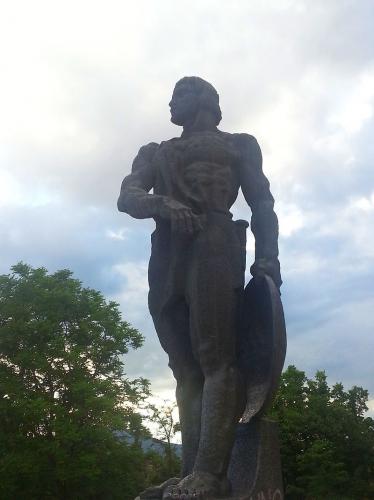
Quatiunt aërem obscurae procellae,
Atrae nubes a visu nos impediunt.
Etsi nos exspectant mors atque dolores
In inimicum nobis pugnandum est.
Valde pretiosum bonum libertas,
Strenuissime nobis defendenda est!
Extolle vexillum rerum novarum
Nos ad triumphum semper comitans.
Extolle vexillum rerum novarum
Nos ad triumphum semper comitans,
Surgamus ad pugnam, laboratores,
Ut profligemus populi inimicos.
Ad saepimenta! Ad saepimenta!
Triumphet foedus sociale nunc!
Ad saepimenta! Ad saepimenta!
Triumphet foedus sociale nunc!
2w. Norwegian version by Ohnesorg
Nattsvarte stormer de raser gjennom lufta,
Truende uværsskyer skygger for vår sikt.
Selv om smerte og død venter på oss
Går vi på mot reaksjonen, gjør vi vår plikt.
For vi eier frihetens lysende flamme,
og vi forsvarer den med håp og mot.
Det svartrøde flagget, trusselen og løftet,
fører oss fremad mot det aller siste slag.
Det svartrøde flagget, trusselen og løftet,
fører oss fremad mot det aller siste slag.
Så kom kamerater, grip deres våpen,
På kapitalens krefter gjør vi slutt.
Til barrikadene, til barrikadene!
For triumfen til vår konføderasjon.
Til barrikadene, til barrikadene!
For triumfen til vår konføderasjon.
por el triunfo de la Confederación.
¡A las barricadas! ¡A las barricadas!
por el triunfo de la Confederación.
Contributed by Dq82 - 2018/11/11 - 17:24
2z. La to dovragmāi - Kelartic version (12.8.2021)
Dedicated to GKN workers in struggle
Gedāinek la to travdārāi nă GKN in kard

Dēllāi malăn turisă to dŭmāi,
Niabāi skautig karră dărkestāi,
Ble syevastă măs horte ya mărd
Nyimŭd to niemad ekle to kard.
To dān merkittā sī to leudărdŭr,
Krāstāi braukuar săn le ya vŭr!
Libi nŭ to stende nă to părbunis
Sănsyedŭle măs in to vikunis.
Libi nŭ to stende nă to părbunis
Sănsyedŭle măs in to vikunis,
Libi ŏm travtuad, la to mahēme,
Braukuar ekslabestāi to rheme.
La to dovragmāi, la to dovragmāi
Păr to vikunis nă to Sămbundŭr!
La to dovragmāi, la to dovragmāi
Păr to vikunis nă to Sămbundŭr!
Contributed by L'Anonimo Toscano del XXI Secolo - 2021/8/12 - 17:55
2α. Op de barricade! - The Dutch version by Jaap van de Merwe (1972)
Questa potente e bellissima versione neerlandese (olandese) sia della Warszawianka che di !A las barricadas! potrebbe essere definita una “versione mista” con caratteri originali. Fu scritta nel 1972 da Jaap van de Merwe insieme a Rob van de Meeberg, Marius Monkau, Nelly Frijda e Marjan Kweksilber. E' cantata dagli stessi Jaap van de Merwe e Marjan Kweksilber. La canzone presenta un certo numero di varianti testuali, ed alcuni punti sono controversi nei testi presenti in Rete; tra le altre cose, il testo sottotitolato del video non corrisponde sempre a ciò che viene effettivamente cantato. Abbiamo così deciso di trascrivere il testo all'ascolto, con qualche nota. Il testo è scritto in una forma di olandese piuttosto arcaica e solenne, anche nella pronuncia (p.es. tutte le “-n” finali nei sostantivi e nei verbi sono pronunciate chiaramente, sebbene non lo siano nella pronuncia corrente). [RV]
Donkere stormen staan op in de wolken,
Machtige schaduw verduistert het licht.
Mogen ook kerker [1] of dood ons verbeiden,
Tegen de vijand roept maar een te plicht.
Wij heffen ter vrijheid stralende standard,
Rood als een vlam in de duistere krijt, [2]
De standard van moed, de bannier der bevrijding,
Brandt boven ons hoofd in de storm van de tijd.
Staat op tot de strijd! Bereidt u ten aanval!
Kamp [3] voor uw leven, dijn arbeidersvolk!
Op de barricade! Op de barricade! [4]
Verover de aarde, o arbeidersvolk!
Nederlag en dood aan de demon der wereld!
Lijdende mensheid bevrijdt slechts de daad.
Tegen de heersers: de stormvloed der bloeders,
Dat zij oogsten hun bloedige zaad.
Van arbeiderbloed doordrenkt deze aarde,
Geef van uw ziel voor de laatste slag:
Dat boven de rokende velden ziet rijzen
Mensheid het licht van de broederschapsdag!
Staat op tot de strijd! Bereidt u ten aanval!
Kamp voor uw leven, dijn arbeidersvolk!
Op de barricade! Op de barricade!
Verover de aarde, o arbeidersvolk!
[2] Some versions available in the Web say “krijg” in this point (“krijg” means “war”; but, though corresponding to German “Krieg”, it is not the standard word in Dutch (“oorlog”, “strijd”). “Krijg” is an old-fashioned and uncommon word in Dutch. In addition to this, “krijg” [pronounced /'krejx/) would not match the rhyme with “tijd” ['tejt]. I have preferred “krijt” here, an equally old-fashioned word for “battlefield, arena” (normally meaning “chalk” in modern standard Dutch).
[3] Var. vecht
[4] No final “-s” in pronounced in the song; so, it must be a singular form.
Contributed by Riccardo Venturi - 2021/8/15 - 10:29
2β. Ek al barikadoj - Esperanto version by Miguel Fernández Martín (2014)

La versione esperantista di Miguel Fernández Martín proviene dal suo volume Memorindaj anarkiistoj kaj anarkiisma esperantismo (Anarchici memorabili e esperantismo anarchico), pubblicato da SATeH nel 2014. Si è da allora diffusa in tutti i circoli anarchici in Spagna e in altri paesi di lingua spagnola.
The Esperanto version by Miguel Fernández Martín is included in his volume Memorindaj anarkiistoj kaj anarkiisma esperantismo (Memorable Anarchists and Anarchistic Esperantism), published by SATeH in 2014. It has since spread in all anarchist circles in Spain and other Spanish-speaking countries.
Plej nigraj ŝtormoj skuadas l’ aeron,
obskuraj nuboj nin tenas en blind’.
Eĉ se nin atendas doloro kaj morto,
la devo nin vokas kontraŭ malamik’.
Liberon ni taksas la pleja bon’.
Ni defendu ĝin kun kuraĝa fid’.
Alte flirtu nia flag’ revolucia,
ĉar al venko ĝi senĉese gvidas nin!
Alte flirtu nia flag’ revolucia,
ĉar al venko ĝi senĉese gvidas nin!
Ek, laboristaro, al la batalo,
Ek al la renverso de l’ reakci’!
Ek al barikadoj! Ek al barikadoj
por la venko de la Konfederaci’!
Ek al barikadoj! Ek al barikadoj
por la venko de la Konfederaci’!
Contributed by Борец(>◡<) - 2021/8/16 - 07:06
2γ. Վարշավյանկա [Varšavyank'a] - An image of the Armenian version
" Ho trovato i testi della versione armena della "Varšavjanka", ma la stampa è così vecchia che non riesco a leggerli affatto...
Ma...Sono sorpreso che questa canzone si sia diffusa in Asia centrale, è molto rara. "[Borec]
I found the written lyrics of the Armenian version of Varshavianka, but the printed text is so old that I cannot read it..But I am amazed that this song is known in Central Asia, it is very rare. " [Borec]
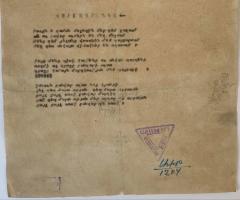
«Վարշավյանկա» /երգի տեքստ/ - Հայկական գանձարան
Contributed by Boreč - 2021/8/23 - 06:54
2δ. Svi na barikade (Serbian version by ASI)

In ultima analisi, questa versione serba è testimoniata soltanto dal sito della ASI – АСИ, la Sindikalna Konfederacija – Синдикална Конфедерација per la Anarho-Sindikalistička Inicijativa serba. Non esitiamo quindi ad attribuire il testo direttamente alla ASI. Non se ne conoscono incisioni, registrazioni o video, nonostante le pressanti ricerche effettuate. Viene qui fornito (in nota) anche il testo in alfabeto cirillico serbo.
This Serbian version is included only in the website of ASI – АСИ, the Sindikalna Konfederacija – Синдикална Конфедерација for Anarho-Sindikalistička Inicijativa in Serbia. So, we don't hesitate to directly attribute the version to ASI. Despite of long and painful research, no recording or video is known. A Serbian cyrillic version of the lyrics is provided in a note. [RV]
Mračna oluja se prolama zrakom,
Tamnim se oblacima muti naš vid!
Iako nam sutra i smrti donese,
Neslobodu zauzdati moramo mi!
Jer blago je naše sloboda sama,
A za nju se hrabro juriša!
Podignimo u vis zastavu slobode,
Osvestimo ljude njenim vihorom!
Podignimo u vis zastavu slobode,
Osvestimo ljude njenim vihorom!
U boj teški danas krećemo združno,
Sva nepravda mora nestati sad!
Svi na barikade, svi na barikade!
Uzmi svet na juriš, radni narode!
Svi na barikade, svi na barikade!
Uzmi svet na juriš, radni narode!
Мрачна олуја се пролама зраком,
Тамним се облацима мути наш вид!
Иако нам сутра и смрти донесе,
Неслободу зауздати морамо ми!
Јер благо је наше слобода сама,
А за њу се храбро јуриша!
Подигнимо у вис заставу слободе,
Освестимо људе њеним вихором!
Подигнимо у вис заставу слободе,
Освестимо људе њеним вихором!
У бој тешки данас крећемо здружно,
Сва неправда мора нестати сад!
Сви на барикаде, сви на барикаде!
Узми свет на јуриш, радни народе!
Сви на барикаде, сви на барикаде!
Узми свет на јуриш, радни народе!
Contributed by Boreč - 2021/9/27 - 13:54
2δ1. Serbian alternative version by an unknown choir ("MusicAffects Politics"?)
Il seguente video (in precedenza attribuito erroneamente alla versione anarcosindacalista serba precedente, la quale, a sua volta, era stata erroneamente attribuita alla lingua croata) riporta una versione serba alternativa eseguita da una ignota corale belgradese il 20 ottobre 2019. Nel video si sente chiaramente, durante la presentazione fatta da una corista, che questa “nostra nuova versione” è stata fatta basandosi su un testo in croato; ma la lingua della versione è serba. Peraltro, esiste comunque qua e là qualche similarità con la versione anarcosindacalista; la versione si interrompe alla terza strofa, senza le barricate. Fa parte di un canale YT intitolato MusicAffects Politics; il video è stato inserito il 21 luglio 2020, ha ottenuto 102 visualizzazioni (tra le quali, non abbiamo dubbi, la maggior parte sono le nostre...) e ben zero commenti. Sarà difficile cavarne qualcosa, ma ci proveremo comunque. Il testo non è per ora disponibile: ne ho capito diciamo un 60%, ancora troppo poco per una trascrizione all'ascolto. [RV]
Contributed by Riccardo Venturi - 2022/10/28 - 21:43
2ε. A Persian (Fârsi) version
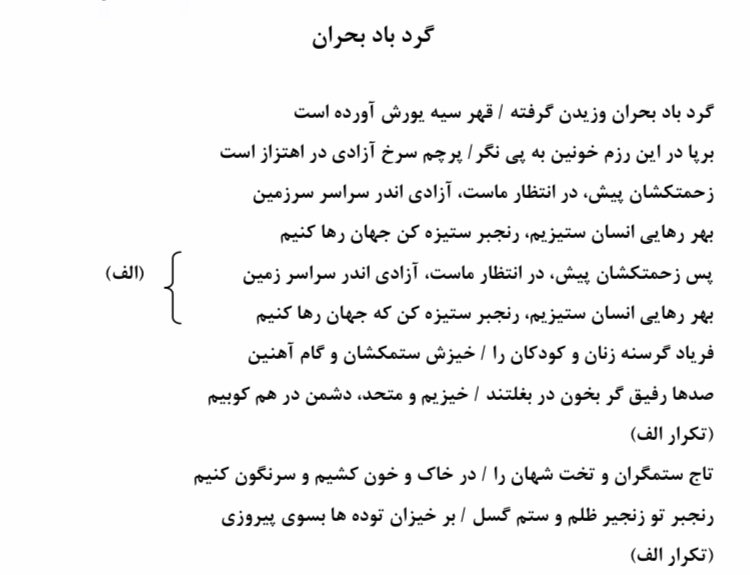
"I hadn't checked the lyrics for a long time, but I was able to properly identify the lyrics of the 2ε persian one." [Boreč]
1.
رد باد بحران وزيدن گرفته [1]
قهر سيه يورش آورده است
برپا در اين رزم خونين به پي نگر
پرچم سرخ آزادي در اهتزاز است
زحمتكشان پيش، در انتظار ماست،
آزادي اندر سراسر سرزمين
بهر رهايي انسان ستيزيم،
رنجبر ستيزه كن جهان رها كنيم
پس زحمتكشان پيش، در انتظار ماست,
آزادي اندر سراسر زمين
بهر رهايي انسان ستيزيم،
رنجبر ستيزه كن كه جهان رها كنيم
2.
فرياد گرسنه زنان و كودكان را
خيزش ستمكشان و گام آهنين
صدها رفيق گر بخون در بغلتند
خيزيم و متحد، دشمن در هم كوبيم
زحمتكشان پيش، در انتظار ماست،
آزادي اندر سراسر سرزمين
بهر رهايي انسان ستيزيم،
رنجبر ستيزه كن جهان رها كنيم
پس زحمتكشان پيش، در انتظار ماست,
آزادي اندر سراسر زمين
بهر رهايي انسان ستيزيم،
رنجبر ستيزه كن كه جهان رها كنيم
3.
تاج ستمگران و تخت شهان را
در خاك و خون كشيم و سرنگون كنيم
رنجبر تو زنجير ظلم و ستم گسل
بر خيزان توده ها بسوي پيروزي
زحمتكشان پيش، در انتظار ماست،
آزادي اندر سراسر سرزمين
بهر رهايي انسان ستيزيم،
رنجبر ستيزه كن جهان رها كنيم
پس زحمتكشان پيش، در انتظار ماست,
آزادي اندر سراسر زمين
بهر رهايي انسان ستيزيم،
رنجبر ستيزه كن كه جهان رها كنيم
Radi ʙodi ʙuhron vazidani giriftai
Qahri sijah juriş ovardaast.
Barpo dar in razmi xunin ʙa paii nigari,
Parcami surxi ozodī dar ehtizoz ast.
Zahmatkaşoni peş, dar intizori most,
Ozodii andari sarosari sarzamini,
Bahri rahoī inson sitezem,
Rançʙar siteza kun çahon raho kunem!
Pas zahmatkaşoni peş, dar intizori most,
Ozodii andari sarosari zamini,
Bahri rahoī inson sitezem,
Rançʙar siteza kun ki çahon raho kunem!
2.
Farjodi gurusnai zanonu kūdakonro,
Xezişi satmkşonu gomi ohanīni.
Sadho rafiqgar ʙxŭn dar ʙƣltndi,
Xezemu muttahid, duşman dar ham kūʙem.
Zahmatkaşoni peş, dar intizori most,
Ozodii andari sarosari sarzamini,
Bahri rahoī inson sitezem,
Rançʙar siteza kun çahon raho kunem!
Pas zahmatkaşoni peş, dar intizori most,
Ozodii andari sarosari zamini,
Bahri rahoī inson sitezem,
Rançʙar siteza kun ki çahon raho kunem!
3.
Toçi sitamgaronu taxti şahonro ―
Dar xoku xūni kaşem va sarnigūn kunem
Rançʙari tu zançiri zulmu sitami gusali
Bar xezoni tūdaho ʙasūii pirūzī!
Zahmatkaşoni peş, dar intizori most,
Ozodii andari sarosari sarzamini,
Bahri rahoī inson sitezem,
Rançʙar siteza kun çahon raho kunem!
Pas zahmatkaşoni peş, dar intizori most,
Ozodii andari sarosari zamini,
Bahri rahoī inson sitezem,
Rançʙar siteza kun ki çahon raho kunem!
Contributed by Boreč - 2021/9/22 - 04:01
2ζ. كلمات الغنّية - Arabic version (by Anarkiyeen?)
Una versione araba apparentemente “artigianale” reperita dall'infaticabile Borec/Albatross 795: nel video YouTube l'utente, dall'evocativo “nickname” di Anarkiyeen, la canta in arabo sovrapponendola all'originale spagnolo. Non sappiamo, ovviamente e purtroppo, né se egli stesso sia l'autore della versione, né se si tratti invece di una versione già esistente. Una nota presente nel video sembrerebbe avvalorare la prima ipotesi (si veda il box note). La lingua utilizzata è comunque l'arabo moderno standard. Viene fornita una traduzione inglese di massima.
An apparently “handmade” Arabic version made available by tireless Borec/Albatross 795: in the YouTube video, the user, bearing the evocatory nickname of Anarkiyeen, sings the song in Arabic superimposing his voice on the Spanish original. Sadly, and of course, we do not know whether he himself be the author of the version, or this be an already existing version. A note included in the video may confirm the first hypothesis (see note box). Anyway, the language used is modern standard Arabic. A rough English translation is provided. [RV]
وغيوم سودا وما عم نشوف شي
ومع إنّ الموت واقف بيستنّى
واجب الحرية عم بينادي.
أغلى شي بالدنيا
هيّ الحريّة
ولازم نحميها
بكل شي عندنا.
ارفعوا الأعلام، أعلام الثورة
يلّي رح بتحرر كل واحد منّا
ارفعوا الأعلام، أعلام الثورة
يلّي رح بتحرر كل واحد منّا.
الشغيلة طلعوا لحتى يحاربوا
لحتى يحطموا قوى الرجعيّة.
يلّله عالمتارس، يلله عالمتارس
مشان الخبز ومشان الحريّة
يلله عالشوارع، يلله عالشوارع
مشان الخبز ومشان الحريّة. [2]
Black clouds, and we can't see anything.
And though death is standing by me,
The duty of freedom is my companion.
The most precious thing in the world
Is freedom,
We must protect it,
We have everything.
Raise the flags, the flags of revolution
Who wants to set each one of us free?
Raise the flags, the flags of revolution,
This would set each one of us free.
The workers went out to fight
In order to break the forces of reaction.
Let's go to the barricades, let's go to the barricades
For bread and for freedom!
God is in the streets, God is in the streets
For bread and for freedom.
[2] بالنسخة الأصلية الإسبانية البيت الأخير بيقول: "مشان نصر الكونفدرالية"، لكن ارتأينا إنّ "الخبز والحرية" ملائمة أكثر للواقغ العربي حالياً.
"In the original Spanish version, the last verse says: “For the victory of the Confederation,” but we thought that “bread and freedom” is more appropriate for the Arab reality today."
Contributed by Albatross795 - 2021/11/14 - 13:47
2η. The Persian version 2ε. rendered in Tajik
"I have attempted to render the 2ε text in Tajik. Although there may be some differences with the orthography as defined in modern Tajikistan, I would like to contribute here as a source of material.
Ho cercato di rendere il testo 2ε in tagico. Anche se ci possono essere alcune differenze con l'ortografia definita nel Tagikistan moderno, vorrei contribuire qui come fonte di materiale." [Boreč]
1.
Ради боди буҳрон вазидани гирифтаи
Қаҳри сияҳ юриш овардааст.
Барпо дар ин разми хунин ба паии нигари,
Парчами сурхи озодӣ дар эҳтизоз аст.
Заҳматкашони пеш, дар интизори мост,
Озодии андари саросари сарзамини,
Баҳри раҳоӣ инсон ситезем,
Ранҷбар ситеза кун ҷаҳон раҳо кунем!
Пас заҳматкашони пеш, дар интизори мост,
Озодии андари саросари замини,
Баҳри раҳоӣ инсон ситезем,
Ранҷбар ситеза кун ки ҷаҳон раҳо кунем!
2.
Фарёди гуруснаи занону кӯдаконро,
Хезиши стмкшону гоми оҳанӣни.
Садҳо рафиқгар бхўн дар бғлтнди,
Хезему муттаҳид, душман дар ҳам кӯбем.
Заҳматкашони пеш, дар интизори мост,
Озодии андари саросари сарзамини,
Баҳри раҳоӣ инсон ситезем,
Ранҷбар ситеза кун ҷаҳон раҳо кунем!
Пас заҳматкашони пеш, дар интизори мост,
Озодии андари саросари замини,
Баҳри раҳоӣ инсон ситезем,
Ранҷбар ситеза кун ки ҷаҳон раҳо кунем!
3.
Тоҷи ситамгарону тахти шаҳонро ―
Дар хоку хӯни кашем ва сарнигӯн кунем
Ранҷбари ту занҷири зулму ситами гусали
Бар хезони тӯдаҳо басӯии пирӯзӣ!
Заҳматкашони пеш, дар интизори мост,
Озодии андари саросари сарзамини,
Баҳри раҳоӣ инсон ситезем,
Ранҷбар ситеза кун ҷаҳон раҳо кунем!
Пас заҳматкашони пеш, дар интизори мост,
Озодии андари саросари замини,
Баҳри раҳоӣ инсон ситезем,
Ранҷбар ситеза кун ки ҷаҳон раҳо кунем!
Contributed by Boreč - 2022/10/14 - 02:04
2θ Rhaeto-Romance (Romantsch Grischun) version by the Eco-Anarchist Group “Capuns e Maluns” - Val Surselva (Canton of the Grisons)
Nairas malauras agitan las arias,
Stgirs nivels ans impedeschan da vesair.
Er sch'ans spetgian il dolur e la mort,
Cunter l'inimi ans cloma il duair.
Il pli grond bain ch'avain è la libertad,
Cun curaschi avain da la defender!
Dauzian la bandiera revoluziunara
Ch'ans maina tuts a la liberaziun.
Dauzian la bandiera revoluzionara
Ch'ans maina tuts a la liberaziun!
Pievel lavurer, en pe, a la lutga!
Avain da surventscher la reaziun.
A las barricadas! A las barricadas!
Per il triumf da la Confederaziun!
A las barricadas! A las barricadas!
Per il triumf da la Confederaziun!
Contributed by Riccardo Venturi - 2022/10/25 - 21:38
2ι. Lithuanian literal translation*
Dainoje minima „Konfederacija“ – tai anarchosindikalistinė CNT (Nacionalinė darbo konfederacija), kuri tuo metu buvo didžiausia profesinė sąjunga, pagrindinė anarchistų organizacija Ispanijoje, o 1936–1939 m. buvo pagrindinė jėga, pasipriešinusi Fransisko Franko kariniam perversmui prieš Ispanijos Respubliką. - lt.wikipedia
Juodos audros drebina orą,
Tamsūs debesys apakina mus.
Nors mūsų laukia skausmas ir mirtis
Pareiga kviečia mus į kovą su priešu.
Brangiausias gėris yra laisvė,
Ją reikia ginti su tikėjimu ir drąsa!
Iškelkite revoliucinę vėliavą
Kuri mus nepaliaujamai veda triumfo link.
Iškelkite revoliucinę vėliavą
Kuri mus nepaliaujamai veda triumfo link!
Kelkitės, dirbantieji, į kovą,
Turime nuversti reakciją.
Prie barikadų! Prie barikadų!
Už Konfederacijos pergalę.
Prie barikadų! Prie barikadų!
Už Konfederacijos pergalę.
Contributed by Riccardo Venturi - 2022/10/25 - 22:30
3a. Na dzień 1 maja by “Zmogus” (1889)
È diventata l'inno della Festa del lavoro (il titolo tradotto in italiano è "Per il giorno del Primo Maggio") nella giornata della fondazione della Seconda Internazionale, a Parigi il 14 luglio 1889 .
Dziś twoje święto, ludu roboczy,
Dziś spracowane niech spoczną dłonie,
Niech w lepszą przyszłość wybiegną oczy
I żywym ogniem niech krew zapłonie.
Dzisiaj na obu świata półkulach
Motory maszyn niech sobie drzemią,
Niech pusto będzie w fabrycznych ulach
I tam w kopalniach - pod matką-ziemią.
Wiosna, jak piękne dziecię, się śmieje,
Falami blasków i zieloności
I w każdym sercu budzi nadzieję
Już niedalekiej lepszej przyszłości.
Tak, niedalekiej! - wystąp więc, ludu!
Niech solidarność moc twą podwaja!
Wyjdź, jakby jeden, ze świątyń trudu
I wypełń sobą Pierwszy dzień Maja!
Niech ludzkość widzi na własne oczy,
Niech świat od dzisiaj nie zapomina,
Że spracowany ten stan roboczy -
To jedna wielka, zgodna rodzina,
Która znękana swym losem czarnym
Budzi się, zbiera siły powoli,
Nie chcąc być zawsze kozłem ofiarnym,
Żyć w ciężkich pętach gorzkiej niedoli.
Jedna rodzina - choć z ludów wielu -
Co idzie w przyszłość pewna zwycięstwa,
Świadoma swoich sił, środków, celu -
Z mieczem przekonań i ogniem męstwa.
Niech dzień dzisiejszy będzie święcony,
Niechaj on lepszą przyszłość zagaja!
Żyjcie, robocze ludu miliony,
W dniu uroczystym Pierwszego Maja!
Contributed by Krzysiek Wrona - 2014/9/22 - 03:14
3a1. Na dzień 1 maja - Italian translation by Krzysztof Wrona (September 24, 2014)
Oggi è la tua festa, popolo di lavoratori,
E che si riposino, oggi, le mani sciupate dal lavoro,
Che gli occhi possano correre nel futuro migliore,
E che il sangue di fuoco vivo si accenda.
Che i motori dei macchinari si facciano una pennichella
Oggi in entrambi gli emisferi del mondo,
E che rimangano vuote le arnie delle fabbriche,
E anche le gallerie delle miniere là – sotto la madre terra.
Ride la primavera, come una bella bambina,
Con le onde di luce e di verde,
E nasce la speranza in ogni cuore,
Per il prossimo futuro oramai migliore.
Sì, è vicino! – fatti avanti, popolo!
Che la solidarietà raddoppi il tuo vigore!
Esci – unito – dai templi della fatica,
E riempi di te il Primo giorno del Maggio!
Che l’umanità veda con occhi propri,
Che il mondo da oggi non debba scordare
Che, strapazzata così, la classe operaia
È una grande, concorde famiglia,
La quale travagliata dalla sua sorte nera
Si sveglia, pian piano raccoglie le forze,
Non volendo essere sempre un capro espiatorio,
E vivere nei ceppi pesanti dell’amara sventura.
Una famiglia unica – anche se i popoli sono tanti –
Che va avanti, verso il futuro, sicura della vittoria,
Cosciente delle sue forze, dei mezzi, dell’obiettivo –
Con la spada della convinzioni e il fuoco dell’ardimento.
Che il giorno di oggi venga festeggiato,
Che sia un’apertura e un inizio del miglior futuro!
Vivete – i popoli dei milioni di lavoratori,
Nel giorno solenne del Primo Maggio!
Contributed by Krzysiek Wrona - 2014/9/24 - 00:30
3b. Łodzianka (1909)
La canzone racconta i fatti accaduti durante i moti rivoluzionari del 1905 nella città polacca di Łódź. Nel testo vengono nominati i cognomi dei grandi proprietari delle fabbriche tessili del posto, duramente contestati dagli operai polacchi, e del governatore russo Kaznakov. Allora Łódź si trovava sotto il governo del Regno del Congresso, uno stato vassallo sotto controllo dell'Impero russo esistito dal 1814 fino al 1915. Dopo lo sciopero degli operai tessili svoltosi nei giorni 22-24 giugno 1905, scoppiarono scontri con la polizia e l'esercito, durante i quali rimasero uccisi e feriti parecchi dei manifestanti. [KW]
Śmiało podnieśmy krwawe sztandary,
Jasną zielenią opaszmy skroń.
Otośmy pełni siły i wiary
Na bój śmiertelny chwycili broń.
O, bo to walka o wolność ludu,
Sztandar nasz krwawy — braci krew,
Droga przed nami z cierni i trudu.
Uczucia w piersi — zemsta i gniew.
Naprzód, o Łodzi, w krwawej powodzi
Poległych braci pomścić już czas,
Czas, by stanęli starzy i młodzi,
Walczyć za wolność czas, wielki czas!
Dziś, gdy nas gnębią różne Szajbiery,
Gdy majster każdy — szpicel i cham,
Gdy ufni w pomoc rządu Gajery
Pędzą łaknących pracy od bram,
Gdy z Kaznakowem Poznański w zgodzie,
Gdy razem chłoszczą: nędza i bat,
Gdy za idee w głodzie i chłodzie
Umiera ojciec, siostra i brat.
Naprzód, o Łodzi, w krwawej powodzi
Zerwijmy pęta z gnębionych mas.
Stańmy do walki, starzy i młodzi:
Czas pomścić braci poległych, czas!
Gdy setki naszych mężnych szermierzy
Poszło na Sybir do carskich turm,
Niech wstaną nowi dziś bohaterzy,
Rozdzwonią ciszę odgłosem surm.
Za szereg braci poległych w borze,
Za groby, które zbezcześcił wróg,
Zemstę przysiężmy — stańmy jak morze
I zmiećmy przemoc z dziejowych dróg!
Naprzód, o Łodzi, w krwawej powodzi
Poległych braci pomścijmy wraz,
Stańmy do walki, starzy i młodzi:
Bo przyszła chwila. Już nastał czas!
Contributed by Krzysiek Wrona - 2014/9/22 - 02:46
3b1. Łodzianka - Italian translation by Krzysztof Wrona (September 24, 2014)
Arditamente alziamo le bandiere color sangue,
Mettiamo il verde chiaro intorno alle tempie.
Ecco, essendo pieni di forza e di fede
Abbiamo impugnato le armi per una battaglia mortale.
Oh, perché è una lotta per la libertà del popolo,
Il nostro stendardo color sangue – è il sangue dei fratelli,
Davanti a noi una strada di spine e di fatiche.
I sentimenti nel petto – la vendetta e l’ira.
Avanti, oh Łódź, nell’inondazione sanguinosa,
È il tempo di vendicare i fratelli morti,
Il tempo che si fanno avanti sia vecchi che giovani,
Combattere per la libertà, è il tempo, è arrivato il tempo!
Oggi, quando ci opprimono diversi Scheibler, *1
Quando ogni caporeparto – è un spione e cafone,
Quando dei Geyer *2 fiduciosi nell’aiuto del governo
Stanno scacciando dai cancelli la gente affamata di lavoro,
Quando Kaznakov *3 e Poznański *4 fanno comunella,
Quando flagellano insieme: povertà e sferza,
Quando per le idee nella fame e nel freddo
Muoiono padre, sorella e fratello.
Avanti, oh Łódź, nell’inondazione sanguinosa,
Spezziamo le catene alle masse oppresse.
Affrontiamo la lotta, vecchi e giovani:
È il tempo di vendicare i fratelli caduti, è il tempo!
Quando centinaia di nostri valorosi lottatori
Hanno mandato in Siberia verso le galere degli zar,
Che si alzino gli eroi nuovi oggi,
Riempiono il silenzio con il suono delle zurne. *5
Per le fila dei fratelli caduti nella foresta,
Per le tombe profanate dal nemico,
La rivalsa giuriamo – alziamoci come il mare
E spazzeremo la violenza dalle strade della storia!
Avanti, oh Łódź, nell’inondazione sanguinosa,
Vendichiamoli insieme i fratelli caduti,
Affrontiamo la lotta, vecchi e giovani:
Perché è arrivato il momento, è ora già!
di Krzysztof Wrona
[1] Karl Wilhelm Scheibler, tedesco, uno degli tre grandi industriali che, insieme con [2] Emil Geyer, polacco e [4] Izrael Poznański, ebreo, venivano chiamati all'epoca "i re del cotone". La triade dei proprietari più ricchi delle fabbriche tessili di Łódź. Questi tre personaggi hanno ispirato lo scrittore polacco Władysław Reymont, che nel suo romanzo "Ziemia obiecana" (La terra promessa), pubblicato per la prima volta a puntate sulle pagine del giornale "Kurier Codzienny" negli anni 1897-1898 e dato alle stampe in forma di libro nel 1899 a Varsavia, descriveva i tempi della spietata concorrenza la quale accompagnava lo sviluppo dell'industria tessile a Łódź. Più tardi, nel 1974, il regista polacco Andrzej Wajda, basandosi sul romanzo di Reymont, ha girato la pelicola intitolata "La terra della grande promessa" (il titolo polacco è omonimo con quello del libro), uno dei caposaldi del cinema polacco della seconda metà del Novecento.
[3] Nikolaj Kaznakov, il generale governatore russo di Łódź, chiamato dagli abitanti della città "Il macelaio". Łódź si trovava allora sotto il governo del Regno del Congresso, uno stato vassallo sotto controllo dell'Impero russo.
[5] La zurna è uno strumento musicale a fiato utilizzato presso i paesi arabi. È anche chiamata surnay, birbynė, lettish horn, surla, sornai, zournas e zurma. Questo strumento tra Seicento e Settecento fu usato per le segnalazioni su campi di battaglia ed entrò a far parte delle orchestre militari polacche a seguito delle guerre con Impero ottomano. Proveniente probabilmenta dall'India o dalla Persia era conosciuto in Europa già dal XII secolo. Nella letteratura polacca citato spesso come uno strumento il cui suono dà un segnale all'attacco, alla lotta.
Contributed by Krzysiek Wrona - 2014/9/24 - 00:32
Su informazione di Francesco Senia. Cantato per la prima volta da Oreste Scalzone. La foto che segue è dedicata a Oreste.
3c. Hymn of Potere Operaio (Workers Power)
Following information by Francesco Senia. Originally sung by Oreste Scalzone, to whom the picture below is dedicated.
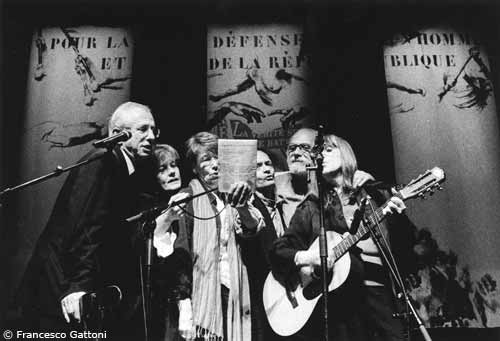
Stato e padroni non la possono fermare,
niente operai più curvi a lavorare
ma tutti uniti siamo pronti a lottare.
No al lavoro salariato,
unità di tutti gli operai
Il comunismo è il nostro programma,
con il Partito conquistiamo il potere.
Stato e padroni, fate attenzione,
nasce il Partito dell'insurrezione;
Potere operaio e rivoluzione,
bandiere rosse e comunismo sarà.
Nessuno o tutti, o tutto o niente,
è solo insieme che dobbiamo lottare,
o i fucili o le catene:
questa è la scelta che ci resta da fare.
Compagni, avanti per il Partito,
contro lo Stato lotta armata sarà;
con la conquista di tutto il potere
la dittatura operaia sarà.
Stato e padroni, fate attenzione,
nasce il Partito dell'insurrezione;
Potere operaio e rivoluzione,
bandiere rosse e comunismo sarà.
I proletari son pronti alla lotta,
pane e lavoro non vogliono più,
non c'è da perdere che le catene
e c'è un intero mondo da guadagnare.
Via dalle linee, prendiamo il fucile,
forza compagni, alla guerra civile!
Agnelli, Pirelli, Restivo, Colombo,
non più parole, ma piogge di piombo!
Stato e padroni, fate attenzione,
nasce il Partito dell'insurrezione;
Potere operaio e rivoluzione,
bandiere rosse e comunismo sarà.
Contributed by Riccardo Venturi - 2007/10/11 - 13:41
3d. Swedish feminist version from women's struggle in the 60s
Audio link to the song performed by Stockholms anarkafeministkör
Ständigt allt fler blir vi kvinnor som kämpar
kämpar mot krav och myter om hur vi ska va
kämpar mot förtrycken som råder i världen
kämpar mot kapital och patriarkat
Vi följer i spåren av kämpande systrar
kvinnor som slagits för frihetens sak
modigt och stolt i den kampen vi glöder
tågar tillsammans för att slåss för vår rätt
Vi följer i spåren av kämpande systrar
kvinnor som slagits för frihetens sak
modigt och stolt i den kampen vi glöder
tågar tillsammans för att slåss för vår rätt
Vi som har tigit nu höjs våra röster
enade nu vi stå i vårat systerskap
solidaritet är vårt starkaste vapen
solidariteten leder oss till segerns dag
Vi följer i spåren av kämpande systrar
kvinnor som slagits för frihetens sak
till barrikaderna under svarta fanor
tågar vi stolta mot vår revolution!
Vi följer i spåren av kämpande systrar
kvinnor som slagits för frihetens sak
till barrikaderna under svarta fanor
tågar vi stolta mot vår revolution!
Contributed by Riccardo Venturi - 2007/10/12 - 23:51
3e. Às arquibancadas! - Hymn of Ferroviário Atlético Clube Fortaleza Ultras
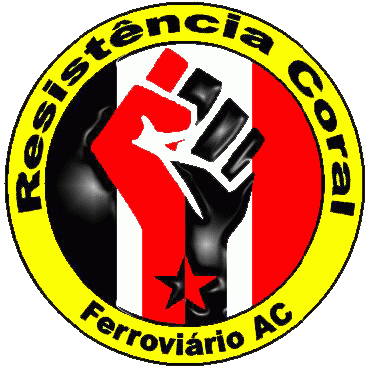
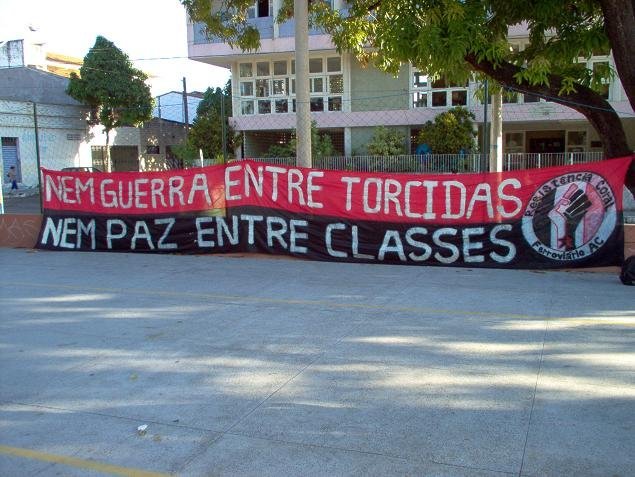
Dalla sezione "Cantos" riproduciamo la versione modificata di ¡A las barricadas! utilizzata dai suoi ultras. [RV]
Nosso time em campo dá orgulho de ver
Ainda que nos espere a vitória ou a derrota
apoiar o Ferrão é o nosso dever
O bem mais precioso é o Ferroviário
temos que defendê-lo com fé e valor
Ergue a bandeira do Ferroviário
que o triunfo virá logo depois
Ergue a bandeira revolucionária
que o triunfo virá logo depois
De pé operários à batalha
temos que derrotar a reação
Às arquibancadas, às arquibancadas
pelo triunfo do nosso Ferrão
Às barricadas às barricadas
pelo triunfo da revolução!
Contributed by Riccardo Venturi - 2007/10/13 - 03:29
3f. Anarchist version - From the album: Los Anarquistas ~ 1904-1936 - Marchas y canciones de lucha de los obreros anarquistas argentinos

Uriburu toma el poder
y clausura locales y sindicatos anarquistas.
Centenares de libertarios
son encerrados en la cárcel de Ushuaia.
Severino di Giovanni y Paulino Scarfó
son fusilados en la penitenciaría.
Años más tarde, el presidente Justo
aplicará con mano férrea
la ley de residencia.
El anarquismo en la Argentina
comienza a declinar,
y en 1936 los anarquistas del mundo entero
se darán cita en España,
para defender la República Española.
Allí, su grito de guerra será
¡A las barricadas!
y así se llamará su himno.
En Madrid, en Teruel,
en Barcelona y en el Ebro,
se desangran las columnas anarquistas
que luchan contra Franco.
Hasta que todo se acabe.
Allá,
en la guerra civil,
quedaron los mejores.
Contributed by DonQuijote82 - 2012/9/7 - 09:37
3g. Буги-вуги каждый день by Zoopark (1984) and Буги-вуги by Nol' (1990)
Testo di Michail (Mike) Naumenko/Михаи́л (Майк) Нау́менко, scritto agli inizi degli anni '80 e comparso nell'album del gruppo Zoopark/Зоопарк intitolato "Белая полоса" (1984). Il titolo originale "Буги-вуги каждый день" significa "Ogni giorno boogie-woogie".

Il testo è stato ripreso dal gruppo russo Ноль, e con il titolo abbreviato "Буги-вуги" (Boogie-woogie) viene cantato sulle note della "Warszawianka 1905 roku". La canzone è stata registrata durante un concerto del 1990 ed è presente nell'album "Школа жизни" ("Scuola di vita"). Il testo è stato trovato qui.

Субботний вечер, и вот опять
Я собираюсь пойти потанцевать.
Я надеваю штиблеты и галстук-шнурок.
Я запираю свою дверь на висячий замок.
На улице стоит ужасная жара.
Но я буду танцевать буги-вуги до утра.
Ведь я люблю буги-вуги,
я люблю буги-вуги,
Я люблю буги-вуги, я танцую буги-вуги каждый день.
Но тут что-то не так - сегодня я одинок!
И вот я совершаю телефонный звонок.
Я звоню тебе, я говорю тебе: - Привет!
Я не видел тебя сорок тысяч лет.
И если ты не знаешь, чем вечер занять,
То почему бы нам с тобой не пойти потанцевать?
Ведь ты же любишь буги-вуги,
ты любишь буги-вуги,
Ты любишь буги-вуги, ты танцуешь буги-вуги каждый день.
На дискотеке темно, мерцают огни.
Танцуем мы, и танцуют они.
И если ты устала, то присядь, но ненадолго:
В сиденьи на скамейке, право, нету толка.
Новую пластинку ставит диск-жокей.
Я приглашаю тебя потанцевать, эй-эй!
Ведь мы любим буги-вуги,
мы любим буги-вуги,
Мы любим буги-вуги, мы танцуем буги-вуги каждый день.
... буги-вуги каждый день...
Contributed by Krzysiek Wrona - 2014/9/27 - 15:48
3h. Trilingual version of "A las barricadas" (Spanish, Esperanto, French) by Jean-Marc Leclercq (JoMo, 1998)
Album: JoMo kaj Liberecanoj
Negras tormentas agitan los aires
Nubes enormes nos impiden ver
Aunque nos espera el dolor y la muerte,
Contra el enemigo nos llama el deber.
El bien más preciado es la libertad
Hay que defenderla con fe y valor
Alza la bandera revolucionaria
Que lleva el pueblo a su emancipación
A las barricadas, a las barricadas,
Por el triunfo de la Confederación.
Nigraj ŝtormegoj skuegas aerojn
Kaj grandegoj nuboj nin malhelpas vidi plu
Eĉ se nin atendas doloro kaj morto
Kontraŭ malamiko nin antaŭenpuŝas dev'
Nenio pli prezas al la Liberec'
Devas ni ĝin savi kun fid' kaj kuraĝ'
Altigu la flagon revolucieman
Sub kiu popolo marŝas al elservutiĝ'
Al la barikadoj, al la barikadoj,
Por la triumfo de la konfederaci'.
Le ciel se couvre d'énormes nuages
De sombres tempêtes nous empêchent de bien voir,
Même si la mort nous attend dans l'arène
C'est contre l'ennemi que nous appelle le devoir
Rien n'est plus fragile que la Liberté
Il faut la défendre avec courage et fierté,
C'est sous la bannière révolutionnaire
Que le peuple avance vers son émancipation,
Tous aux barricades, tous aux barricades,
Pour le triomphe de la Confédération.
Contributed by dq82 - 2017/5/15 - 12:29
3j. Version in the Bengali language by Hemanga Biswas
La versione bengalese della "Varshavianka" fu tradotta per la prima volta da Hemanga Biswas (1912-1987), ricercatore di lingue bengalesi e assamesi del Bangladesh. Si avvicinò all'ideologia del comunismo all'Università Muralichand e tradusse molte canzoni rivoluzionarie in bengalese. Fu anche il primo a tradurre in bengalese la famosissima canzone "L'Internazionale". Molte delle canzoni che scrisse erano dedicate ai lavoratori delle piantagioni di tè, ai contadini e alle classi inferiori delle aree svantaggiate e sono tuttora amate dai lavoratori. Nonostante fosse stato arrestato dalle autorità governative nel 1930 con l'accusa di ideologia politica, non si arrese e continuò a svolgere un ruolo centrale nel movimento di sinistra in Bangladesh. Morì nel 1987. In questo video, gli studenti comunisti dell'Università di Dhaka eseguono la versione bengalese della "Varshavianka" come inno a Lenin. Forse a tempo debito apparirà un testo in hindi e non sorprende che le sue canzoni siano arrivate in India, visto che un tempo era associato alla " Associazione del Teatro Popolare Indiano (ATPI)".
en.wikipedia : Hemanga Biswas
ঝঞ্ঝা ঝড় মৃত্যু ঘিরে আজি চারিদিক [1]
অন্ধকারের চক্রান্ত কঠিন
তবু সংগ্রামে চলো উদ্দাম নির্ভীক
রক্তপতাকা হাতে উরধে উড্ডীন ।
তাই সম্মুখে পদভরে মজদুর বাহাদুর
দুনিয়ার শোষিতের মুক্তিপথে
বিশ্বের মানবতার অন্তিম যুদ্ধে
চলো চলো ভেদি মরু গিরি সমুদ্দুর।।
2.
শোনো ঐ নারী শিশুর ক্ষুধার্ত ক্রন্দন
আমরা কি রব শুধু নীরব শ্রোতা
শত্রুর শিবিরে হানো হানো প্রহরণ
হোক না নিহত রনে বন্ধু ভ্রাতা।।
তাই সম্মুখে পদভরে মজদুর বাহাদুর
দুনিয়ার শোষিতের মুক্তিপথে
বিশ্বের মানবতার অন্তিম যুদ্ধে
চলো চলো ভেদি মরু গিরি সমুদ্দুর।।
3.
যত সাম্রাজ্যের শিরের মুকুট
ধূলিতলে হবে আজ অবনত
বিশ্বের অধিকারী শ্রমজীবি সন্তান
মানুষের মুক্তির দিন আগত।।
তাই সম্মুখে পদভরে মজদুর বাহাদুর
দুনিয়ার শোষিতের মুক্তিপথে
বিশ্বের মানবতার অন্তিম যুদ্ধে
চলো চলো ভেদি মরু গিরি সমুদ্দুর।।
Jhañjhā jhaṛa mr̥tyu ghirē āji cāridika
Andhakārēra cakrānta kaṭhina
Tabu saṅgrāmē calō uddāma nirbhīka
Raktapatākā hātē uradhē uḍḍīna.
Tā'i sam'mukhē padabharē majadura bāhādura
Duniẏāra śōṣitēra muktipathē
Biśbēra mānabatāra antima yud'dhē
calō calō bhēdi maru giri samuddura.
2.
Śōnō ai nārī śiśura kṣudhārta krandana
Āmarā ki raba śudhu nīraba śrōtā
Śatrura śibirē hānō hānō praharaṇa
hōka nā nihata ranē bandhu bhrātā.
Tā'i sam'mukhē padabharē majadura bāhādura
Duniẏāra śōṣitēra muktipathē
Biśbēra mānabatāra antima yud'dhē
calō calō bhēdi maru giri samuddura.
3.
Yata sāmrājyēra śirēra mukuṭa
Dhūlitalē habē āja abanata
Biśbēra adhikārī śramajībi santāna
mānuṣēra muktira dina āgata.
Tā'i sam'mukhē padabharē majadura bāhādura
Duniẏāra śōṣitēra muktipathē
Biśbēra mānabatāra antima yud'dhē
calō calō bhēdi maru giri samuddura.
Contributed by Albatross795 - 2021/6/3 - 14:53
3k. An Indonesian version as a struggle song
Badai yang ganas menutupi kita, [1]
kekuatan gelap menindaskan kita.
Walau nasib kita tidak tertentu,
nantinya pasti kita akan menang!
Maju kedepan, adil dan benar,
Ayo berjuang berbaris semua!
Banyak orang yang sedang menderita,
Mengapa hal — hal ini diabaikan?
Apakah kita akan menerima,
Jika masalah ini dibiarkan.
Maju kedepan, adil dan benar,
Ayo berjuang berbaris semua!
A fierce storm covers us,
Dark forces oppress us.
Although our fate is uncertain,
We will definitely win!
Moving forward, just and right,
Let's fight, everyone in line!
Many people are suffering,
Why are these things ignored?
Shall we accept all this
If this problem is left?
Moving forward, just and right,
Let's fight, everyone in line!
Contributed by akoniet - 2021/7/9 - 07:29
3l. Salvo el poder - The version of Partido Comunista del Perú por el Sendero Luminoso de Mariátegui
se quiebra un viejo orden de opresión
y en la montaña un relámpago de fuego
hiende la noche con su gran puñal
y en la montaña un relámpago de fuego
hiende la noche con su gran puñal
Se agitan los mares la tormenta arrecia
y en el gran desorden se levanta el Sol
salvo el poder todo es ilusión
asaltar los cielos con la fuerza del fusil
salvo el poder todo es ilusión
asaltar los cielos con la fuerza del fusil
Obreros campesinos rompan sus cadenas
levanten la bandera de la Guerra Popular
salvo el poder todo es ilusión
asaltar los cielos con la fuerza del fusil
salvo el poder todo es ilusión
asaltar los cielos con la fuerza del fusil
Partido Comunista conduce a nueva vida
se esfuma como el humo la duda, el temor
tenemos la fuerza es nuestro el futuro
Comunismo es meta y será realidad
tenemos la fuerza es nuestro el futuro
Comunismo es meta y será realidad
Salvo el poder todo es ilusión
asaltar los cielos con la fuerza del fusil
salvo el poder todo es ilusión
asaltar los cielos con la fuerza del fusil
Everything but Power
Centuries drown, idols fall
an old order of oppression is collapsing
and on the mountain a lightning bolt of fire
splits the night with its grand dagger
and on the mountain a lightning bolt of fire
splits the night with its grand dagger
The seas are storming, the tempest is growing stronger
and in the great disorder the Sun rises
everything but power is illusion
assault the skies with the force of rifle
everything but power is illusion
assault the skies with the force of rifle
Peasant workers break their chains
they raise the flag of the People's War
everything but power is illusion
assault the skies with the force of rifle
everything but power is illusion
assault the skies with the force of rifle
The Communist Party leads to a new life
doubt and fear fade like smoke
we have the strength, this is our future
Communism is goal that will become a reality
we have the strength, this is our future
Communism is goal that will become a reality
Everything but power is illusion
assault the skies with the force of rifle
everything but power is illusion
assault the skies with the force of rifle
Contributed by Albatross795 - 2021/8/7 - 01:57
3m. סער הרשע ("The Storm of Evil") - An Hebrew version as workers' struggle song
1. [2]
סַעַר הָרֶשַׁע יֵילִיל עַל רָאשֵׁינוּ
כֹּחַ הָאֹפֶל – יִשְׁחַק כַּבַּרְזֶל
קְרָב אַחֲרוֹן נֶאֱסֹר עַל אוֹיְבֵינוּ
עוֹד גּוֹרָלֵנוּ יְכַס עֲרָפֶל
הָנִיפוּ דִּגְלֵנוּ, דִּגְלֵנוּ הָנִיפוּ
אַל חִיל אַל מֹרֶךְ,
אַחִים נִתְעוֹדֵד.
תֶּחֱזַקְנָה יָדֵינוּ,
יִשַּׁר מִפְעָלֵנוּ
הָלְאָה קָדִימָה –
הָעָם הָעוֹבֵד.
2.
מֵת בָּרָעָב הַפּוֹעֵל בְּיָמֵינוּ.
הַאִם נַחֲרִישָׁה אַחִים וְנִדֹּם?
אֶת הָעֵינַיִם, עֵינֵי גִּבּוֹרֵינוּ,
הַאִם לְהַחְרִישׁ יוּכַל הַגַּרְדֹּם?
הָנִיפוּ דִּגְלֵנוּ, דִּגְלֵנוּ הָנִיפוּ
אַל חִיל אַל מֹרֶךְ,
אַחִים נִתְעוֹדֵד.
תֶּחֱזַקְנָה יָדֵינוּ,
יִשַּׁר מִפְעָלֵנוּ
הָלְאָה קָדִימָה –
הָעָם הָעוֹבֵד.
הָנִיפוּ דִּגְלֵנוּ, דִּגְלֵנוּ הָנִיפוּ
אַל חִיל אַל מֹרֶךְ,
אַחִים נִתְעוֹדֵד.
תֶּחֱזַקְנָה יָדֵינוּ,
יִשַּׁר מִפְעָלֵנוּ
הָלְאָה קָדִימָה –
הָעָם הָעוֹבֵד.
sa'àr harèsha' eylìl 'al rashèynu,
kòakh haòfel – yishkhàk kabarzèl
krav akharòn neesòr al oyvèynu
od goralèynu eykhàs 'arafèl
anìfu diglèynu, diglèynu anìfu
'al khil 'al mòrekh
akhìm nitorèd,
tekhezàkna yadèynu,
yishàr mifalèynu
hàla kadìma -
ha'àm ha'ovèd
met bara'àv hapo'èl beyamèynu,
hàyim nakhrìsha akhìm vanidòm?
Et haeynàyim, 'eynèy giborèynu,
haìm lehàkhrish yukhàl hagardòm?
anìfu diglèynu, diglèynu anìfu
'al khil 'al mòrekh
akhìm nitorèd,
tekhezàkna yadèynu,
yishàr mifalèynu
hàla kadìma -
ha'àm ha'ovèd
anìfu diglèynu, diglèynu anìfu
'al khil 'al mòrekh
akhìm nitorèd,
tekhezàkna yadèynu,
yishàr mifalèynu
hàla kadìma -
ha'àm ha'ovèd
[2] Though highly unusual, Borec has also provided an interesting Cyrillic transcription of the Hebrew lyrics:
1.
саар арэша еилил ал рашэину
коах аофэл – йишхак кабарзэл
крав ахарон нээсор ал ойвэину
од горалэну ехас арафэл
анифу диглэну, диглэну анифу
ал хил ал морэх,
ахим нитодэд.
тэхэзакна ядэину,
йишар мифалэну
ола кадима –
аам аовэд.
2.
мэт бараав апоэл бэямэину.
аим нахариша ахим вэнидом?
эт аэинайим, эинэи гиборэину,
аим лэахриш юхал агардом?
анифу диглэну, диглэну анифу
ал хил ал морэх,
ахим нитодэд.
тэхэзакна ядэину,
йишар мифалэну
ола кадима –
аам аовэд.
анифу диглэну, диглэну анифу
ал хил ал морэх,
ахим нитодэд.
тэхэзакна ядэину,
йишар мифалэну
ола кадима –
аам аовэд.
Contributed by Boreč ( ̄∀ ̄) - 2021/8/16 - 07:02
3n. Avanti, compagni, uniti alla lotta! - Anthem of the Italian Workers' Communist Party
Written by Simone Raul Luraghi and sung by Margherita Valtorta.
Avanti, compagni, uniti alla lotta!
La nostra rivolta non la possono fermar:
donne e migranti, studenti e operai
un solo fronte e siamo pronti a lottare!
La vostra crisi non la paghiamo.
Il vostro potere noi lo disconosciamo.
Il comunismo è il nostro programma,
con i consigli prenderemo il potere.
Compagni, avanti, è la nostra ora!
Marcia il partito della rivoluzione:
Partito comunista dei lavoratori;
bandiera rossa e comunismo sarà.
2.
Basta inganni, no ai compromessi:
i nostri nemici noi abbiamo da affrontar.
Coi comunisti, o coi traditori:
questa è la scelta che ognuno ha da fare.
Via dalle guerre dell’imperialismo
resistenza contro ogni fascismo
tutti gli oppressi son nostri fratelli
mai più razzismo siamo un’unica classe
Compagni, avanti, è la nostra ora!
Marcia il partito della rivoluzione:
Partito comunista dei lavoratori;
bandiera rossa e comunismo sarà
3.
Avanti, compagni, uniti alla lotta!
Governo e padroni noi non li vogliamo più.
Non c’è da perdere che le catene;
e c’è un intero mondo da guadagnare.
Non più oppressori, né sfruttatori;
la dignità per tutti i lavoratori;
liberi e uguali, senza frontiere;
un nuovo mondo, una nuova società.
Compagni, avanti, è la nostra ora!
Marcia il partito della rivoluzione:
Partito comunista dei lavoratori;
bandiera rossa e comunismo sarà
Compagni, avanti, è giunta l’ora:
marcia con noi la rivoluzione;
ovunque si leva l’Internazionale
bandiera rossa e comunismo sarà
Contributed by Albatross795 - 2021/8/13 - 15:06
3o. The Россиянка [Rossiyanka] (1906/1907)
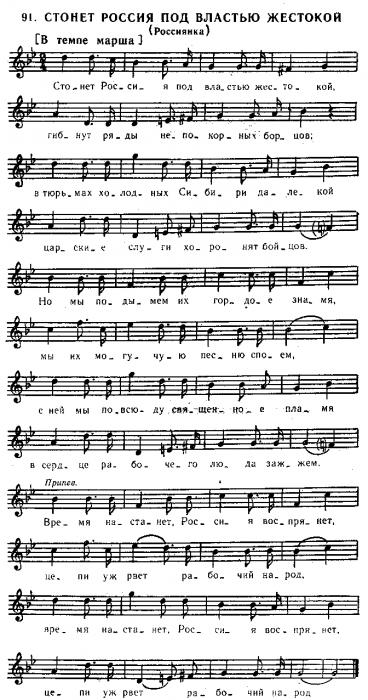
100 песен русских рабочих / Сост., вступит. статья и коммент. П. Ширяевой; Общ. ред. П. Выходцев. Л., Музыка, 1984 , trad. RV
100 песен русских рабочих / Сост., вступит. статья и коммент. П. Ширяевой; Общ. ред. П. Выходцев. Л., Музыка, 1984
(Стонет Россия под властью жестокой)
1.
Стонет Россия под властью жестокой,
Гибнут ряды непокорных борцов;
В тюрьмах холодных Сибири далекой
Царские слуги хоронят бойцов.
Но мы подымем их гордое знамя,
Мы их могучую песню споем,
С ней мы повсюду священное пламя
В сердце рабочего люда зажжем.
Россия воспрянет.
Цепи уж рвет
Рабочий народ.
Время настанет,
Россия воспрянет.
Цепи уж рвет
Рабочий народ.
2.
Наша борьба и свободное слово
К славному бою подымет народ.
Русь встрепенется от сна векового
И заржавевшие цепи порвет.
И разнесем мы своими руками
Трон опозоренных русских царей,
Трон, охраняемый только штыками
И убаюканьем звона цепей.
Россия воспрянет.
Цепи уж рвет
Рабочий народ.
Время настанет,
Россия воспрянет.
Цепи уж рвет
Рабочий народ.
3.
Настанет пора, на развалинах черных
Встанет свобода, засветит любовь.
Больше не будет тиранов позорных,
Больше не будет рабов и господ.
Дальше ж несите их красное знамя,
Песней могучей будите народ.
Каждое слово священное пламя
В сердце рабочего люда зажжет.
Россия воспрянет.
Цепи уж рвет
Рабочий народ.
Время настанет,
Россия воспрянет.
Цепи уж рвет
Рабочий народ.
Contributed by Boreč (T ^ T) - 2021/8/13 - 15:48
3p. The “Izhevite Song” (Песня ижевцев” by Nikolay Arnold (1918)
Порваны цепи кровавого гнета,
Гневно врага уничтожил народ.
И закипела лихая работа:
Ожил рабочий и ожил завод.
Молот заброшен, штыки и гранаты
Пущены в ход молодецкой рукой.
Чем не герои, и чем не солдаты
Люди, идущие с песнями в бой!..
Люди, влюбленные в светлые дали,
Люди упорства, отваги, труда,
Люди из слитков железа и стали,
Люди, названье которым «руда».
Кто не слыхал, как с врагами сражался
Ижевский полк под кровавой Уфой?
Как с гармонистом в атаку бросался,
Ижевец — русский рабочий простой…
Годы пройдут, на Отчизне свободной
Сложится много красивых баллад,
И не забудется в песне народной,
Ижевец, истинный русский солдат…
Contributed by Albatross795 - 2021/8/13 - 15:33
3q. Пробил час грозный избавленья ("The terrible hour of revenge has come") [1905]
Пробил час грозный избавленья,
Призывом к битве прозвучал
И нас зовет на бой, на мщенье
За пролетарский идеал.
Разрушим дотла вековые преграды!
Сбросим позорные рабства оковы!
На баррикады! На баррикады!
Грозно поднимем мы сильные руки,
Злобу отточим, как острый кинжал.
Враз отомстим за тяжелые муки
Всем, кто нас грабил, кто нас угнетал.
Прочь, тунеядцы, дрожите, тираны!
Грозный восставший рабочий идет!
Вам не сломить этой силы титана,
Прочь же царей и мертвящий весь гнет!
Красное знамя борьбы перед нами
Веет по ветру и кровью горит.
Стройся, товарищ, право за нами!
Смерть палачам, кто гнетет и царит!
Contributed by Boreč (T ^ T) - 2021/8/13 - 15:45
3r. Порваны цепи кровавого гнета - The "White Varshavjanka" (1918-19)
Another song from the Izhevsk-Votkinsk uprising of 1918-19, which tied up with the “White” counter-revolution. As you can see, Varshavianka had become totally bipartisan due to its huge popularity. As a matter of fact, this version is an alternative version of the Izhevite Song, and is known as the “White Varshavjanka”. [RV]
Порваны цепи кровавого гнета,
Гневно врага уничтожил народ,
И закипела лихая работа:
Ожил рабочий, и ожил народ!
Молот заброшен, штыки и гранаты
Пущены в ход молодецкой рукой.
Чем не герои, чем не солдаты –
Люди, идущие с песнями в бой?!!
Люди, влюбленные в светлые дали,
Люди упорства, отваги, труда,
Люди из слитков железа и стали,
Люди, названье которым — руда!
Кто не слыхал, как с врагами сражался
Ижевский полк под кровавой Уфой?
Как с гармонистом в атаку бросался
Ижевец — русский рабочий простой?!!
Годы пройдут над отчизной свободной,
Сложится много красивых баллад,
Но не забудется в песне народной
Ижевец – истинный русский солдат.
Вспомним же, братцы, как полк наш сражался,
Ижевский полк под кровавой Уфой,
Как с гармонистом в атаку бросался
Ижевец — русский рабочий простой...
Contributed by Борец(>◡<) - 2021/8/13 - 15:43
3s. Стонет страна под диктаторским гнётом: An anti-Stalinist version (from the '30s?)
Деспот кровавый всем гибель куёт;
Залита родина кровью и потом,
Гибнет под игом великий народ.
Смело вперёд, великий народ!
В битву за волю, за лучшую долю,
Марш-марш вперёд, российский народ!
Знай, самозванец безжалостный Сталин,
Знайте, мучители русской земли,
Лучших сынов вы цепями сковали,
Мысли свободной сковать не с могли.
Смело вперёд, великий народ!
В битву за волю, за лучшую долю,
Марш-марш вперёд, российский народ!
Contributed by Albatross795 - 2021/9/6 - 14:08
3t. Ecoterrorist: A las barricadas
Giftige Wolken verdunkeln das Licht
Mag uns auch Knast und die Krätze erwarten
Zerstörung und Ausbeutung wollen wir nicht
Auf auf meine Freunde, steigt of die Bäume
Wir machen Schluss mit der Rodungssaison
Auf die Barrikaden, auf die Barrikaden
Für die anarchistische Revolution
Auf die Barrikaden, auf die Barrikaden
Für die anarchistische Revolution
Für Freiheit und Wildheit, Geschwisterlichkeit
Steht auf unseren Fahnen in Schwarz und Grün
Die Farben des Waldes, des Zorns und der Liebe
Schwarz-grüne Fahnen der Emanzipation
Die Farben des Waldes, des Zorns und der Liebe
Schwarz-grüne Fahnen der Emanzipation
Schüchterne Menschen, erkennt eure Stärken
Befreit auch aus der Isolation
Haltet fest zusammen, haltet fest zusammen
Für die anarchistische Revolution
Haltet fest zusammen, haltet fest zusammen
Für die anarchistische Revolution
Poisonous gas clouds darken the sun
May we be awaiting prison and the scabies
Destruction and exploitation, we will not accept
Go on, my friends
Climb the trees
We'll put and end to the clearing season
To the barricades, to the barricades
For the anarchist revolution
To the barricades, to the barricades
For the anarchist revolution
For freedom and wildness, siblinghood
Say our flags in black and green
The colours of the forest, anger, and love
Black-green flags of emancipation
The colours of the forest, anger, and love
Black-green flags of emancipation
Diffident people, recognize your strengths
Free yourselves from the isolation
Hold together tightly, hold together tightly
For the anarchist revolution
Hold together tightly, hold together tightly
For the anarchist revolution.
Contributed by Albatross795 - 2021/9/11 - 04:04
3u. အတားအဆီးများဆီသို့ ("Against the Obstacles") - Burmese version
"This Burmese version of the "Warshavianka" has been probably sung during Myanmar students' struggle in 2015. It is used now as a revolutionary song by Myanmar's democratic resistance movement." [Borec]
အရက်စက်ဆုံးအင်အားသုံး ဖိနှိပ်ကာနေသလေ။
ထောင်တန်းများကတို့ကိုစောင့်ကြိုနေတယ်ဟေ။
အန္တရာယ်ရန်စွယ်အမျိုးမျိုးနဲ့ တားဆီးလို့နေပစေ။
တို့များအားလုံးပေါင်းစည်းခြင်းနဲ့ ဖြိုခွင်းပစ်မလေ။
အရက်စက်ဆုံးအင်အားသုံး ဖိနှိပ်ကာနေသလေ။
ထောင်တန်းများကတို့ကိုစောင့်ကြိုနေတယ်ဟေ။
အန္တရာယ်ရန်စွယ်အမျိုးမျိုးနဲ့ တားဆီးလို့နေပစေ။
တို့များအားလုံးပေါင်းစည်းခြင်းနဲ့ ဖြိုခွင်းပစ်မလေ။
မတရားတဲ့အမိန့်ဟူသမျှ ရဲရဲဆန့်ကျင်ကြ။
အန္တရာယ်မျိုးစုံအတားအဆီးတွေ ရင်ဆိုင်မလေ။
တော်လှန်အလံတွေလွှင့်ကြ ရဲရဲတောက်ဆန့်ကျင်ကြ။
ဘယ်တော့မှအဆုံးမသတ်တဲ့တော်လှန်ရေး။
တော်လှန်အလံတွေလွှင့်ကြ ရဲရဲတောက်ဆန့်ကျင်ကြ။
ဘယ်တော့မှအဆုံးမသတ်တဲ့တော်လှန်ရေးတဲ့ဟေ့။
လုပ်အားစိုက်ထုတ်သူများ တိုက်ပွဲအတွင်းသို့လာကြ။
တန်ပြန်ဆန့်ကျင်မှုများကို ရင်ဆိုင်မလေ။
နံရံတွေကိုချိုးဖျက် အတားအဆီးအားလုံးကျော်ဖြတ်။
ဘယ်တော့မှအဆုံးမသတ်တဲ့ တော်လှန်ရေး။
နံရံတွေကိုချိုးဖျက် အတားအဆီးအားလုံးကျော်ဖြတ်။
ဘယ်တော့မှအဆုံးမသတ်တဲ့တော်လှန်ရေးတဲ့ဟေ့။
Stanno opprimendo con la forza più brutale,
E io ti sto aspettando in prigione.
Evita ogni tipo di pericolo,
Uniamoci tutti e distruggiamoli.
Stanno opprimendo con la forza più brutale,
E io ti sto aspettando in prigione.
Evita ogni tipo di pericolo,
Uniamoci tutti e distruggiamoli.
Opponiti coraggiosamente a tutti gli ordini ingiusti,
Affronta vari pericoli e ostacoli.
Alza bandiere rivoluzionarie e osa opporti,
E' una rivoluzione che non finisce mai.
Alza bandiere rivoluzionarie e osa opporti,
La rivoluzione non finisce mai.
Gli operai entrano in lotta,
Non affrontarli, non opporti a loro.
Rompi i muri e supera tutti gli ostacoli,
E' una rivoluzione che non finisce mai.
Rompi i muri e supera tutti gli ostacoli,
La rivoluzione non finisce mai.
Contributed by Boreč - 2021/10/9 - 15:44
3v. یک صف شویم ("Let's line up") - Persian version as workers' struggle song
1.
يک صف شویم، یک صدا، با هم چنان
دشمن بلرزد ز نظم سر خمان
از مرگ و از رنج و سختی راهمان
هرگز نبوده وحشت و باکمان
در زیر بار کار، خم شده کمر ها
زنجیر رنج و محنت رها کنیم
اینک به هر جا ز فریاد خود، ما
آواز سرخ کارگر پراکنیم
2.
جز تکه نانی بدستان کارگر
چیزی نماند ز زحمتش ولی
سرمایه داران بدو شش کشند اگر
در راه بهره باشد مشکلی
در اوج رنج و کار ، همواره یک شعار
گل کرده و شکفته در دهانمان
تنها به قهر تفنگ می توان شکست
این نظم کهنه پوسیده در جهان
Contributed by Boreč - 2021/10/20 - 11:41
3w. Tofani şoriş - A Soranî Kurdish version performed by Kalle Ateshi
Tofani şoriş, performed by Kalle Ateshi (Kale Ateşi), is a Kurdish song originating from Syria and probably focused on Kurdish resistance. Kurdish in normally written in Arabic (Soranî) character; “Soranî” means “Syrian”. The lyrics are included in the video. [RV]
Boreč - 2021/10/28 - 01:50
3x. Italian version as Partisan song
The song is no true (= translated or adapted) version of the Warszawianka, but appears to be clearly a Partisan song to the tune of the Warszawianka (or rather, of A las barricadas! - many Italians had fought in the Spanish civil war and they no doubt knew the song in that form). Its form as an “Alpine choir” is also a sign, because most of the Italian partisan war took place in mountainous areas of Northern Italy under Nazi occupation. No further information on the song is available at present; I have transcribed the lyrics as they are sung and provided an English translation. Research is going on. [RV]
E muove a ranghi ben serrati incontro a noi,
Noi affrontiamo uniti la sorte,
Nostra speranza è libertà, libertà!
Pronti alla lotta, pronti a morire,
Giusta è la causa e nostro è l'avvenire!
Dunque, all'armi, fratello che soffri,
Presto la luce splenderà!
Ma se, ben triste destino, la patria,
Dallo straniero calpestata ancor sarà,
Noi solidali combatter sapremo,
Per conquistare ancora la libertà!
Pronti alla lotta, pronti a morire,
Giusta è la causa e nostro è l'avvenire!
Dunque, all'armi, fratello che soffri,
Presto la luce splenderà! Splenderà!
Pronti alla lotta, pronti a morire,
Giusta è la causa e nostro è l'avvenire!
Dunque, all'armi, fratello che soffri,
Presto la luce splenderà! Splenderà!
And moves against us in serried ranks,
We face our destiny together, united,
Our hope is Liberty, Liberty !
Ready to fight, ready to die,
Right is our cause, the future belongs to us!
So, to arms!, you, suffering brother,
Soon the light will shine!
But should the invaders, by misfortune,
Still oppress our beloved fatherland,
We shall be ready to fight united
To regain our Liberty!
Ready to fight, ready to die,
Right is our cause, the future belongs to us!
So, to arms!, you, suffering brother,
Soon the light will shine! Will shine!
Ready to fight, ready to die,
Right is our cause, the future belongs to us!
So, to arms!, you, suffering brother,
Soon the light will shine! Will shine!
Contributed by Borec + RV - 2021/10/30 - 14:39
3y. A las barricadas - Indonesian rap version by Rebelnation Indo
Rebelnation Indo · Donal Zee · Reyza Bima
Dall'album Kata adalah senjata, titolo inequivocabile: “Le parole sono armi” in lingua indonesiana. L'album è del 2020: una versione rap (poteva essere diversamente?) dove si dice fra le altre cose (2a strofa): “Per noi non c'è guerra ma guerra di classe...finché l'anima è libera, nessuno è oppresso” (una traduzione completa di un testo rap in indonesiano, sono sincero, non mi sento proprio di farla). Comunque una piccola nota testuale: nel testo, la frequente dicitura “yg” è l'abbreviazione stile messaggino SMS della comunissima particella malese-indonesiana yang (che ha funzione connettiva e relativa). [RV]
From the album Kata adalah senjata, an unequivocal title: “Words are weapons” in Indonesian. The album is from 2020: a rap version (could it be otherwise?) saying among other things: “There's no war for us, there's class war...as long as the soul is free, no one is oppressed” (I'm honest, I don't feel like translating a whole rap text in Indonesian). Anyway, here's a small note: when you often see “yg” in the lyrics, this is the common SMS-style abbreviation of the Malay-Indonesian connecting particle yang (which has relative function). [RV]
Meskipun angkasa berjelaga kami terjaga
Menjaga nyala api yg tersimpan dalam dada
Menolak jackal menjagal jelata jadi tumbal
Di altar pesugihan dari para pemodal
Ku nujum merata aspal sikat sekat pembatas
Bagi kami tak ada perang selain perang kelas
Hingga jiwa terbebas tak ada yg tertindas
Merdeka sepenuhnya bukan hanya sebatas; "kata"
Kataku merambat semesta tak bisa diredam
Serupa phoenix yang terbakar lahir kembali dan
Melawan lagi, berkali, akan terus berulang
Tak kan pernah lelah angkat kepalan dan berjuang
Setiap peluang ambil alih, dan meronta kekang
Melawanlah sebelum senjata mereka kokang
Setiap pembangkang melawan, mencari haknya
Menolak tunduk dongakkan kepala dihadapannya
Awan gelap menghalangi kita melihat
Meski sakit dan kematian menunggu kita
Melawan musuh tugas kita telah memanggil
[ R B ] :
Berdirilah tegap walau lencana tak dipundak
Tetaplah melawan meski perang belum berpihak
Serahkan, jiwa perjuangan untuk teror
mereka yang bersulang dengan slogan kemerdekaan
Jangan lah terbuaikan! jangan mau dibungkam.
Serukan dan kobarkan lantang semangat perjuangan
Meski ini perang yang tak pernah kita menangkan
namun angkatlah kepalan tolak mentah penindasaaan
Kebebasan adalah suatu kebajikan
Tanpa perlu perantara dia siap tuk meyakinkan
Pasang keberanian dan lekatkan di dada
Jangan biarkan darah tertumpah lagi depan mata
Siapkan sejuta martir melawan konspirasi!
Bila takdir sebut janji, lekas tagih kembali
Bangkitkan nurani diri janganlah hanya bersembunyi
Kembali menari berapi dan kokohlah berdiri!
Perjuangkan yakin dengan keberanian
Berkibarlah bendera, bendera revolusi
Semoga kemenangan menjadi milik kita
Contributed by Albatross795 - 2021/11/8 - 13:57
3z. SAT-Marŝo - March of Sennacieca Asocio Tutmonda (World Non-national Association)
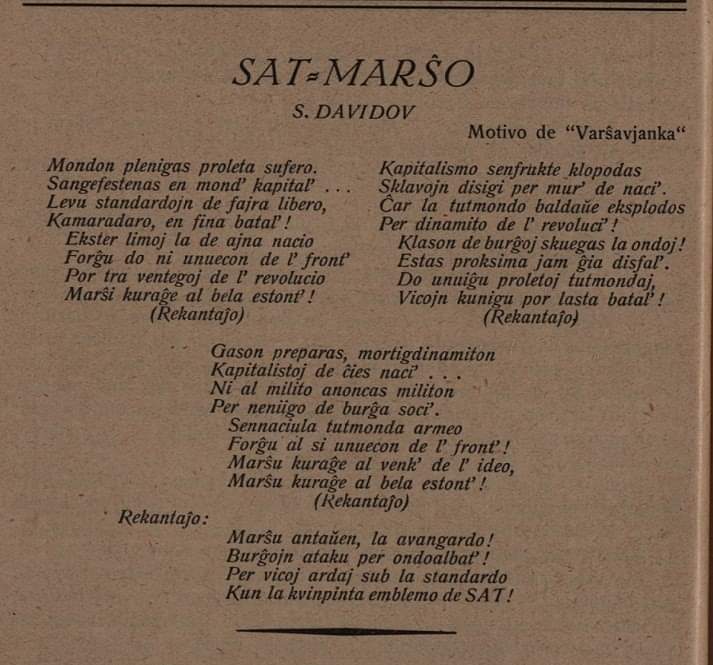
It’s aim is to help people from many different countries to understand each other, get informed and educated, improve their lives, and to communicate and cooperate with each other in the fight against oppression.
To enable such communication and cooperation, SAT uses the international language ESPERANTO.
SAT puts its members in direct contact with other progressive people from all around the world, it encourages the swapping of information, the comparison of ideas and enables the creation of a real functioning international solidarity.
1.
Mondon plenigas proleta sufero.
Sangefestenas en mond’ kapital’…
Levu standardojn de fajra libero,
Kamaradaro, en fina batal’!
Ekster limoj la de ajna nacio
Forĝu do ni unuecon de l’ front’
Por tra ventegoj de l’ revolucio
Marŝi kuraĝe al bela estont’!
Burĝojn ataku per ondoalbat’!
Per vicoj ardaj sub la standardo
Kun la kvinpinta emblebo de SAT!
2.
Kapitalismo senfrukte klopodas
Sklavojn disigi per mur’ de naci’.
Ĉar la tutmondo baldaŭe eksplodos
Per dinamito de l’ revoluci’!
Klason de burĝoj skuegas la ondoj!
Estas proksima jam ĝia disfal’.
Do unuiĝu proletoj tutmondaj,
Vicojn kunigu por lasta batal’!
Burĝojn ataku per ondoalbat’!
Per vicoj ardaj sub la standardo
Kun la kvinpinta emblebo de SAT!
3.
Gason preparas, mortigdinamiton
Kapitalistoj de ĉies naci’…
Ni al milito anoncas militon
Per neniigo de burĝa soci’.
Sennaciula tutmonda armeo
Forĝu al si unuecon de l’ front’!
Marŝu kuraĝe al venk’ de l’ ideo,
Marŝu kuraĝe al bela estont’!
Burĝojn ataku per ondoalbat’!
Per vicoj ardaj sub la standardo
Kun la kvinpinta emblebo de SAT!
Contributed by Boreč - 2021/11/23 - 01:18
3α. Devrim marşı ("Revolutionary March") - Turkish version from 1980 by Alan Bush and Emine Engin
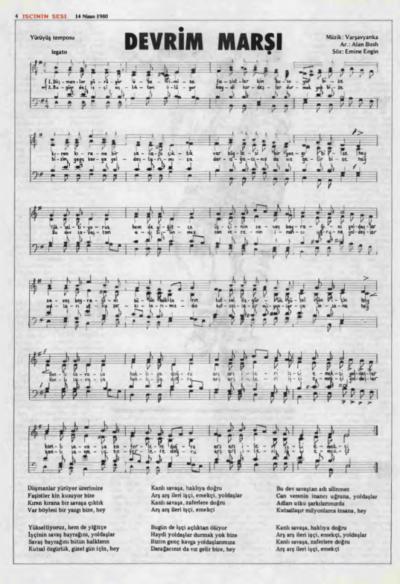
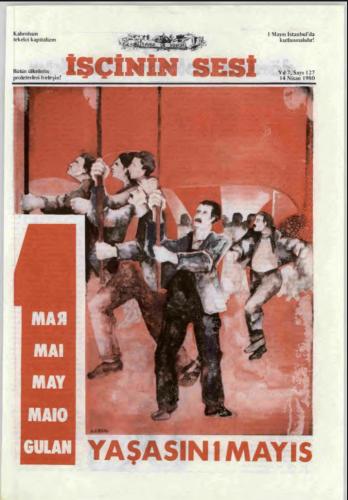
This Revolutionary March composed by Emine Engin to the melody of the Varshavianka (arranged by Alan Bush) was published in number 127 of the magazine İşçinin Sesi (The Worker's Voice) of 14 April 1980. İşçinin Sesi was an official fortnightly magazine of TKP (Türkiye Komünist Partisi, the Turkish Communist Party). Publication started in January 1974 and ended with number 474 in September 2000. This version is characterized by strong struggle and revolutionary accents, reflecting the civil war-like atmosphere of 1980 Turkey, few months before the military coup of 12 September 1980 lead by general Kenan Evren. [RV]
Düşmanlar yürüyor üzerimize,
Faşistler kin kusuyor bize.
Kıran kırana bir savaşa çıktık,
Var böylesi bir yazgı bize!
Yükseltiyoruz, hem de yiğitçe
İşçinin savaş bayrağını.
Savaş bayrağını bütün halkların,
Kutsal özgürlük, güzel gün için!
Arş arş ileri işçi, emekçi!
Kanlı savaşa, zaferlere doğru,
Arş arş ileri işçi, emekçi!
Bugün de işçi açlıktan ölüyor,
Haydi yoldaşlar durmak yok bize.
Bizim genç kavga yoldaşlarımıza,
Darağacınız da vız gelir bize!
Bu dev savaştan adı silinmez
Can verenin inancı uğruna.
Adları utku şarkılarımızda
Kutsallaşır milyonlarca insana!
Arş arş ileri işçi, emekçi!
Kanlı savaşa, zaferlere doğru,
Arş arş ileri işçi, emekçi!
Contributed by Boreč - 2021/12/2 - 18:24
3β. Mexican rewriting against president Enrique Peña Nieto
Uno de los himnos más representativos de la lucha contra la reacción, la clase opresora, explotadora, oligarca, y fascista.
Letra adaptada para México en torno a la imposición de Enrique Peña Nieto.
Nubes obscuras impregnan la patria,
La imposición, la corrupción y opresión.
No nos rendiremos, nos defenderemos
Con entera dignidad y con valor.
El tiempo ha llegado para luchar
En esta batalla del bien contra el mal.
Todos como hermanos, como mexicanos
Vamos a salvaguardar a la nación.
Esta es la nueva revolución,
Es la Primavera de México.
Todos como hermanos, como mexicanos
Vamos a salvaguardar a la nación.
Contributed by Boreč - 2021/12/22 - 16:43
3γ. Anti-Russian, pro-Ukraine French version
"Cette version des paroles est destinée à s'opposer à l'invasion militaire de l'est de l'Ukraine par les forces russes.
Fondamentalement, il n'y a pas de différences majeures avec la version française, mais les paroles ont été réécrites pour soutenir l'Ukraine."
En rangs serrés l'ennemi nous attaque
Autour de notre drapeau regroupons-nous.
Que nous importe la mort menaçante
Pour notre cause soyons prêts à souffrir.
Mais le genre humain face aux agresseurs
Ne doit avoir qu'un seul étendard,
Un seul mot d'ordre: "A bas la guerre,
Fraternité Amitié dans le mond’entier ".
O frères et sœurs, prenons les armes,
Pour la libération de toute l’Ukraine.
O frères et sœurs, prenons les armes,
De notre pays nous chass’rons l‘envahisseur.
Les oligarques vautrés dans la richesse
Mitraillent et grenadent les villes ukrainiennes.
Ils bombardent villes et campagnes
Menacent du nucléaire l’humanité entière.
Contre les Poutines, les Louckachenkos,
Contre les tyrans, les présidents fantoches,
Tous les peuples doivent s’unir :
Guerre à la guerre, amitié, solidarité.
O frères et sœurs, prenons les armes,
Résistons à la folie du dictateur.
O frères et sœurs, prenons les armes,
Et d’notre pays nous chass’rons l‘envahisseur.
O frères et sœurs, retenons nos larmes,
Et tous ensemble nous chasserons la peur.
O frères et sœurs, prenons les armes,
Nous libèrerons l’Ukraine de l’envahisseur.
Contributed by Boreč - 2022/4/25 - 00:54
3δ. The Persian version 3v. rendered in Tajik
The Persian text (یک صف شویم) was converted into Tajik.
According to one source, the piece is one of the songs of the Monafeghin, an Iranian dissident militant organisation that participated in the Iranian Revolution and the Iran-Iraq War, which is Islamist and aims to overthrow the Islamic Republic.
Secondo una fonte, il brano è una delle canzoni del Monafeghin, un'organizzazione militante dissidente iraniana che ha partecipato alla Rivoluzione iraniana e alla guerra Iran-Iraq, che è islamista e mira a rovesciare la Repubblica islamica. [Boreč]
1.
Як саф шавем, як садо, бо ҳам чунон
Душман билразад зи назми сари хмони
Аз марг ва аз ранҷу сахтии роҳмони
Ҳаргизи набӯдаи ваҳшату бокмони
Дар зери бори кор, хам шудаи камарҳо
Занҷири ранҷу меҳнат раҳо кунем
Инак ба ҳар ҷои зи фарёди худ мо
Овози сурхи коргари пароканӣам
2.
Ҷузи тиккаи нонеи бадастони коргари
Чизе намонад зи заҳматаш вале
и Сармояи дорони бадви шаш кашанд агар
Дар роҳ баҳра бошад мушкилии
Дар авҷи ранҷу кор, ҳамвора як шиори
Гул кардау шакуфта дар даҳонмони
Танҳо ба қаҳри туфанг ме тавон шикасти
Ин назми куҳнаи пусида дар ҷаҳон
Contributed by Boreč - 2022/10/14 - 01:27
3ε Rap version by Kento · Bestierare · Serhat Akbal · Francesco Carlo · Marco Rovelli
A Las Barricadas 2023, dall'album collettivo Nella notte ci guidano le stelle. (Canti per la Resistenza), vincitore della targa Tenco 2023 come "miglior opera collettiva"
...
Notte nera
ci si vede appena
questa è la frontiera
la barricadera
quando entriamo in scena
siamo un fiume in piena
alza la bandiera
cara Companera
il cuore in mano
un coraggio strano
che ci ritroviamo
che non ci spieghiamo
stranieri nei luoghi che amiamo
ti chiamiamo
loro ci chiedono che armi abbiamo
strade montagne casali in mezzo ai campi
si tracciano sentieri
si perdono compagni
i trucidati ieri
vivranno nei nostri canti
forti i miei pensieri
negli altri che vanno avanti
all'improvviso,
ma non improvvisiamo
in ogni viso
un sorriso
che conosciamo
noi siamo il vecchio e il bambino
cui raccontiamo
le storie quelle eterne
del ribelle partigiano
la strada racconta una storia di sangue
la smorfia beffarda di chi ancora non sa
da Belfast a Gaza, da Reggio a Alicante
seguimos luchando por la libertad
col vino dei vecchi
col latte dei bimbi
i denti scoperti
col vento che fischia
sorriso di donna che ti dice dimmi
ed ogni emozione che dentro si immischia
solo potessimo riderne ancora
avere accanto Guevara e Sankara
solo trovare una nota che suona
prima che l'ultima lacrima cada
fuoco che crepita, notte in montagna
voci sussurrano questa ballata
luci si specchiano sulla chitarra
sono i mattoni della barricata
¡A las Barricadas!¡A las Barricadas!
por el triunfo de la Confederación.
¡A las Barricadas!¡A las Barricadas!
por el triunfo de la Confederación.
Con la bandiera degli ultimi addosso
so la sconfitta, non so la resa
non per il mio, solo per ciò che è nostro
musica macina, fiaccola accesa
alzo il cappuccio della felpa nera
forse stanotte no ci tradirà
la fiamma è rossa come primavera
chi più ne parla e chi meno ne sa
versami acnora quel sorso di sogni
se troppo spesso ne sono ubriaco
è meglio il delirio di chi riempie fogli
di chi sta bene asservito allo stato
luci dell'alba, mattino in montagna
si è fatta forte anche questa ballata
oggi per arma avrò voce e chitarra
sono i mattoni della barricata
Nere tormente agitano l'aria ancora
come allora non vediamo niente,
non vediamo l'ora
di prendere il padrone per la gola
per fargli pagare a lui i tempi bui
e non a chi lavora
ed il nemico attuale
è ancora eguale
a quel che combattemmo su in montagna
o coi compagni in Spagna
uguale all'antagonismo naturale
all'arroganza patriarcale
al Capitale che comanda
col parabello in spalla
caricato a palla
con gli stessi cori
siamo una canaglia
siamo i malfattori
come nei canti di Pietro Gori
la pace tra gli oppressi,
la guerra agli oppressori
siamo lavoratori
che padroni non vogliamo
disertori
figli del pensiero libertario
insorgeremo contro ogni impero
contro ogni armata
Nostra patria è il mondo intero
Companeros, a las barricadas
Alza la bandera revolucionaria
...
Alza la bandera revolucionaria
...
...
Contributed by dq82 - 2023/7/7 - 16:06
3ζ. Varzaviànca Livornese: A dystopic and uchronic hymn as if it were written for Livorno siege of 1849. Composed by the 21th Century Tuscan Anonymous in the mont of July of the year 2023.
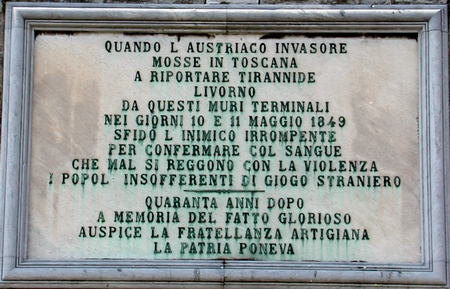
Svèntola ardita la nostra bandiera,
Anco se ar bujo ‘un zi vede da qui allì,
Anco se soffia buràsca straniera,
Anco se forze ci toccherà morì.
E’ la bandiera di tutta la gente
‘Vesta’ ‘anzone ‘e ci fa rinvivì’!
Ir lavoro vince, si vòle giustizzia,
I pòpoli tutti si dèvano uni’.
Mano a’ fucili pe’ scacciare l’invasor!
Forza Livorno, via ‘sta marmaglia
Come a Varzàvia pe’ scacciare l’invasor!
Oggi che ir pòpolo crepa di fame,
Morte ar tedesco e ar budello di su’ mà!
E te, giovanotto, se ti trema ir culo
Sulle barriàte ‘un ci devi pròpio andà.
I nostri morti ‘un li scorderemo,
Ir Gatto Bartelloni sempre ci guiderà!
Questa ‘anzone pe’ lui ‘anteremo,
E ir zu’ nome sempre s’onorerà.
Mano a’ fucili pe’ scacciare l’invasor!
Forza Livorno, via ‘sta marmaglia
Come a Varzàvia pe’ scacciare l’invasor!
Si deve abbàtte’ ir codino austriaànte,
Come s’abbatte la ‘orona dello zàr,
I troni crollan con furia tonante,
Ir zangue de’ pòpoli si deve vendicar.
Pe’ un’idea ‘un zi more mai invano,
Cristo su Giuda ‘or tempo prevarrà!
Ner fòo santo ci si dà la mano,
E l’avvenire arfin nostro sarà.
Mano a’ fucili pe’ scacciare l’invasor!
Forza Livorno, via ‘sta marmaglia
Come a Varzàvia pe’ scacciare l’invasor!

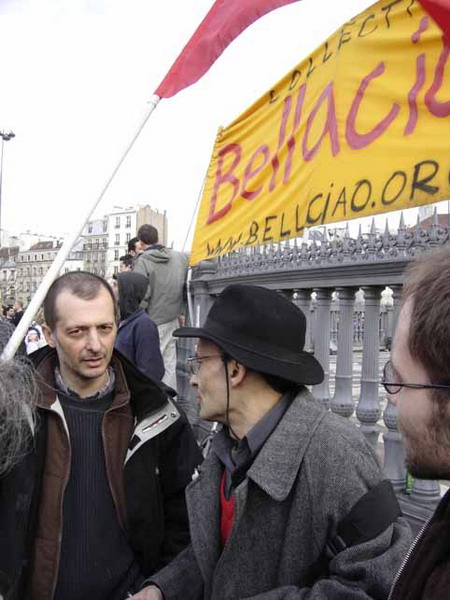
Riccardo Venturi - 2007/10/11 - 13:43
A Dieter, membro e contributore di National Anthems Online, per averci segnalato che stavamo mescolando la Warszawianka 1831 roku e la Warszawianka 1905 roku. Senza la sua segnalazione questa pagina non potrebbe esistere. Grazie, Dieter. [CCG Staff]
CCG/AWS Staff - 2007/10/13 - 00:36
Festival Sociale delle Culture Antifasciste di Bologna.
adriana - 2010/7/3 - 20:11
Comunque questa attribuzione sembra molto plausibile alla luce della biografia di Józef Pławiński, che morì durante il trasporto verso la Siberia essendo stato condannato ai lavori forzati dalle autorità russe.
Krzysztof Wrona - 2013/8/27 - 19:53
Krzysztof Wrona - 2013/8/27 - 19:56
di Krzysztof Wrona
Tutto sbagliato. Mi accorgo solo adesso.
1. Il testo polacco contribuito da Riccardo nel 2007 [come versione di A las barricadas, ndr] è in realtà il testo di un'altra canzone rivoluzionaria, scritta da Ignacy Rzońca (1879–1909) forse già nel 1899, ufficialmente nel 1904, pubblicata però solo nel 1905, come testo anonimo (per ovvi motivi). La canzone porta il titolo è "Na barykady" (Alle barricate) e viene cantata su una musica diversa, di cui l'autore rimane ignoto (oppure riprende la musica di qualche altra canzone, ma non riesco a capire quale fosse).
2. La seconda versione polacca (in realtà da oggi l'unica, dato lo scorporo dell'altra Na barykady, ndr), mandata gentilmente poco fa da Joseph Petro(w)ski, oltre il titolo, che per essere precisi, in maniera corretta si dovrebbe scrivere così: NA BARYKADY [è stato corretto, ndr), è la traduzione letterale e incompleta del testo originale spagnolo, cantato sulle note di "Warszawianka 1905 roku", trovata probabilmente qua:
3. Come ho scoperto in precedenza, l'autore della musica [dell'altra Na barykady, la versione di ¡A las barricadas!, ndr] si può individuare nella persona del compositore polacco Józef Pławiński, che riprese le note della "Marsz żuawów" (Marcia degli zuavi), una canzone patriotica risalente ai tempi della Rivolta di Gennaio del 1863.
Come autore delle parole e della musica della "Marcia degli zuavi" viene nominato Włodzimierz Wolski, ma alcune fonti citano anche come il compositore della musica Stanisław Moniuszko, il più grande autore operistico polacco del Ottocento, di cui Wolski fu il librettista nel caso dell'opera "Halka".
4. Ho scoperto anche che esiste un'altra canzone rivoluzionaria polacca del 1909 che viene cantata sulla melodia della "Warszawianka 1905 roku", intitolata "Łodzianka", dalla città polacca di Łódź.
5. E non finisce qua, perché esiste un'altra canzone polacca sulle stesse note, un inno socialista per la festa del primo maggio di Zmogus del 1889, ahimé:
Ufffa, tutto qua.
Salud!
Krzysiek Wrona - 2014/9/17 - 16:44
(Antoine Lafourcade)
Riccardo Venturi - 2014/9/21 - 17:48
Riccardo Venturi - 2014/9/22 - 12:51
Sono stati corretti anche i titoli della Łodzianka e di Na dzień 1 maja (senza puntino!) e, a tale riguardo, avrei delle domande da porre a Krzysiek:
a) Chi sono gli Scheibler, Geyer, Kaznakov e Poznański nominati nella Łodzianka?
b) Che sono le "zurne"?
Sałódź!
Riccardo Venturi - 2014/9/24 - 17:34
3β. Łodźianka (1909)
3β. Łodźianka (1909)
C'è da togliere l'accento che accompagna la "z".
Vedi, Riccardo, a contatto con te, uno diventa pignolo. Sembra che sia contagioso : )
(Krzysiek Wrona)
CCG/AWS Staff - 2017/6/21 - 04:51
forse...
krzyś Ѡ - 2018/4/21 - 01:07
Juha Rämö - 2019/4/5 - 01:13
leoskini - 2020/1/17 - 23:29
CCG/AWS Staff - 2020/1/18 - 00:17
Juha Rämö - 2020/4/10 - 22:08
Riccardo Venturi - 2021/8/13 - 10:37
Btw, I'm sure there are still some Varšavjanka hidden around the world ;)
Also there are actually Czech and Portuguese versions, but I don't know anything about these lyrics. I don't have any information…
The Portuguese version was probably sung during the Carnation Revolution, and also Czech lyrics in a songbook "brigáda zpívá", I think :3
but this is too difficult for me to find…
Борец(╹◡╹) - 2021/8/13 - 14:49
Thank you Borec / Akoniet! I too am sure a lot of hidden and unknown Varshaviankas are still waiting to be discovered in the Web ocean. Well, we have plenty of time ! See you soon and let's keep in touch: our pages are never over.
Riccardo Venturi - 2021/8/14 - 10:31
La versione portoghese 2 è stata creata ascoltando, con compagno portoghese, quindi potrebbero esserci degli errori...
Inoltre, dopo aver controllato di nuovo il testo più tardi, penso che "Em filas" sia più corretto di "Em vilas"
Per quanto ho tradotto, il testo portoghese è quasi identico alla versione francese, ed ecco la versione corretta :3
1.
Em filas cerradas o inimigo ataca, [...]
Boreč - 2021/9/8 - 05:51
Prego! Come potrai intuire e vedere, questa è una pagina molto complicata da gestire, quindi non avere timore anche se vedi qualche ritardo nella pubblicazione. Inoltre, ogni contributo viene, se possibile, ampliato (con video, ulteriori notizie se reperite ecc.). Naturalmente inserisco subito il testo portoghese corretto al posto di quello precedentemente inserito, e "snappo" quello pubblicato nel tuo commento. Grazie ancora per tutto quello che stai facendo e che, fra le altre cose, mi ha -come dire- stimolato ad inserire altri contributi per questa pagina!
Riccardo Venturi - 2021/9/8 - 06:10
Carissimo Borec, ho visto che hai riproposto in approvazione una presupposta versione latina ("Carmen de Warsaw") della Warszawianka. Questa, a suo tempo, era stata già cassata in quanto si tratta evidentemente di una "traduzione" fatta da qualcuno con il tool automatico di Google, o comunque da qualcuno che non conosce neppure l'abc della lingua latina, una vera e propria accozzaglia di parole messe a caso mischiate con parole e frasi in inglese. Ti pregherei quindi di non riproporla più, perché tanto non verrà mai approvata.
Colgo l'occasione per dirti anche che la versione persiana che avevi messo in approvazione è stata eliminata, ma stavolta -semplicemente- perché era già presente nella pagina, ed inviata da tu stesso. Vi ho però integrato il video della canzone.
Grazie ancora e a risentirci!
Riccardo Venturi - 2021/10/6 - 04:07
sono molto dispiaciuto per aver ripetutamente postato testi sbagliati, Sir Ricardo…
Cercherò di controllare il testo prima di pubblicarlo su questa pagina.
Grazie per i suoi consigli…!
Boreč - 2021/10/6 - 17:11
E' la prima volta che vengo chiamato "Sir", non sapevo che la regina Elisabetta mi avesse nominato baronetto...certo che poteva per lo meno dirmelo e mi sarei vestito ammodino :-)
Grazie ancora Lord Borec e a presto!
Riccardo Venturi - 2021/10/6 - 19:36
Dear Riccardo,
The title of the 1918 Finnish version of Waszavianka (VARŠAVJANKA) has been translated into plain Finnish as Varsovan Laulu. This is basically all right, because that's what it is in Finnish. However, there's a but: people who know the song refer to it as VARŠAVJANKA according to the Polish original, whereas Varsovan laulu usually refers to Moonshine or Rectified spirit smuggled to Finland mainly from Estonia during the prohibition (1919 - 1932). Therefore, I would be inclined to have Varsovan Laulu deleted in this context.
Juha Rämö - 2021/10/7 - 11:30
Carissima Stanislava, come puoi vedere ho integrato completamente quello che hai scritto nella sezione relativa, compreso ovviamente il testo parziale della versione da te trascritto. Per il resto, credo appunto che tu abbia già detto tutto quel che c'è da dire. Sono ben cosciente, nel caso di pagine come questa o di altre, che le vecchie canzoni rivoluzionarie, di lotta e di libertà (citi anche l' “Internazionale”, che ebbe origine durante la Comune di Parigi...) hanno fatto una pessima fine nei paesi dell'ex “socialismo reale”, ed è inevitabile. Quello che hai scritto fotografa alla perfezione quel che è stato e quel che è adesso; e c'è poco o nulla da fare, tutto qui. Grazie ancora, carissima.
Riccardo Venturi - 2021/10/7 - 15:45
Dear Juha, I have deleted the “alcoholic” title, not without a certain regret in my heart. Now that I know that I had given a version of the Varšavjanka the title of “Moonshine”, I feel very amused deep in my roots. Well, there is no Irish version of the song in this page but, in case I should find one, I could give it the title of “Poitín”...
Now I ask you a service. There's another Finnish version which seems to have originated in the US. It was recorded 1916 by the Finnish-American artist Juho Koskelo for “Työväen-Opisto” in Smithville, Minnesota. I have listened to the version and checked if it matches one of the versions already included in the site, but I got the impression that it is totally different. Of course, the recording is very old (and it is always touching to listen to something recorded 105 years ago...), and I may be wrong. The lyrics aren't to be found anywhere. Could you kindly help us solve this mystery...?
Thank you in advance, of course with a generous cup of moonshine...!
Riccardo Venturi - 2021/10/7 - 16:17
Dear Riccardo,
I've been trying to put my finger on the lyrics of Juho Koskelo's version ever since it was posted here a month ago. Here are the facts:
- I'm not able to reproduce them by listening. The quality of this recording from YouTube is just not good enough to do that.
- You're right that they are different from the 3 other Finnish versions above. The only thing I can tell you is that the first line reads "Vainoovat viimat nyt yllämme viuhuu" (close to Santtu Piri's 1908 version).
- Written lyrics of this version seem to be quite impossible to find, but I'll keep searching.
- The song was not recorded at Columbia Studios which refers to Columbia Pictures but at Columbia Records. Neither was it recorded on May 24, 1916 but on the last day of 1916 as shown by this database record
- The original title of this version is Warshavjanken which looks like a Swedish translation of the Polish one.
Juha Rämö - 2021/10/7 - 21:19
bravi
brava Stanislava,
e anche Tu, venerando Riccardo (cuor di leon Corleon)
forse finalmente le cose si metterano un poquito piu in chiaro
io ormai ho perso tutta la mi pazienza mu
krzyś Ѡ - 2021/10/8 - 01:45
Boreč - 2021/10/10 - 03:41
Boreč - 2021/10/26 - 01:20
Dear Boreč,
Congratulations for having been able to find the lyrics of the rare Finnish version 5 of Warszavianka. As you may have noticed, I have also been trying to find them ever since you posted the audio link of this version on September 9. On Monday this week, I finally got hold of a book where they are printed (Ilpo Saunio & Timo Tuovinen: Edestä aattehen - suomalaisia työväenlauluja 1890 - 1938). However, the lyrics in thet book are slightly different from the ones you posted, i.e. there are two different words. Therefore, I would very much like to find out the source of the lyrics you have contributed.
Yours sincerely,
Juha Rämö
Juha Rämö - 2021/10/27 - 00:08
Good morning Juha :)
Yes, this finnish varszavianka text was posted in the comments section of a Finnish blog.
I listened to the audio and checked the lyrics to make sure they were correct, so I think this is the official one :3
However, I was not aware of the existence of songbook "suomalaisia työväenlauluja" with this text...
Boreč ( ̄∀ ̄) - 2021/10/28 - 01:41
“Puolan vallankumouslaulu Varshavjanka ilmestyi ensimmäisen kerran suomeksi käännettynä Sosialidemokraattien Työväen Kalenterissa v. 1909 nimellä Taistoihin tuimiin. Laulun sanat ja sävel poikkeavat nykyisin käytössä olevista.”
“The Polish revolutionary song Varshavjanka first appeared in Finnish translated as “Taistoihin tuimiin” in the 'Social-Democrat Workers' Calendary' in 1909. The song's lyrics and melody are different from those currently in use.”
So in the source page linked by Boreč. Consistently therewith, 1g4 is no “Finnish-American version from 1916”, but an entirely Finnish version from 1909. Santtu Piri's 1908 version is only 1 year older. So I have changed all the 1g4 section. Sadly enough, the user who provided information is unknown. The lyrics are different, but in Juho Koskelo's American recording from 1916 the melody is the same as the classic one. The 1909 edition of Sosialidemokraattien Työväen Kalenteri is available here (168 pages!), but the page of “Digitaaliset aineistot” works too slow for my poor, very modest, old and wretched pc surrounded with archaic paper books, fag-ends and coffee stains. Should someone have a (much) better pc and a faster connection, I think much would appear from this old Workers' Calendar. Thanks for help!
Riccardo Venturi - 2021/10/28 - 21:08
Dear Boreč,
Thank you very much for the link. I was quite surprised that this kind of content exists in a blog owned by Uusi Suomi which is considered a conservative right-wing medium. Well, you never know...
Anyway, the person who posted the lyrics writes in her message that the source of the lyrics is the same book I mentioned (Saunio - Tuovinen: Edestä aattehen, Helsinki 1978). The small differences I detected when comparing the two texts must, therefore, be typing mistakes. So, if I have your permission, I will post the corrected lyrics and ask the Administrator to replace the existing ones with them. Please let me know.
JR
Juha Rämö - 2021/10/28 - 22:30
Of course you can. The corrected lyrics will be included immediately. Kiitos!
Riccardo Venturi - 2021/10/28 - 22:43
Here are the corrected lyrics to replace the existing ones at 1g4.
Juha Rämö
VAINOOVAT VIIMAT / WARSHAVJANKEN
[...]
Juha Rämö - 2021/10/28 - 22:58
Dear Riccardo,
Thank you so much for the invaluable link to Työväen Kalenteri 1909.
It seems that the Finnish section of Warszawianka requires quite a lot of rewriting and restructuring. I will e-mail you soon about that.
Juha Rämö - 2021/10/28 - 23:11
I already had the suspicion that the whole Finnish section of this page needs rewriting and restructuring on the basis of Saunio-Tuovinen's work. We often rely on web sources which may be scant and/or inaccurate; however, a printed work like Saunio-Tuovinen's must be the result of a lifetime's study. I am waiting for your e-mail. This is a neverending work in neverending progress.
Thank you!
Riccardo Venturi - 2021/10/28 - 23:38
Here are the vids of mysterious versions that I have archived
One is sung in Italian, the other in Chinese, but no information about these two...
Boreč - 2021/10/29 - 09:15
Dear Borec, we really appreciate your archive. Please don't be worried about the quantity of comments: this website works as a free space and a forum, and all comments are parts of it. So please feel free to write here whatever you want, in any language. As for your latest comment, as you can see, I have constructed an entirely new page for the Italian song and included the Chinese song video into one of the Chinese sections. I have also left a couple of comments on your YT archive, of which I am now a new member. I expect you give me an official welcome with a red carpet and cheerleaders (I'm kidding huh :-PPP). Well, I may do without the red carpet, but please don't forget the cheerleaders. Thank you!
Riccardo Venturi - 2021/10/30 - 15:37
Audio link to the song performed by Stockholms anarkafeministkör.
[...]
Juha Rämö - 2021/11/2 - 11:56
This song is in Azerbaijani, not Turkish...
please fix it ( ̄∇ ̄)
Boreč - 2022/4/30 - 05:27
Riccardo Venturi - 2022/4/30 - 06:45
Yes, I too thought the song was sung in Turkish from the tlyrics, but when I played it to Azerbaijanis and Russians, they replied that it was in Azerbaijani, not Turkish.
They said it has a Turkish accent, but it's in Azerbaijani.
And [DonQuijote82 - 2011/10/15 - 14:41] is same in Azerbaijani…
I’m not familiar with the Azerbaijani language and don’t know where this lyrics came from, but perhaps they were written to Turkish orthography...
Boreč - 2022/4/30 - 12:55
My knowledge of the (Turkey) Turkish language is not that deep, but I can tell when the lyrics of a song match what is really sung. Well, I've listened well to the song and I can tell you that it is sung in Turkey Turkish and singing matches perfectly the written lyrics. Of course, there might be some kind of “northern” accent, i.e closer to Azerbaijani, and I repeat that Turkey Turkish and Azerbaijani are very similar; but the song is sung and written in Turkey Turkish. Anyway, you can't simply transpose anything written in Turkey Turkish or Azerbaijani into each other, these languages are very close but aren't the same language you can indifferently write with different spelling systems (as in Serbian).
As for Azerbaijanis, like many other people from that linguistic area, they tend to label anything uttered in a Turkic language as a form of Azerbaijani. The same holds for Turkey Turks, of course. One's own language is always the purest and oldest one, and the other forms (often called “dialects”) are sort of offsprings. In other words: when you ask someone about such matters, nationalism should always be taken into account. A Turk will always tell you that anything uttered in a Turkic language is Turkish, and an Azerbaijani will always tell you that anything uttered in a Turkic language is Azerbaijani. Never trust blindly either of the two, unless your interlocutors have specific -and impartially detached- linguistic training. Anyway, I won't change anything in the language attribution of the song. See ya!
Riccardo Venturi - 2022/4/30 - 20:58
Thanks for sharing with us your complete Japanese version of the Warszawianka 1905 roku written 1927 by Wataru Shikaji. To say the truth, the “one verse plus refrain” version from 1927 was already included in this page, but I didn't know anything at all about the author. So, I have reshaped the whole section accordingly. In addition to this, I really didn't know you are from Japan and a native Japanese speaker (this I learned from your Lyricstranslate profile). So, I ask you for a service: do you have further biographical info on Wataru Shikaji and, possibly, a portrait? And could you please provide an English translation of your complete Japanese version? This would be really great. Thank you, arigato!
Riccardo Venturi - 2022/5/18 - 09:12
Okay, here the pics of Kaji Wataru
1: https://imgur.com/7M3S5vc
2: https://imgur.com/rtBUREk
I've uploaded couple of portraits
aa….also, please fix his name.
It was Kaji Wataru, not Shikaji Wataru.
Sorry….and please wait for English translation and his biography, im writing now :)
Boreč - 2022/5/18 - 09:39
Thank you again! You don't need to write Kaji Wataru's bio: there's plenty of information on Wikipedia and other sources. I was misled by "Shikaji" (btw, I have "de-Shied" his name throughout).
Riccardo Venturi - 2022/5/18 - 10:39
As you can see, I have integrated your Rōmaji transcription and English translation into the relevant page section. Thank you for your effort, which your translation helps appreciate in its fullness. As for Kaji Wataru's image, I have reproduced it for other sources. Sadly enough, it is quite complicated for us to implement images into our site from imgur and/or other image tools.
Just one last question: what does rōdōka exactly mean in Japanese?
Riccardo Venturi - 2022/5/18 - 16:59
Well, /Rōdōka/ means «workers' song» in Japanese.
So, when translate it into English, /Warushawa-Rōdōka/ means «Warsaw workers’ song». ( ̄∇ ̄)
Boreč - 2022/5/18 - 23:46
Boreč - 2022/5/19 - 11:32
Riccardo Venturi - 2022/10/14 - 11:20
Riccardo Venturi - 2022/10/23 - 03:02
I have moved to 1א the entire info about the Slovenian version (as you can see, we have exhausted the Latin and Greek alphabets for section 1, and we're now in with the Hebrew alphabet!). Btw, did you see this? I think it should be interesting for your YT channel, too. Thank you, arigato!
Boreč - 2022/10/26 - 07:34
La versione ufficiale albanese della Varshavianka è reperibile in una raccolta di canzoni partigiane albanesi pubblicata nel 1959. Ma è troppo lontana per essere acquistata nel mio paese...
Boreč - 2022/10/26 - 10:36
I've seen your message concerning the book including the Albanian version, on sale at Sheet Music Warehouse. It's really expensive. I'm afraid we should find someone who can finance us, because you're too far away, and I am too poor (btw, I have no credit card or pay stuff like this). Well, we'll see how to cope with!
Riccardo Venturi - 2022/10/26 - 11:31
Well done! And thank you, Riccardo! so impressed! Actually, for a long time I didn't have any info on that version. Now we can finally reveal the details of this international "Whirlwinds of danger"! Really, thanks...
Boreč - 2022/10/27 - 01:42
Yesterday, I checked the lyrics again and reworked them using what knowledge I had. Sorry, please replace them with this texts: [...]
Dear Boreč, I have substituted the lyrics (see here). See you soon! [RV]
Boreč - 2023/5/30 - 14:45
About "1υ. ვარშაული [Varshauli] - La versione georgiana di I. Edošvili [1901]", I'm writing to update information of Georgian Warszawianka. Also, there was a transposition error when transcribing from a songbook, so please update the article to the following texts:)
[...]
(Si veda / see 1υ)
Boreč - 2023/10/5 - 13:55
Dear Boreč, I have integrated in the page both the alternative Bulgarian version and the correct Georgian version by Irodion Evdošvili with all the new material (see here). I apologize for always being so late, but I’m getting old and have growing eyesight problems… Thank you for all your invaluable work!
Riccardo Venturi - 2023/10/15 - 00:02
Dear Riccardo!
Don't be sorry, and big thank you for checking my very very lengthy text every time! My articles are not that important compared to other 'anti-war songs'.
Besides, your physical condition (eyesight, etc...) is much more important! I feel that AWS is very valuable, so I keep contributing to help in any way I can...
Oof...I tend to write articles on specific songs, mainly Warszawianka, Hymn WFDY, Hymn IUS, L'internationale...
Of course, I'm also interested in articles about other songs!
Please keep up with us, there's no hurry to edit pages... And good health to you! :)
Boreč - 2023/10/16 - 01:25
Note for non-Italian users: Sorry, though the interface of this website is translated into English, most commentaries and biographies are in Italian and/or in other languages like French, German, Spanish, Russian etc.

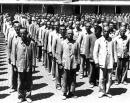

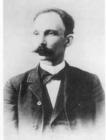

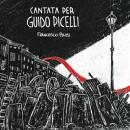

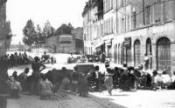
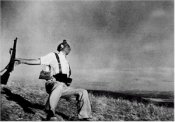

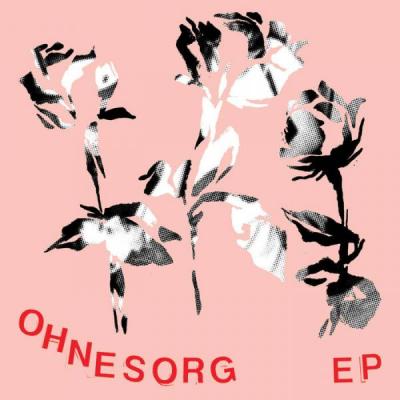
Musica: Józef Pławiński (1853/54-1880)
[Ripresa dal Marsz żuawów di Włodzimierz Wolski ]
Testo russo di Gleb Maksimilianovič Kržižanovskij [1897]
Testo francese di autore sconosciuto [1920 ca.]
Testo spagnolo di Valeriano Orobón Fernández [1933]
Polish lyrics by Wacław Święcicki [1879]
Music: Józef Pławiński (1853/54-1880)
[Drawn from Marsz żuawów by Włodzimierz Wolski ]
Russian lyrics by Gleb Maksimilianovič Kržižanovskij [1897]
French lyrics by unknown author [1920 ca.]
Spanish lyrics by Valeriano Orobón Fernández [1933]
Paroles polonaises de Wacław Święcicki [1879]
Musique: Józef Pławiński (1853/54-1880)
[Tirée du Marsz żuawów de Włodzimierz Wolski ]
Paroles russes de Gleb Maksimilianovitch Krjijanovski [1897]
Paroles françaises d'auteur inconnu [env. 1920]
Paroles espagnoles de Valeriano Orobón Fernández [1933]
Letra polaca de Wacław Święcicki [1879]
Música de Józef Pławiński (1853/54-1880)
[Tomada del Marsz żuawów de Włodzimierz Wolski ]
Letra rusa de Gleb Maksimilianovich Krzhizhanovski [1897]
Letra francés de autor desconocido [ac. 1920]
Letra castellana de Valeriano Orobón Fernández [1933]
Польские стихи Baцлава Cвенцицкого [1879]
Mузика Юзефа Плавиньского (1853/54-1880)
[Из Marsz żuawów (Марша зуавов) Влодзимежа Вольского ]
Pyccкие стихи Глеба Maксимилиановича Кржижановского [1897]
Французские стихи неизвестного автора
Cпанские стихи Вaлepиана Opoбона Фэрнандэca [1933]
Puolankieliset sanat: Wacław Święcicki [1879]
Sävel: Józef Pławiński (1853/54-1880)
(Włodzimierz Wolskin Marsz żuawów'ista)
Venäjänkieliset sanat: Gleb Maksimilianovič Kržižanovskij [1897]
Ranskankieliset sanat: tuntematon kirjoittaja [noin 1920]
Espanjankieliset sanat: Valeriano Orobón Fernández [1933]
I funerali di Buenaventura Durruti, da immagini dell'epoca. Nella colonna sonora anche A las barricadas interpretata dai Muertos de Cristo.
Buenaventura Durruti's burial ceremony (original images). The soundtrack includes A las barricadas performed by Los Muertos de Cristo
QUICK INDEX OF VERSIONS AVAILABLE [62 languages in total for all versions, up to now]
QUESTA PAGINA È SUDDIVISA IN SEZIONI DISTINTE
PAGE SUBDIVIDED INTO DIFFERENT SECTIONS
1. WARSZAWIANKA 1905 ROKU
Russo (Gleb Maksimovič Kržižanovskij 1897) – Francese 1 (anonimo ~1920) – Francese 2 (Stefan Priacel ~ 1930) - Italiano 2 (Adriana Martino - Benedetto Ghiglia, 1972) - Francese 3 - Italiano 1 – Tedesco – Finlandese 1 (Santtu Piri 1908) - Finlandese 2 - Finlandese 3 - Finlandese 4 – Finlandese 5 - Finlandese 6 - Finlandese 7 - - Estone 1 – Estone 2 - Giapponese 1 (Kaji Wataru, 1927) - Giapponese 2 - Giapponese 3 - Giapponese 4 - Inglese 1 (Whirlwinds of Danger, Douglas Robson ca. 1920) - Inglese 2 (Whirlwinds of Danger, Randall Swingler 1938) - Ungherese - Svedese 1 - Svedese 2 - Greco - Norvegese - Esperanto - Esperanto 2 - Croato 1 - Croato 2 (Serbocroato) - Danese 1 (Ejnar H. Tønnesen, ca. 1930) - Danese 2 - Vietnamita 1 - Vietnamita 2 - Galiziano (Galego) - Cinese 1 - Cinese 2 - Cinese 3 - Cinese 4 - Cinese 5 - Faroese - Coreano 1 - Coreano 2 - Catalano - Islandese 1 - Islandese 2 - Lettone - Turco 1 - Turco 2 ("Haydi yoldaşlar", Türkiye İşçi Partisi) - Spagnolo 1 - Spagnolo 2 - Spagnolo 3 (Cancionero Revolucionario de las Comisiones Obreras de Andalucía) - Slovacco 1 - Slovacco 2 - Lituano 1 (Juozas Baltrušaitis-Mėmelė, 1905) - Lituano 2 (Versione "Socialdemocratica", 1918) - Lituano 3 (Versione del 1957) - Ucraino 1 - Ucraino 2 (Vasil H. Holovatski, 1915) - Portoghese 1 - Portoghese 2 - Udmurto (Votiaco) - Bielorusso - Romeno 1 - Romeno 2 - Romeno 3 - Romeno 4 (Lucian Minel Rădan) - Indonesiano - Ceco - Albanese 1 - Albanese 2 - Arabo - Bulgaro 1 (Kremena Vasileva) - Bulgaro 2 (Jordan Jordanov) - Kazako - Georgiano (Irodion Evdošvili, 1901) - Yakuto (Sakha) - Casciubo (Mislaus Lasota) - Azero 1 - Azero 2 - Toki Pona - Sloveno (Mile Klopčič, 1943) - Afrikaans (Boreč - Chat GPT, 2023) - Armeno (Hakob Hakobyan, 1902) - Caraciai-Balcaro, o Circasso di Montagna (Bayramuqlanı Halimat) - Buriato (1955) - Hindi (Spalvera, 2023)
Russian (Gleb Maksimovich Krzhizhanovsky 1897) – French 1 (Anon ~1920 – French 2 (Stefan Priacel ~ 1930) - French 3 - Italian 1 – Italian 2 (Adriana Martino - Benedetto Ghighlia, 1972) - German – Finnish 1 (Santtu Piri 1908) - Finnish 2 - Finnish 3 - Finnish 4 – Finnish 5 - Finnish 6 - Finnish 7 - Estonian – Japanese 1 (Kaji Wataru, 1927) - Japanese 2 - Japanese 3 - Japanese 4 - English 1 (Whirlwinds of Danger, Douglas Robson ar. 1920) - English 2 (Whirlwinds of Danger, Randall Swingler 1938) - Hungarian - Swedish 1 - Swedish 2 - Greek - Norwegian - Esperanto - Esperanto 2 - Croat 1 - Croat 2 (Serbo-Croat) - Danish 1 (Ejnar H. Tønnesen, ca. 1930) - Danish 2 - Vietnamese 1 - Vietnamese 2 - Galician (Galego) - Chinese 1 - Chinese 2 - Chinese 3 - Chinese 4 - Chinese 5 - Faroese - Korean 1 - Korean 2 - Catalan - Icelandic 1 - Icelandic 2 - Latvian - Turkish 1 - Turkish 2 ("Haydi yoldaşlar", Türkiye İşçi Partisi) - Spanish 1 - Spanish 2 - Spanish 3 (Cancionero Revolucionario de las Comisiones Obreras de Andalucía) - Slovak 1 - Slovak 2 - Lithuanian 1 (Juozas Baltrušaitis-Mėmelė, 1905) - Lithuanian 2 ("Social-Democratic" version, 1918) - Lithuanian 3 (1957 version) - Ukrainian 1 - Ukrainian 2 (Vasil K. Holovatsky, 1915) - Portuguese 1 - Portuguese 2 - Udmurt (Votyak) - Belarusian - Romanian 1 - Romanian 2 - Romanian 3 - Romanian 4 (Lucian Minel Rădan) - Indonesian - Czech - Albanian 1 - Albanian 2 - Arabic - Bulgarian 1 (Kremena Vasileva) - Bulgarian 2 (Yordan Yordanov - Kazakh - Georgian (Irodion Evdošvili, 1901) - Yakut (Sakha) - Kashubian (Mislaus Lasota) - Azerbaijani 1 - Azerbaijani 2 - Toki Pona - Slovene (Mile Klopčič, 1943) - Afrikaans (Boreč - Chat GPT, 2023) - Armenian (Hakob Hakobyan, 1902) - Karachay-Balkar, or Mountain Cherkess (Bayramuqlanı Halimat) - Buryat (1955) - Hindi (Spalvera, 2023)
2. ¡A LAS BARRICADAS!
Originale spagnolo di Valeriano Orobón Fernández e Hildegart Taege 1932 – Catalano (Josep Mas i Gomeri 1936) – Italiano 1 – Italiano 2 (Casa del Vento) - Italiano 3 (Versione anonima del 1937) - Inglese 1 – Inglese 2 - Francese 1 (Jean-Marc Leclercq "JoMo", 1998) – Francese 2 - Rumeno – Finlandese 1 – Finlandese 2 (Klaus Maunuksela, 2016) - Esperanto 1 - Esperanto 2 (Miguel Fernández Martín, 2014) - Tedesco 1 (Alfred Schulte, 1932?) - Tedesco 2 - Polacco - Cinese - Portoghese 1 (Coletivo de Estudos Anarquistas "Domingos Passos") - Portoghese 2 (Juventude Maldita, 2006) - Slovacco - Ceco 1 - Ceco 2 - Ceco 3 - Greco - Afrikaans - Basco (Euskara) 1 - Basco (Euskara) 2 - Galiziano (Galego) - Turco 1 - Turco 2 - Ungherese - Macedone - Curdo - Indonesiano - Coreano 1 - Coreano 2 - Latino - Norvegese - Kelartico - Neerlandese - Armeno - Serbo 1 (Sindikalna Konfederacija ASI) - Serbo 2 - Persiano - Arabo - Tagico - Retoromanzo (Capuns e Maluns, 2022) - Lituano
Spanish original by Valeriano Orobón Fernández and Hildegart Taege 1932 – Catalan (Josep Mas i Gomeri 1936) – Italian 1 – Italian 2 (Casa del Vento) - Italian 3 (1893 Version) - English 1 – English 2 - French 1 (Jean-Marc Leclercq "JoMo", 1998) – French 2 - Romanian – Finnish 1 – Finnish 2 (Klaus Maunuksela, 2016) - Esperanto 1 - Esperanto 2 (Miguel Fernández Martín, 2014) - German 1 (Alfred Schulte, 1932?) - German 2 - Polish - Chinese - Portuguese 1 (Coletivo de Estudos Anarquistas "Domingos Passos") - Portuguese 2 (Juventude Maldita, 2006) - Slovak - Czech 1 - Czech 2 - Czech 3 - Greek - Afrikaans - Basque (Euskara) 1 - Basque (Euskara) 2 - Galician (Galego) - Turkish 1 - Turkish 2 - Hungarian - Macedonian - Kurdish - Indonesian - Korean 1 - Korean 2 - Latin - Norwegian - Kelartic - Dutch - Armenian - Serbian 1 (Sindikalna Konfederacija ASI) - Serbian 2 - Persian - Arabic - Tajik - Rhaeto-Romance (Capuns e Maluns, 2022) - Lithuanian
3. ALTRI / OTHER
Polacco 1 - Na dzień 1. maja (Zmogus, 1889) - Polacco 2 - Łodzianka (1909) - Italiano (Inno di Potere Operaio) - Svedese (Versione femminista) - Portoghese (Inno degli Ultras del Ferroviário di Fortaleza) - Versione anarchica argentina - Буги-вуги каждый день degli Zoopark e Буги-вуги dei Nol' - Versione trilingue spagnola-esperanto-francese (JoMo kaj Liberecanoj, 1998) - Versione locale bengalese (Hemanga Biswas) - Versione indonesiana come canto di lotta - La versione di Sendero Luminoso - סער הרשע - Canto israeliano di lotta - L'inno del Partito Comunista dei Lavoratori - La Россиянка /Rossijanka/ (Enisejsk 1906/1907) - Il "Canto degli Iževiti" (1918) - Пробил час грозный избавленья ("E' giunta la tremenda ora della rivincita") - 1905 - Порваны цепи кровавого гнета ("Varshavianka Bianca") - 1918/19 - Стонет страна под диктаторским гнётом - Versione antistalinista - Ecoterrorist: A las barricadas - အတားအဆီးများဆီသို့ ("Contro gli ostacoli") - Versione birmana cantata durante le rivolte studentesche del 2015 - یک صف شویم ("Mettiamoci in fila") - Versione persiana come canto di lotta dei lavoratori - Tofani şoriş - Versione curda soranî interpretata da Kalle Ateshi - Versione italiana come canto Partigiano ("Pronti alla lotta, pronti a morire") - Versione indonesiana rap "A las barricadas" dei Rebelnation Indo - SAT-Marŝo - Marcia della Sennacieca Asocio Tutmonda - Devrim Marşı (Marcia Rivoluzionaria Turca - 1980) - Adattamento messicano contro la presidenza di Enrique Peña Nieto - Versione francese anti-Russa, pro-Ucraina - La versione persiana 3v. resa in tagico - A las barricadas 2023: Versione italiana rappata (Kento · Bestierare · Serhat Akbal · Francesco Carlo · Marco Rovelli) - La Varzaviànca Livornese (Anonimo Toscano del XXI Secolo, 2023)
Polish 1 - Na dzień 1. maja (Zmogus) - Polish 2 - Łodzianka (1909) - Italian (Hymn of Potere Operaio) - Swedish (Feminist version) - Portuguese (Hymn of Ferroviário Fortaleza supporters) - Argentinian anarchst version - Буги-вуги каждый день by Zoopark and Буги-вуги by Nol' - Trilingual version Spanish-Esperanto-French (JoMo kaj Liberecanoj, 1998) - Local Bengali version (Hemanga Biswas) - An Indonesian version as a struggle song - Sendero Luminoso's version - סער הרשע - Israeli struggle song - Anthem of the Italian Workers' Communist Party - The Россиянка /Rossijanka/ (Yeniseysk 1906/1907) - The "Izhevite Song" (1918) - Пробил час грозный избавленья ("The terrible hour of revenge has come") - 1905 - Порваны цепи кровавого гнета ("White Varshavianka") - 1918/19 - Стонет страна под диктаторским гнётом - Anti-Stalinist version - Ecoterrorist: A las barricadas - အတားအဆီးများဆီသို့ ("Against the Obstacles") - Burmese version sung for the student uprisings of 2015 - یک صف شویم ("Let's line up") - Persian version as workers' struggle song - Tofani şoriş - Soranî Kurdish version performed by Kalle Ateshi - Italian version as Partisan song ("Pronti alla lotta, pronti a morire") - "A las barricadas" - Indonesian rap version by Rebelnation Indo - SAT-Marŝo - March of Sennacieca Asocio Tutmonda - Devrim Marşı (Turkish Revolutionary March - 1980) - Mexican adaptation against president Enrique Peña Nieto - Anti-Russian, pro-Ukraine French version - The Persian version 3v. rendered in Tajik - A las barricadas 2023: Italian rap version (Kento · Bestierare · Serhat Akbal · Francesco Carlo · Marco Rovelli) - The Varzaviànca Livornese (21th Century Tuscan Anonymous, 2023)
See also Warszawianka 1831 roku (La Varsovienne de 1831, Il s'est levé je jour sanglant).
La Varsovienne, ovvero la Warszawianka, ovvero A las Barricadas… la storia di questo canto rivoluzionario caro a tutti coloro che in Europa hanno lottato contro l’oppressione (zarista, borghese, franchista..) è assai complessa, probabilmente una delle più difficili, singolari e belle da seguire in assoluto. Il nostro tentativo di tracciarne una storia completa, alla luce di quanto siamo riusciti a reperire in rete e altrove, è forse il primo in assoluto, un vero e proprio tentativo pionieristico di fare luce su questo canto famosissimo. Comprende anche quanto scritto da Marco Rovelli nel libretto allegato a "La Musica nelle strade!" de Les Anarchistes; pur contenente qualche piccolissima imprecisione storica, si tratta di un contributo che riteniamo fondamentale. [RV]
La Varsovienne, or Warszawianka, or rather A las barricadas... It is extremely complicate to trace the story of this revolutionary song, much beloved by all who fought in Europe against any kind of oppression (by the Tsar, the bourgeoisie, Francisco Franco...), as it is probably one of the most difficult, peculiar and beautiful stories concerning a single song. Our attempt to trace a complete history of this song in the light of what we could find in the Web and elsewhere may be the very first pioneering study on its origins. It also includes what Marco Rovelli wrote in the booklet of “La musica nelle strade!” by Les Anarchistes; though showing some small historical errors, it is nonetheless a very important contribution. [RV]
Nel 1879, un poeta proletario polacco, Wacław Święcicki (1848-1900), viene arrestato e incarcerato nel Decimo Padiglione della Cittadella di Varsavia per sedizione e attività socialista dalle autorità russe; in carcere, ispirandosi idealmente alla Warszawianka del 1831 e adattando il testo ad una melodia composta da un suo compagno di prigionia, Józef Pławiński (il quale, a sua volta, la aveva ripresa in parte dal Marsz żuawów di Włodzimierz Wolski), scrive un canto che anche nel titolo vuole rifarsi al suo predecessore; per farlo uscire dal carcere nasconde il foglio con il manoscritto dentro una copia del Pan Tadeusz di Adam Mickiewicz, un classico della letteratura polacca. Si tratta di un testo ispirato dai nuovi ideali sorti principalmente con la Comune di Parigi (un altro segno del legame storico con la Francia), e la canzone diviene parte stabile del movimento proletario polacco. E' la cosiddetta Warszawianka 1905 roku ("La Varsaviese del 1905", ove “Varsaviese” sta per “Canto di Varsavia”), così detta perché, proprio nel 1905, la sua versione russa divenne l'inno della Prima Rivoluzione (sebbene fosse stata composta parecchi anni prima), ed anche perché, proprio nel 1905, fu cantata estensivamente anche in Polonia durante le manifestazioni del 1° maggio a Varsavia in occasione della Rivoluzione antirussa del 1905-07. In realtà era stata pubblicata a stampa per la prima volta il 15 settembre 1883 nel primo numero della rivista Proletar ed eseguita per la prima volta in pubblico il 2 marzo 1885.
Questo perché, circolando, il canto era divenuto popolarissimo proprio in Russia, ovvero nel paese che stava opprimendo la Polonia. Negli ultimi anni del XIX secolo, esattamente nel 1897, il giovanissimo poeta rivoluzionario Gleb Maksimilianovič Kržižanovskij [Глеб Максимилианович Кржижановский], amico di Lenin, trovandosi imprigionato nella famigerata prigione moscovita della Butyrka per aver fondato, proprio assieme a Lenin, l' Unione di lotta per l'emancipazione della classe operaia (1895), ne aveva eseguito una traduzione russa perfettamente adattata alla melodia (in ultima analisi, probabilmente di origine popolare russa) : è la Варшавянка (Varšavjanka). Kržižanovskij era peraltro di origine polacca: il vero nome di famiglia era Krzyżanowski, e sarebbe divenuto un importantissimo economista nella futura URSS. Scritta in carcere, e tradotta per la prima volta in carcere, in breve la Varšavjanka, così come a suo tempo l’originale polacco, diviene il principale canto contro la tirannia zarista e un canto internazionale degli oppressi. Tra il 1905, l’anno della prima Rivoluzione Russa schiacciata dal regime (di cui, come detto, fu in pratica l'inno), e il 1917, l’anno del trionfo della Rivoluzione d’Ottobre, la Varšavjanka viene talmente identificata con la ribellione contro il regime degli zar, da essere tout court considerata un canto popolare russo. Dopo la vittoria della Rivoluzione d’Ottobre, diviene parte stabile del repertorio musicale del Partito Comunista e addirittura dell'Armata Rossa.
In questa veste, la Warszawianka/Varšavjanka comincia ad essere cantata (e tradotta) un po’ in tutte le lingue europee; ad esempio, notissima (ed assai importante nella storia del canto) è la versione tedesca, (Die Warschawjanka). Già dagli anni '20 circola in Francia una prima versione francese anonima, la Varsovienne, adattata alle contigenze di lotta del momento e con tutta probabilità filiazione diretta della versione russa. Addirittura fin dal 1908 se ne ha una prima versione finlandese, eseguita a San Pietroburgo da Santtu Piri, un sarto e poeta proletario. Nel novembre 1933, nel supplemento alla rivista anarchica barcellonese Tierra Y Libertad, il giovane teorico dell'anarcosindacalismo Valeriano Orobón Fernández (1901-1936) ne pubblica una versione spagnola nata l'anno precedente (o meglio, una riscrittura adattata alla musica originale), arrangiata però dal musicista Ángel Miret: la intitola ¡Marcha triunfal!, con il sottotitolo con cui adesso è esclusivamente conosciuta: ¡A las barricadas!. Il canto (di esiste anche una versione parallela in lingua catalana redatta all'inizio della guerra civile), diventa quasi subito un inno dell’anarcosindacalismo spagnolo, ed è naturale che, allo scoppio della guerra civile spagnola, diventi una delle sue principali canzoni di lotta in un momento in cui alle barricate si viene chiamati veramente. Nella prima pubblicazione su Tierra Y Libertad, si avvertiva che il canto era stato portato in Spagna da un anarcosindacalista tedesco; e sostituì il tradizionale canto sindacalista rivoluzionario spagnolo, Hijos del Pueblo (che però fu continuato a cantare da socialisti, ed anche da anarchici). L'immagine delle “barricate”, deriva dalla versione tedesca.
Ma la storia della Warszawianka del 1905 non termina certamente qui; sia nella sua versione originale polacco-russa, sia in quella spagnola legata alla Guerra Civile (e, spesso, mischiando le due versioni), diviene un canto di lotta internazionale noto e cantato in tutto il mondo e veramente in tutte le lingue, forse secondo per diffusione soltanto all'Internazionale; questo fino al giorno d'oggi. Se ne hanno decine di rifacimenti, adattamenti locali, riscritture, parodie. Non di rado la sua melodia viene utilizzata per canti di opposta ideologia; ed è assai poco probabile che Wacław Święcicki, nella sua cella della Cittadella di Varsavia nel 1879, si sarebbe immaginato che, in un remoto futuro, il suo canto sarebbe stato cantato anche in indonesiano in una versione rap. Nel 1965, il canto fa parte della colonna sonora del celebre film Il dottor Živago, diretto da David Lean e tratto dal romanzo di Boris Pasternak. Probabilmente per il fatto che nella Resistenza francese, durante l’occupazione nazista e il governo di Vichy, agirono diversi esuli spagnoli, ¡A las barricadas! divenne popolarissima in Francia (come una specie di “cavallo di ritorno”), riportando persino in auge anche il lontanissimo predecessore di Casimir François Delavigne. Fu così che, dopo la guerra, la musica del canto fu adottata persino dal I Reggimento di Ussari Paracadutisti di stanza a Tarbes, nei Pirenei ; Il canto si intitola Les Hussards de Berchény. Nella DDR, fu preparata una diversa traduzione tedesca che fu usata come comune marcia militare nell'Esercito Popolare (Volksarmee); una versione inglese con testo differente, Whirlwinds of Danger, fu scritta da Douglas Robson, ma non ebbe mai grande popolarità nonostante fosse stata interpretata anche da Paul Robeson. Una riscrittura italiana della Warszawianka, o meglio di A las barricadas, divenne anche l'inno di Potere Operaio; era stata scritta ed eseguita per la prima volta da Oreste Scalzone. Ma una versione italiana era stata utilizzata anche come canto partigiano. La cantano tuttora, nella loro lingua, gli studenti birmani in rivolta contro il regime militare e i tifosi brasiliani del Ferroviário di Fortaleza. Come dire: la vecchia Warszawianka, in tutte le sue infinite forme, non dimostra certamente gli oltre centocinquant'anni che ha. E andrà ben oltre. [RV]
In 1879, a Polish proletary poet, Wacław Święcicki (1848-1900), was arrested by the Russian authorities for instigation to insurrection and socialist activity, and imprisoned in the 10th Pavilion of Warsaw Citadel ; while in prison, taking ideal inspiration from the Warszawianka of 1831 and setting the lyrics to a melody composed by his fellow inmate Józef Pławiński (who in his turn had partially drawn it from Marsz żuawów by Włodzimierz Wolski), he wrote a song which showed even in its title a clear connexion with its forerunner; to get the song out of the prison, he hid the manuscript sheet into a copy of Pan Tadeusz by Adam Mickiewicz, a classic of Polish literature. The poet drew its inspiration from the new ideals spread by the Paris Commune (a further token of the historical connexion with France), and the song soon became part of the Polish proletary movement's repertory. It is the so-called Warszawianka 1905 roku (“The Warsaw Song of the Year 1905”), so named because, just in 1905, its Russian version became the anthem of the First Revolution (though written several years earlier), and also because, in the same year, it was extensively sung in Poland too, on the Mayday demonstrations in Warsaw during the anti-Russian revolution of 1905-1907. As a matter of fact, it had been first printed on 15 September 1883 in the first number of the magazine Proletar, and performed for the first time in public on 2 March 1885.
The reason why the song was being sung on both sides, Russia and Poland (a country oppressed by Russia!), is due to its widespread circulation. In the last years of the 19th century, namely in 1897, the young Russian revolutionary poet Gleb Maksimilianovič Kržižanovskij [Глеб Максимилианович Кржижановский], a friend of Lenin, while imprisoned in the notorious Moscow prison of Butyrka for having founded, together with Lenin, the League of Struggle for the Emancipation of the Working Class, translated the song into Russian fitting it perfectly to its original melody (possibly derived from a folk tune of ultimate Russian origin!): so the Варшавянка (Varšavjanka) was born. In addition to this, Kržižanovskij was of Polish descent (his real family name was Krzyżanowski); he would then become an important economist in the USSR. So this song, first written in a prison, was also first translated in a prison; and again, just like the Polish original in its time, the Russian Varšavjanka became very soon the most widely known song against the Tsarist tyranny and an international song against oppression. Between 1905, the year of the first Russian revolution crushed by the regime, and 1917, the year when the October Revolution prevailed, the Varšavjanka became so totally identified with the rebellion against the Tsar, that it was considered by all to be a Russian folksong. After the victory of the October Revolution, it firmly established itself in the musical repertory of the Communist Party and even of the Red Army.
Thereafter, the Warszawianka/Varšavjanka began to be translated into all European languages: for instance, the German translation (Die Warschawjanka) became soon known by all, and very important in the history of the song. A first, anonymous French translation, the Varsovienne was already circulating in the 1920s, adapted to the struggle events of that time and probably translated directly from Russian. No earlier than since 1908 there exists a first Finnish version made in St. Petersburg by Santtu Piri, a tailor and proletary poet. In November 1933, the young anarcho-syndicalist theoretician Valeriano Orobón Fernández (1901-1936) published a Spanish version of the song in a supplement to the Anarchist magazine of Barcelona Tierra y Libertad. This was no true translation, but a new text well fitted to the original tune and arranged by the musician Ángel Miret: though titled ¡Marcha triunfal!, the song became immediately known by its secondary title: ¡A las barricadas!. The song was also translated into Catalan around the beginning of the Civil War and became very soon the anthem of Spanish anarcho-syndicalism; so natural that, on the Spanish Civil War's outbreak (July 1936), it also became one basic combat song when people were really called to barricades. When the song was first published in the magazine Tierra Y Libertad, it was accompanied with a note stating that the song had been brought to Spain by a German anarcho-syndicalist; it replaced within the Anarchists the traditional revolutionary union song Hijos del Pueblo, which was however kept by Socialists and also by some Anarchists. The image of the barricades, already occurring in some variants of the Russian version, was probably taken from the German version.
But the history of Warszawianka is far from ending. Both in its original Polish and Russian versions and in the Spanish Civil War version (and, often, mixing both versions), it has become an international struggle song known and sung throughout the world and really in all languages, maybe second only to the Internationale: and this up to nowadays. There are dozens of remakings, rewritings, local adaptation and parodies. Not seldom, its melody has been used for songs of opposite ideology; Wacław Święcicki, in his Warsaw Citadel cell in 1897, could not imagine that his song would be also sung in Indonesian with a rap version, in a remote future. In 1965, the song is part of the soundtrack of the cult movie Doctor Zhivago, directed by David Lean and drawn from Boris Pasternak's novel. Probably due to the fact that many Spanish refugees fought in the French Résistance during the German occupation and the Vichy government, ¡A las barricadas! became extremely popular in France (a sort of “return horse”) and even gave new life to Casimir François Delavigne's long forgotten forerunner. In post-war years, the melody was also used by France's 1st Parachute Hussar Regiment (stationed in Tarbes); the song is called Les Hussards de Berchény. In the GDR, a different German translation was used as a common military march in the Volksarmee; an English version with altered lyrics, Whirlwinds of Danger, was created by Douglas Robson, but never achieved great popularity though it was also performed and recorded by Paul Robeson. An Italian rewriting of the Warszawianka -or rather, of A las barricadas- written and sung by Oreste Scalzone , became the anthem of Potere Operaio. But an Italian version was also used as a Partisan song. It is sung, in their language, by Burmese students demonstrating against the military regime and by the Brazilian supporters of Ferroviário de Fortaleza. That's it: the old Warszawianka, in all its uncounted forms, does not certainly show its 150 years age. And it will go further on. [RV]
di Marco Rovelli
Dal libretto allegato a “La Musica nelle strade!”, pp. 31-33.
La proprietà transitiva degli oppressi. Questo canto nasce nell’Ottocento in Polonia [si veda l’introduzione, ndr.], in quella Polonia che lottava contro l’oppressione zarista. Poi passa nella Russia liberata dallo zar e diventa una sorta di inno dell’Armata Russa. La Warsowianka [sic], si chiamava. E infine (no, non in fine) è l’inno degli anarchici spagnoli durante la Guerra Civil contro i franchisti.
Che cosa ha a che fare, dunque, col campo? Molto.
Nel suo fondamentale saggio Le origini del totalitarismo, dopo un’analisi serrata dell’imperialismo europeo e delle teorie sulla razza ad esso collegato, Hannah Arendt si sofferma sulla questione degli apolidi. Ovvero i “profughi”, i senza patria, coloro che vennero privati di ogni patria, e di ogni cittadinanza, dopo gli sconvolgimenti territoriali e politici seguiti alla prima guerra mondiale. Gli apolidi, ovvero il “fenomeno più moderno”, e il “gruppo umano più caratteristico della storia contemporanea”.
Questa massa di milioni e milioni di apolidi, senza patria né cittadinanza, segnano visibilmente, secondo la Arendt, il “tramonto dello stato nazionale e la fine dei diritti umani”. Perché? Nella storia europea i diritti umani sono inscindibilmente legati alla condizione di cittadino: non a caso la storica dichiarazione che in qualche modo è il simbolo giuridico della Rivoluzione francese si chiamava “Dichiarazione dei diritti dell’uomo e del cittadino”. Così gli apolidi, “privati del diritto di cittadinanza, si trovarono ad essere senza alcun diritto, la schiuma della terra”. Persero ogni diritto. Quello della patria, ovvero dell’ambiente circostante, del proprio tessuto sociale, ma soprattutto l’impossibilità di trovare una nuova patria. Conseguentemente, perdita della protezione del governo, e dello status giuridico in tutti i paesi. “I nuovi esuli erano perseguitati non per quel che avevano fatto o pensato, ma per quel che erano immutabilmente, perché nati nella razza o nella classe sbagliata, o reclutati dal governo sbagliato, come nel caso dell’esercito repubblicano spagnolo.”
I repubblicani spagnoli arrivarono a centinaia di migliaia in territorio francese nel gennaio 1939, per sfuggire alla repressione dei franchisti vittoriosi. In pochi mesi la Francia si doterà di 120 campi dove “ospitare” (un’ospitalità di deportazione) questi profughi. Ancora pochi mesi, e la Francia sarà occupata dai nazisti. In questi campi, ai profughi repubblicani si aggiungeranno, in misura sempre crescente, gli ebrei. In alcuni casi saranno solo centri di smistamento; in altri diverranno lager.
Certo, c’è un abisso tra i campi di concentramento francesi e quelli nazisti –tra il campo di Vernet e quello di Dachau (scrive Arthur Koestler: “Al Vernet le percosse erano un evento quotidiano; a Dachau venivano prolungate fino a produrre la morte. Al Vernet la gente moriva per mancanza di assistenza medica; a Dachau si uccideva intenzionalmente. Al Vernet metà dei prigionieri doveva dormire senza coperte a 20 gradi sottozero; a Dachau venivano messi in catene ed esposti al gelo”). Ma da un punto di vista concettuale –dal punto di vista della forma campo- la logica che ne è il presupposto è la medesima: quella dello stato di eccezione permanente.
by Marco Rovelli
From the booklet included in the album “La musica nelle strade!”, p. 31-33
The transitive relation of the oppressed. This song originates in 19th century Poland [see introduction], a country that was fighting against tsarist oppression. Then it passed from Poland to Russia, which had been liberated from the Tsar, and became sort of hymn of the Russian Armu. Its name was Varshavianka. Finally (but not in the end), it is the hymn of the Spanish anarchists fighting in the Guerra Civil against Franco's fascists.
So, what has it to do with the camp? Very much indeed.
In her basic essay The Origins of Totalitarism, after a throughout analysis of European imperialism and the directly related racial theories, Hannah Arendt lingers over the problem of stateless persons, that is the “refugees”, those without nationality and deprived of all rights of citizenship after the territorial and political perturbations originated from the 1st World War. The stateless persons are “the most modern phenomenon” and the “most characteristical human group in contemporary history”.
In Arendt's opinion, this mass formed by millions and millions of stateless persons, without nationality and citizenship, marks clearly “the decline of national state and the end of human rights”. Why? In the history of Europe, human rights are necessarily involved in the condition of citizen: it is not by chance that the historic declaration constituting the juridical symbol of the French Revolution bears the name of “Declaration of the Rights of Man and of the Citizen”. In consequence of this, the stateless persons, “deprived of the right of citizenship, were left without any rights, the foam of earth.” They lost all rights. The right of nationality, namely the right to possess one's own milieu and social tissue, but above all the impossibility of finding a new nationality and, as a consequence, the loss of protection by the government and of the legal status in any country. “The new exiles were not persecuted for what they did or thought, but for what they were: for being born in the wrong race or class, or recruited by the wrong government, as in the case of the Spanish Republican Army”. The Spanish Republicans came by thousands to France in January of 1939 to avoid wild repression by the victorious Franquists. In few months, France built 120 camps where these refugees were to be “hosted” (“hospitality” meant deportation in this case). Few months later, France was to be occupied by the Germans. In the camps, the Spanish Republican refugees were to be joined by a steadily increasing number of Jews. In some cases the camps were only clearing centers; in other cases, they became lagers.
There's certainly great difference between French and Nazi camps, i.e. Between Vernet and Dachau (Arthur Koestler writees: “In Vernet, prisoners were beaten every day; in Dachau, they were beaten to death. In Vernet, the prisoners died by lack of medical assistance; in Dachau, they were killed intentionally. In Vernet, half of the prisonser had to sleep without blankets with a temperature of -20°; in Dachau, they were put in chains and frozen alive”.) But the idea and form of the camps are the same: a permanent status of exception.